- How It Works
- Prices & Discounts

Step-by-Step Guide: Mastering the Video Essay for College Applications
Table of contents
Have you made up your mind about the college you want to attend yet? If so, the next step is to start the application process. In this stage, you may be required to record an introductory video to tell the admissions committee a little about yourself.
Most colleges are now veering from traditional written essays to video essays as part of the application process. Therefore, you need to master the art of writing an effective video essay that you’ll use to record your college application video.
In this blog post, we’ll show you how to write a winning video essay for college applications to take you a step closer to admission.
What is a video essay?
A video essay is a 2-5 minute video recording that allows students to showcase their personality and convince the admission committee to accept them into the college. It’s an innovative way for prospective students to show their creativity and communication skills beyond the traditional written application.
Since they are visual, video essays allow candidates to express themselves and make a lasting impression. They can cover a wide range of topics, such as the student’s background, values, interests, and experiences.
Compelling video essays allow college applicants to differentiate themselves from the competition and increase their chances of securing a place at their dream institution.
What makes a good video essay?
A good video essay should reflect your authentic voice, personal experiences, and future aspirations. It should showcase your ability to express your ideas clearly while also providing a glimpse into your character and personality. Creativity, storytelling, and attention to detail are all essential components, as they paint a vivid picture of who you are.
How long should my video essay be?
The ideal length of a video essay depends on the specific requirements of the college. Most colleges will require you to keep it 2-3 minutes long. However, it’s important to pay close attention to the guidelines of the college you’re applying to. And remember, quality is key over quantity.
9-step guide to writing a video essay for college applications
A video essay is your chance to make a lasting impression as to why you are a good fit for the college. So, it’s important to know how to craft the perfect one.
What should be included in a college application video?
A college application essay and personal statement should focus on your background, experiences, and passions. Consider your personal story and how it sets you apart. Also, identify what aspects about you would contribute to the college's community and your long-term goals after finishing your studies at the college.
Here’s how you can write a video essay in nine steps, along with useful examples.
Step #1 - Select a suitable topic
Once you’ve understood the instructions, choose a specific topic you’ll be addressing in the video. Though some colleges will give you a topic to talk about, most of them will give you the freedom to select your essay topic of interest.
Think about what will best represent who you are as an individual and what makes you want to attend this particular college.
Your topic should be interesting, original, and unique. After all, admissions officers will see hundreds of other video applications, so yours needs to stand out!
Step #2 - Outline your talking points
Now that you know what topic(s) you’ll address in your video essay, create an outline of your talking points. This is an organized list of the main points you’ll cover in your video essay.
Your video essay should be well-organized and follow a clear and logical structure.
This will help you create a strong narrative that carries the viewer from beginning to end.
Remember to include any anecdotes or story highlights that may help you illustrate a point. An effective outline will help keep your thoughts organized when writing your video essay.
Step #3 - Open with a strong hook
The fun part is here – it's time to write down your video essay for college application. This is where all those talking points you wrote in the outline come into play.
The opening moments of your video essay can make or break your impression. To engage your audience from the start, make sure you open with a captivating hook that will catch the viewer's curiosity.
This could be a compelling question, an interesting anecdote, or a short personal story. Remember, you only have a few seconds to grab the attention of the busy admission committee - so make them count!
Example of an opening hook:
“One unforgettable winter in my seventh grade, my mother's battle with alcoholism reached a shocking peak when she attempted to take her life. As I visited her in the psychiatric ward, I couldn't help but battle with emotions and questions about her heart-wrenching decision. The twists and turns of these events profoundly influenced both my personal and professional growth. It ultimately led me to pursue a career in psychology.”
Step #4 - Introduce yourself
Once you've hooked your viewers, give a brief and genuine introduction of who you are. Mention your name, where you come from, your educational background, and your interests.
This is your chance to establish a memorable connection with the viewers, so let your authentic self shine.
Step #5 - Identify the course you’d like to study
Next, explain the major or program you want to pursue at college and elaborate on why it appeals to you. Also, identify what motivated you to pursue that particular course. This shows the college that you have a clear educational vision and are passionate about your chosen field.
Step #6 - Explain your reasons for joining college
Now that the committee knows about you and your goals tell them why their institution is the best fit for you. Highlight specific features that attracted you to their program, whether it’s the extracurricular opportunities, prestigious faculty members, or campus culture.
You could also mention alumni success stories or the college's unique facilities that make you want to study there.
“My desire to join the University of Manchester started when I participated in their graduate school visitation program right after high school. During the program, I learned more about the Department of Psychology and met the wonderful lecturers. I also interacted with some alumni who applauded my career choice. The experience made me see how my interests aligned with those of this particular school.”
Step #7 - Explain the skills and values you bring
Next, sell yourself by emphasizing your unique qualities and values that would positively impact the college community. For instance, you can talk about your passion for learning, your strong work ethic, your ability to collaborate with others, or your dedication to making a difference in the college.
You can also mention your skills in extracurricular activities like sports or arts that you’ll use to impact the college culture.
“Throughout high school, I’ve always been a highly disciplined student with the desire to excel in everything I do. I also have a collaborative spirit and a strong will to help my fellow students succeed. My effective communication and interpersonal skills will help me to collaborate with fellow students to make the college highly accommodative for all students.”
Step #8 - Explain what you want to achieve in the end
Lastly, go beyond the degree and paint a picture of your long-term goals. Explain what you want to achieve after college and the impact you hope to make on the world.
Also, let the admission committee understand how your education will empower your personal and professional growth and how your experiences at college will propel you toward those dreams.
“At the end of my learning period at the college, I hope to participate in community-based programs to provide viable solutions for issues affecting mental health. Will also use my knowledge and skills to build a mental health facility to encourage mental wellness and inspire young professionals who would like to take the same career path.”
Step #9 - Review and polish
Once you’ve finished writing the video essay, it's important to spend time reviewing and editing your work. Correct poor sentence structures and double-check to ensure you’ve included all the essential information according to the essay prompt.
You can also share it with a trusted friend or family member to get valuable feedback and suggestions for improvement.
Key takeaway
Unlike a written essay, a video essay provides an opportunity to show your personality and let the admissions committee know who you are. It’s an opportunity to use your individual story to pique their interests.
Writing a winning video essay for a college application requires confidence and enthusiasm. With some preparation and creativity, you can craft an interesting essay that sets you apart from other applicants for college acceptance.
Half your work is done when you have a solid video essay script. Writers Per Hour’s team of expert writers can help you write a 100% original college application video essay script that presents your candidature, showcases your personality, and demonstrates your enthusiasm to join the university.
Share this article
Achieve Academic Success with Expert Assistance!
Crafted from Scratch for You.
Ensuring Your Work’s Originality.
Transform Your Draft into Excellence.
Perfecting Your Paper’s Grammar, Style, and Format (APA, MLA, etc.).
Calculate the cost of your paper
Get ideas for your essay

How to Write Your College Essay: The Ultimate Step-by-Step Guide
Getting ready to start your college essay? Your essay is very important to your application — especially if you’re applying to selective colleges.
Become a stronger writer by reviewing your peers’ essays and get your essay reviewed as well for free.
We have regular livestreams during which we walk you through how to write your college essay and review essays live.
College Essay Basics
Just getting started on college essays? This section will guide you through how you should think about your college essays before you start.
- Why do essays matter in the college application process?
- What is a college application theme and how do you come up with one?
- How to format and structure your college essay
Before you move to the next section, make sure you understand:
How a college essay fits into your application
What a strong essay does for your chances
How to create an application theme
Learn the Types of College Essays
Next, let’s make sure you understand the different types of college essays. You’ll most likely be writing a Common App or Coalition App essay, and you can also be asked to write supplemental essays for each school. Each essay has a prompt asking a specific question. Each of these prompts falls into one of a few different types. Understanding the types will help you better answer the prompt and structure your essay.
- How to Write a Personal Statement That Wows Colleges
- Personal Statement Essay Examples
- How to Write a Stellar Extracurricular Activity Essay
- Extracurricular Essay Examples
- Tips for Writing a Diversity College Essay
- Diversity Essay Examples
- Tips for Writing a Standout Community Service Essay
- How to Write the “Why This Major” Essay
- How to Write a “Why This Major” Essay if You’re Undecided
- How to write the “Why This College” Essay
- How to Research a College to Write the “Why This College” Essay
- Why This College Essay Examples
- How to Write The Overcoming Challenges Essay
- Overcoming Challenges Essay Examples
Identify how each prompt fits into an essay type
What each type of essay is really asking of you
How to write each essay effectively
The Common App essay
Almost every student will write a Common App essay, which is why it’s important you get this right.
- How to Write the Common App Essay
- Successful Common App Essay Examples
- 5 Awesome College Essay Topics + Sample Essays
- 11 Cliché College Essay Topics + How to Fix Them
How to choose which Common App prompts to answer
How to write a successful Common App essay
What to avoid to stand out to admissions officers
Supplemental Essay Guides
Many schools, especially competitive ones, will ask you to write one or more supplemental essays. This allows a school to learn more about you and how you might fit into their culture.
These essays are extremely important in standing out. We’ve written guides for all the top schools. Follow the link below to find your school and read last year’s essay guides to give you a sense of the essay prompts. We’ll update these in August when schools release their prompts.
See last year’s supplemental essay guides to get a sense of the prompts for your schools.
Essay brainstorming and composition
Now that you’re starting to write your essay, let’s dive into the writing process. Below you’ll find our top articles on the craft of writing an amazing college essay.
- Where to Begin? 3 Personal Essay Brainstorming Exercises
- Creating the First Draft of Your College Application Essay
- How to Get the Perfect Hook for Your College Essay
- What If I Don’t Have Anything Interesting To Write About In My College Essay?
- 8 Do’s and Don’t for Crafting Your College Essay
- Stuck on Your College Essay? 8 Tips for Overcoming Writer’s Block
Understand how to write a great hook for your essay
Complete the first drafts of your essay
Editing and polishing your essay
Have a first draft ready? See our top editing tips below. Also, you may want to submit your essay to our free Essay Peer Review to get quick feedback and join a community of other students working on their essays.
- 11 Tips for Proofreading and Editing Your College Essay
- Getting Help with Your College Essay
- 5 DIY Tips for Editing Your College Essay
- How Long Should Your College Essay Be?
- Essential Grammar Rules for Your College Apps
- College Essay Checklist: Are You Ready to Submit?
Proofread and edited your essay.
Had someone else look through your essay — we recommend submitting it for a peer review.
Make sure your essay meets all requirements — consider signing up for a free account to view our per-prompt checklists to help you understand when you’re really ready to submit.
Advanced College Essay Techniques
Let’s take it one step further and see how we can make your college essay really stand out! We recommend reading through these posts when you have a draft to work with.
- 10 Guidelines for Highly Readable College Essays
- How to Use Literary Devices to Enhance Your Essay
- How to Develop a Personalized Metaphor for Your College Applications
- Learning Tips
- Exam Guides
- School Life
How to Write a Video Essay: A Step-by-Step Guide and Tips
- by Joseph Kenas
- January 5, 2024
- Writing Tips
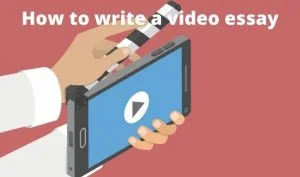
The video essay has become an increasingly popular way of presenting ideas and concepts in the age of the internet and YouTube. In this guide, we present a step-by-step guide on how to write a video essay and tips on how to make it.
While it is easy to write a normal essay, the structure of the video essay is a bit of a mystery, owing to the newness of the term.
However, in this article, we are going to define what is a video essay, how to write a video essay, and also How to present a video essay well in class.
What is a Video Essay?
A video essay is a video that delves into a certain subject, concept, person, or thesis. Video essays are difficult to characterize because they are a relatively new form, yet they are recognized regardless. Simply, video essays are visual compilations that try to persuade, educate, or criticize.

These days, there are many creatives making video essays on topics like politics, music, movies, and pop culture.
With these, essays have become increasingly popular in the era of video media such as Youtube, Vimeo, and others.
Video essays, like photo and traditional essays, tell a story or make a point.
The distinction is that video essays provide information through visuals.
When creating a video essay, you can incorporate video, images, text, music, and/or narration to make it dynamic and successful.
When you consider it, many music videos are actually video essays.
Since making videos for YouTube and other video sites has grown so popular, many professors are now assigning video essays instead of regular essays to their students. So the question is, how do you write a video essay script?
Steps on How to Write a Video Essay Script
Unscripted videos cost time, effort, and are unpleasant to watch. The first thing you should do before making a video writes a script, even if it’s only a few lines long. Don’t be intimidated by the prospect of writing a script. All you need is a starting point.
A video script is important for anyone who wants to film a video with more confidence and clarity. They all contain comparable forms of information, such as who is speaking, what is said, where, and other important details.
While there are no precise criteria that a video essay must follow, it appears that most renowned video essayists are adhering to some steps as the form gets more popular and acknowledged online.
1. Write a Thesis
Because a video essayist can handle a wide range of themes, video analysis essays lack defined bounds. The majority of essays, on the other hand, begin with a thesis.
A thesis is a statement, claim, theme, or concept that the rest of the essay is built around. A thesis might be broad, including a variety of art forms. Other theses can be quite detailed.
A good essay will almost always have a point to express. Every video analysis essay should have a central idea, or thesis, that ties the film together.
2. Write a Summary
Starting with a brief allows you and your team to document the answers to the most pressing project concerns. It ensures that everyone participating in the video production is on the same page.
This will avoid problems of mixing ideas or getting stuck when you are almost completing the project.
3. Choose a Proper Environment and Appropriate Tools
When it comes to writing your script, use any tool you’re familiar with, such as pen and paper. Also, find a writing atmosphere that is relaxing for you, where you can concentrate and be creative.
Consider what you don’t have to express out loud when you’re writing. Visual elements will be used to communicate a large portion of your content.
4. Use a Template
When you don’t have to reinvent the process every time you sit down, you get speed and consistency.
It’s using your cumulative knowledge of what works and doing it over and over again. Don’t start with a blank page when I sit down to create a script- try to use an already made template.
5. Be Conversational
You want scripts that use language that is specific and targeted. Always avoid buzzwords, cliches, and generalizations. You want your audience to comprehend you clearly without rolling their eyes.
6. Be Narrative
Make careful to use a strong story structure when you’re trying to explain anything clearly. Ensure your script has a beginning, middle, and end, no matter how short it is. This will provide a familiar path for the viewers of your video script.
7. Edit Your Script
Make each word work for a certain position on the page when you choose your words.

They must serve a purpose.
After you’ve completed your first draft, go over your script and review it.
Then begin editing, reordering, and trimming. Remove as much as possible.
Consider cutting it if it isn’t helping you achieve your goal.
8. Read Your Script Loudly
Before recording or going on in your process, it’s recommended to read your script aloud at least once. Even if you won’t be the one reading it, this is a good method to ensure that your message is clear. It’s a good idea to be away from people so you may practice in peace.
Words that flow well on paper don’t always flow well when spoken aloud. You might need to make some adjustments based on how tough certain phrases are to pronounce- it’s a lot easier to change it now than when recording.
9. Get Feedback
Sometimes it is very difficult to point out your mistakes in any piece of writing. Therefore, if you want a perfect video essay script, it is advisable to seek feedback from people who are not involved in the project.
Keep in mind that many will try to tear your work apart and make you feel incompetent. However, it can also be an opportunity to make your video better.
The best way to gather feedback is to assemble a group of people and read your script to them. Watch their facial reaction and jot own comments as you read. Make sure not to defend your decisions. Only listen to comments and ask questions to clarify.
After gathering feedback, decide on what points to include in your video essay. Also, you can ask someone else to read it to you so that you can listen to its follow.
A video essay can be a good mode to present all types of essays, especially compare and contrast essays as you can visually contrast the two subjects of your content.
How to make a Good Video from your Essay Script
You can make a good video from your script if you ask yourself the following questions;

- What is the video’s purpose? What is the purpose of the video in the first place?
- Who is this video’s intended audience?
- What is the subject of our video? (The more precise you can be, the better.)
- What are the most important points to remember from the video?- What should viewers take away from it?
If the context had multiple characters, present their dialogues well in the essay to bring originality. If there is a need to involve another person, feel free to incorporate them.
How to Present a Video Essay Well in Class
- Write down keywords or main ideas in a notecard; do not write details- writing main ideas will help you remember your points when presenting. This helps you scan through your notecard for information.
- Practice- in presentations it is easy to tell who has practiced and who hasn’t. For your video essay to grab your class and professor’s attention, practice is the key. Practice in front of your friends and family asking for feedback and try to improve.
- Smile at your audience- this is one of the most important points when presenting anything in front of an audience. A smiley face draws the attention of the audience making them smile in return thus giving you confidence.
- Walk to your seat with a smile- try not to be disappointed even if you are not applauded. Be confident that you have aced your video presentation.
Other video presentations tips include;
- Making eye contact
- Have a good posture
- Do not argue with the audience
- Look at everyone around the room, not just one audience or one spot
- Rember to use your hand and facial expressions to make a point.

Joseph is a freelance journalist and a part-time writer with a particular interest in the gig economy. He writes about schooling, college life, and changing trends in education. When not writing, Joseph is hiking or playing chess.
How to do a Video Essay: The Video Essay Process
- Plan, Prepare & Create
Storyboarding
- Finding, Filming & Editing
- References & Credits
- The Video Essay Process
This section will give an introductory overview of the stages required to create a video essay. Video essayers advice is to start simple and work through each stage of the video production process. Visit the Resources page of this guide for more.
Identify what is your argument? What is it that you want to communicate to the viewer? Write this down in a few sentences, refer and modify it as required.
Watch Video Essays
Watch a selection of video essays, read blogs and web pages from video essayers and decide what type of video essay you would like to create. Start simple.
A storyboard is a detailed outline (similar to an outline in a written essay) that helps you to organise and visualise the video essay as to what is on the screen, text, media, message and transitions between shots.
Storyboards assist in determining the length, message and meaning of the video essay and help save time with editing and post production processes.
- Free Storyboard Templates
Collect & Edit
Collect video material as downloads, ripping DVDs, screen grabs, mobile phone footage and create voice-overs. Use research skills to find information and statements to support your argument. Maintain a standard of quality and manage your videos by naming conventions and storage.
Use editing software and experiment with available functionality to enhance and support your argument. Add a voice-over, sound effects, music and other aspects of multimodality. Be sure to include references and credits to all sources used in creating the video essay.
Revisit elements of your video essay and modify as required.
Visit the Resources page of this guide for more.
- Where to find video and how to capture it
- Video Editing Basics - iMovie
- Software Guides
References & Credits
References to cite sources used in the Video Essay. Referencing is a formal, systematic way of acknowledging sources that you have used in your video essay. It is imperative that you reference all sources used (including videos, stills, music, sfx) and apply the correct formatting so that references cited can be easily traced. The referencing style used at ECU is the APA style, 6th ed. 2010. Refer to the ECU Referencing Library Guide for accurate citation in APA style.
Production credits Individuals: acknowledgement of individuals and their role in the production. Purpose: A statement for internal use, e.g. “This video was produced for [course name] at [institution’s name] in [semester, year]”
- Referencing Library Guide
- << Previous: What is a Video Essay?
- Next: Modes, MultiModality & Multiliteracies >>
- What is a Video Essay?
- Modes, MultiModality & Multiliteracies
- A Pedagogy of Multiliteracies
- Modes Of Multimodality
- Video Essay Journals
- Video Essay Channels
- Weblinks to Video Essay Resources
- Weblinks to Creative Commons Resources
- Titles in the Library
- Referencing & Copyright
- Marking Rubric
- Last Updated: Aug 28, 2023 2:57 PM
- URL: https://ecu.au.libguides.com/video-essay
Edith Cowan University acknowledges and respects the Noongar people, who are the traditional custodians of the land upon which its campuses stand and its programs operate. In particular ECU pays its respects to the Elders, past and present, of the Noongar people, and embrace their culture, wisdom and knowledge.
If you're seeing this message, it means we're having trouble loading external resources on our website.
If you're behind a web filter, please make sure that the domains *.kastatic.org and *.kasandbox.org are unblocked.
To log in and use all the features of Khan Academy, please enable JavaScript in your browser.
College admissions
Course: college admissions > unit 4.
- Writing a strong college admissions essay
- Avoiding common admissions essay mistakes
Brainstorming tips for your college essay
- How formal should the tone of your college essay be?
- Taking your college essay to the next level
- Sample essay 1 with admissions feedback
- Sample essay 2 with admissions feedback
- Student story: Admissions essay about a formative experience
- Student story: Admissions essay about personal identity
- Student story: Admissions essay about community impact
- Student story: Admissions essay about a past mistake
- Student story: Admissions essay about a meaningful poem
- Writing tips and techniques for your college essay
Want to join the conversation?
- Upvote Button navigates to signup page
- Downvote Button navigates to signup page
- Flag Button navigates to signup page
Video transcript
5 Steps for Scripting a Video College Application Essay
Students only have a few seconds to hook the viewer with a compelling story.
Script a Video Application Essay

Robert Daly | Getty Images
Think of the video essay as a brief advertisement for you and your skills.
If you had mere seconds to change the course of your life – what would you say?
If you are submitting a video admissions essay as part of your college application, that question should be at the forefront of your mind. Research has shown that opinion, favorable or unfavorable, is largely determined within the first seven seconds of an interaction. An amazing finish can sometimes compensate for a poor introduction, but first impressions are crucial in all aspects of life.
While the video format promises an immediacy and degree of connection that is lacking in written essays, many students will be tempted to point their cameras at themselves, press record, and reel off a video essay that begins with "Hi! My name is…"
Rather than doing that, consider these tips, which can help you write a script for a winning video essay:
1. View the video essay as an advertisement: Your video essay is, in some ways, a brief advertisement for yourself. Your audience is the admissions committee that is attempting to select a capable and diverse cohort of students.
Starting your video by stating your name is like beginning an advertisement by saying, "This is a pencil." In other words, you are devoting the all-important first impression to sharing information that is already in your application. Instead, aim to do what advertisements do – establish the necessity of having you on campus next fall.
One of the benefits of compiling a college application is that it prompts you to list all of your accomplishments. Thus, before you start your video essay, you should already know what makes you a strong applicant.
You do not need to be better than the other applicants – you just need to add to the student body in a unique and interesting way. Allow your application data to speak for itself on paper, and instead concentrate on what makes you valuable beyond high test scores or a perfect average.
Learn about
2. Hook your viewer: Begin your script with a short sentence that captures your viewer's attention. The ideal hook is a concise introduction that suggests a larger story. For example, "My love of science started when I assisted on an ecology research project at Mount St. Helens," is not a compelling hook – although it is better than a generic introduction.
Instead, set the scene in such a way that your viewer wants to find out what happened next. A sentence like, "In the summer of 2014, I was standing on the slope of a dormant volcano when a storm rolled over our research camp," leaves several open questions that can only be answered by watching the rest of the video.
3. Explain why you chose this school: You will have a very small window to build your hook into a case for why you belong at a given school. Use your introductory sentence as the basis for the lesson that set you on the course toward college.
Think about questions like how this school will help you achieve your goals. Why is it on your short list ? What do you hope to do during your time as a student, beyond simply earning a degree? Use positive terms like "curiosity" and "service" in your script.
4. Share your true motivation: Some people might define advertising as a form of lying. Certain advertisements certainly fit this mold, but the best ones present the truth in the most favorable light possible.
Your video should demonstrate real passion. If you are not genuinely motivated by a desire for public service, do not claim you are. It is absolutely all right to be motivated by a desire for excellence, a desire to build a secure future for your family or a desire to make a new life for yourself.
Check out these
5. Resist memorizing your script: The script you prepare will be your guide to the video you ultimately create. However, when you are filming, it is imperative that you do not read from a script.
If you must memorize your script word-for-word, ensure that you can recite it with life and energy in your voice. If you continually pause to remember your next word, take a break and start over. Regardless of how much practice you complete, it is important to sound fresh when you record.
Every person has a story to share. Even if you feel like an ordinary, boring high school student, you have a story. Your goal, in your video essay, is to share that story. Even if you do not have a key moment like a foreign exchange trip or a summer research expedition, there are still moments that are uniquely yours.
Choose an event that is meaningful to you, such as success or defeat in sports, the birth of a younger sibling, or a time when a teacher took special notice of your work. Then, use that moment to set the context of your video.
Tags: education , colleges , college applications , students
About College Admissions Playbook
Stressed about getting into college? College Admissions Playbook, authored by Varsity Tutors , offers prospective college students advice on Advanced Placement and International Baccalaureate courses, SAT and ACT exams and the college application process. Varsity Tutors, an advertiser with U.S. News & World Report, is a live learning platform that connects students with personalized instruction to accelerate academic achievement. The company's end-to-end offerings also include mobile learning apps, online learning environments and other tutoring and test prep-focused technologies. Got a question? Email [email protected] .
Ask an Alum: Making the Most Out of College
You May Also Like
How to decide if an mba is worth it.
Sarah Wood March 27, 2024

What to Wear to a Graduation
LaMont Jones, Jr. March 27, 2024

FAFSA Delays Alarm Families, Colleges
Sarah Wood March 25, 2024

Help Your Teen With the College Decision
Anayat Durrani March 25, 2024

Toward Semiconductor Gender Equity
Alexis McKittrick March 22, 2024

March Madness in the Classroom
Cole Claybourn March 21, 2024

20 Lower-Cost Online Private Colleges
Sarah Wood March 21, 2024

How to Choose a Microcredential
Sarah Wood March 20, 2024

Basic Components of an Online Course
Cole Claybourn March 19, 2024

Can You Double Minor in College?
Sarah Wood March 15, 2024

Ultimate Guide to Writing Your College Essay
Tips for writing an effective college essay.
College admissions essays are an important part of your college application and gives you the chance to show colleges and universities your character and experiences. This guide will give you tips to write an effective college essay.
Want free help with your college essay?
UPchieve connects you with knowledgeable and friendly college advisors—online, 24/7, and completely free. Get 1:1 help brainstorming topics, outlining your essay, revising a draft, or editing grammar.
Writing a strong college admissions essay
Learn about the elements of a solid admissions essay.
Avoiding common admissions essay mistakes
Learn some of the most common mistakes made on college essays
Brainstorming tips for your college essay
Stuck on what to write your college essay about? Here are some exercises to help you get started.
How formal should the tone of your college essay be?
Learn how formal your college essay should be and get tips on how to bring out your natural voice.
Taking your college essay to the next level
Hear an admissions expert discuss the appropriate level of depth necessary in your college essay.
Student Stories
Student Story: Admissions essay about a formative experience
Get the perspective of a current college student on how he approached the admissions essay.
Student Story: Admissions essay about personal identity
Get the perspective of a current college student on how she approached the admissions essay.
Student Story: Admissions essay about community impact
Student story: admissions essay about a past mistake, how to write a college application essay, tips for writing an effective application essay, sample college essay 1 with feedback, sample college essay 2 with feedback.
This content is licensed by Khan Academy and is available for free at www.khanacademy.org.
- Search All Scholarships
- Exclusive Scholarships
- Easy Scholarships to Apply For
- No Essay Scholarships
- Scholarships for HS Juniors
- Scholarships for HS Seniors
- Scholarships for College Students
- Scholarships for Grad Students
- Scholarships for Women
- Scholarships for Black Students
- Scholarships
- Student Loans
- College Admissions
- Financial Aid
- Scholarship Winners
- Scholarship Providers

Apply to vetted scholarship programs in one click
Student-centric advice and objective recommendations.
Higher education has never been more confusing or expensive. Our goal is to help you navigate the very big decisions related to higher ed with objective information and expert advice. Each piece of content on the site is original, based on extensive research, and reviewed by multiple editors, including a subject matter expert. This ensures that all of our content is up-to-date, useful, accurate, and thorough.
Our reviews and recommendations are based on extensive research, testing, and feedback. We may receive commission from links on our website, but that doesn’t affect our editors’ opinions. Our marketing partners don’t review, approve or endorse our editorial content. It’s accurate to the best of our knowledge when posted. You can find a complete list of our partners here .
Tips on How to Create a College Video Response

Cait Williams is a Content Writer at Scholarships360. Cait recently graduated from Ohio University with a degree in Journalism and Strategic Communications. During her time at OU, was active in the outdoor recreation community.
Learn about our editorial policies

Maria Geiger is Director of Content at Scholarships360. She is a former online educational technology instructor and adjunct writing instructor. In addition to education reform, Maria’s interests include viewpoint diversity, blended/flipped learning, digital communication, and integrating media/web tools into the curriculum to better facilitate student engagement. Maria earned both a B.A. and an M.A. in English Literature from Monmouth University, an M. Ed. in Education from Monmouth University, and a Virtual Online Teaching Certificate (VOLT) from the University of Pennsylvania.

A college video response should not be looked upon as a way out of writing a college application essay. In fact, a video response still requires you to do largely the same thing: put your best self forward. For some students, creating a video response has definite advantages. So, let’s explore how you can ace those college video responses!
Verify the guidelines
The most important thing to do before starting your college video response is to verify that you are familiar with the guidelines you need to follow. Read the directions, and if there are example videos, take the time to watch them.
Note any directions such as time limits, questions you need to answer, and whether added materials must be submitted with the video. Once you know what is needed on your end, you can begin to craft your video response!
Related: How to respond to the Common App essay prompts
Responding to prompts
Depending on the college(s) you apply to, this answer will certainly vary. Below are two separate sections to give you some guidance on how to answer specific essay prompts and how to answer the prompts that give you a bit more creative control.
For specific prompts
For specific prompts that you need to respond to, the college video essay would function much like an essay. The video ideally should allow the admissions team to get to know you and what makes you a good fit for their school.
As we mentioned before, completing a college video doesn’t mean that you get to escape writing the essay! It is still a great idea to write it out as an essay to begin with. This should help you organize your thoughts and map out what you will, or won’t, have time to talk about in your video.
Check out: College essay primer: show, don’t tell
For open prompts
If the college you are applying to offers you the chance to send a video that doesn’t require a response to a specific question, you have a unique opportunity. You will be able to choose what you think this college should know about you. However, with great opportunities comes great responsibility.
There are two sets of points below to help you start thinking about what you should talk about. The first set of points explores what the college will want to know about. These points are based on general areas that colleges tend to be interested in knowing about their students. It’s important to think about the college you are applying to as well and what things they value in addition to these points.
What they might want to know
- Colleges want to hear about why you are interested in their school. Instead of listing their resources and great professors, explain how they will help you become a successful college graduate
- Colleges look for students that will be diligent, but also be engaged in the community and student body via sports, clubs, internships and other extracurricular activities. Share with them what things you enjoy outside of school, as well as how you plan to be a student committed to your studies
- Finally, colleges do obviously care about test scores and grades, but they also understand that students are far more than just their academics. They understand that you have goals, plans, and dreams that you wish to achieve. Share those goals with them. Even if you are confident that your goals will change along the way, that is okay
This next set of points is about what you want the college to know about you. You have free reign in this scenario. So, it is up to you to decide what you think is most important about you.
What you might want them to know
- Think about your prospective major. Is there a story that you would like to share about how you came to choose that major? Or perhaps you are undecided and would like to talk about your plans to work on narrowing your interests during your first year at college
- Experiences are a wonderful thing to share with colleges. If there is something that you have gone through that you think would be relevant to your college experience, share that with the admissions board. A word of caution though, while stories are a great way to tell someone something about yourself, the key is making sure that what you are sharing is relevant to the situation
- Finally, knowing what the college you are applying to values and may be known for, think about any connections you would like to draw between them and why you think you may be a good fit for their campus
Also see: College applications: What looks good
How to start
Whether or not you need to take time to introduce yourself and state things like your hometown, intended major, and age is up to you. Introducing yourself takes time that you may not have. Your name and other basic information will already be on your application, so it may not be worth repeating if it isn’t necessary.
Starting off with a casual greeting and your name should be a sufficient introduction. Then you can say the topic you plan to discuss or reiterate the prompt you were asked to segue into the heart of your video. There really is no right or wrong way to start your video. The important thing is that you answer the questions they have asked you and let yourself shine through.
Also see: Top video scholarships
Write a script
Writing a script just means planning out what you want to say in advance. You don’t need to write out what you want to say word for word, but having a vague outline may help you stay on track with your video.
Time will most likely be something that you will have to be very conscious about. Most college video essays will only give you one to two minutes to share what you would like. An average person speaks roughly 100-125 words per minute, meaning you’ll have roughly enough space to share a 250 word essay response. This isn’t a whole lot of words to share who you are with a college.
If you do write out a script, be careful that you don’t begin to sound robotic. A college knows that video responses can be a bit nerve racking, but they also don’t want that to keep you from being genuinely you.
Everything in your video is a way to convey more about yourself. With limited time, you should take advantage of everything you have to show off who you are. You have the creative freedom to film your video wherever you think shows off who you are most.
Inside, outside, in your room, at a coffee shop, at a sports practice, the choice is up to you! If you have the time, try filming your response in more than one location to find out what works best. Just make sure that you can be clearly seen and heard in your video!
Review, review, review
We can’t emphasize enough that before you send your video off, you should double and triple check that all the mechanics are working well! If possible, send your video to a few friends and ask them to review both the content and the technical side of things. Making sure that they can do things like access the file and hear you clearly.
Keep it engaging
One of the keys to a good college video essay is keeping your listener engaged. This is something that is also true for written college essays. So, before you begin to overthink how you will keep a viewer engaged, let’s take some of the concepts we already know and some new ones and apply them to a video response.
Be concise
If you can say what you need to in 100 words instead of 200, that’s great! The goal of a college application is to convey who you are, not for you to meet a word count. Keep this in mind as you try to create an engaging video. Long videos with lots of speaking may become a bit monotonous for viewers.
Visual elements
This ties back to our point about scenery that we mentioned earlier. Having a pristine white or plain color background may feel desirable at first, but having some visual elements behind you could help keep your audience engaged. If you have time, you can film your video a few times with various visual elements to make sure they don’t take away from you as the subject.
Dress the part
Again, like scenery, you may want to keep it simple and clean, but that’s not always the best choice. Clothing is a great way to show off something that matters to you or convey a bit of your personality.
Perhaps one of your parents is an alum of this school and you want to wear one of their sweatshirts with the school’s name on it or mascot. If you are part of any clubs at your high school, maybe you want to wear spirit wear from that.
Look clean and prepared, but also have fun with what you wear! Clothing is a visual element, so take full advantage of it!
Editing software
Quality of content is more important than quality of video. A college cares much more about seeing a student shine through in a video that is a bit grainy, versus a video that is pristine, but gives them little information about the student. That being said, try and put forth the best quality video you can.
Most basic video editing software available on your computer, tablet, or phone should be more than sufficient to help polish your video. Don’t be afraid to reach out to friends or parents for help. And of course, take advantage of YouTube tutorials and other articles that can help give you tips about how to use video editing software.
Start your scholarship search
- Vetted scholarships custom-matched to your profile
- Access exclusive scholarships only available to Scholarships360 members
Frequently asked questions about creating college video responses
How should you introduce yourself in a college video essay, do colleges accept video essays in place of written essays, can i send a video with my application just because i’d like to, scholarships360 recommended.

10 Tips for Successful College Applications

Coalition vs. Common App: What is the difference?

College Application Deadlines 2023-2024: What You Need to Know
Trending now.

How to Convert Your GPA to a 4.0 Scale

PSAT to SAT Score Conversion: Predict Your Score

What Are Public Ivy League Schools?
3 reasons to join scholarships360.
- Automatic entry to our $10,000 No-Essay Scholarship
- Personalized matching to thousands of vetted scholarships
- Quick apply for scholarships exclusive to our platform
By the way...Scholarships360 is 100% free!
Have a language expert improve your writing
Check your paper for plagiarism in 10 minutes, generate your apa citations for free.
- Knowledge Base
- College essay
How to Write a Great College Essay Introduction | Examples
Published on October 4, 2021 by Meredith Testa . Revised on August 14, 2023 by Kirsten Courault.
Admissions officers read thousands of essays each application season, and they may devote as little as five minutes to reviewing a student’s entire application. That means it’s critical to have a well-structured essay with a compelling introduction. As you write and revise your essay , look for opportunities to make your introduction more engaging.
There’s one golden rule for a great introduction: don’t give too much away . Your reader shouldn’t be able to guess the entire trajectory of the essay after reading the first sentence. A striking or unexpected opening captures the reader’s attention, raises questions, and makes them want to keep reading to the end .
Table of contents
Start with a surprise, start with a vivid, specific image, avoid clichés, other interesting articles, frequently asked questions about college application essays.
A great introduction often has an element of mystery. Consider the following opening statement.
This opener is unexpected, even bizarre—what could this student be getting at? How can you be bad at breathing?
The student goes on to describe her experience with asthma and how it has affected her life. It’s not a strange topic, but the introduction is certainly intriguing. This sentence keeps the admissions officer reading, giving the student more of an opportunity to keep their attention and make her point.
In a sea of essays with standard openings such as “One life-changing experience for me was …” or “I overcame an obstacle when …,” this introduction stands out. The student could have used either of those more generic introductions, but neither would have been as successful.
This type of introduction is a true “hook”—it’s highly attention-grabbing, and the reader has to keep reading to understand.
Prevent plagiarism. Run a free check.
If your topic doesn’t lend itself to such a surprising opener, you can also start with a vivid, specific description.
Many essays focus on a particular experience, and describing one moment from that experience can draw the reader in. You could focus on small details of what you could see and feel, or drop the reader right into the middle of the story with dialogue or action.
Some students choose to write more broadly about themselves and use some sort of object or metaphor as the focus. If that’s the type of essay you’d like to write, you can describe that object in vivid detail, encouraging the reader to imagine it.
Cliché essay introductions express ideas that are stereotypical or generally thought of as conventional wisdom. Ideas like “My family made me who I am today” or “I accomplished my goals through hard work and determination” may genuinely reflect your life experience, but they aren’t unique or particularly insightful.
Unoriginal essay introductions are easily forgotten and don’t demonstrate a high level of creative thinking. A college essay is intended to give insight into the personality and background of an applicant, so a standard, one-size-fits-all introduction may lead admissions officers to think they are dealing with a standard, unremarkable applicant.
Quotes can often fall into the category of cliché essay openers. There are some circumstances in which using a quote might make sense—for example, you could quote an important piece of advice or insight from someone important in your life. But for most essays, quotes aren’t necessary, and they may make your essay seem uninspired.
If you want to know more about academic writing , effective communication , or parts of speech , make sure to check out some of our other articles with explanations and examples.
Academic writing
- Writing process
- Transition words
- Passive voice
- Paraphrasing
Communication
- How to end an email
- Ms, mrs, miss
- How to start an email
- I hope this email finds you well
- Hope you are doing well
Parts of speech
- Personal pronouns
- Conjunctions
The introduction of your college essay is the first thing admissions officers will read and therefore your most important opportunity to stand out. An excellent introduction will keep admissions officers reading, allowing you to tell them what you want them to know.
The key to a strong college essay introduction is not to give too much away. Try to start with a surprising statement or image that raises questions and compels the reader to find out more.
Cliché openers in a college essay introduction are usually general and applicable to many students and situations. Most successful introductions are specific: they only work for the unique essay that follows.
In most cases, quoting other people isn’t a good way to start your college essay . Admissions officers want to hear your thoughts about yourself, and quotes often don’t achieve that. Unless a quote truly adds something important to your essay that it otherwise wouldn’t have, you probably shouldn’t include it.
Cite this Scribbr article
If you want to cite this source, you can copy and paste the citation or click the “Cite this Scribbr article” button to automatically add the citation to our free Citation Generator.
Testa, M. (2023, August 14). How to Write a Great College Essay Introduction | Examples. Scribbr. Retrieved March 28, 2024, from https://www.scribbr.com/college-essay/introduction-college-essay/
Is this article helpful?

Meredith Testa
Other students also liked, college essay format & structure | example outlines, how to end a college admissions essay | 4 winning strategies, what do colleges look for in an essay | examples & tips, unlimited academic ai-proofreading.
✔ Document error-free in 5minutes ✔ Unlimited document corrections ✔ Specialized in correcting academic texts

What is a Video Essay? The Art of the Video Analysis Essay
I n the era of the internet and Youtube, the video essay has become an increasingly popular means of expressing ideas and concepts. However, there is a bit of an enigma behind the construction of the video essay largely due to the vagueness of the term.
What defines a video analysis essay? What is a video essay supposed to be about? In this article, we’ll take a look at the foundation of these videos and the various ways writers and editors use them creatively. Let’s dive in.
Watch: Our Best Film Video Essays of the Year
Subscribe for more filmmaking videos like this.
What is a video essay?
First, let’s define video essay.
There is narrative film, documentary film, short films, and then there is the video essay. What is its role within the realm of visual media? Let’s begin with the video essay definition.
VIDEO ESSAY DEFINITION
A video essay is a video that analyzes a specific topic, theme, person or thesis. Because video essays are a rather new form, they can be difficult to define, but recognizable nonetheless. To put it simply, they are essays in video form that aim to persuade, educate, or critique.
These essays have become increasingly popular within the era of Youtube and with many creatives writing video essays on topics such as politics, music, film, and pop culture.
What is a video essay used for?
- To persuade an audience of a thesis
- To educate on a specific subject
- To analyze and/or critique
What is a video essay based on?
Establish a thesis.
Video analysis essays lack distinguished boundaries since there are countless topics a video essayist can tackle. Most essays, however, begin with a thesis.
How Christopher Nolan Elevates the Movie Montage • Video Analysis Essays
Good essays often have a point to make. This point, or thesis, should be at the heart of every video analysis essay and is what binds the video together.
Related Posts
- Stanley Kubrick Directing Style Explained →
- A Filmmaker’s Guide to Nolan’s Directing Style →
- How to Write a Voice Over Montage in a Script →
interviews in video essay
Utilize interviews.
A key determinant for the structure of an essay is the source of the ideas. A common source for this are interviews from experts in the field. These interviews can be cut and rearranged to support a thesis.
Roger Deakins on "Learning to Light" • Video Analysis Essays
Utilizing first hand interviews is a great way to utilize ethos into the rhetoric of a video. However, it can be limiting since you are given a limited amount to work with. Voice over scripts, however, can give you the room to say anything.
How to create the best video essays on Youtube
Write voice over scripts.
Voice over (VO) scripts allow video essayists to write out exactly what they want to say. This is one of the most common ways to structure a video analysis essay since it gives more freedom to the writer. It is also a great technique to use when taking on large topics.
In this video, it would have been difficult to explain every type of camera lens by cutting sound bites from interviews of filmmakers. A voice over script, on the other hand, allowed us to communicate information directly when and where we wanted to.
Ultimate Guide to Camera Lenses • Video essay examples
Some of the most famous video essayists like Every Frame a Painting and Nerdwriter1 utilize voice over to capitalize on their strength in writing video analysis essays. However, if you’re more of an editor than a writer, the next type of essay will be more up your alley.
Video analysis essay without a script
Edit a supercut.
Rather than leaning on interview sound bites or voice over, the supercut video depends more on editing. You might be thinking “What is a video essay without writing?” The beauty of the video essay is that the writing can be done throughout the editing. Supercuts create arguments or themes visually through specific sequences.
Another one of the great video essay channels, Screen Junkies, put together a supercut of the last decade in cinema. The video could be called a portrait of the last decade in cinema.
2010 - 2019: A Decade In Film • Best videos on Youtube
This video is rather general as it visually establishes the theme of art during a general time period. Other essays can be much more specific.
Critical essays
Video essays are a uniquely effective means of creating an argument. This is especially true in critical essays. This type of video critiques the facets of a specific topic.
In this video, by one of the best video essay channels, Every Frame a Painting, the topic of the film score is analyzed and critiqued — specifically temp film score.
Every Frame a Painting Marvel Symphonic Universe • Essay examples
Of course, not all essays critique the work of artists. Persuasion of an opinion is only one way to use the video form. Another popular use is to educate.
- The Different Types of Camera Lenses →
- Write and Create Professionally Formatted Screenplays →
- How to Create Unforgettable Film Moments with Music →
Video analysis essay
Visual analysis.
One of the biggest advantages that video analysis essays have over traditional, written essays is the use of visuals. The use of visuals has allowed video essayists to display the subject or work that they are analyzing. It has also allowed them to be more specific with what they are analyzing. Writing video essays entails structuring both words and visuals.
Take this video on There Will Be Blood for example. In a traditional, written essay, the writer would have had to first explain what occurs in the film then make their analysis and repeat.
This can be extremely inefficient and redundant. By analyzing the scene through a video, the points and lessons are much more clear and efficient.
There Will Be Blood • Subscribe on YouTube
Through these video analysis essays, the scene of a film becomes support for a claim rather than the topic of the essay.
Dissect an artist
Essays that focus on analysis do not always focus on a work of art. Oftentimes, they focus on the artist themself. In this type of essay, a thesis is typically made about an artist’s style or approach. The work of that artist is then used to support this thesis.
Nerdwriter1, one of the best video essays on Youtube, creates this type to analyze filmmakers, actors, photographers or in this case, iconic painters.
Caravaggio: Master Of Light • Best video essays on YouTube
In the world of film, the artist video analysis essay tends to cover auteur filmmakers. Auteur filmmakers tend to have distinct styles and repetitive techniques that many filmmakers learn from and use in their own work.
Stanley Kubrick is perhaps the most notable example. In this video, we analyze Kubrick’s best films and the techniques he uses that make so many of us drawn to his films.
Why We're Obsessed with Stanley Kubrick Movies • Video essay examples
Critical essays and analytical essays choose to focus on a piece of work or an artist. Essays that aim to educate, however, draw on various sources to teach technique and the purpose behind those techniques.
What is a video essay written about?
Historical analysis.
Another popular type of essay is historical analysis. Video analysis essays are a great medium to analyze the history of a specific topic. They are an opportunity for essayists to share their research as well as their opinion on history.
Our video on aspect ratio , for example, analyzes how aspect ratios began in cinema and how they continue to evolve. We also make and support the claim that the 2:1 aspect ratio is becoming increasingly popular among filmmakers.
Why More Directors are Switching to 18:9 • Video analysis essay
Analyzing the work of great artists inherently yields a lesson to be learned. Some essays teach more directly.
- Types of Camera Movements in Film Explained →
- What is Aspect Ratio? A Formula for Framing Success →
- Visualize your scenes with intuitive online shotlist software →
Writing video essays about technique
Teach technique.
Educational essays designed to teach are typically more direct. They tend to be more valuable for those looking to create art rather than solely analyze it.
In this video, we explain every type of camera movement and the storytelling value of each. Educational essays must be based on research, evidence, and facts rather than opinion.
Ultimate Guide to Camera Movement • Best video essays on YouTube
As you can see, there are many reasons why the video essay has become an increasingly popular means of communicating information. Its ability to use both sound and picture makes it efficient and effective. It also draws on the language of filmmaking to express ideas through editing. But it also gives writers the creative freedom they love.
Writing video essays is a new art form that many channels have set high standards for. What is a video essay supposed to be about? That’s up to you.
Organize Post Production Workflow
The quality of an essay largely depends on the quality of the edit. If editing is not your strong suit, check out our next article. We dive into tips and techniques that will help you organize your Post-Production workflow to edit like a pro.
Up Next: Post Production →
Showcase your vision with elegant shot lists and storyboards..
Create robust and customizable shot lists. Upload images to make storyboards and slideshows.
Learn More ➜
- Pricing & Plans
- Product Updates
- Featured On
- StudioBinder Partners
- The Ultimate Guide to Call Sheets (with FREE Call Sheet Template)
- How to Break Down a Script (with FREE Script Breakdown Sheet)
- The Only Shot List Template You Need — with Free Download
- Managing Your Film Budget Cashflow & PO Log (Free Template)
- A Better Film Crew List Template Booking Sheet
- Best Storyboard Softwares (with free Storyboard Templates)
- Movie Magic Scheduling
- Gorilla Software
- Storyboard That
A visual medium requires visual methods. Master the art of visual storytelling with our FREE video series on directing and filmmaking techniques.
We’re in a golden age of TV writing and development. More and more people are flocking to the small screen to find daily entertainment. So how can you break put from the pack and get your idea onto the small screen? We’re here to help.
- Making It: From Pre-Production to Screen
- What is a Light Meter — Understanding the Photographer's Tool
- What is Metonymy — Definition, Examples & How to Use It
- What is a Short Story — The Art of Brevity in Literature
- What is an Action Hero — Best Examples & Defining Traits
- What is a Movie Spoiler — Types, Ethics & Rules Explained
- 100 Facebook
- 0 Pinterest

- YouTube Tutorials
College Essay Tips | How to Tell a Unique Story to Admissions
So you know the college essay is an important part of your application, but what can you really accomplish in 650 words? How do you pick a unique topic? Learn how to select the perfect story to tell admissions and make yourself memorable through the art of personal branding.
Common App Essay Prompts
Guide to the Common App Essays: Writing about Gratitude (Prompt 4)
The 2021-22 Common Application's fourth essay prompt (full text below) asks you to reflect on a time in your life when you have felt thankful. But how do you flip the script and talk about what others have done for you, instead of what you've done for others, in a meaningful way? Get the lowdown from College Essay Advisors' Founder and Chief Advisor, Stacey Brook. She’ll break this prompt down into its basic building blocks and offer some insider tricks and strategies for drafting your response.
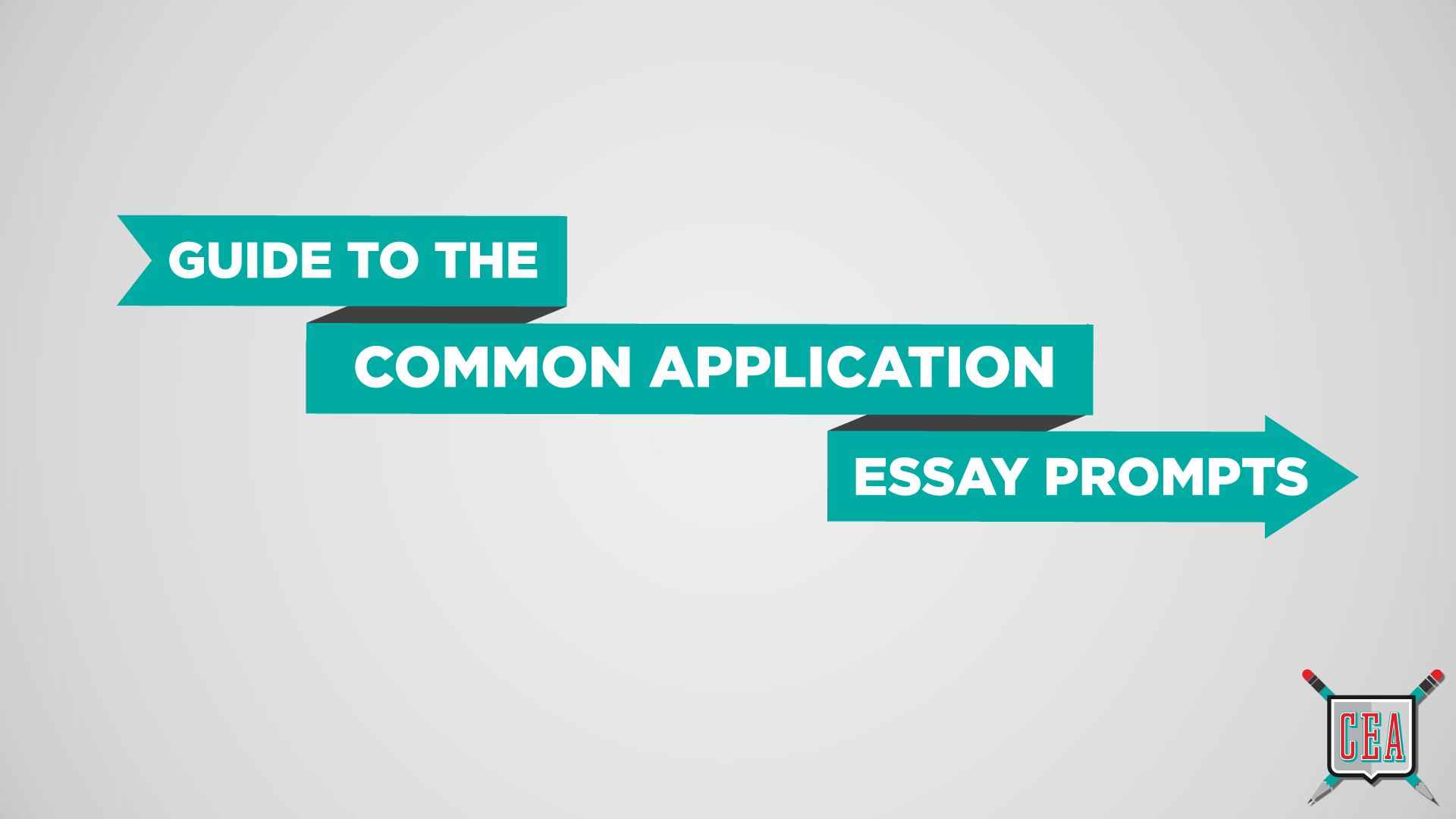
Common Application Prompts: The Ultimate Breakdown
The Common Application's personal statement is often the deciding factor between candidates with similar test scores, grades, and extracurriculars: but what makes a candidate's college essay stand out? In this video, we walk you through the seven Common App prompts, explaining what each question is really asking and providing helpful tips on what admissions is really looking for in response.

Guide to the Common App Essays: Writing about Your Background (Prompt 1)
The 2021-22 Common Application's essay prompt 1 asks you to write about your background or identity. But what is it REALLY asking? Get the lowdown from College Essay Advisors Founder and Chief Advisor, Stacey Brook. She’ll break this prompt down into its basic building blocks and offer some insider tips and strategies for picking the perfect topic.
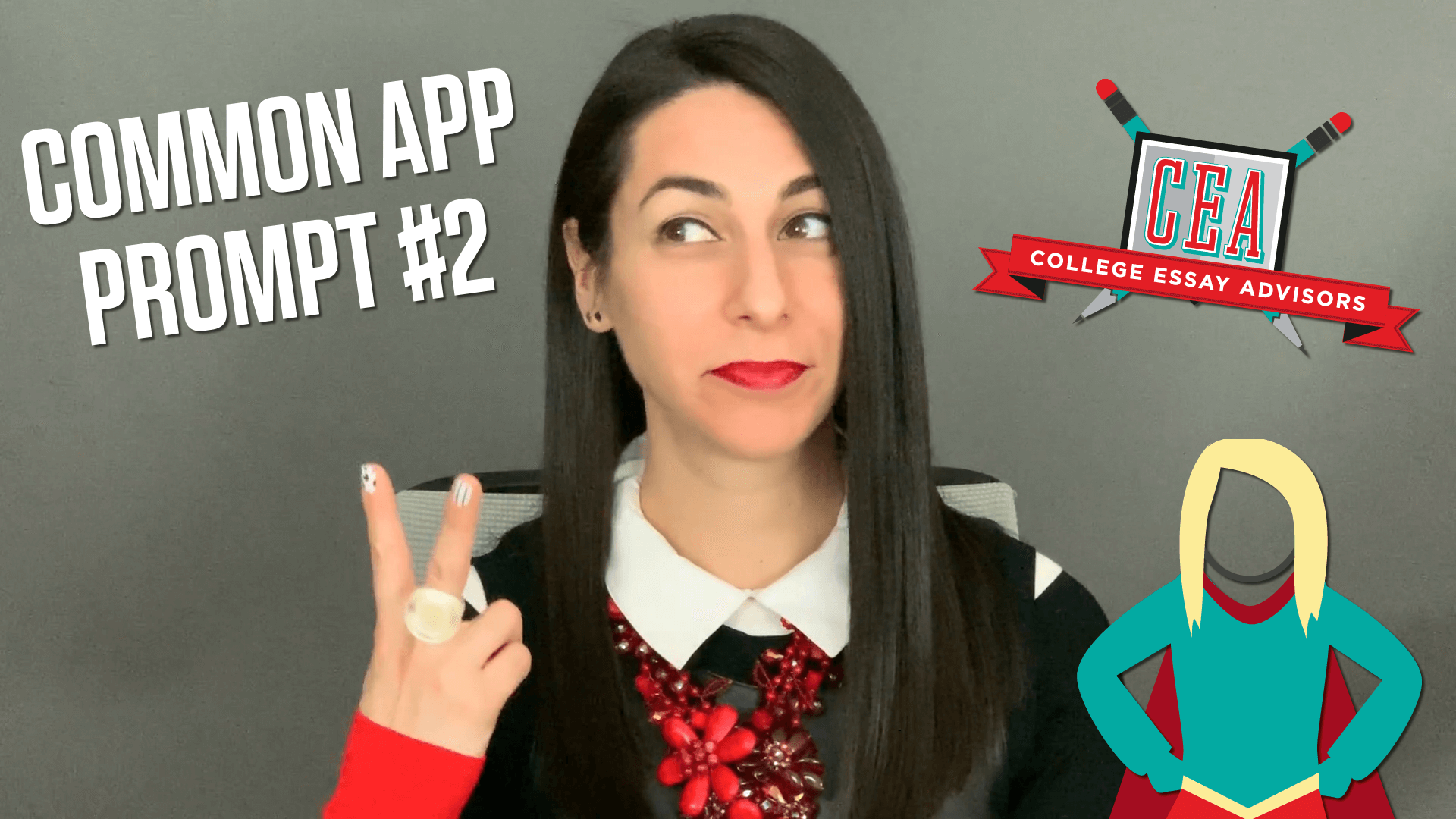
Guide to the Common App Essays: Writing about Setbacks and Failure (Prompt 2)
The second essay prompt of the 2021-22 Common Application asks you to talk about how you approach challenges, obstacles, and even (GASP!) failures. Watch now!
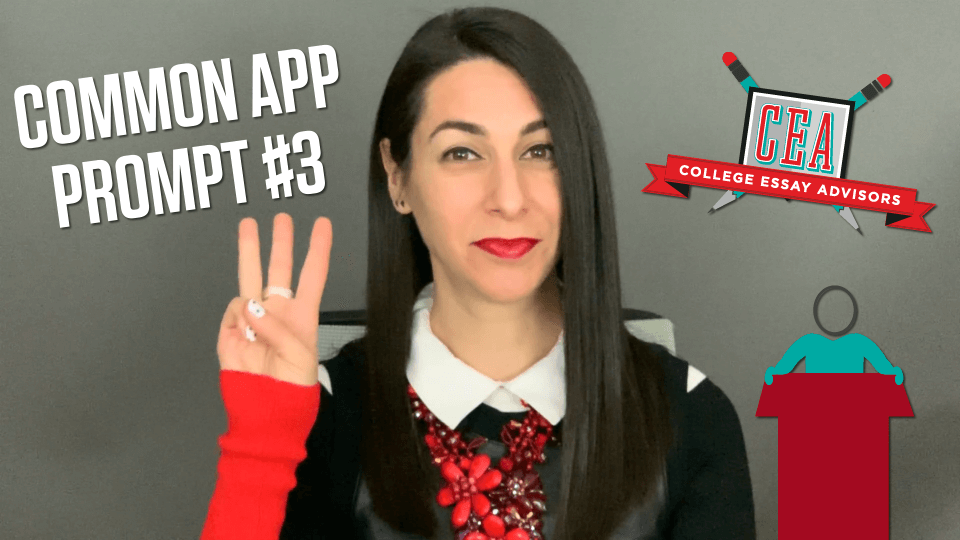
Guide to the Common App Essays: Questioning a Belief or Idea (Prompt 3)
The third essay prompt of the 2021-22 Common Application asks you to open up about a time when your opinion was unpopular. How can you write a powerful essay without polarizing readers who disagree with you? It's tricky -- but totally possible! Get the inside scoop from College Essay Advisors Founder and Chief Advisor, Stacey Brook.
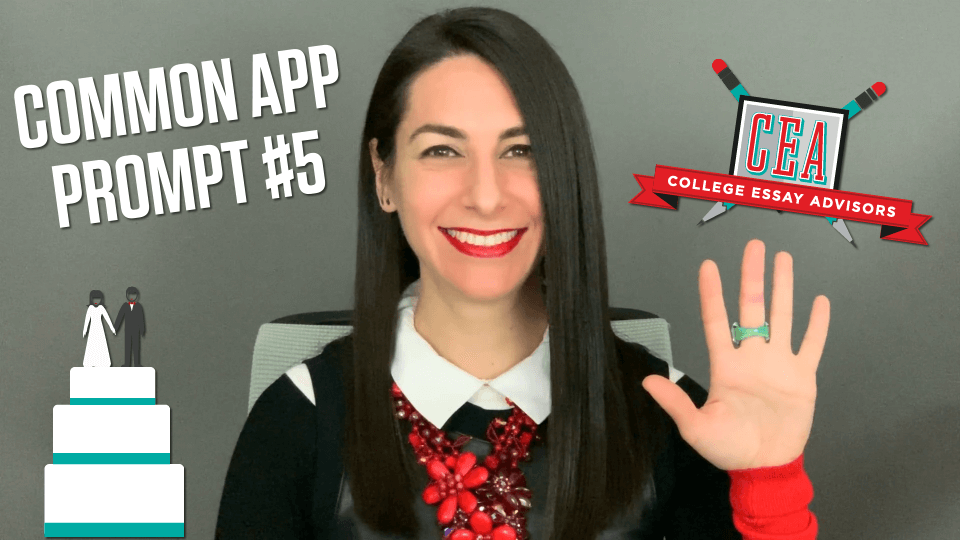
Guide to the Common App Essays: Writing about Personal Growth (Prompt 5)
The fifth essay prompt of the 2021-22 Common Application asks you to talk about a moment of personal growth. But what does admissions really want to hear about? What counts as a period of personal growth? CEA's Founder and Chief Advisor, Stacey Brook, gives you the lowdown on the Common App's fifth prompt in this video!
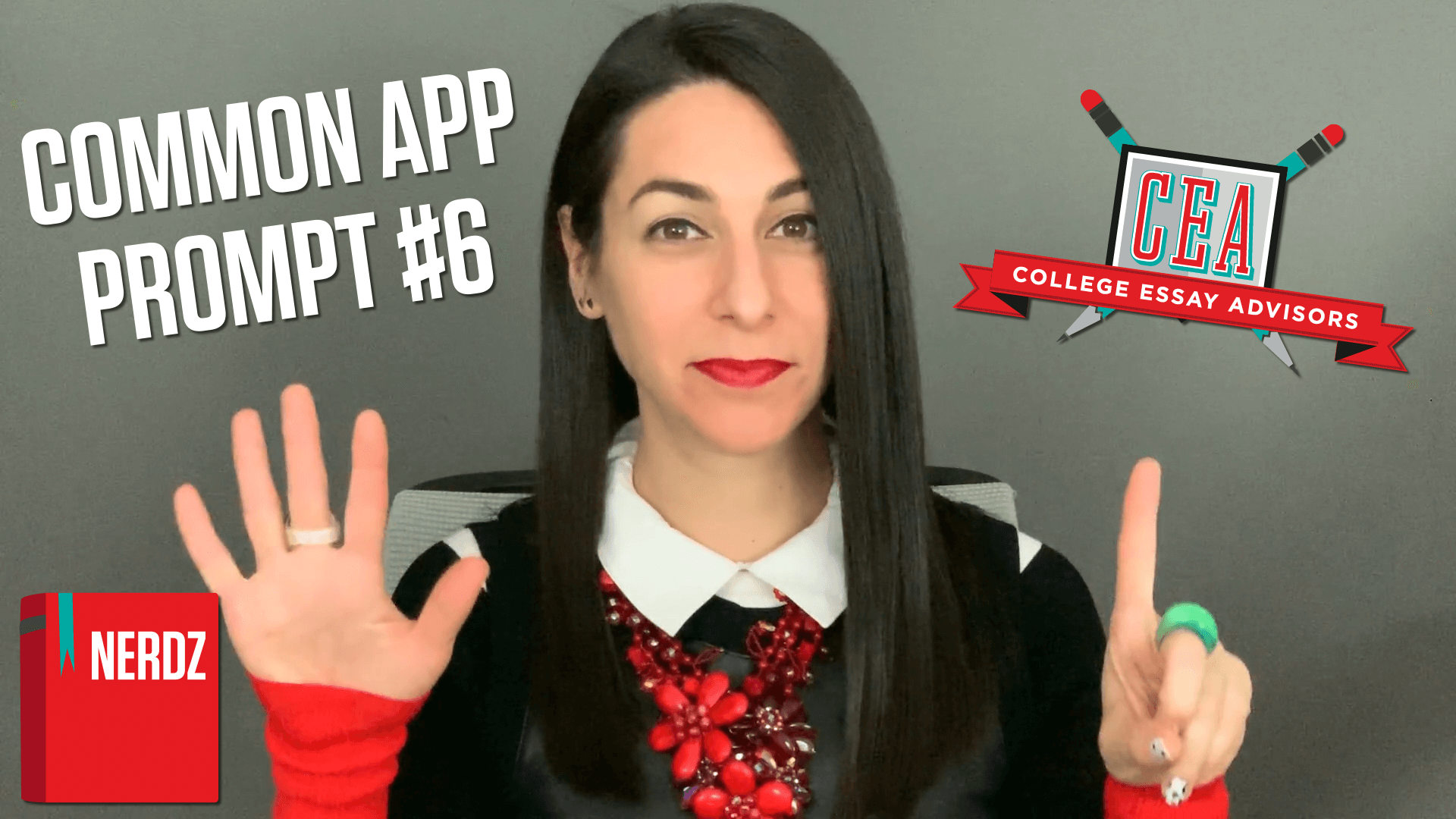
Guide to the Common App Essays: Sharing Your Passions and Obsessions (Prompt 6)
The sixth essay prompt of the 2021-22 Common Application asks you to write about the driving force behind your intellectual curiosity. But how can you tap into your inner nerd without going overboard? Get the insider scoop from College Essay Advisors Founder and Chief Advisor, Stacey Brook.
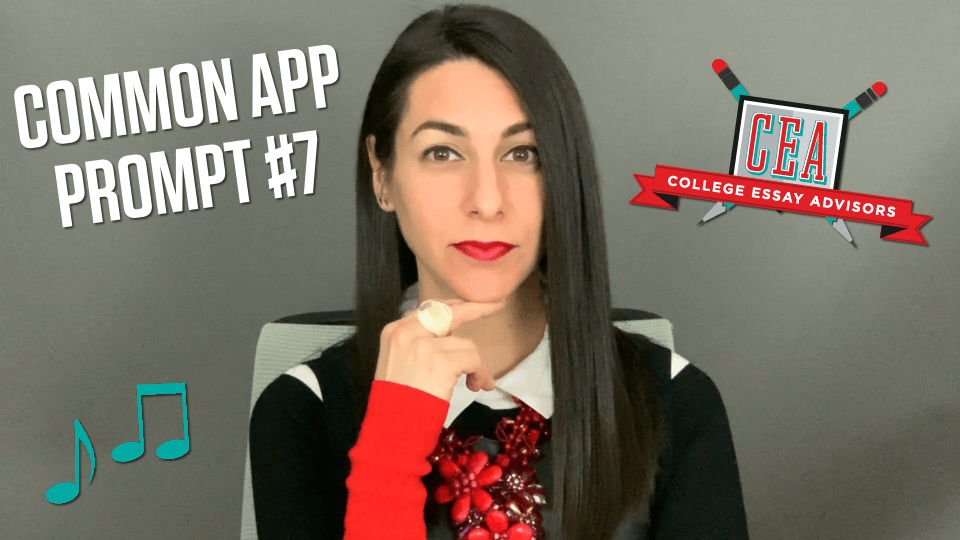
Guide to the Common App Essays: Tackling the Topic of Your Choice (Prompt 7)
The seventh essay prompt of the 2021-22 Common Application is the legendary topic of your choice. If you're wondering whether you should choose to respond to this prompt or one of the other six, stay tuned. College Essay Advisors' Founder and Chief Advisor, Stacey Brook, is here to point you in the right direction and give you some valuable advice along the way.
Supplemental Essays 101
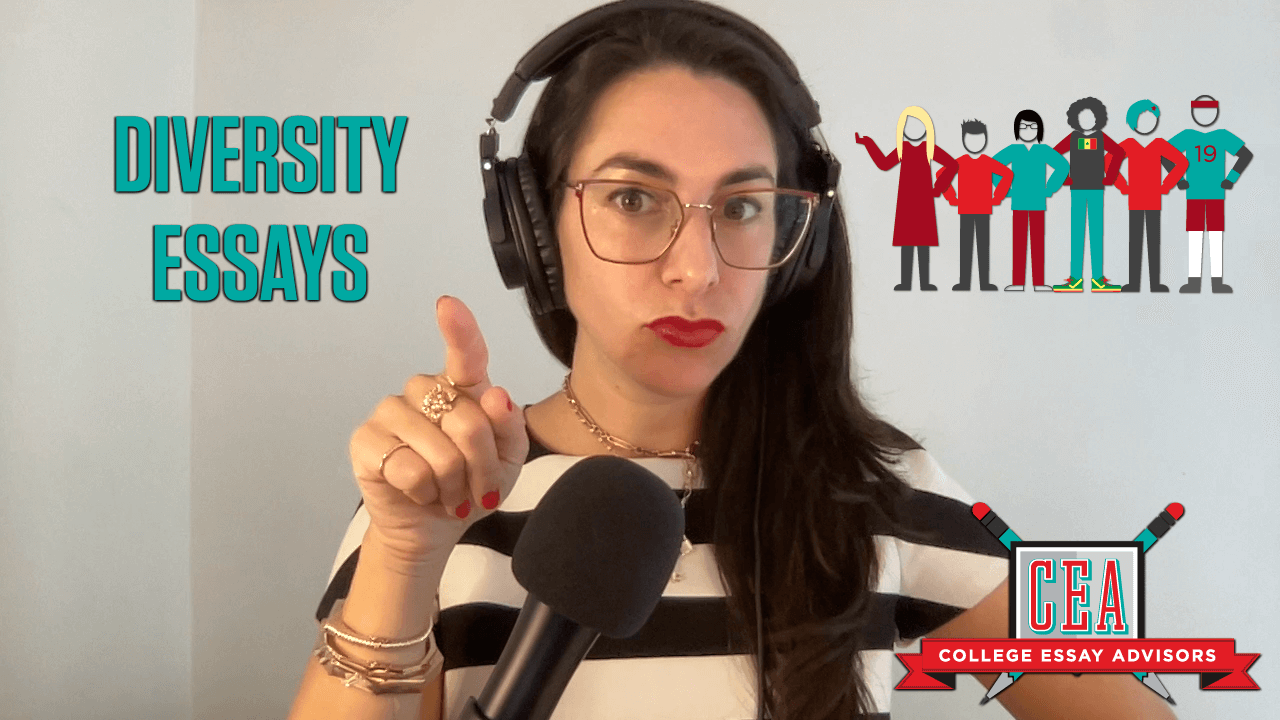
How to Write College Admissions Diversity Essays Regardless of Your Background
With the Supreme Court ruling on Affirmative Action came an avalanche of diversity essays meant to compensate for a missing tool that aimed to level the playing field. We here at CEA have celebrated the preponderance of opportunities to address race, gender, and other identity-oriented details on the application. We have also found that these prompts can be flummoxing for some students. CEA's Founder and Chief Advisor, Stacey Brook, is here to provide guidance to applicants who feel like they don't have an obvious "diversity" story to tell.

How to Write the Vanderbilt Supplemental Essays
Vanderbilt asks 2023-24 applicants to respond to one of two prompts in 250 words or fewer. CEA's Founder and Chief Advisor, Stacey Brook, is here to walk you through drafting a distinct essay response.
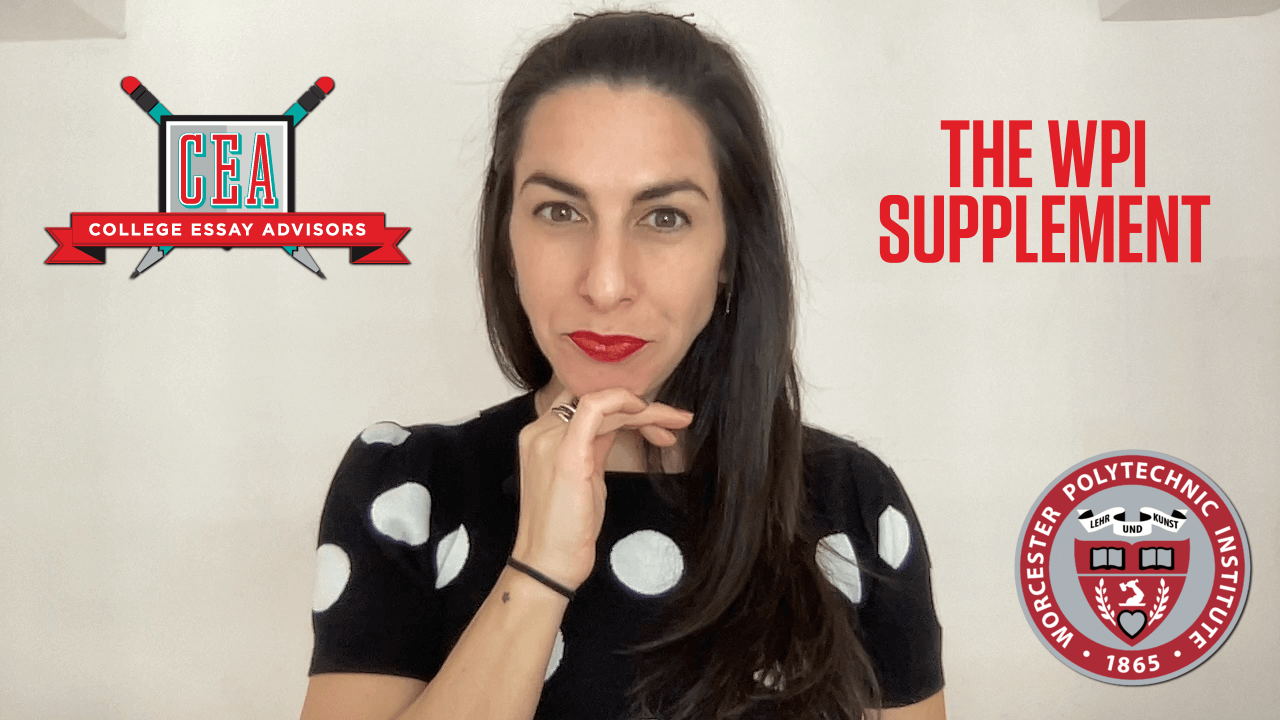
Guide to the Worcester Polytechnic Institute Supplemental Essay Prompt
Worcester Polytechnic Institute seeks students who are the right fit for its academic and campus community. CEA's Founder and Chief Advisor, Stacey Brook, is here to help you make your case as to why you're the perfect fit for WPI (and vice versa)!
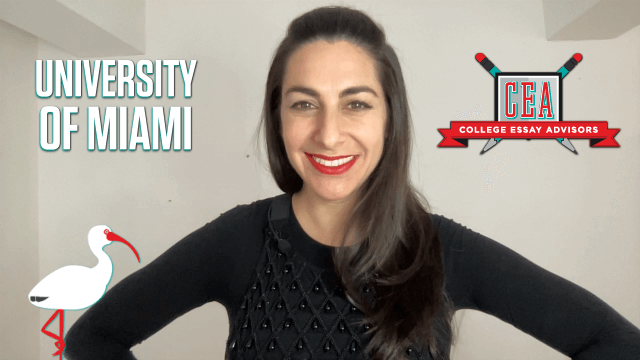
Guide to the University of Miami’s Supplemental Essay Prompt
The University of Miami asks applicants to respond to one supplemental essay prompt in 250 words or less (full text below). CEA's Founder and Chief Advisor, Stacey Brook, is here to share some tips and tricks for differentiating your response.
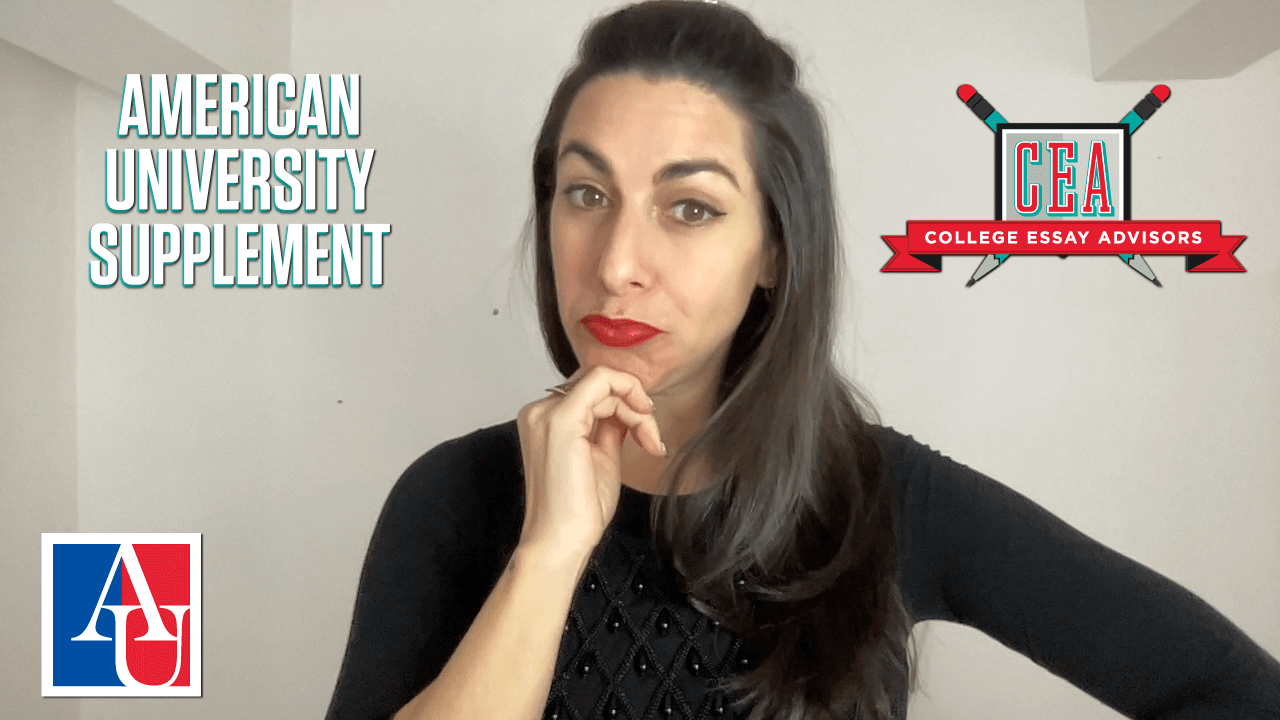
Guide to the American University’s Supplemental Essay Prompt
American University asks applicants to respond to the following prompt, "Why are you interested in American University?" in 150 words or less. With such few words at your disposal, you'll want to be succinct as possible. CEA's Founder and Chief Advisor, Stacey Brook, has some tips to help you get started on a distinct response.
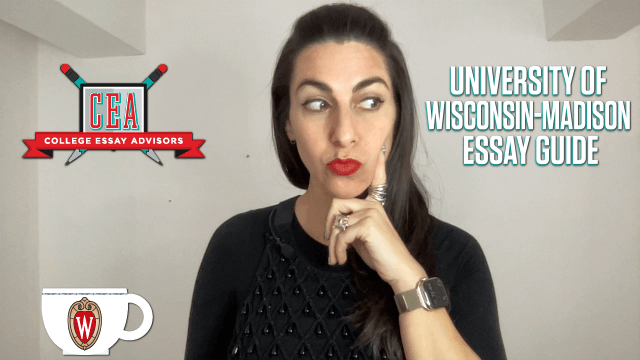
Guide to the University of Wisconsin-Madison’s Supplemental Essay Prompt
Admissions wants to know just what appeals to you about the University of Wisconsin-Madison. CEA's Founder and Chief Advisor, Stacey Brook, is here to lend tips and tricks for writing a winning supplemental essay for your Wisconsin-Madison application.
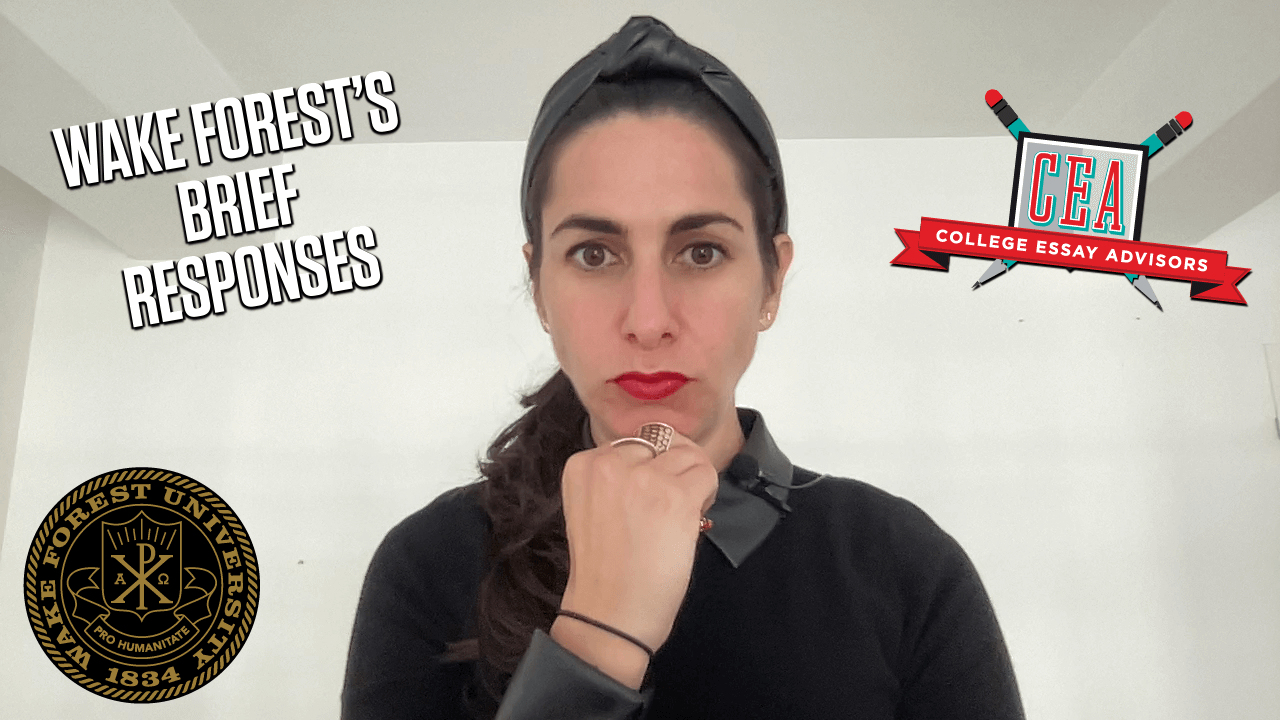
How to Respond to Wake Forest’s 150-Word “How Did You Become Interested in WFU?” Essay
CEA's Founder and Chief Advisor, Stacey Brook, is here to give you a jumpstart on your drafted response for Wake Forest's "Why?" essay: "How did you become interested in Wake Forest University? Feel free to tell us about any contact that you had with Wake Forest that was important to you. (150 words)"

How to Approach the 2021-22 Wake Forest Brief Responses (Writing Section)
CEA's Founder and Chief Advisor, Stacey Brook, is here to walk you through Wake Forest's 2021-22 Brief Responses, so you can submit a distinct and personal application to WFU.
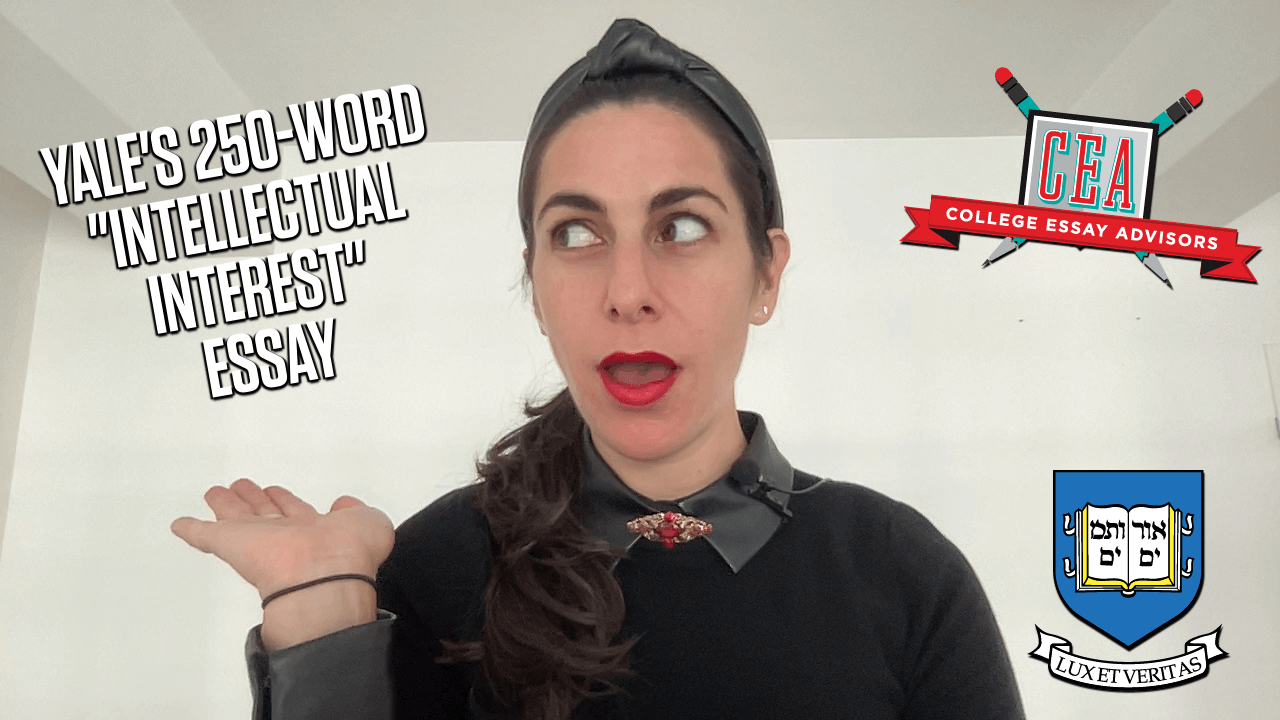
CEA’s Guide to Yale’s 2021-22 “Intellectual Interest” Essay
CEA's Founder and Chief Advisor, Stacey Brook, is here to break down Yale's 250-word "Intellectual Interest" essay, which reads, "Yale’s extensive course offerings and vibrant conversations beyond the classroom encourage students to follow their developing intellectual interests wherever they lead. Tell us about your engagement with a topic or idea that excites you. Why are you drawn to it?"
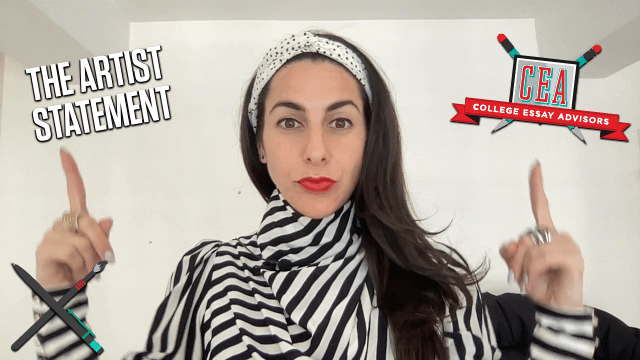
How to Write an Artist Statement
Many colleges and universities ask art students to write an artist statement as part of their applications. Writing an Artist Statement can be tricky, especially if you’re applying as an undergraduate.
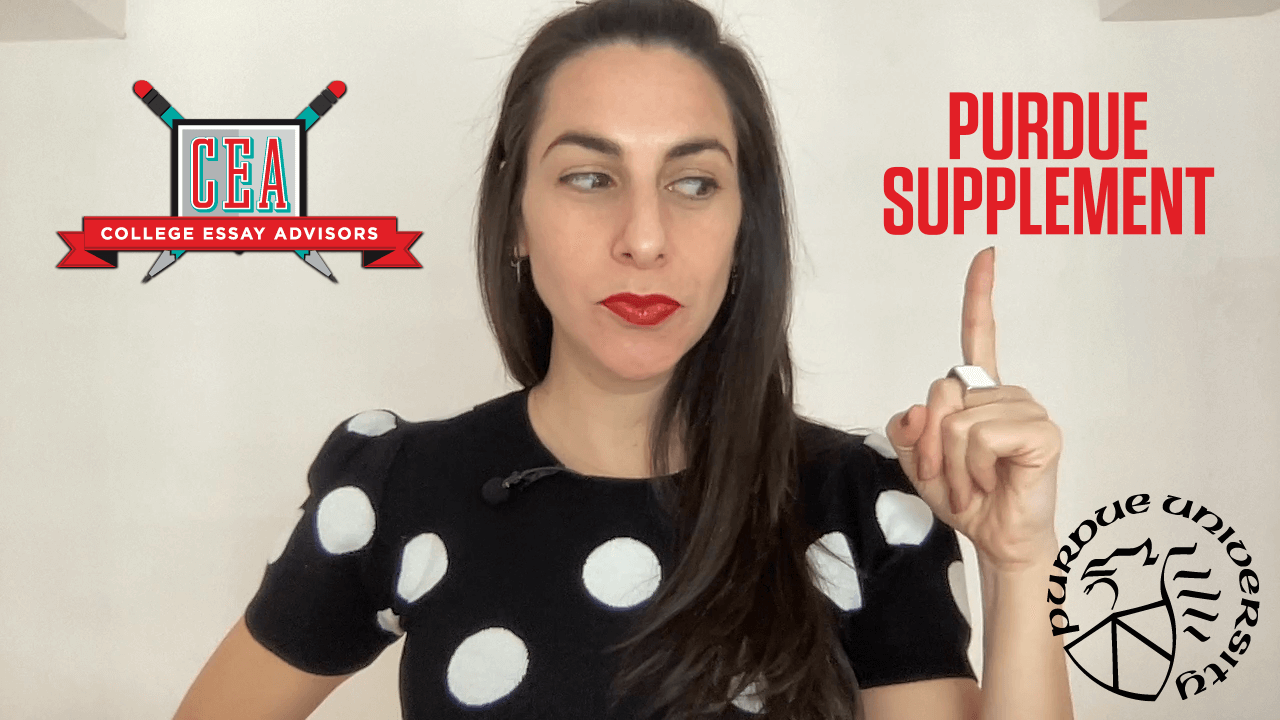
Guide to the Purdue University Supplemental Essays (2022-23)
Purdue University asks applicants to write three short supplemental essays as part of their admissions application. Founder and Chief Advisor of College Essay Advisors, Stacey Brook, is here to give you invaluable insight into the prompts and the motivation behind them so you can take advantage of this opportunity to speak to admissions in your own voice.
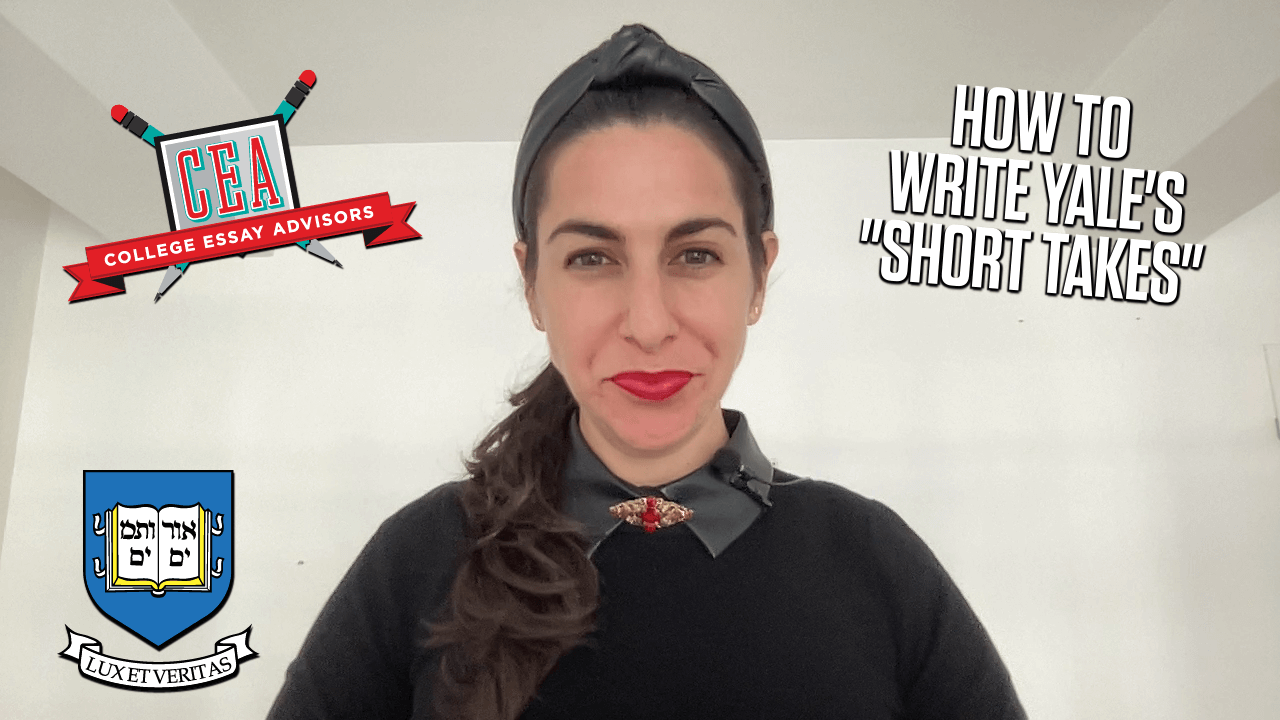
CEA’s Guide to Yale University’s “Short Takes” Supplement Section for the 2021-22 Application Year
CEA's Founder and Chief Advisor, Stacey Brook, is here to walk you through Yale University's "Short Takes" supplement section for the 2021-22 application season. It's time to brainstorm!
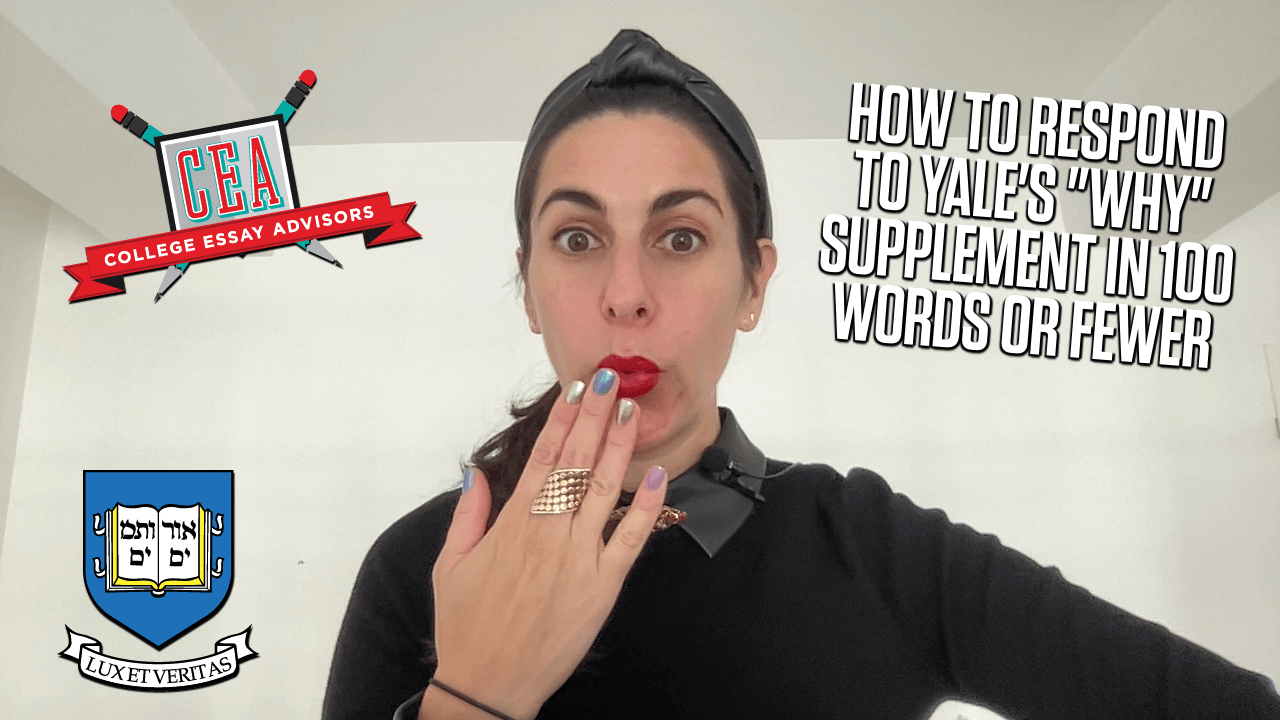
How to Respond to Yale University’s “Why Yale?” Supplement Section in 100 Words or Fewer
CEA's Founder and Chief Advisor, Stacey Brook, is here to walk you through the 2021-22 Yale University "Why Yale?" supplement section, so you can infuse your response with specificity while demonstrating fit.
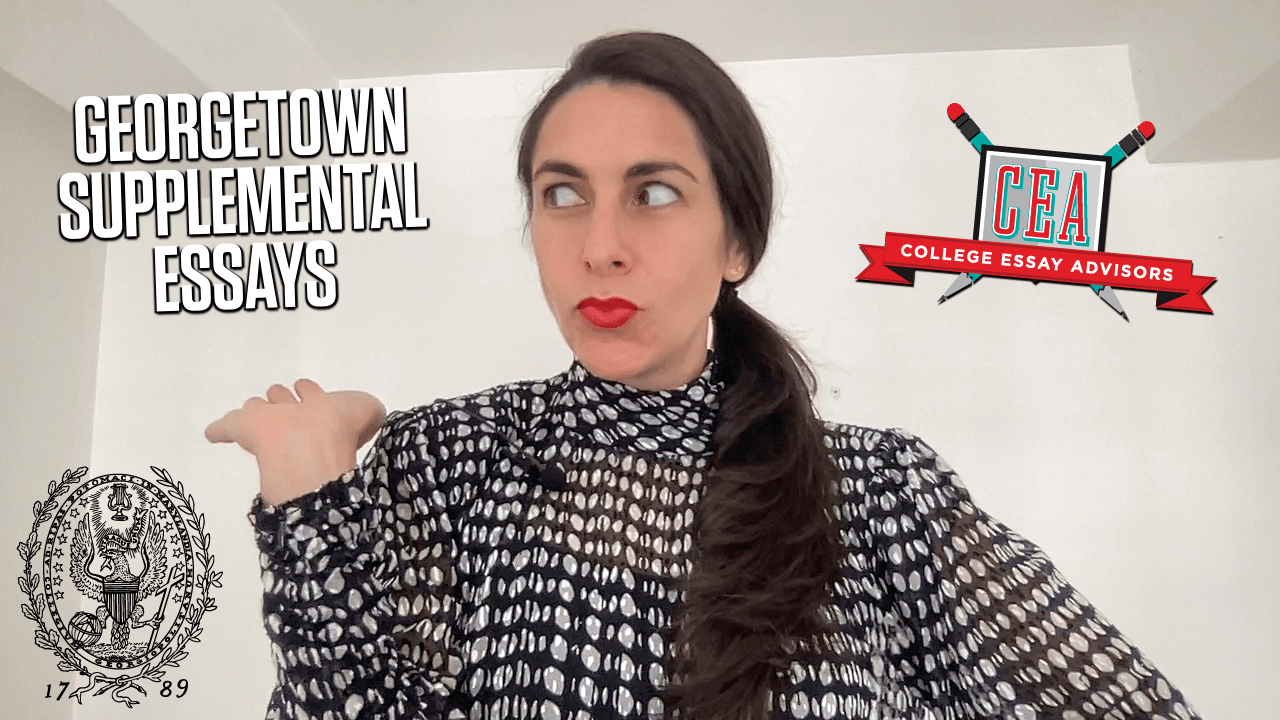
CEA’s Guide to the 2021-22 Georgetown University Essay Prompts
Georgetown University asks applicants to submit four (4) essays in their undergraduate admission application. CEA's Founder and Chief Advisor, Stacey Brook, is here to walk you through each of Georgetown's 2021-22 prompts, so you can draft with confidence.
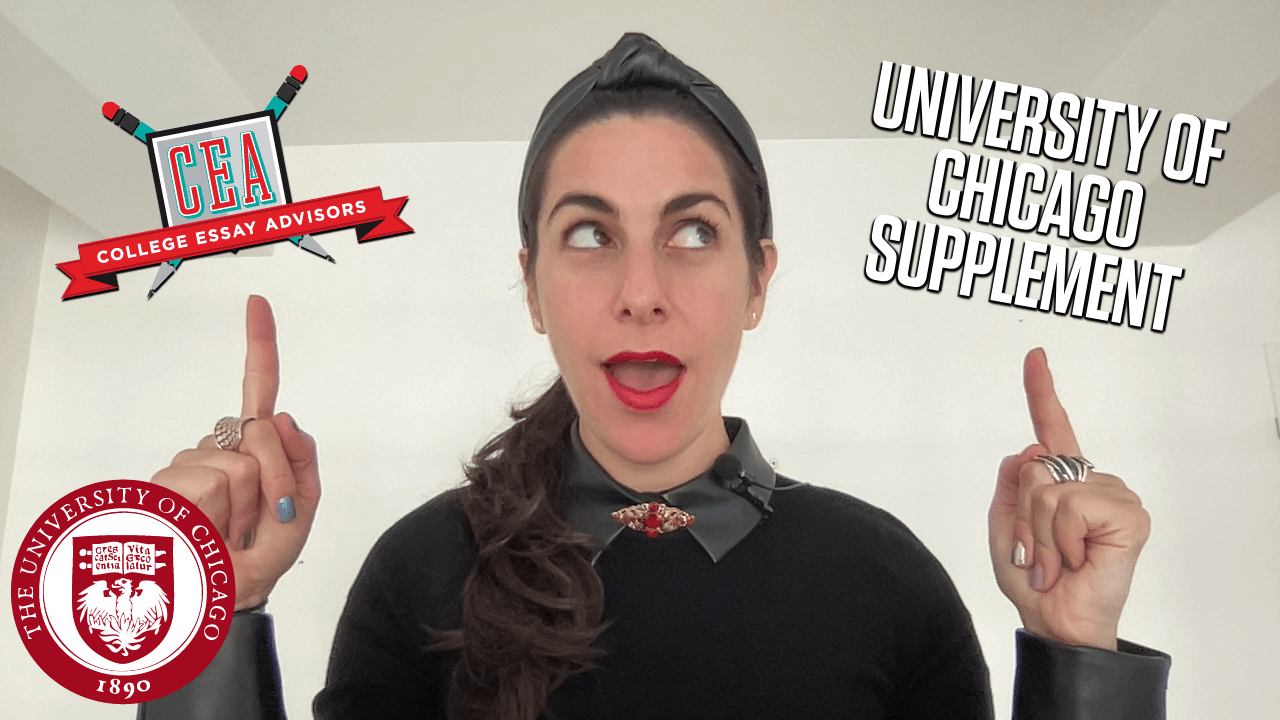
CEA’s Guide to the University of Chicago’s 2021-22 Supplemental Essay Prompts
CEA's Founder and Chief Advisor, Stacey Brook, is here to walk you through the 2021-22 University of Chicago supplemental essays, so you can better understand what admissions is looking for in your response.
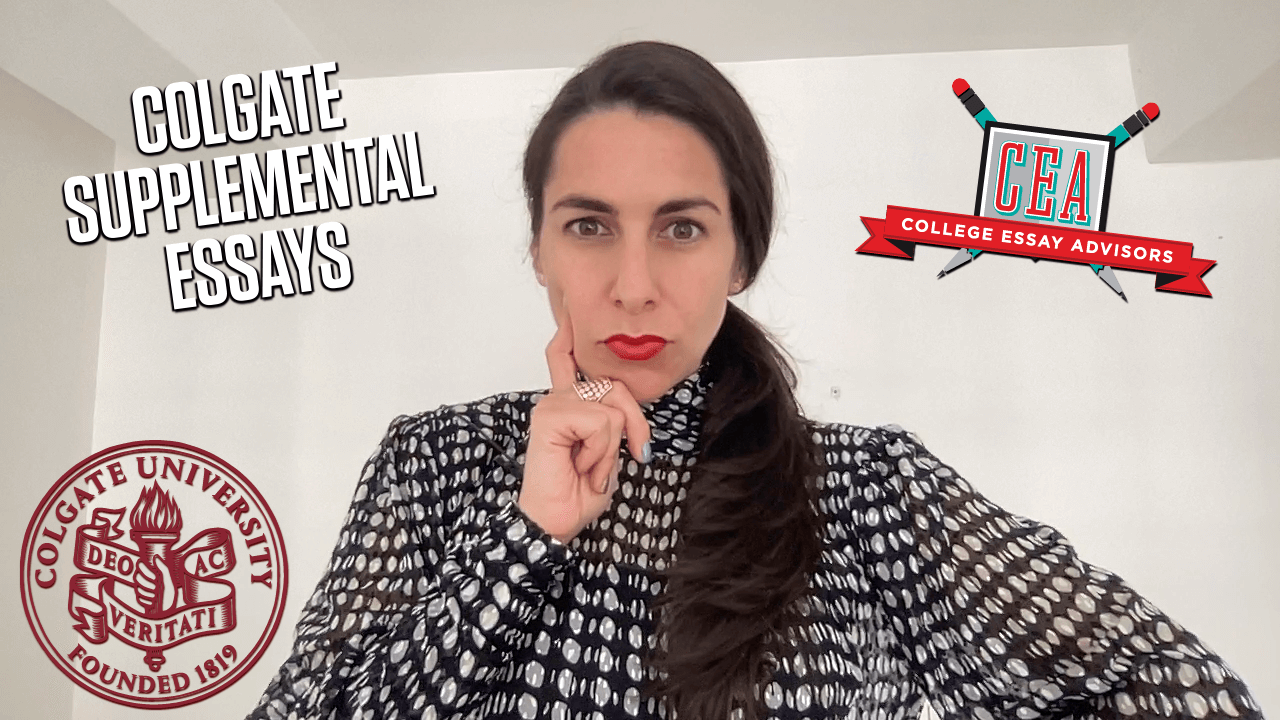
CEA’s Guide to the 2021-22 Colgate University Supplemental Essays (and List!)
CEA's Founder and Chief Advisor, Stacey Brook, is here to walk you through the 2021-22 Colgate University supplemental essays, so you can draft winning responses.
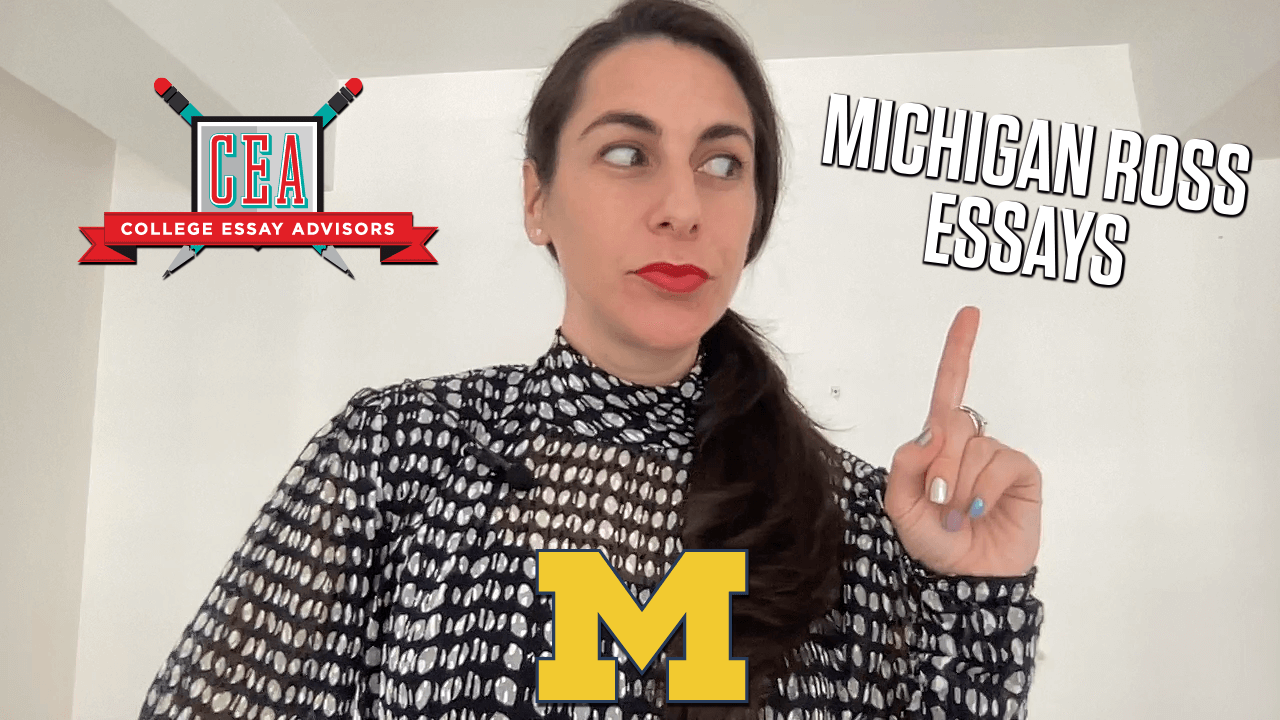
CEA’s Guide to the University of Michigan’s Ross School of Business Portfolio Submission
Preferred Admission applicants to the University of Michigan's Stephen M. Ross School of Business will complete a portfolio. This portfolio is in addition to the materials you submit with your Common Application or Coalition Application.
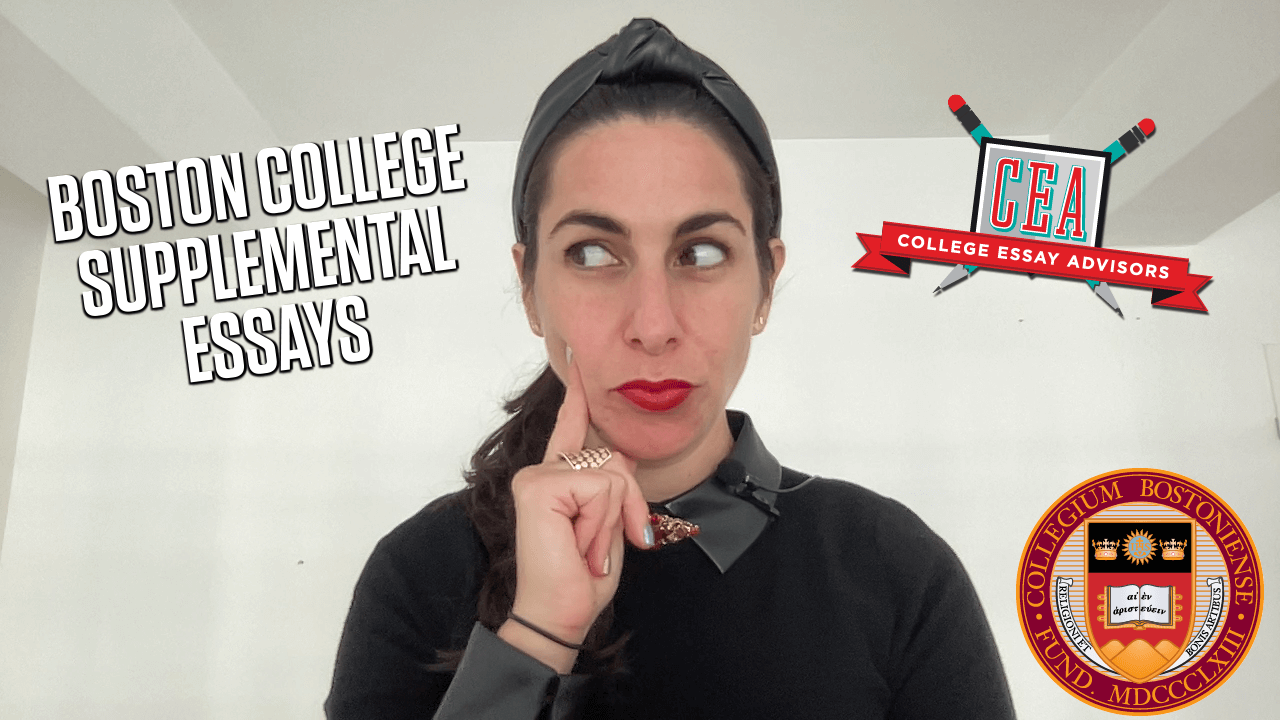
CEA’s Guide to the 2021-22 Boston College Supplemental Essay Prompts
Boston College asks students to select one prompt (out of five) to respond to in 400 words or less (prompts below). So what will you write about? Philosophy, racial injustice, conversation partners, introspection, or your favorite book? CEA's Founder and Chief Advisor, Stacey Brook, is here to give you all the information you need to select a prompt and write an amazing supplemental essay.
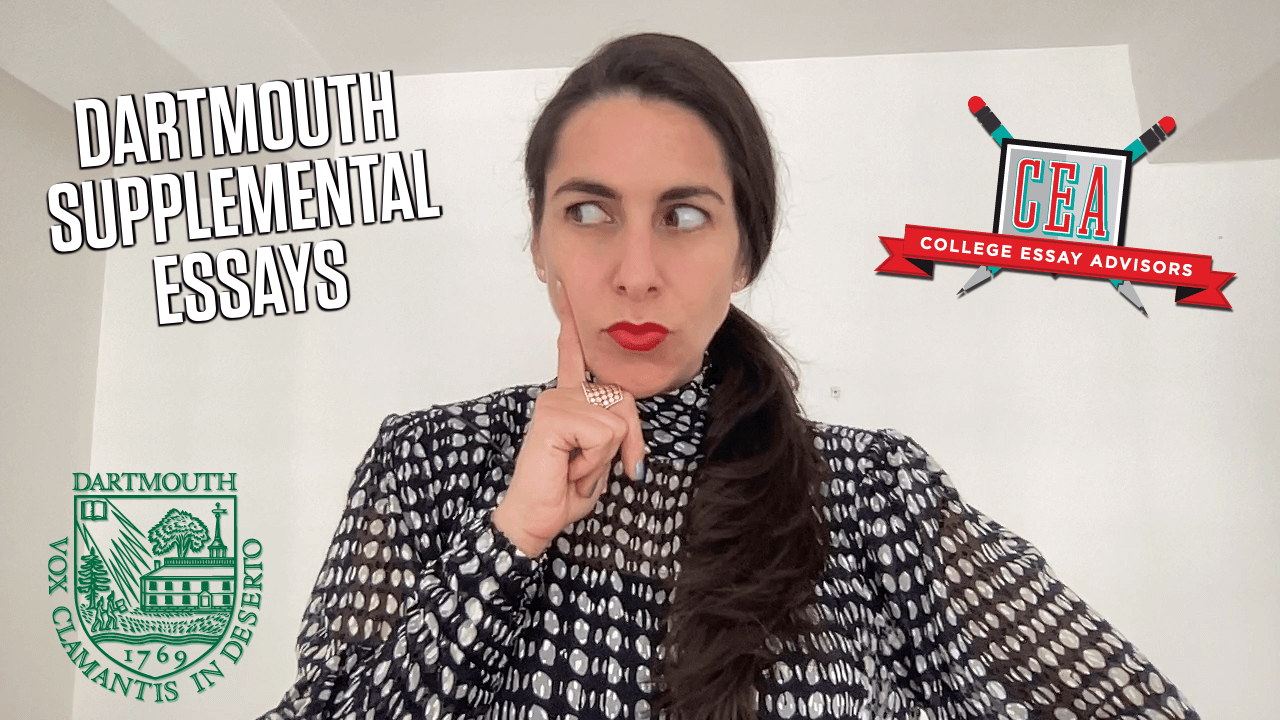
CEA’s Guide to the 2021-22 Dartmouth College Supplemental Essays
Dartmouth College is one of the most competitive schools in the country, and every year admissions officers are faced with countless applications from eager students looking to make the cut. Dartmouth's supplemental essay prompts are an opportunity for applicants to distinguish themselves from their peers. CEA's Founder and Chief Advisor, Stacey Brook, is here to break down the seven Dartmouth College supplemental essay prompts, so you can draft your responses with confidence.
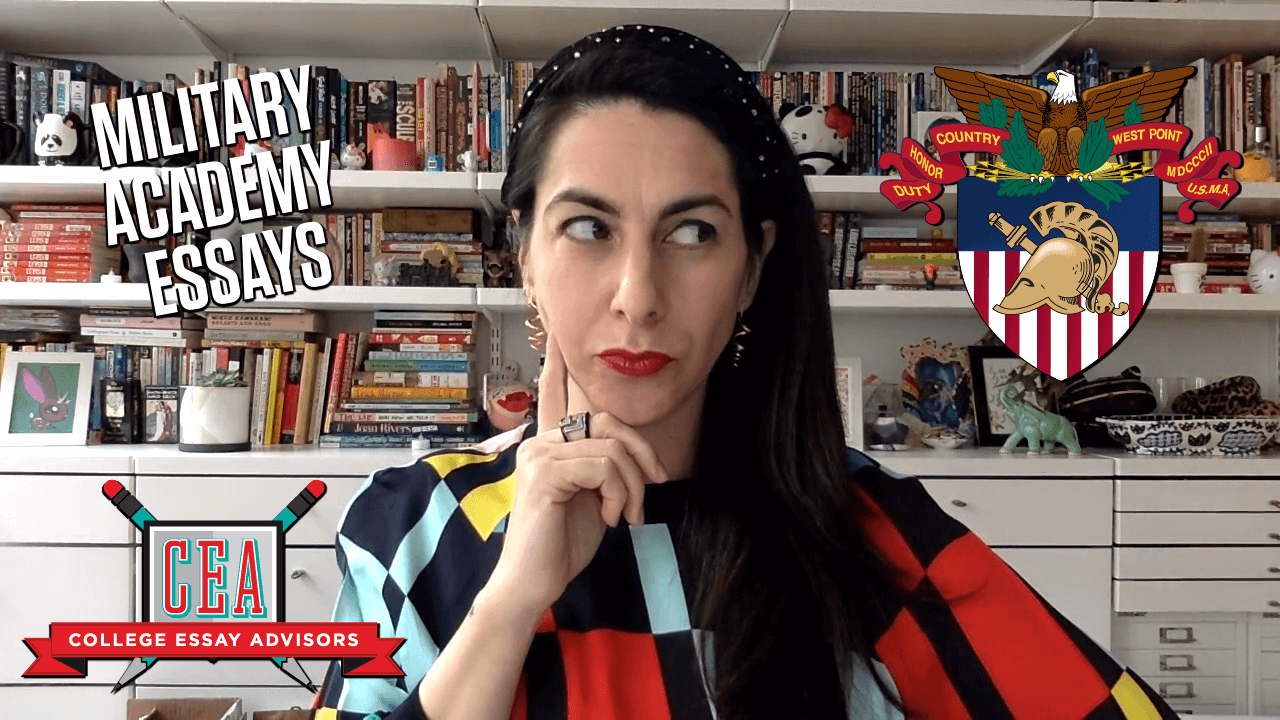
4 Types of Essay Prompts to Expect from Military Academy Applications
Whether you’re applying to the United States Air Force Academy, Naval Academy, Coast Guard Academy, Merchant Marine Academy, or West Point Military Academy, you can anticipate penning responses to these four types of essay prompts. CEA's Founder and Chief Advisor, Stacey Brook, is here to walk you through the four most common Military application essay categories!
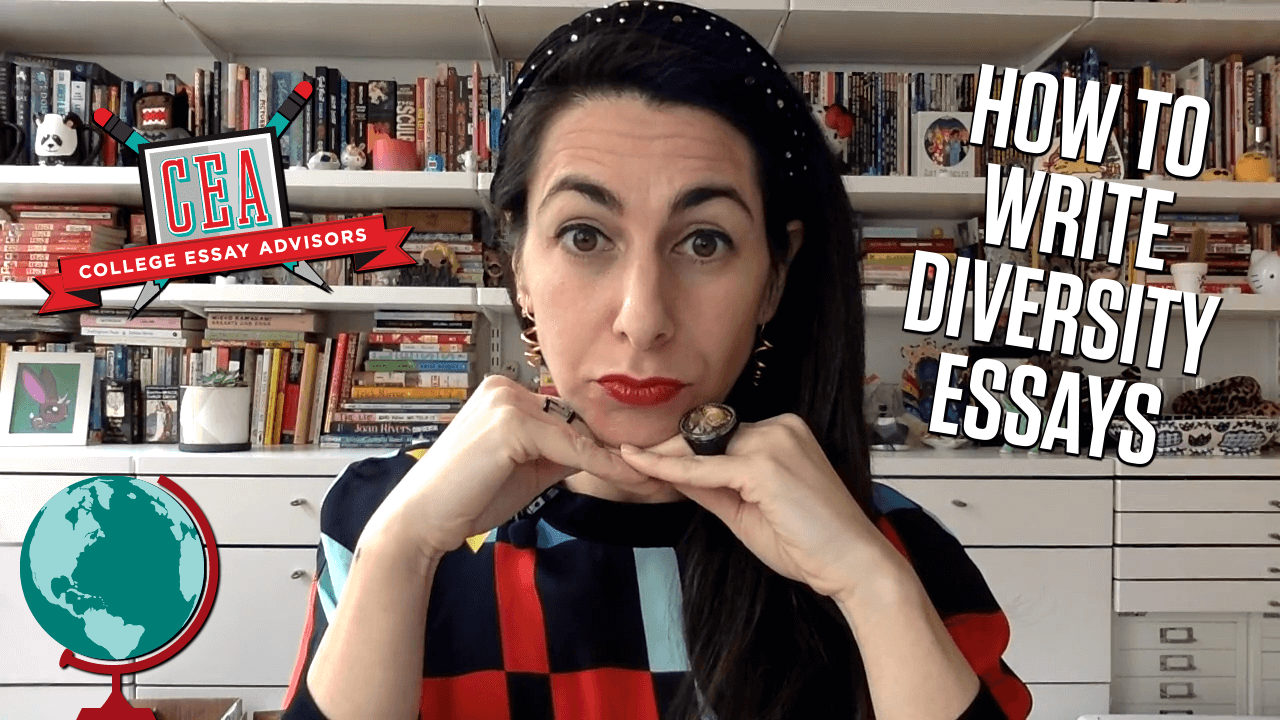
How to Respond to College Essay Prompts About Diversity and Inclusivity
Many colleges and universities have started asking applicants to respond to prompts that ask them about their experiences with diversity, inclusion, and equity. CEA's Founder and Chief Advisor, Stacey Brook, is here to walk you through the popular new supplemental essay prompt.

Guide to the 2020-21 University of Southern California (USC) Essays | CEA
So, we just have to say it: the USC application is kind of all over the place! You’ll be asked about everything from your academic interests to your life's theme song, so make sure to tighten the straps on your brainstorming helmet. Our Founder and Chief Advisor, Stacey Brook, is here to show you how to use every essay as an opportunity to showcase something different about yourself!

Guide to the 2020-21 University of California Essays | CEA
For the UC application, the rules may be unfamiliar but the game is the same: tell admissions something they don’t know, and then do it three more times! A strategic applicant will choose an amalgam of prompts that highlight vastly different aspects of their life and personality, leaving an admissions officer with a deep and complete picture of who they are. Our Founder and Chief Advisor, Stacey Brook, is here to help you avoid getting hung up on trying to find the questions admissions "wants" you to answer -- with each essay, your goal isn’t just to answer the question, but to tell a very short story about yourself!

Guide to the 2020-21 Georgetown University Essays | CEA
Since it's not on the Common App, Georgetown requires some extra special attention when it comes to its supplemental essay requirements! Luckily, our Founder and Chief Advisor Stacey Brook is here to give you invaluable insight into the prompts and discuss the motivation behind them. Take advantage of this opportunity to speak to admissions in your own voice!

Guide to the 2020-21 Harvard University Supplemental Essays | CEA
Harvard University is one of the most competitive schools in the country, and every year admissions officers are faced with countless applications from eager students looking to make the cut. As a result, Harvard's supplemental essay prompts are diverse and complex, to allow students an opportunity to distinguish themselves from their peers. If you're feeling overwhelmed, fear not! CEA's Founder and Chief Advisor, Stacey Brook, is here to break down the Harvard essays so you can hit submit with confidence.

Guide to the 2020-21 Stanford University Essays | CEA
The Stanford University application is nothing short of a doozie -- no less than EIGHT essays of varying lengths for students to answer and submit! To help you tackle this beast, our Founder and Chief Advisor Stacey Brook has created this video guide to walk you through each of the prompts, and give you the tips and tricks you need to make an impression on admissions.

Guide to the 2020-21 Boston University Essays | CEA
The Boston University essay requirements are a gift to students: two of the most straightforward prompts you could ask for, and only one of them is required! Of course, our Founder and Chief Advisor, Stacey Brook, doesn't believe that any essay is truly optional, so make sure you're taking advantage of every opportunity you have to speak to admissions in your own voice. Plan ahead, pay attention to the questions, and above all don't wait until the last minute to start your work!

Guide to the 2020-21 University of Michigan Essays | CEA
We know that submitting your application to the University of Michigan can cause some serious stress. Thankfully, this year Michigan only requires two supplemental essays instead of three! Our Founder and Chief Advisor, Stacey Brook, is here to give you invaluable insight into the prompts and provide you with tips and tricks to help you showcase yourself to admissions using your own unique voice.

Guide to the 2020-21 New York University Supplemental Essay | CEA
New York University (NYU) asks undergraduate applicants to write one supplemental essay (prompt in description below) on top of their Common App personal statement. CEA's Founder and Chief Advisor, Stacey Brook, is here to tell you everything you need to know in order to craft a winning response!

Guide to the 2020-21 Brown University Supplemental Essays | CEA
Applying to an Ivy League institution, such as Brown University, can be incredibly stressful! Luckily for you, CEA's Founder and Chief Advisor, Stacey Brook, is here to walk you through Brown's four (4) supplemental essay prompts.

Are “Optional” College Essay Prompts Really Optional?
Every year, colleges and universities around the world offer applicants the opportunity to respond to "optional" supplemental essay questions...But are these prompts truly optional? CEA's Founder and Chief Advisor, Stacey Brook, lets you in on a college admissions secret.
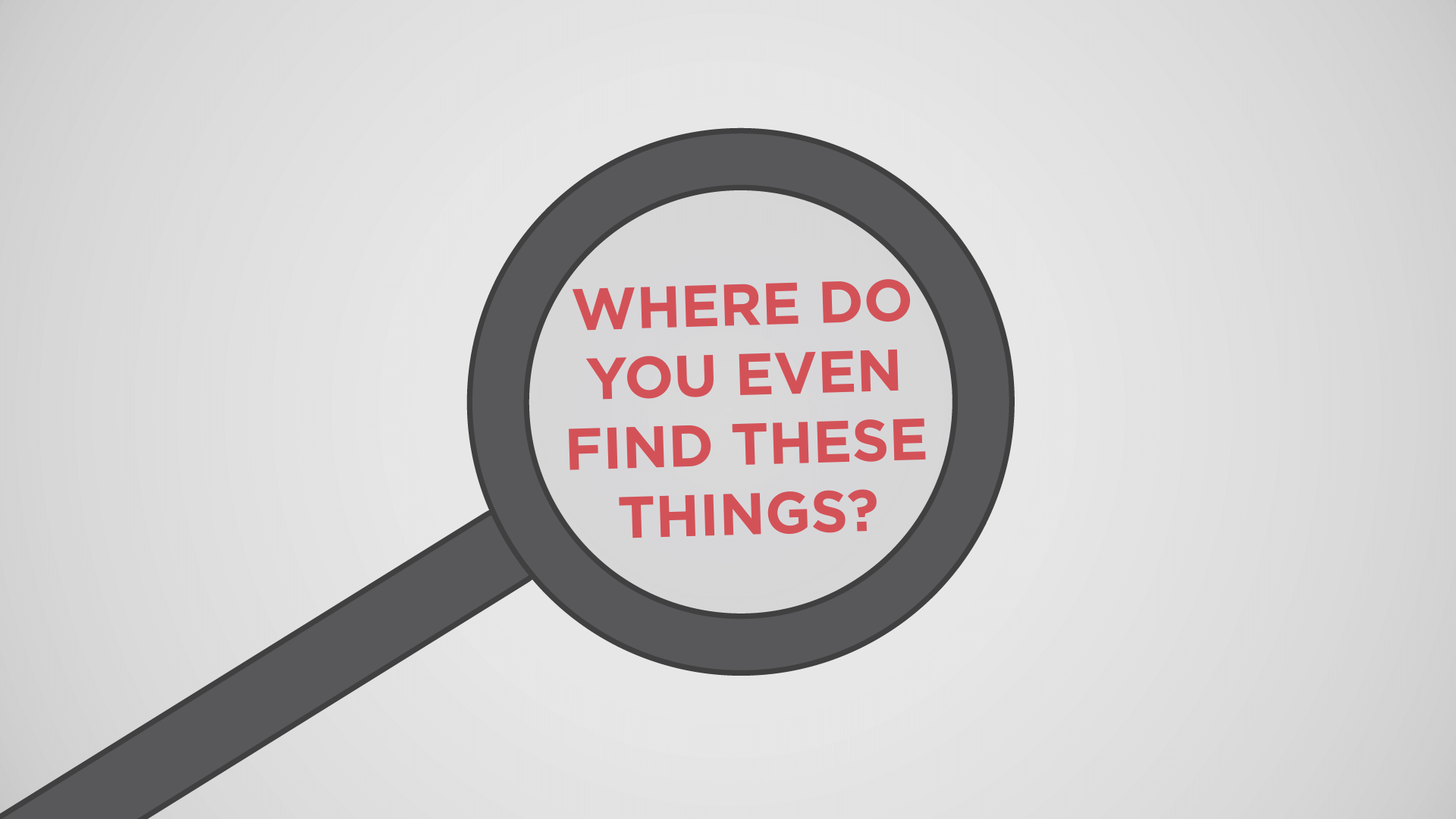
The Expert’s Guide to Finding Sneaky Supplemental Essays
There's probably a section of the Common Application that says "Writing", in which all of the supplemental essays live, right? WRONG! Supplements can be found in a variety of places and can sneak up on students who have spent months preparing to submit their applications. Don't let that be you! This video will detail the several different places where you can find supplemental essays.
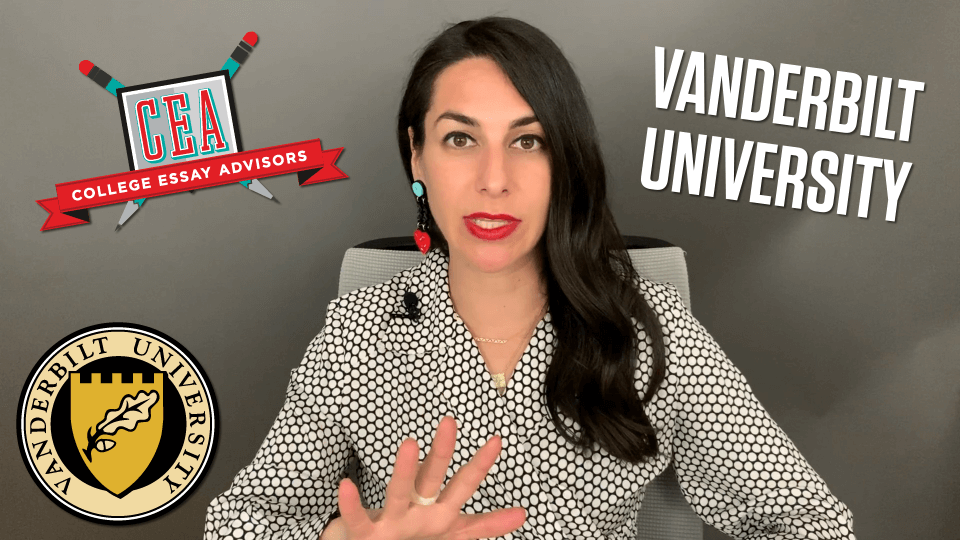
How to Write Vanderbilt University’s “Extracurricular Activities” Essay
Vanderbilt University's supplement consists of one prompt (text below). CEA's Founder and Chief Advisor, Stacey Brook, is here to help you take full advantage of this opportunity to illuminate your leadership skills or personal values for admissions.
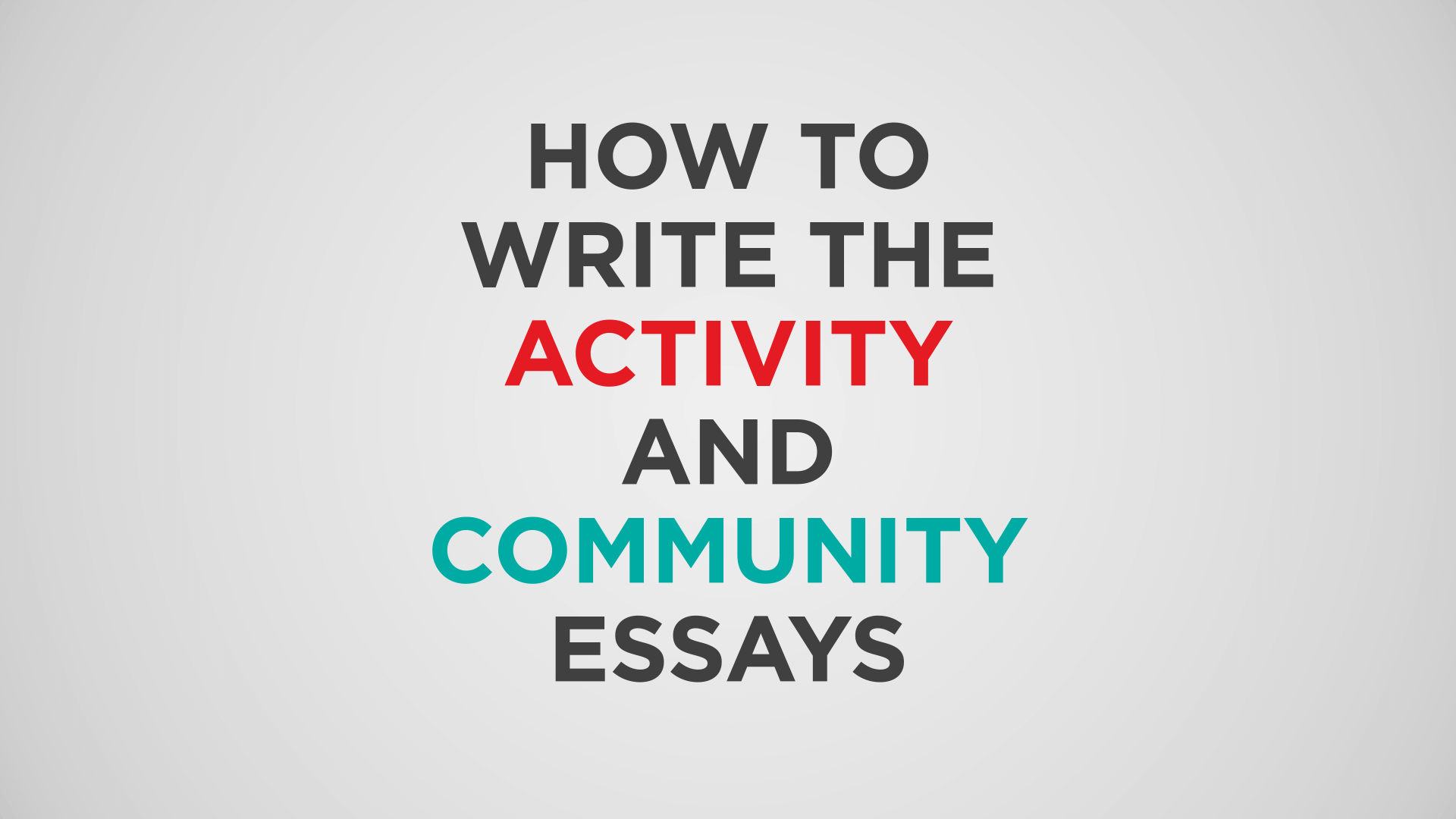
The College Application ‘Activity’ and ‘Community’ Essays: What You Need to Know
Want the key to writing the most important and pervasive school-specific supplemental essays? We've got the tips and tricks you need to conquer the ever-popular "Activity" and "Community" supplements so you can showcase for admissions how you spend your time, where you feel like you belong and what truly motivates you to action. Assigned by schools like Harvard, Stanford, The University of Michigan and so many more, mastering these supplemental essays will ensure you utilize every opportunity a school's application provides to showcase your strengths.
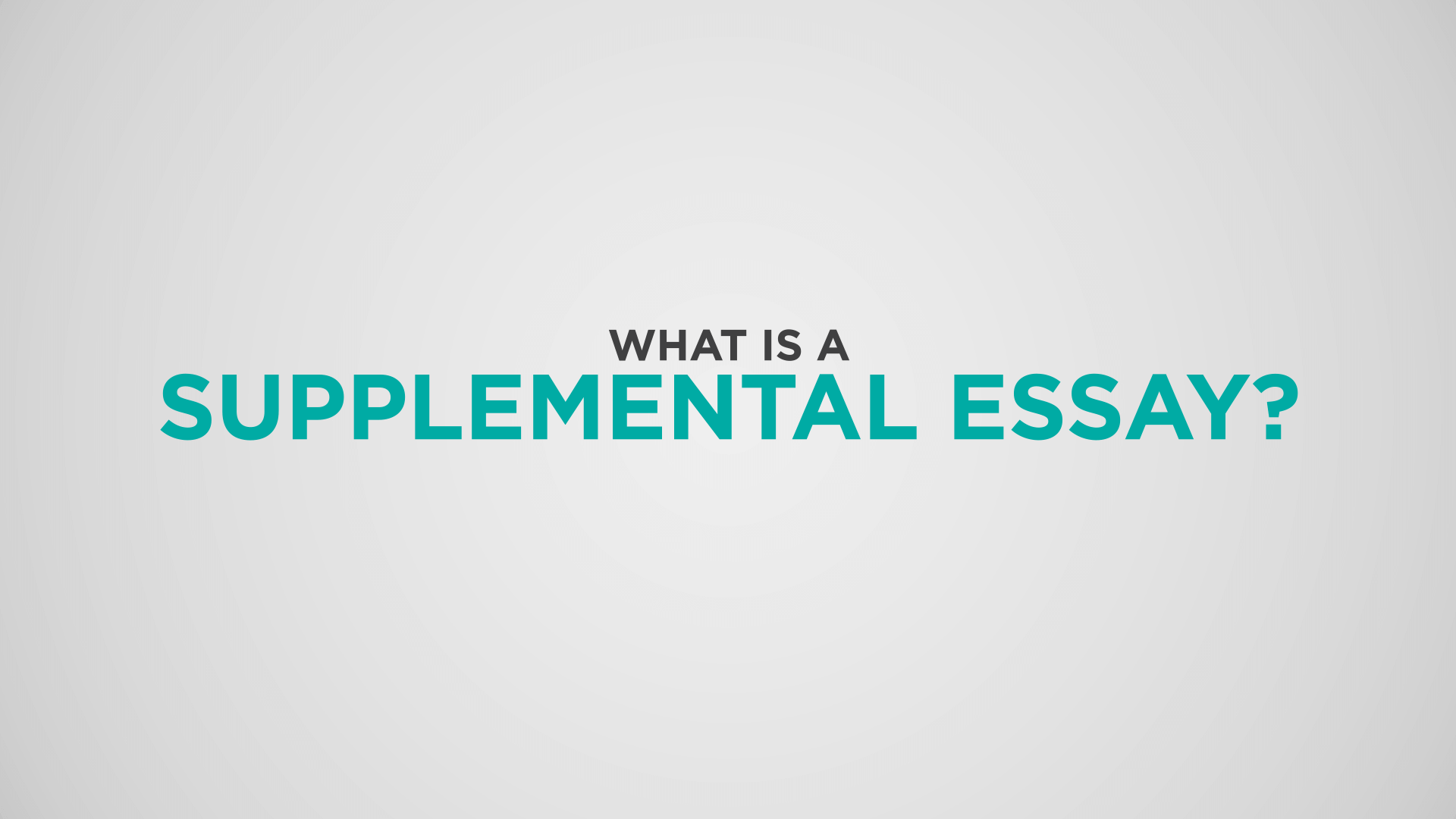
What is a Supplemental Essay?
Most supplemental essay prompts are designed to both gauge a student’s interest and determine where a student might fit into a school’s particular community. Typically, these essays focus more specifically on future academic and professional goals, school-related activities and a student's role in your current community than the Common App's personal statement. Watch this video for a short and sweet introduction to supplemental essays. Know what you're up against!
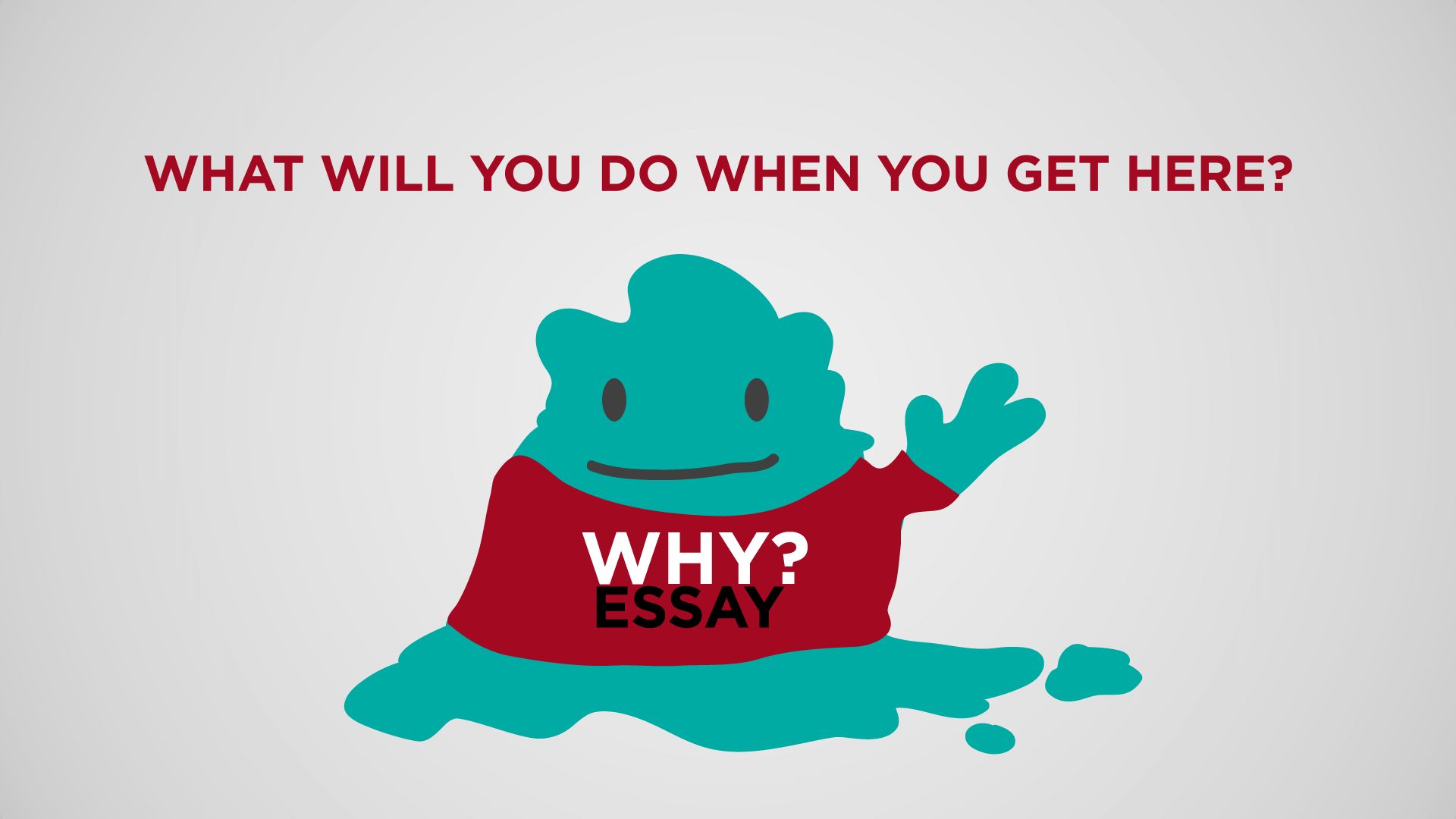
How to Write a Powerful “Why Do You Want to Go Here?” Essay (The Why Essay)
The Why Essay takes on many forms and can ask many questions: What will you do when you get here? How will you take advantage of all the resources our school has to offer? How will the school support your academic or professional goals? How do your past experiences or future goals support these claims? It’s likely that many schools to which you apply will as the Why question in slightly different ways (and with a WIDE range of word limits). This video will teach you everything you need to know about how to respond to the "Why do you want to go here?" essay.
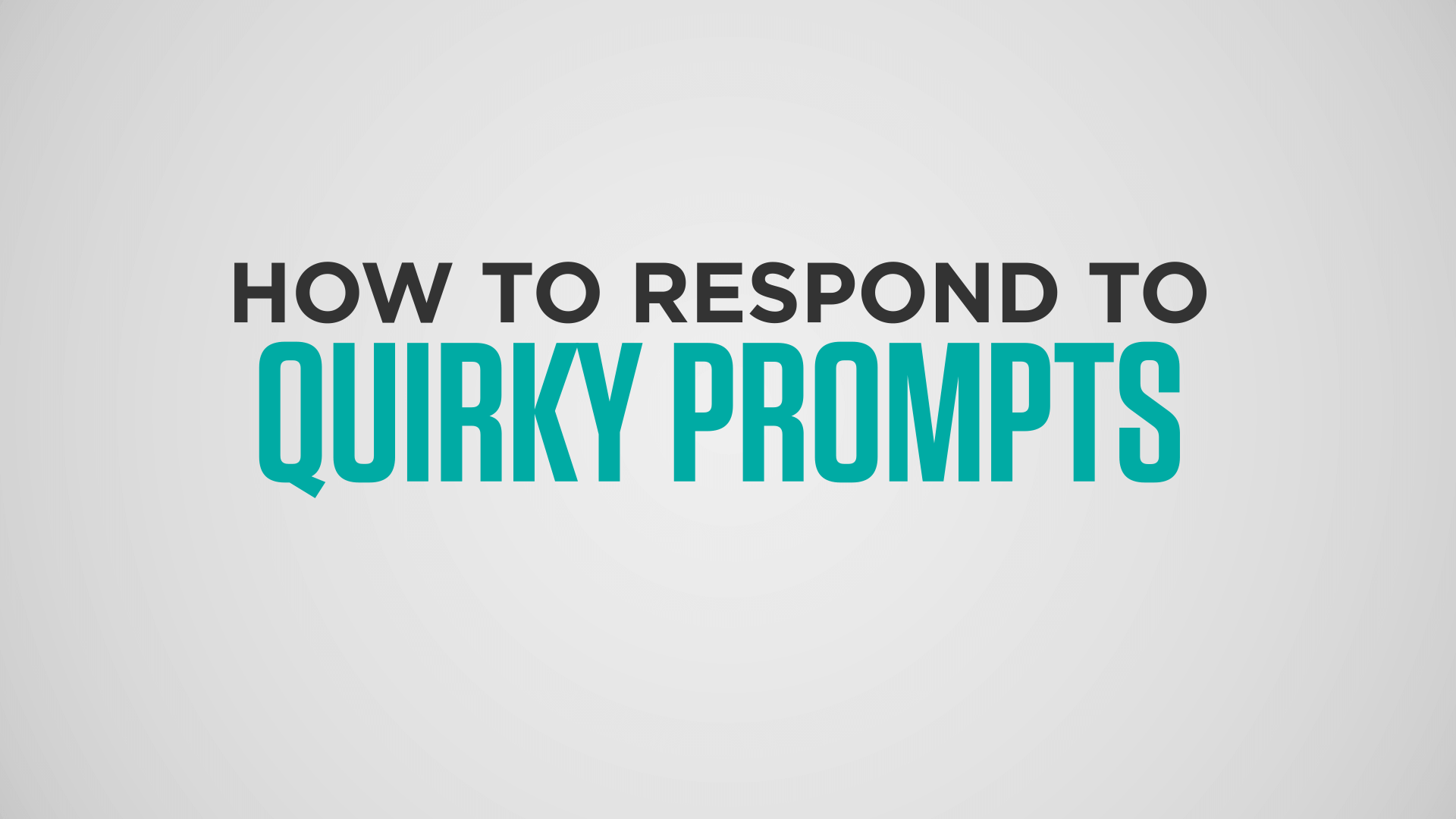
How to Respond to Quirky, Odd, and Bizarre College Essay Prompts
There are certain schools, like the University of Chicago, who have always taken special pride in developing crafty questions for their applicants to answer. In recent years, more schools are jumping on the bandwagon, luring students to their applications with questions like “What does #YOLO mean to you” (Tufts, 2013). This is both fun and exhausting for applicants who are grateful for an injection of modern, quirky inspiration, but whose creative wells may be running dry. This video will get down to the bottom line: Why are schools asking these questions and what are they looking for in applicants' responses?
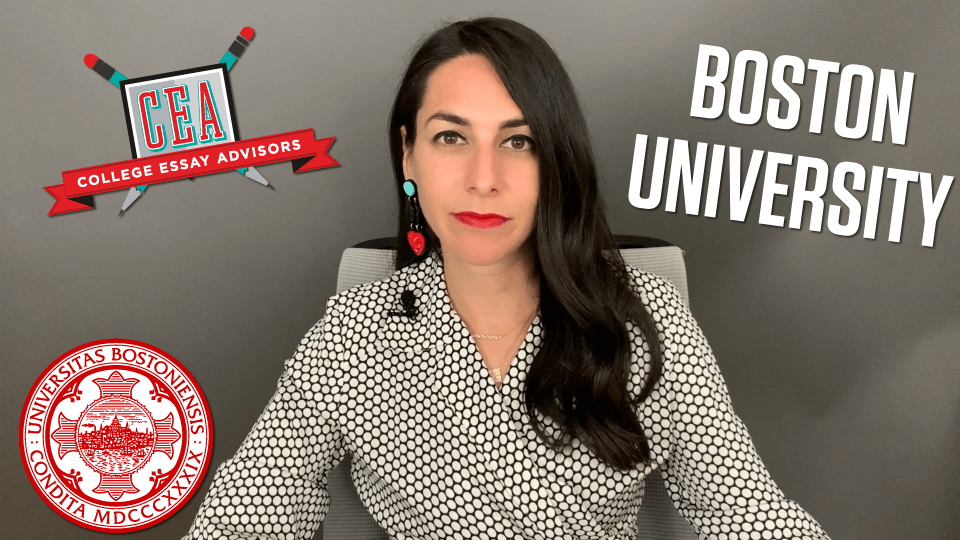
How to Gain Acceptance to Boston University (with Winning Supplemental Essays)!
The Boston University application supplement is a gift: two of the most straightforward prompts you could ask for, and only one of them is required [full prompts below]. But beware, a simple supplement is no reason to ignore a school or save it until the last minute. In fact, it means you have no excuse not to nail your essay, so pay attention and do your work!
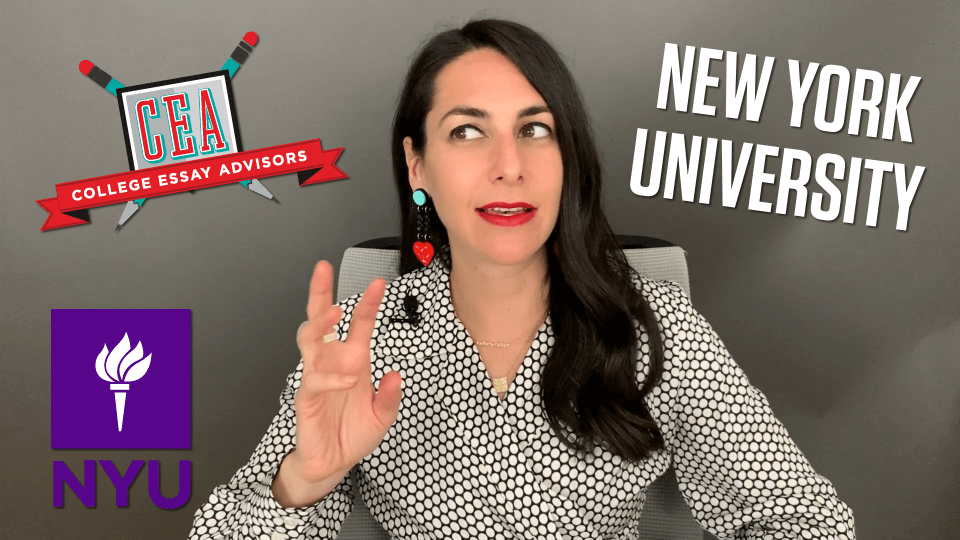
How to Write the “Why NYU?” Essay
New York University (NYU) asks undergraduate applicants to pen one supplemental essay (prompt below) in addition to the personal statement. CEA's Founder and Chief Advisor, Stacey Brook, is here to tell you everything you need to know in order to draft a compelling response.
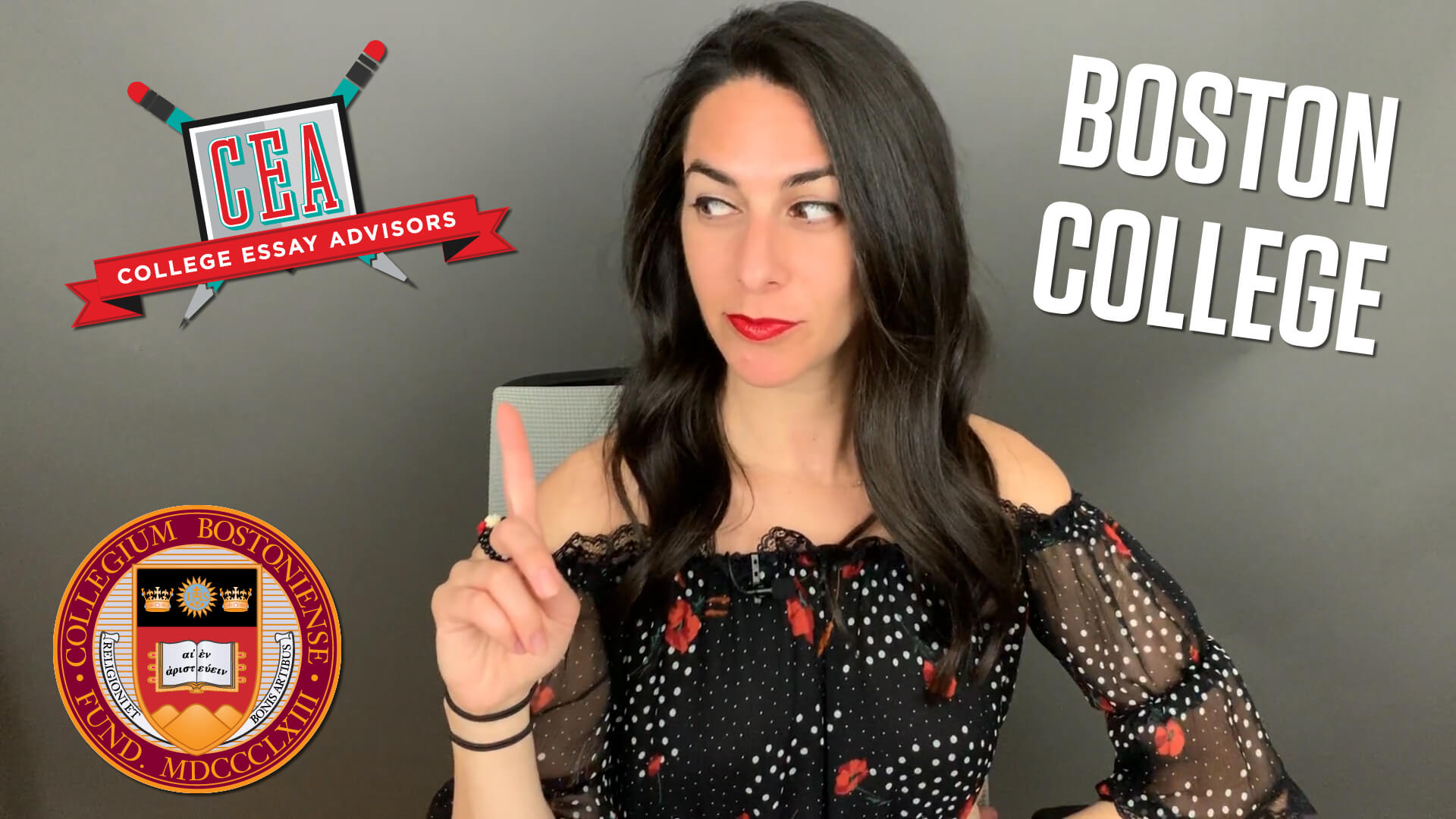
How to Gain Acceptance to Boston College (with a Winning Supplemental Essay)!
Boston College asks students to select one prompt (out of four) to respond to in 400 words or less (prompts below). So what will you write about? Art, community, a contemporary problem, or character formation? CEA's Founder and Chief Advisor, Stacey Brook, is here to give you all the information you need to select a prompt and write an amazing supplemental essay.
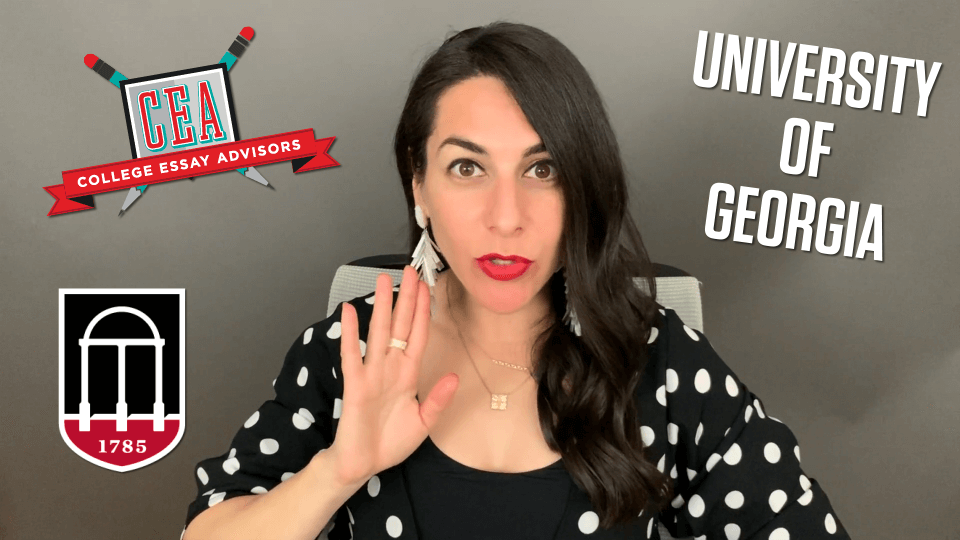
How to Write Fantastic Application Essays for the University of Georgia
The University of Georgia asks students to write two application essays of 200-300 words. The first prompt is set in stone, and for the second essay, applicants can choose one of four prompts to respond to [prompts below]. CEA's Founder and Chief Advisor, Stacey Brook, is here to tell you everything you need to know about choosing and responding to these prompts for UGA. Let's begin!
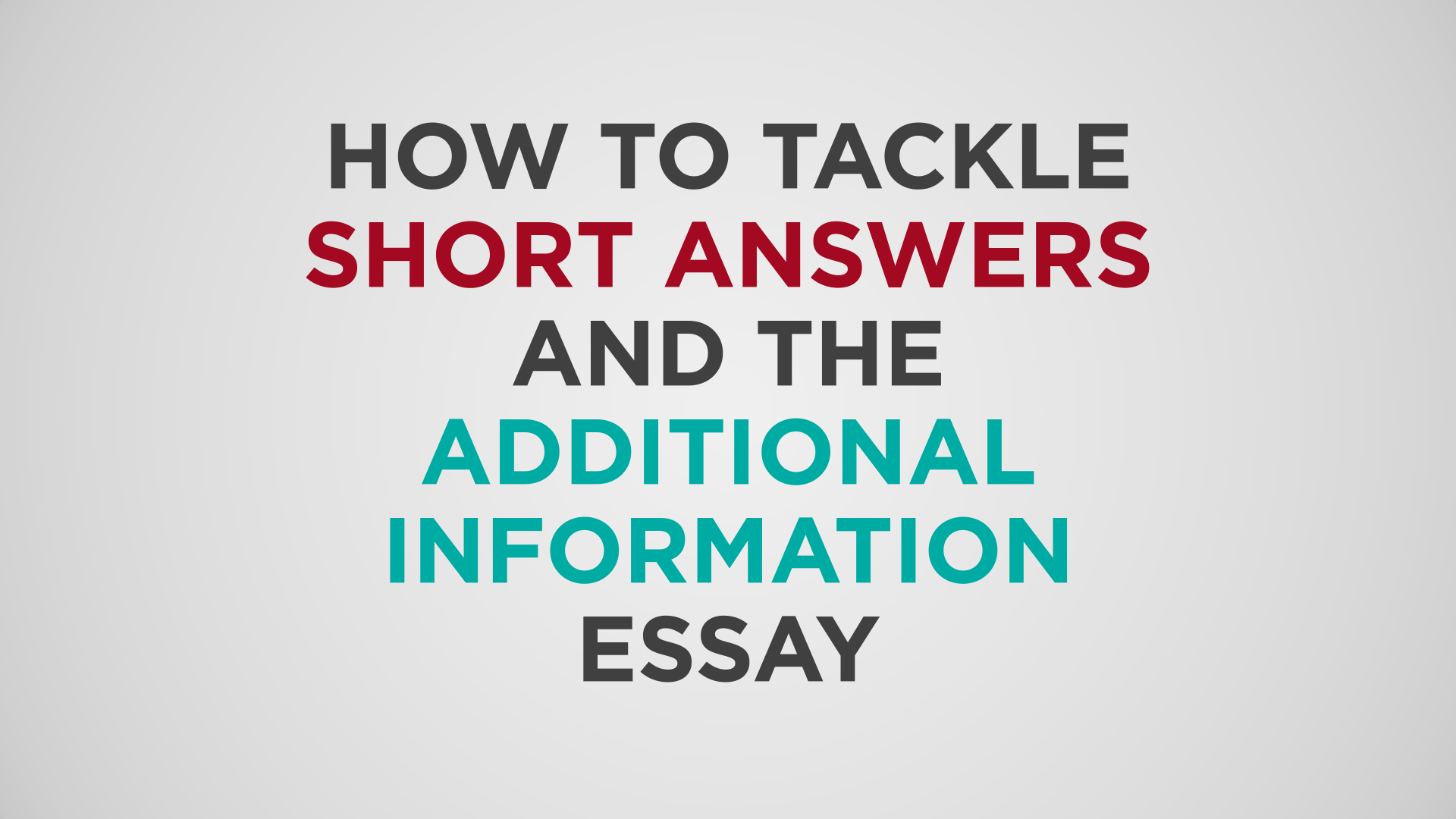
How to Write Short Answers and the Additional Info Essay
The challenge of short answer questions lies half in generating honest, unique and clever ideas, and the other in being concise. The purpose of additional info essays is to provide admissions with an explanation for a drop in grades, low test scores, or prolonged absences. Both of these essay types need to be handled with care -- and that's exactly what this video will show you how to do.
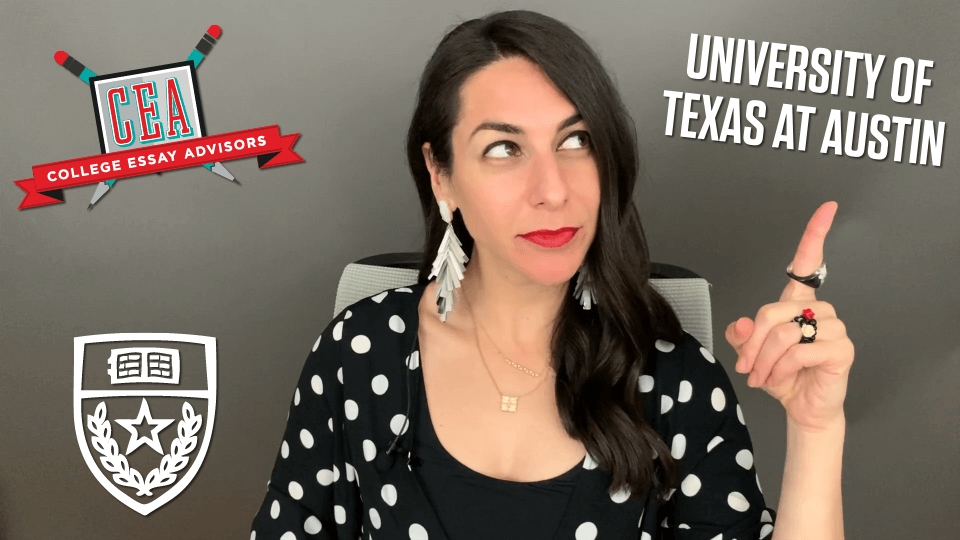

How to Get Into University of Texas: Austin (with Great Application Essays!)
The University of Texas: Austin application is a beast unto itself, with a slew of essay prompts (full text below) that ask you to dig into all aspects of your life. From your home life to your future plans, you're going to have to tell all -- and in a way that sets you apart! Luckily CEA's Founder, Stacey Brook, is here to break down the prompts so you're ready to tackle anything Texas' independent platform throws at you.
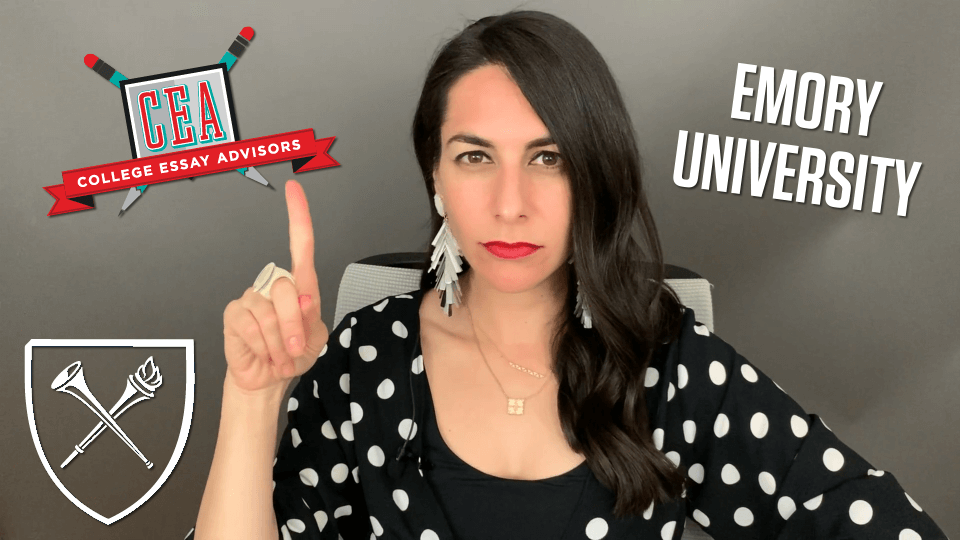
How to Get Into Emory University (With Amazing Supplemental Essays!)
Emory University asks first-year applicants to write two (2) essays in addition to the personal statement. Applicants must choose one prompt from the "Reflections" category and one prompt from the "Tell us about you" category. CEA's Founder and Chief Advisor, Stacey Brook, is here to tell you everything you need to know about choosing and responding to these prompts. Let's begin!
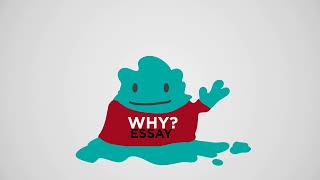
How To Answer Supplemental Application Questions: “Why Do You Want To Go Here?”
These days, most colleges and universities require supplemental applications in addition to the Common Application. You could be looking at a list of 10+ supplemental essays, so we made you a quick guide to the most common supplemental question: "Why do you want to go here?"
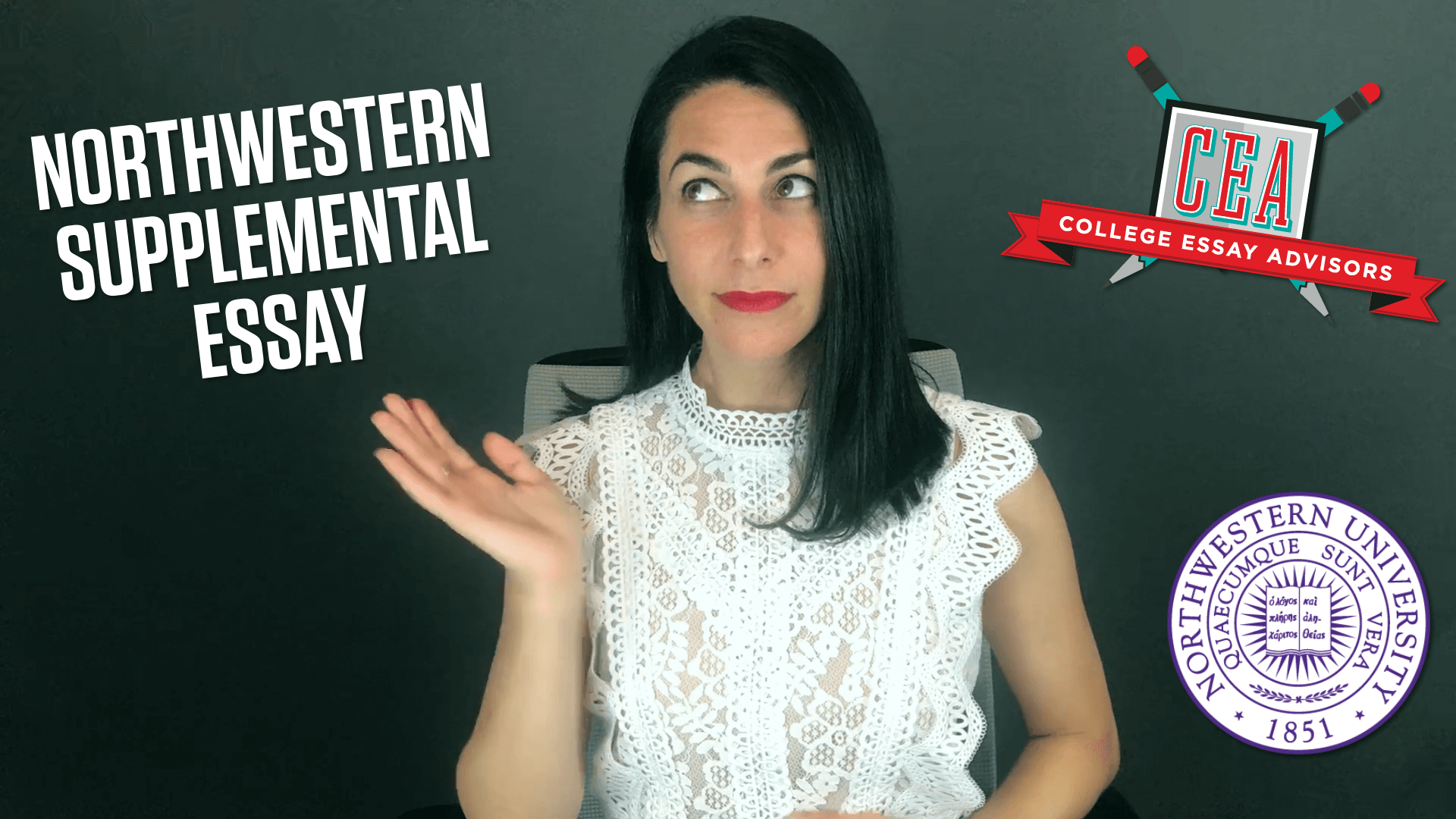
Guide to the 2018-19 Northwestern University Supplemental Essay
Are you planning to apply to Northwestern University? The Founder and Chief Advisor of College Essay Advisors, Stacey Brook, is here to give you invaluable insight into Northwestern's supplemental essay prompt so you can take advantage of this opportunity to speak to admissions in your own voice.
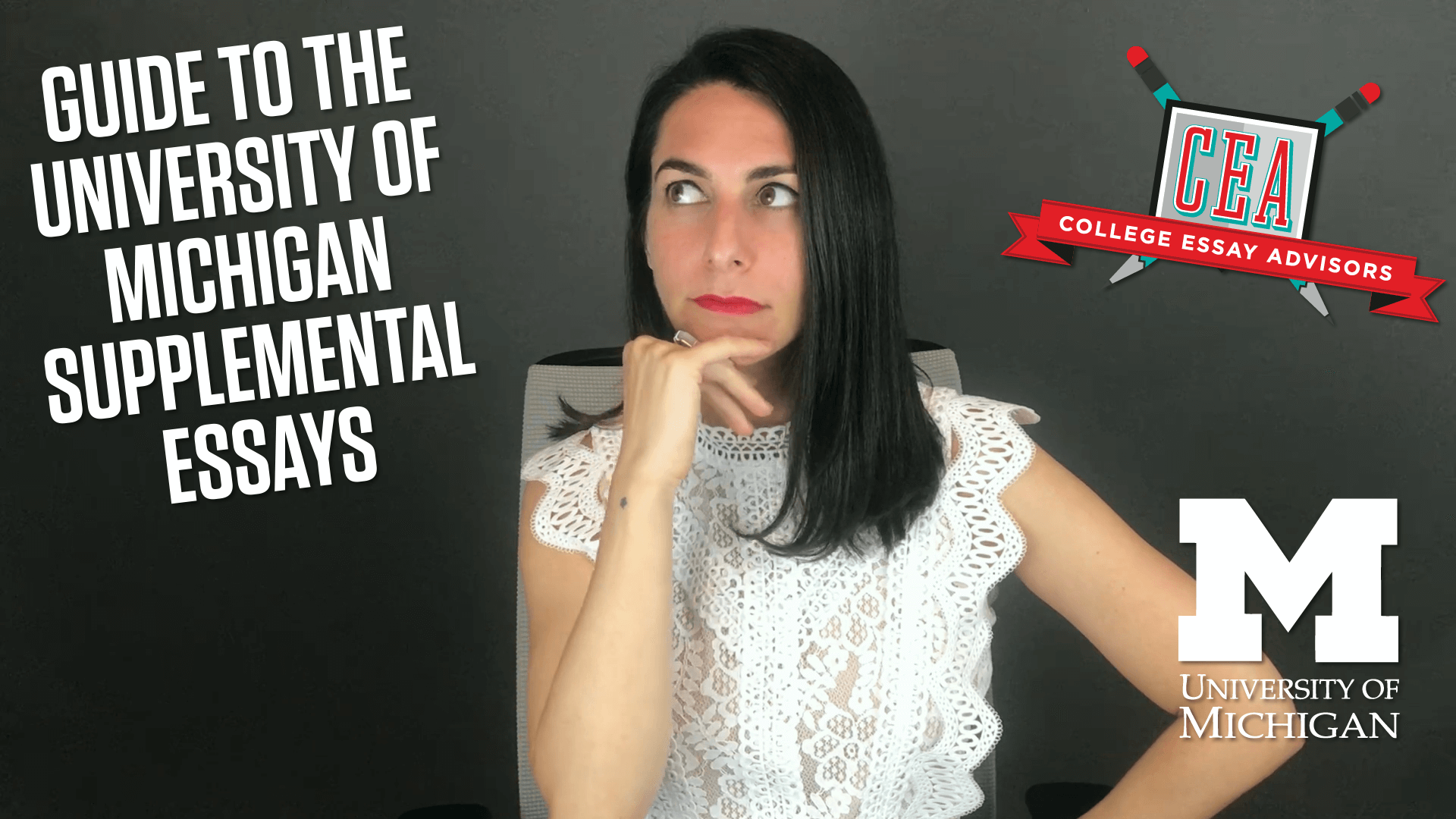
Guide to the 2018-19 University of Michigan Essays
Submitting your college application to the University of Michigan can be a real nail-biter. Michigan requires three supplemental essays. The Founder and Chief Advisor of College Essay Advisors, Stacey Brook, is here to give you invaluable insight into the prompts and the motivation behind them so you can take advantage of this opportunity to speak to admissions in your own voice.
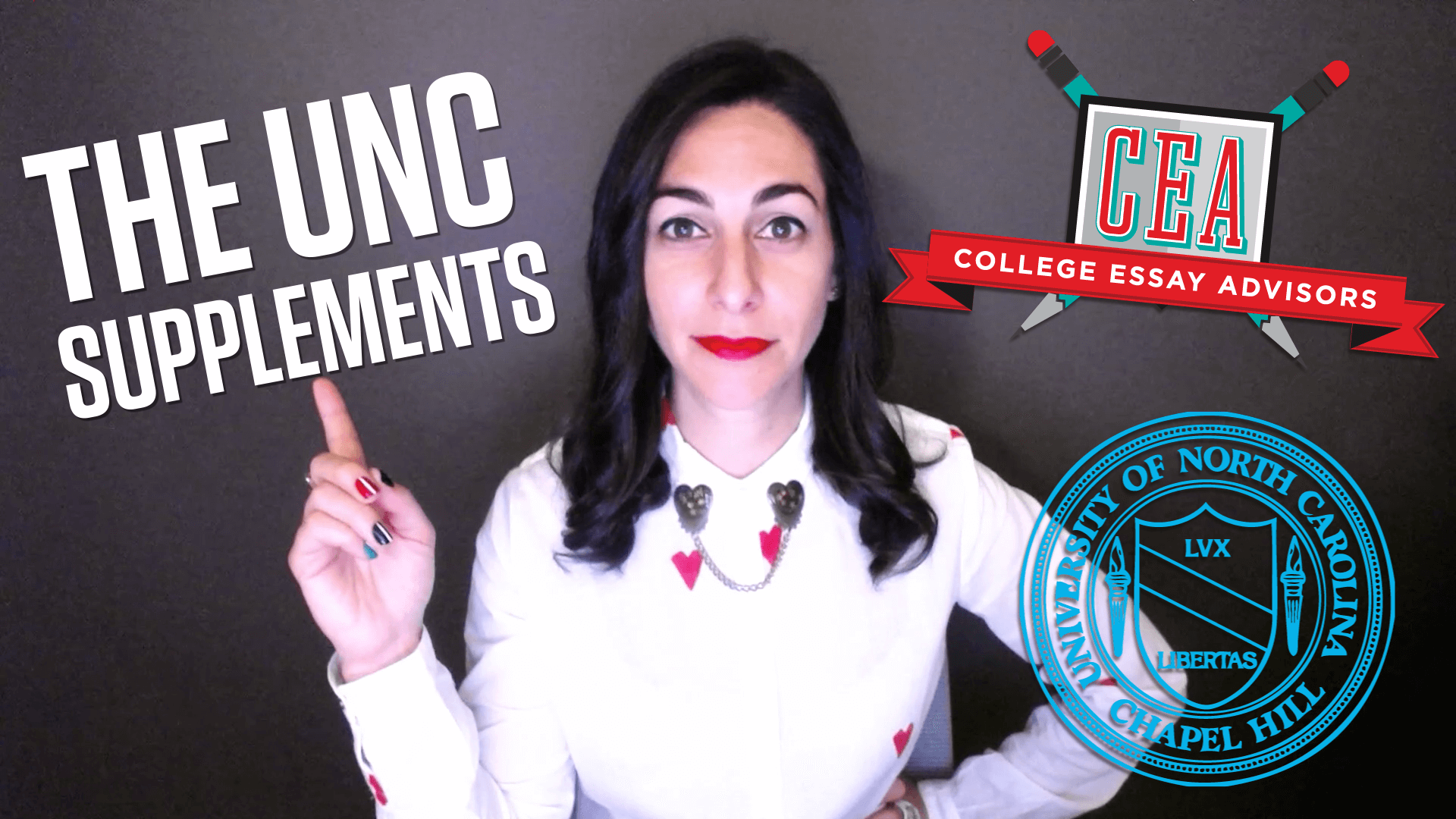
How to Get Into UNC (With a Great Essay)
UNC is well-known for being the first public university in the United States and a leader in innovative teaching strategies. The school is also known for receiving many college applications, which means it is crucial for applicants to differentiate themselves in their essays. Luckily for UNC hopefuls, the university gives students two additional supplemental prompts to respond to in order to set themselves apart from the sea of similarly qualified applicants and increase their chances of getting into UNC. College Essay Advisors Founder and Chief Advisor, Stacey Brook, is here to break down the UNC supplemental prompts so you know which essays will showcase your best attributes!
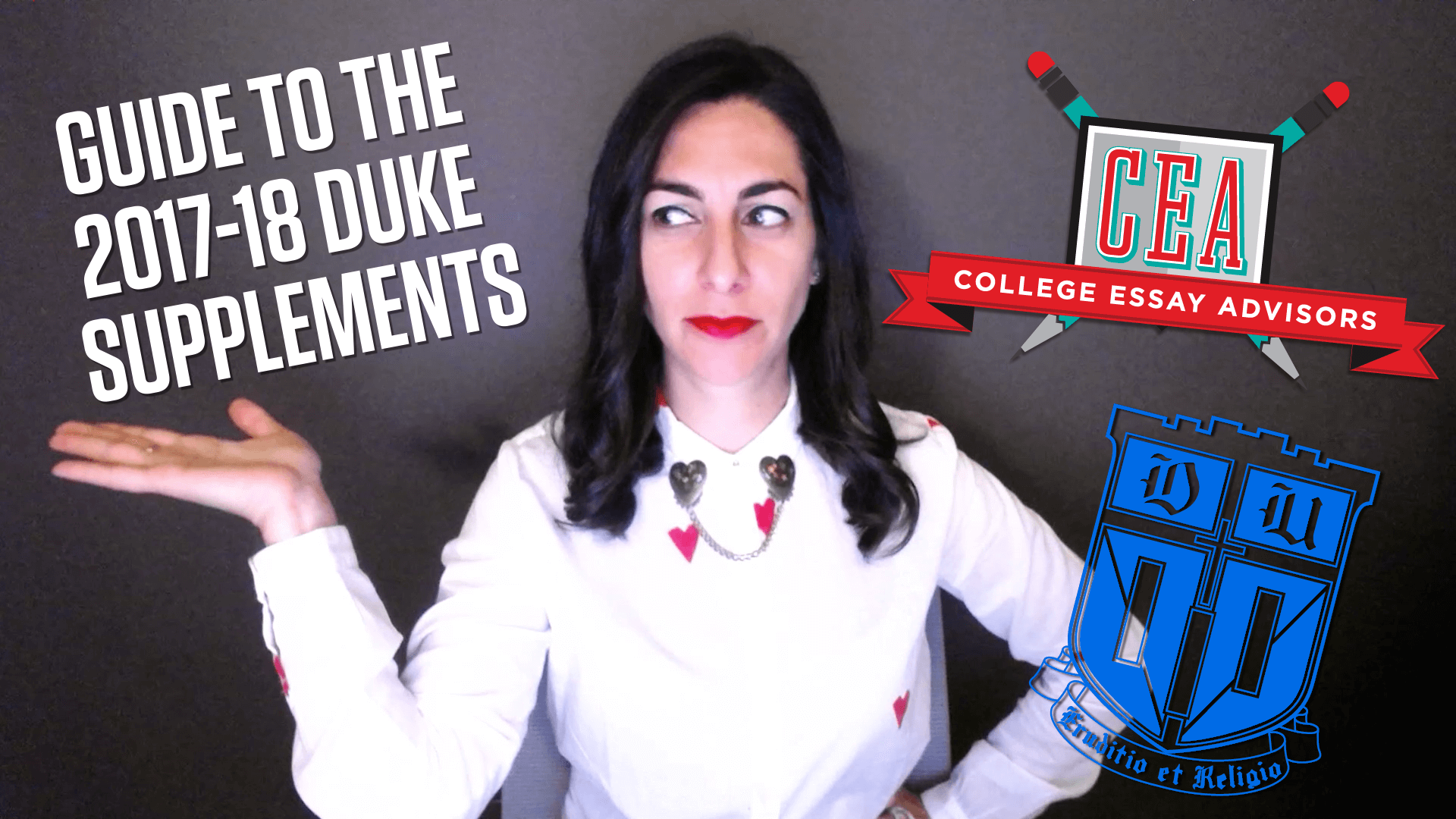
Guide to the 2017-2018 Duke University Supplemental Essays
Submitting your college application to Duke University can be a real nail-biter. Although it's probably too late now to tweak your test scores or GPA, you can make sure that your college application essays will bring you admissions success! Duke requires one supplemental short answer and gives students the opportunity to respond to two optional prompts. The Founder and Chief Advisor of College Essay Advisors, Stacey Brook, is here to give you invaluable insight into the prompts and the motivation behind them so you can take advantage of this opportunity to speak to admissions in your own voice.
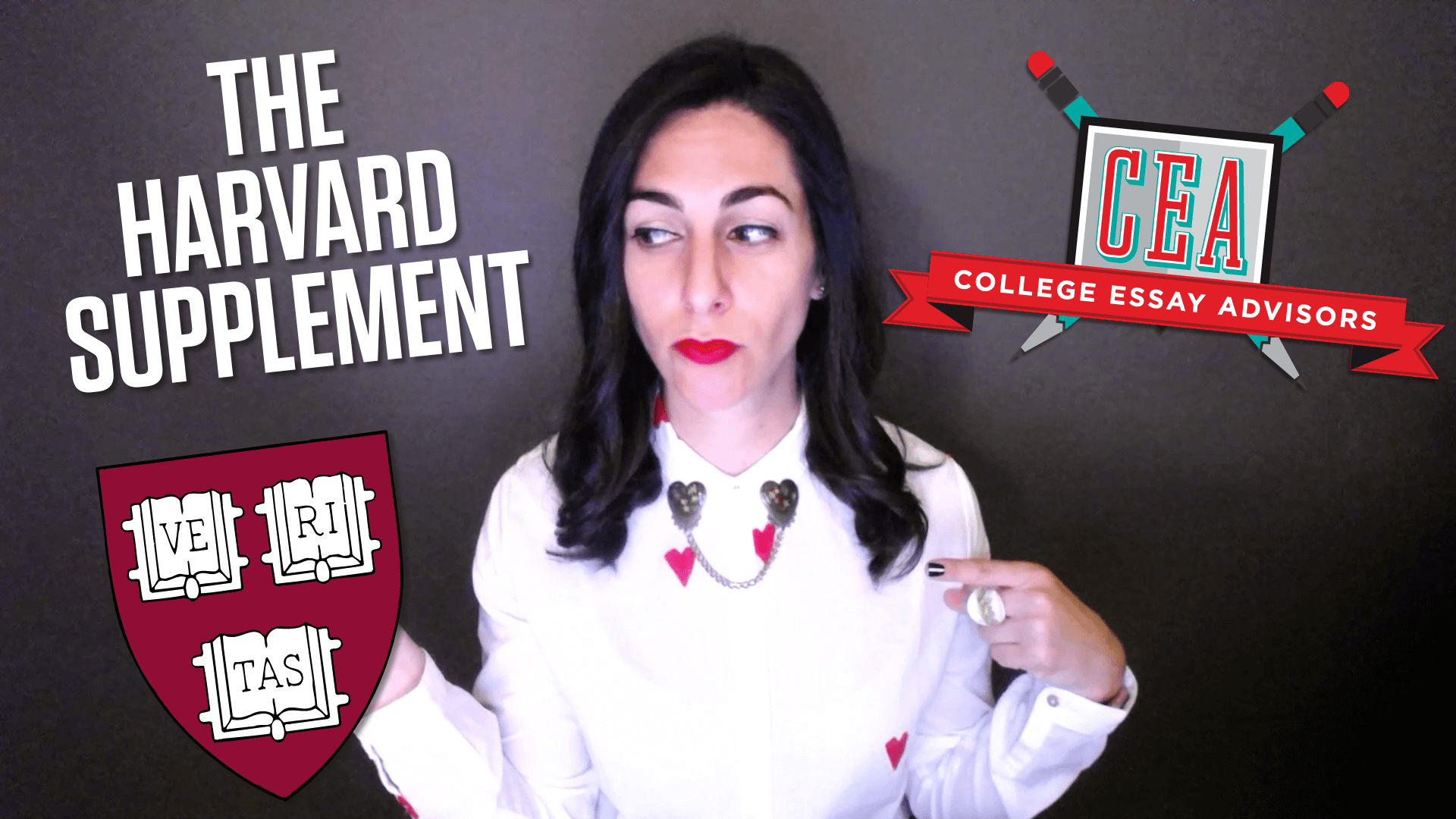
Guide to the 2017-2018 Harvard University Supplemental Essay
Harvard University is one of the most competitive schools in the country. Every year admissions officers are bombarded with applications from eager students looking to make the cut. Thus, Harvard has a supplement to give students an opportunity to distinguish themselves from the competition. Writing supplemental essays can be daunting, but luckily for you, College Essay Advisors founder (and admissions expert) Stacey Brook is here to break down the Harvard supplement so you can hit submit with confidence.
Resumes and Cover Letters

Four Steps to a Polished and Professional Cover Letter
If you’re wondering how you can write the kind of cover letter that grabs your potential employer’s attention and lands you an interview, you’ve come to the right place. In this video, CEA's Founder and Chief Advisor, Stacey Brook, presents four steps to drafting a polished and professional cover letter, and how to take full advantage of the opportunity to introduce yourself to the hiring committee.
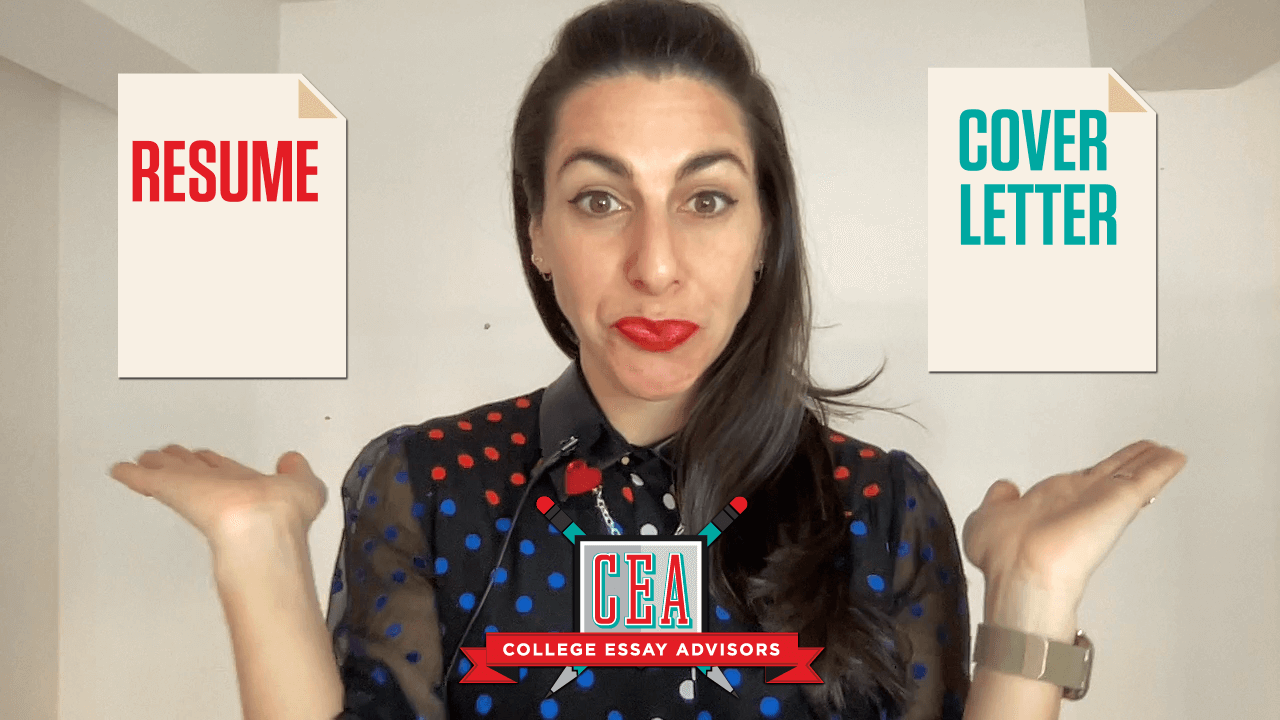
How Much Should Your Resume and Cover Letter Overlap?
While your resume is meant to present a broad overview of your professional and relevant experience, your cover letter seeks to enhance your application by highlighting the specific elements of your resume that stand out for the particular job/role in question.
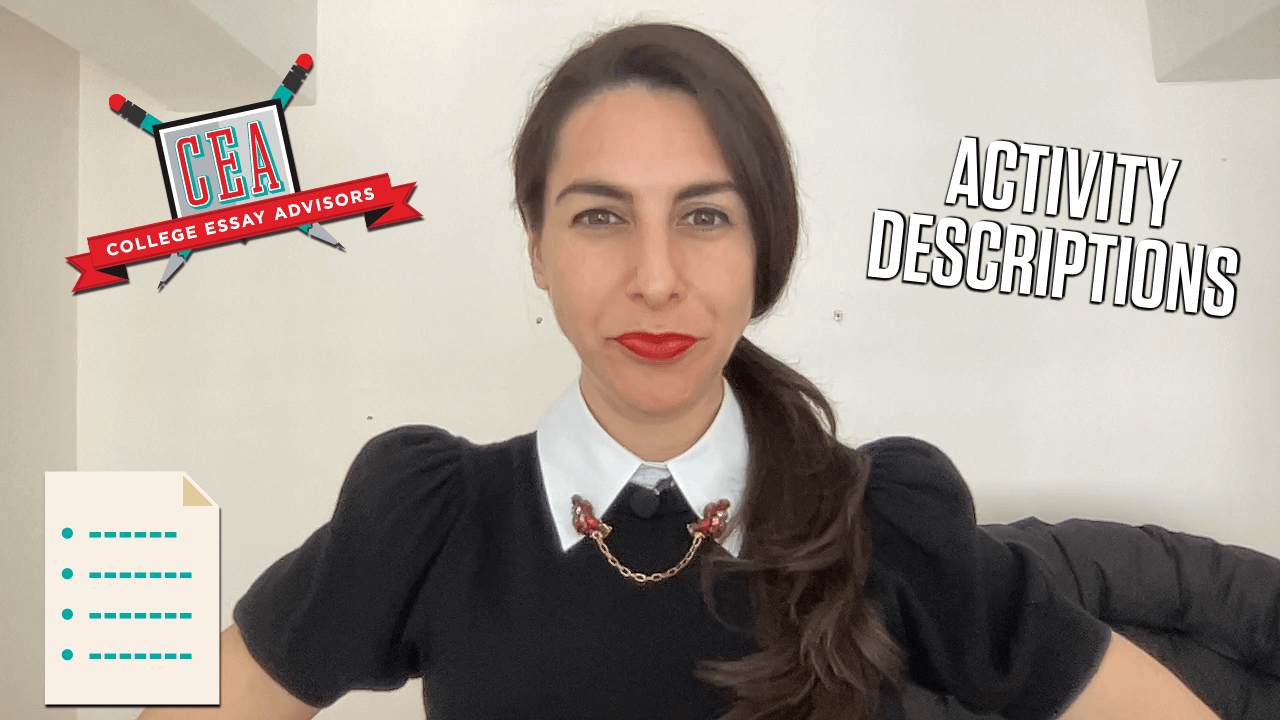
How to Write Strong Activity Descriptions for College Applications
Both the Common Application and UC Application provide space for applicants to list and describe the extracurricular activities they participated in throughout their academic careers. Our Founder and Chief Advisor, Stacey Brook, give you the tools you need to make the most out of your activity descriptions.
College Application Deadlines
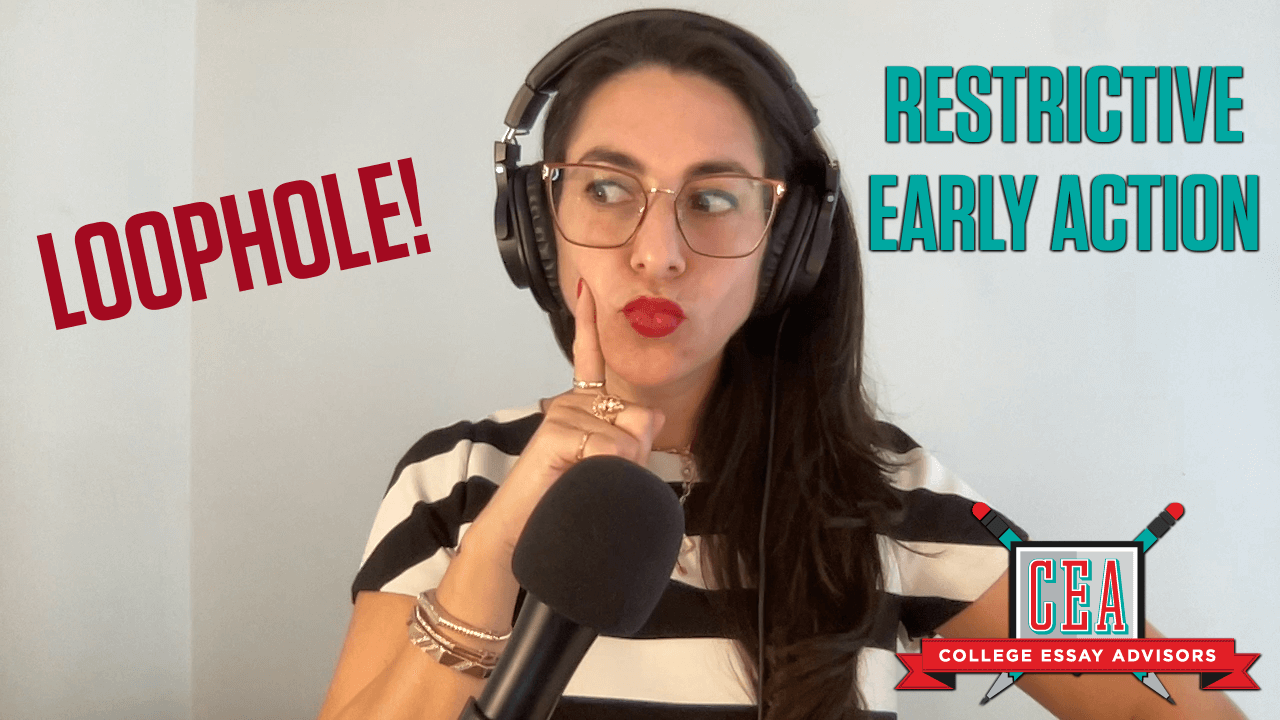
The Single Choice Early Action Loophole You Need to Know About!
Many applicants think that applying Single Choice Early Action or Restrictive Early Action is basically the same as applying Early Decision—and they could not be more wrong!! CEA's Founder and Chief Advisor, Stacey Brook, is here to fill you in on the Restrictive Early Action/Single Choice Early Action loophole all applicants should know about!
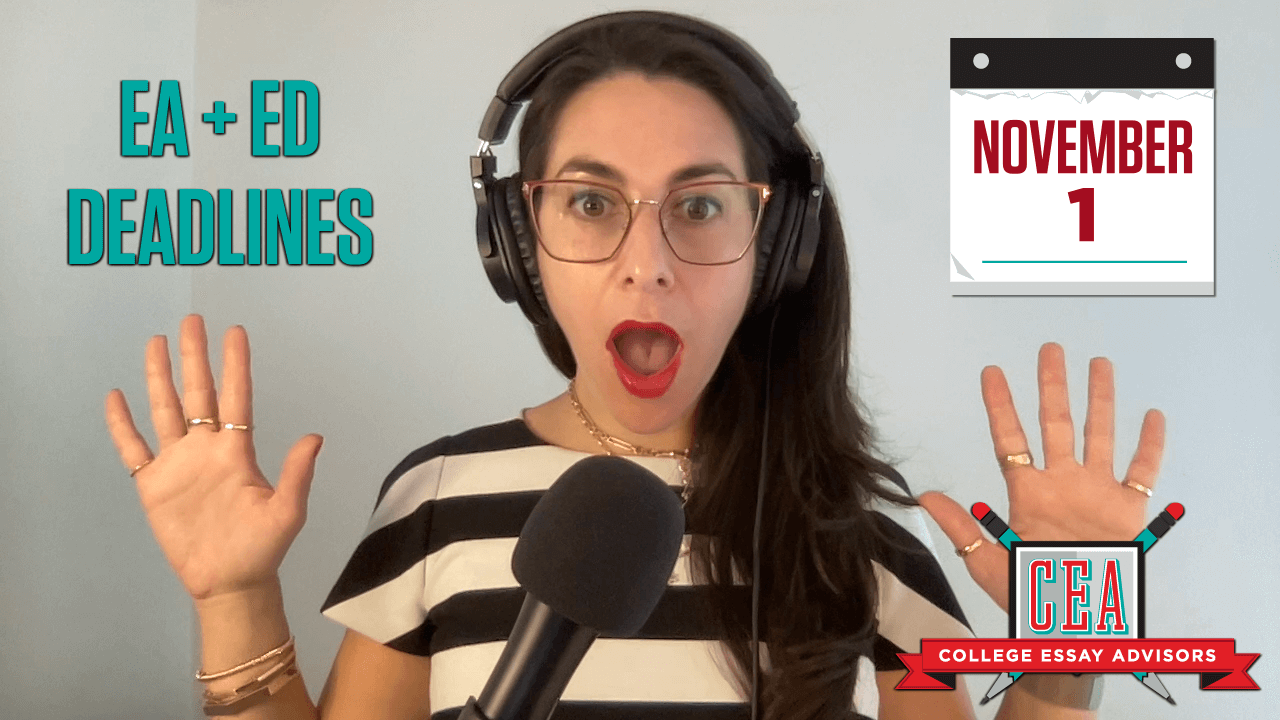
The Secret Regarding Early College Application Deadlines
CEA's Founder and Chief Advisor, Stacey Brook, is here to set the record straight regarding how much time you really have before submitting your Early Action and/or Early Decision applications this fall.
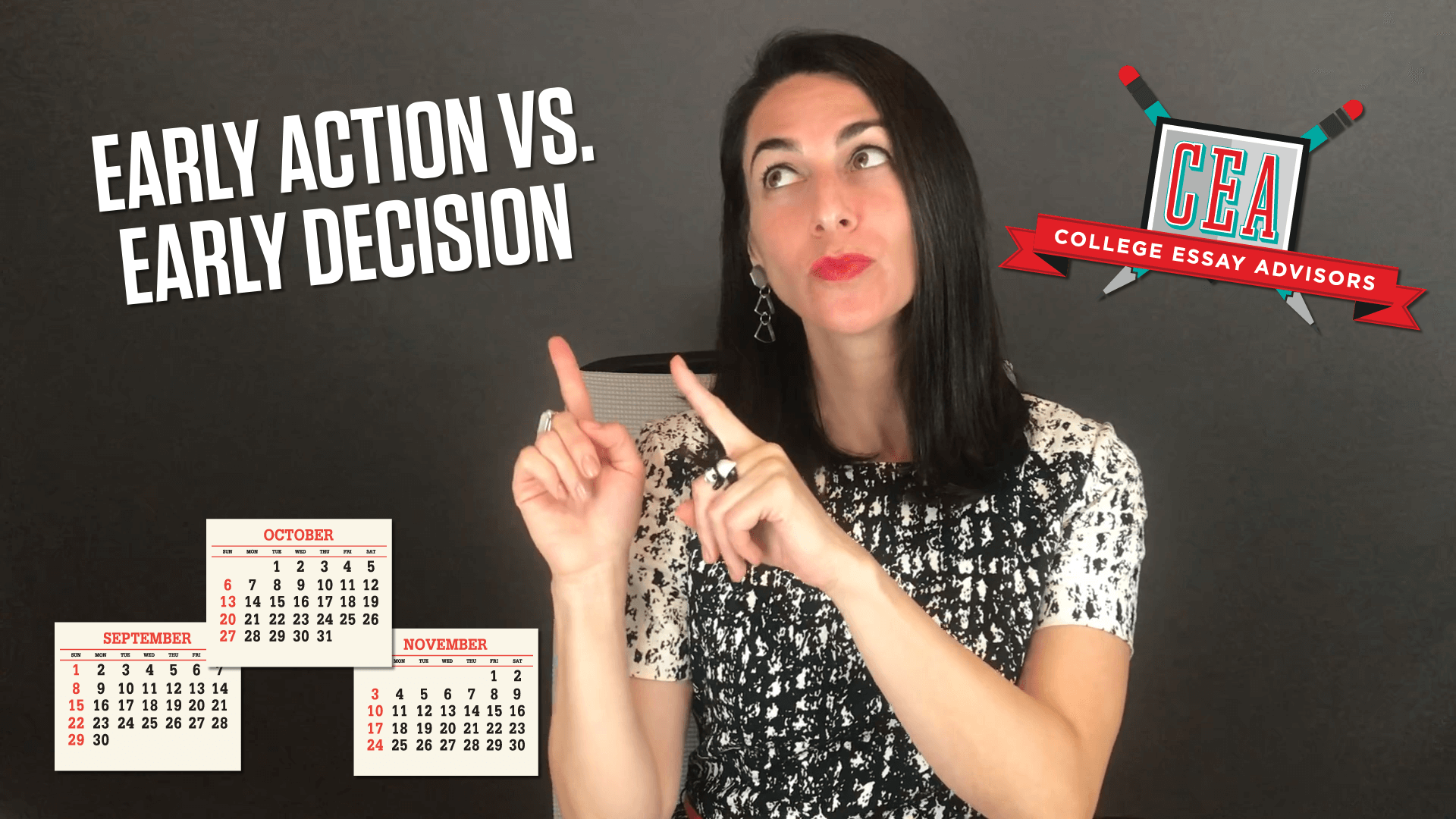
College Application Deadlines 101: Early Decision, Early Action, Rolling, and more!
What is the difference between Early Decision and Early Action? What is Single Choice Early action? Is there really an advantage to applying early? What does “rolling” admission actually mean? CEA's Founder and Chief Advisor, Stacey Brook, has all the answers.
- College Essay Examples

Is your College Essay Cliché?
Applicants often choose to write about cliché subjects because they THINK the resulting essays present the kinds stories admissions officers want to read. To the contrary, jumping on an essay cliché bandwagon can make it nearly impossible for an admissions officer to distinguish you from your closest competition. In this video, CEA's Founder and Chief Advisor presents The Cliché Quiz.

Successful College Essay Examples: The Nature Painter
Many students find it helpful to familiarize themselves with successful college essays to better understand what it looks like (or sounds like) when it's done right. There are so many different ways to write a great college essay, so don't feel confined to any formula, structure, approach, or tone. In this essay, our student showcases his love of science and nature by explaining the importance of having the right tools, both as humans and in nature at large. He gained acceptance to Yale University, Stanford, Harvard.
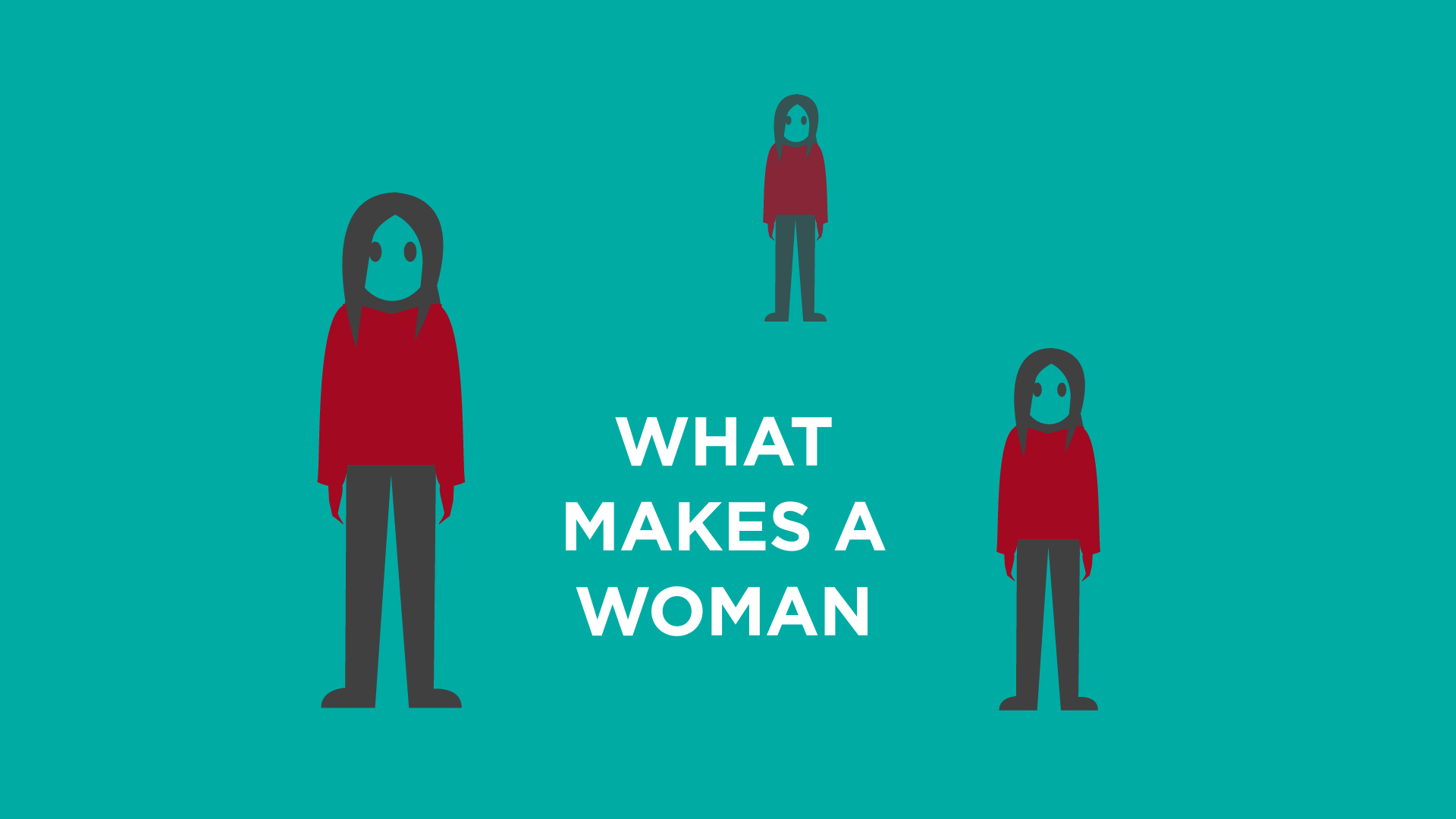
College Essay Examples: How to Write About Another Person While Still Making the Essay About You
So you want to write your college essay about a person who is very important to you and has shaped the person you've become today, but you are nervous that the essay won't say enough about you as the applicant (after all, your grandma isn't applying to college, you are!). We totally get it. Tons of students run into this issue. That's why we're sharing one of our favorite essays, written by a student we're referring to as "What Makes a Woman." This student masters the art of writing about another person's struggles, while reflecting on her own obstacles, perceptions, and identity.

College Essay Examples: Pulling Your Reader in From the Start
So you're reading successful college essays and they sound awesome...but what's the use of a great essay if you don't understand which defining features make the essay sparkle? In this video, we will be exploring TWO successful college essay examples, both of which are great examples of how to pull a reader into your story using visuals, intrigue/suspense, and maybe a little bit of humor.

College Essay Examples: How to Incorporate Dialogue into Your Essay
One way to pull a reader into your essay from the very beginning is to start with dialogue. Many students don’t even consider adding an outdated adage from a parent or a hilarious crack from a high school coach to break up their prose, set the scene or build the profiles of their stories’ characters. And yet, dialogue is one of those devices that can give you a lot of bang for your buck, delivering a punch of personality or a wallop of context using just a few carefully culled utterances. Here is one successful example of how a student uses dialogue to immerse her reader in her essay. We call this applicant, "In The Car with Mom."

College Essay Examples: Writing About a Background, Identity, or Interest
Many students choose to respond to the Common Application's first prompt (listed below) for their personal statement. This student (who we're referring to as The Nike Jordans), is one of them. In her essay, she writes about her background in a way that invites the reader to step into her shoes in order to learn more about her character, outlook, and personality. She gained acceptance to Princeton, MIT, U Chicago, and Columbia, among others.

College Essay Examples: Challenging a Belief or Idea (with Humility)
In this essay, a student we're referring to as The Graduation Speaker, answers Common Application prompt #3. ("Reflect on a time when you questioned or challenged a belief or idea. What prompted your thinking? What was the outcome?") His essay is a fantastic example of how to approach this prompt with humility, wit, and likability. He submitted this essay as his personal statement and received acceptance to Stanford, Yale, Dartmouth, Duke, and UCLA.
Brainstorming Tips

How to Write a Great Transfer Essay
The transfer essay presents new hurdles that differ from those of the standard freshman personal statement. There are three key steps you must take to master the transfer essay. Luckily for you, CEA's Founder and Chief Advisor, Stacey Brook, is here to tell you everything you need to know in order to write a fantastic transfer application essay!
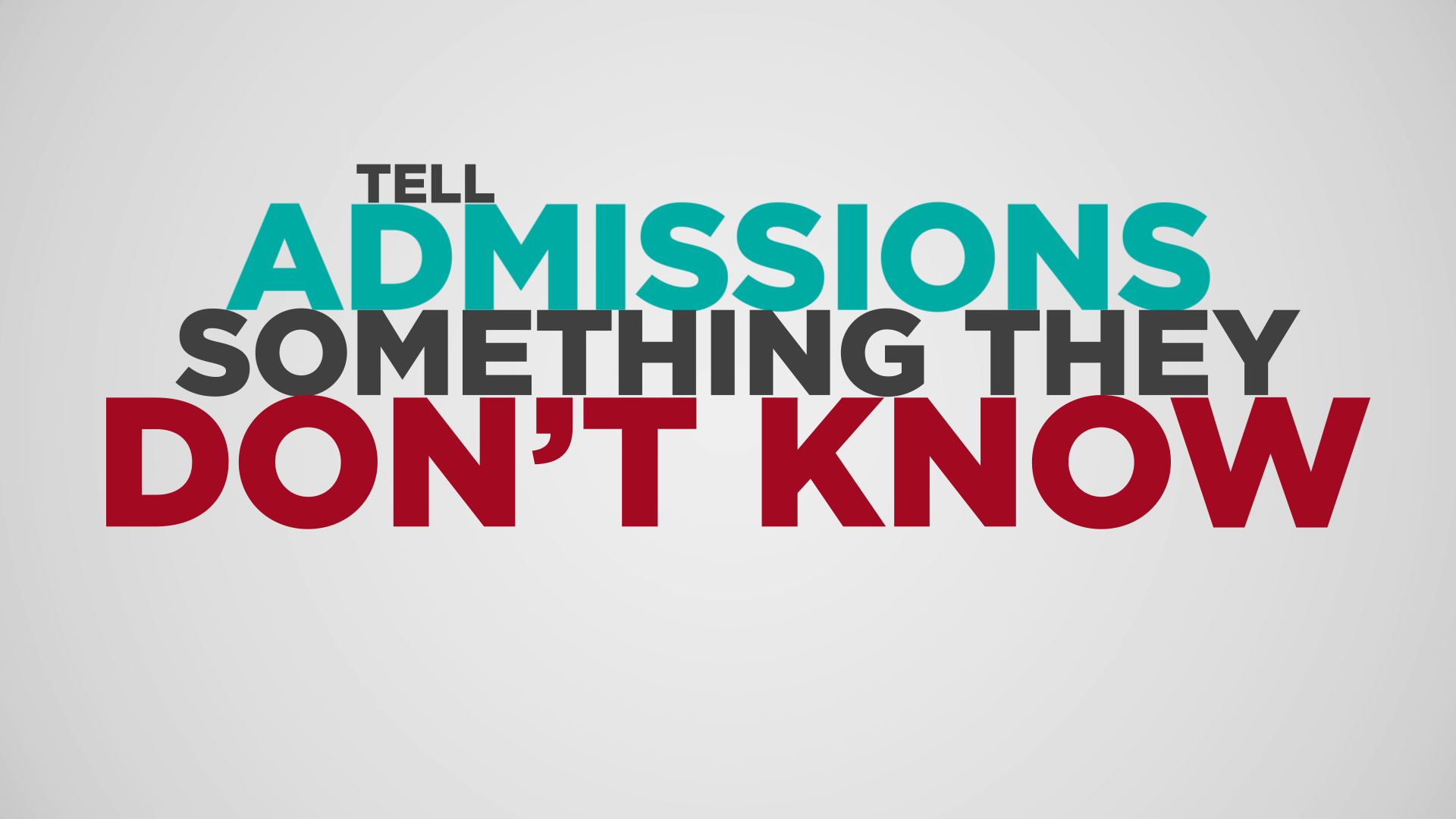
How to Tell a Unique Story to Admissions
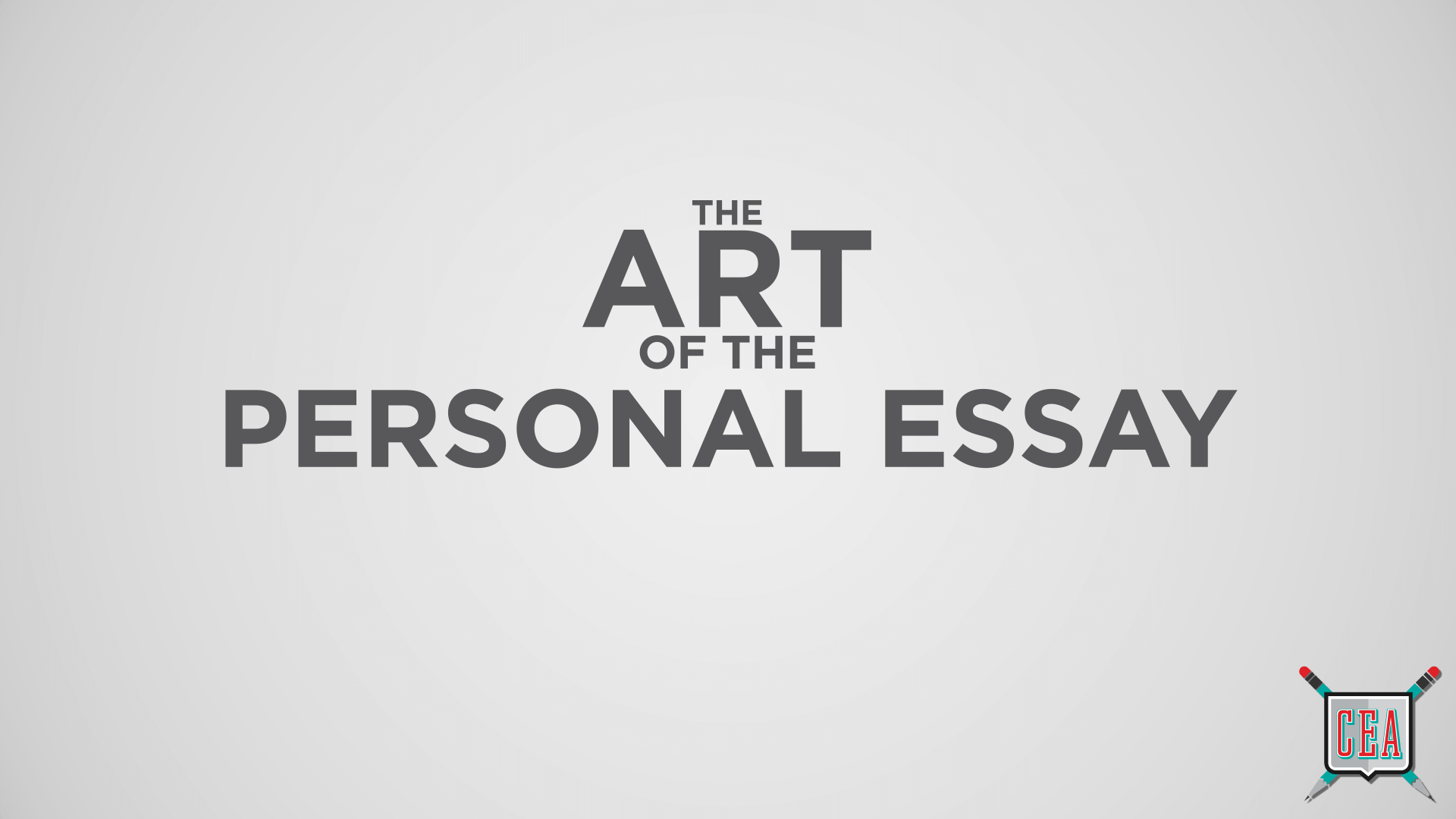
What is the Personal Statement?
Since more colleges see the Common App’s personal statement than any other individual essay, this component of the application is where you want to unleash your very best ideas. But what does a personal statement entail? And how do you write a successful one? This video will address those questions and more!
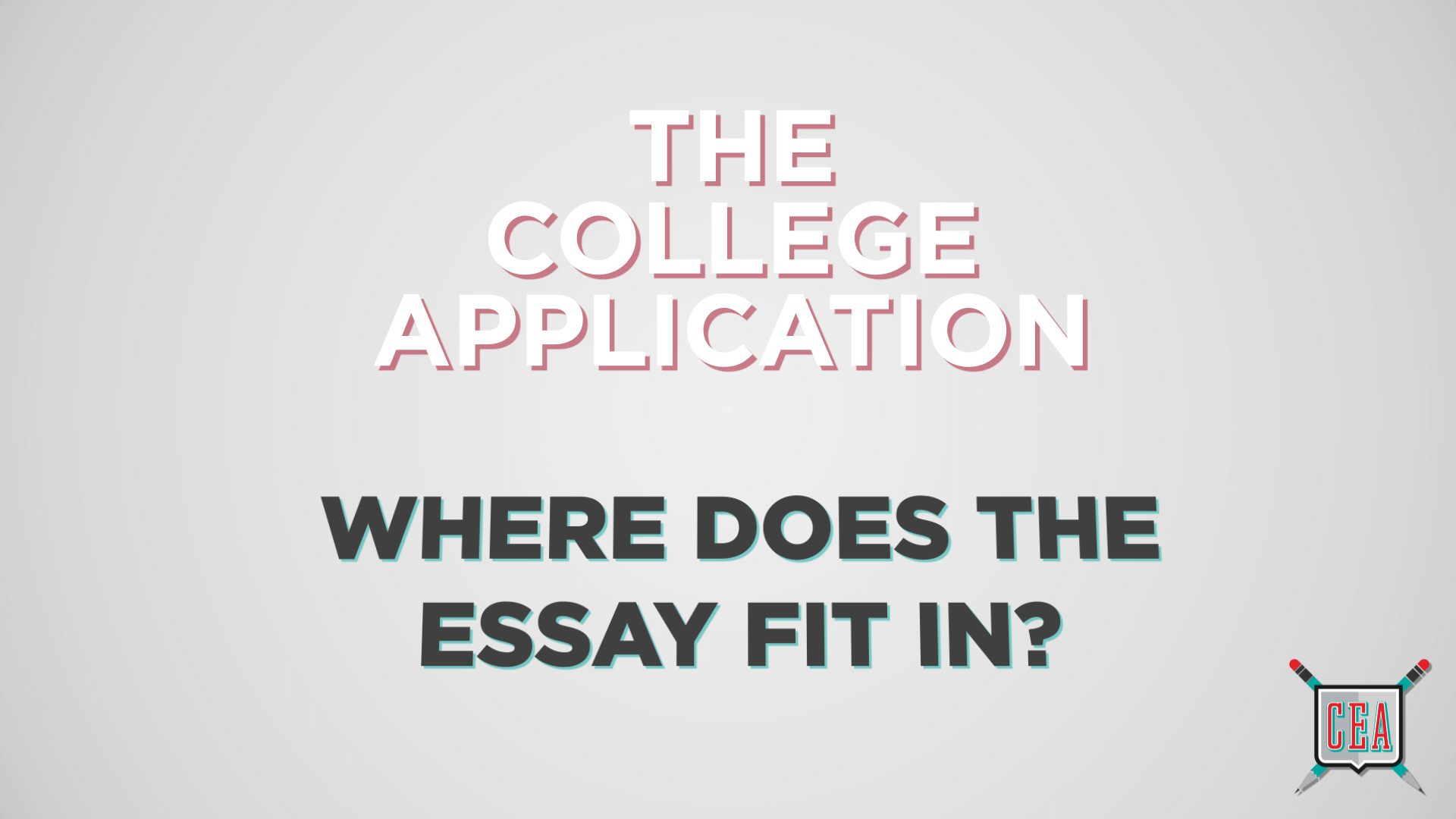
How Important is the College Essay?
Why does the college essay matter? And how can you use this opportunity to speak to admissions in your own voice to your maximum advantage? This video will explain it all. Spoiler alert: You need to be authentic and memorable!
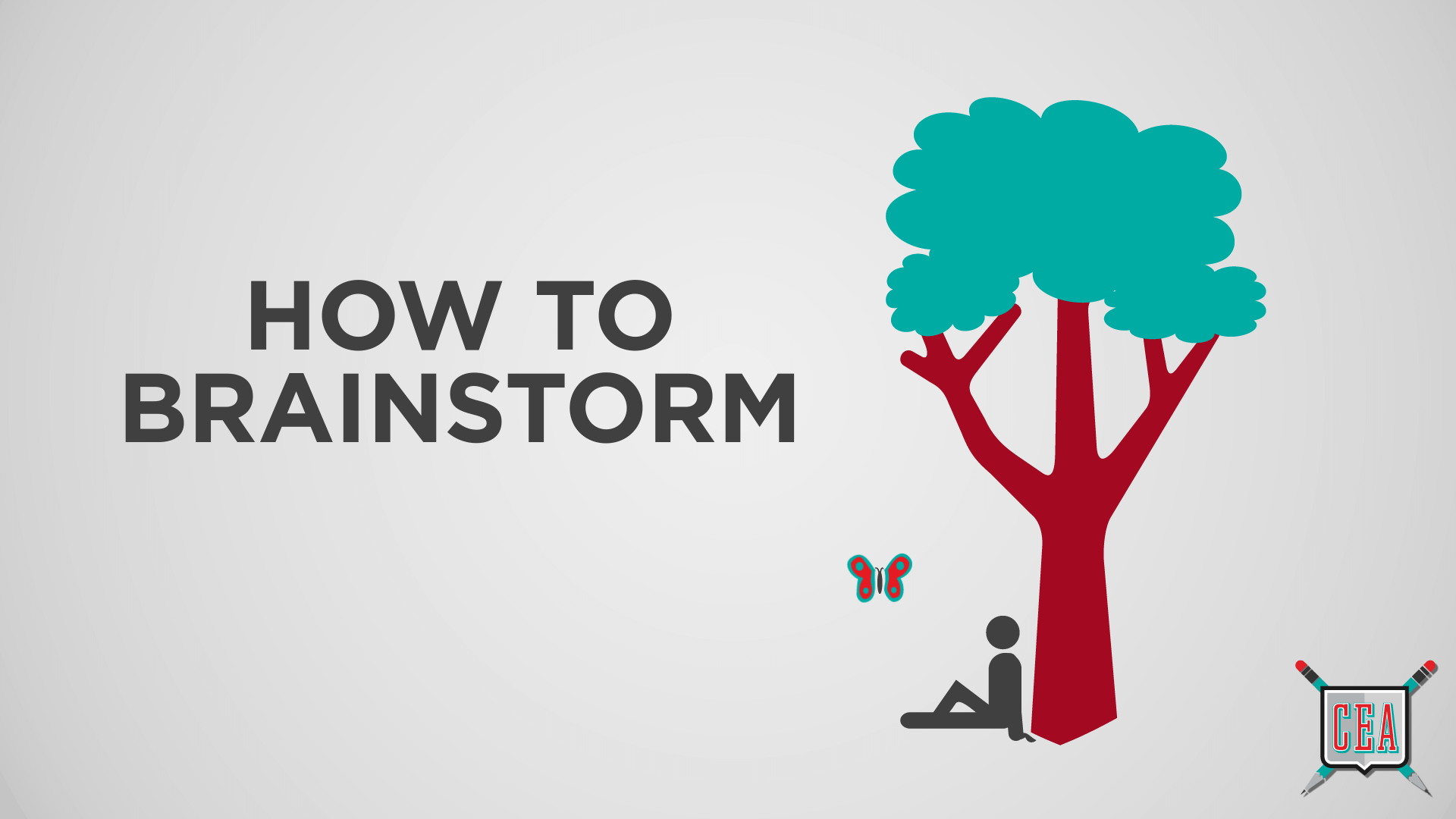
Brainstorming for the College Admissions Essay: What You Need to Know
This video explores one of applicants’ most common college essay concerns: "What on earth should I write about?" Whether you are worried that you have nothing to say (“What if I’m BORING?!”), or too much to cover (“Which of my bazillion accomplishments does admissions want to hear about most?!”), this video will help you take a flying leap into the college essay topic selection process, walking you through our favorite exercises and strategies for identifying your best stories including our signature Backwards Brainstorm and the Full Body Brainstorm.
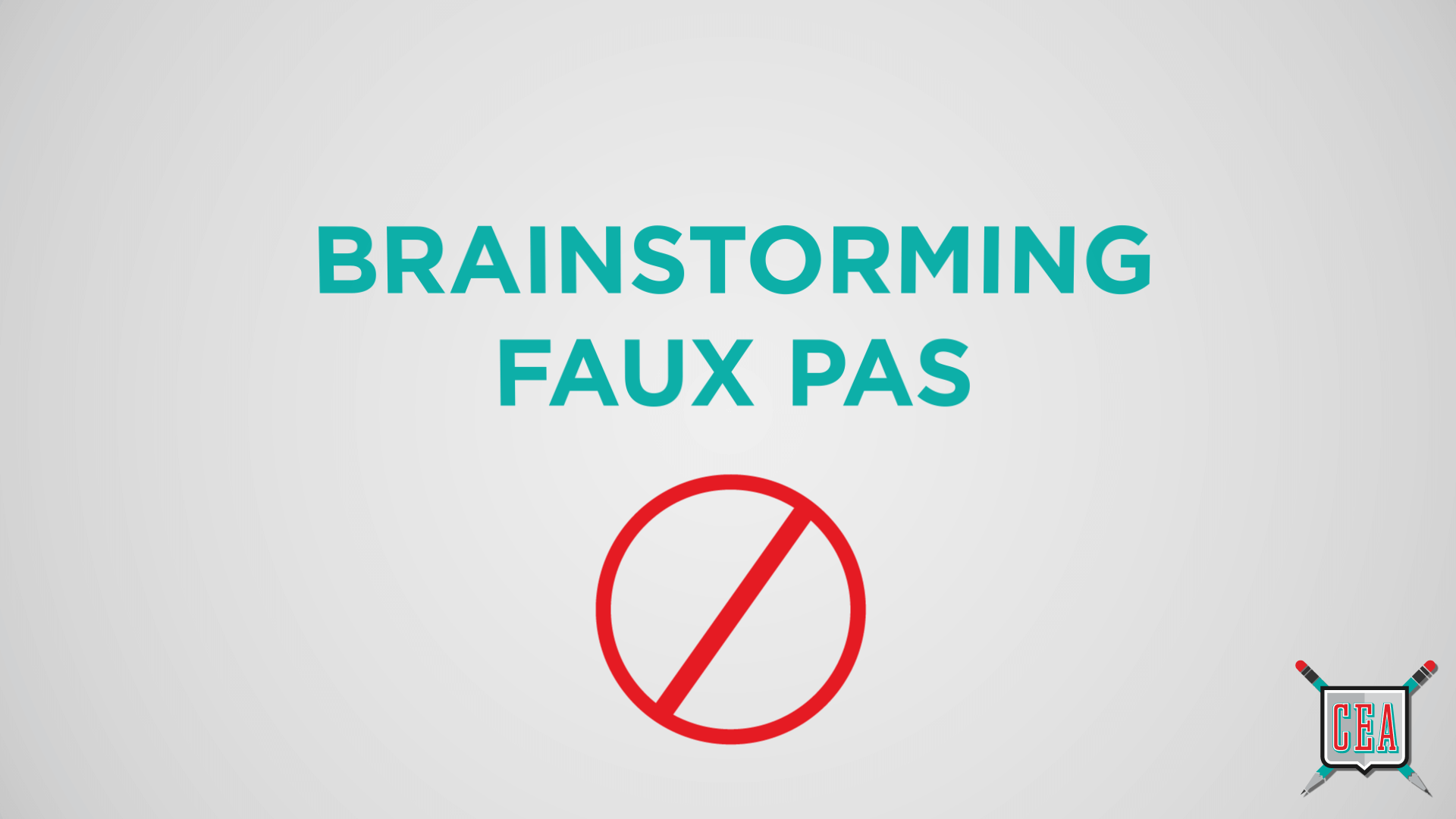
The Most Common Brainstorming Mistakes Writers Make
Brainstorming is HARD -- especially when it comes to brainstorming topics for college essays! This video will walk you though the most common brainstorming mistakes writers make, while illustrating how you can generate creative essay topics and ideas in a way that is fun, freeing, and fruitful.
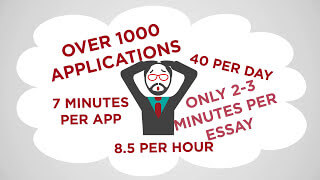
What Admissions Officers Really Want from a College Essay
Know how long a college admissions officer spends reading your application? How about your essay? This video will lay out all the facts and stats you need to know about the secret lives of admissions officers. With this information in hand, you'll be better prepared to write the kind of essay admissions officers want to read. When it comes to college admissions, knowing your audience is everything.
Latest Videos
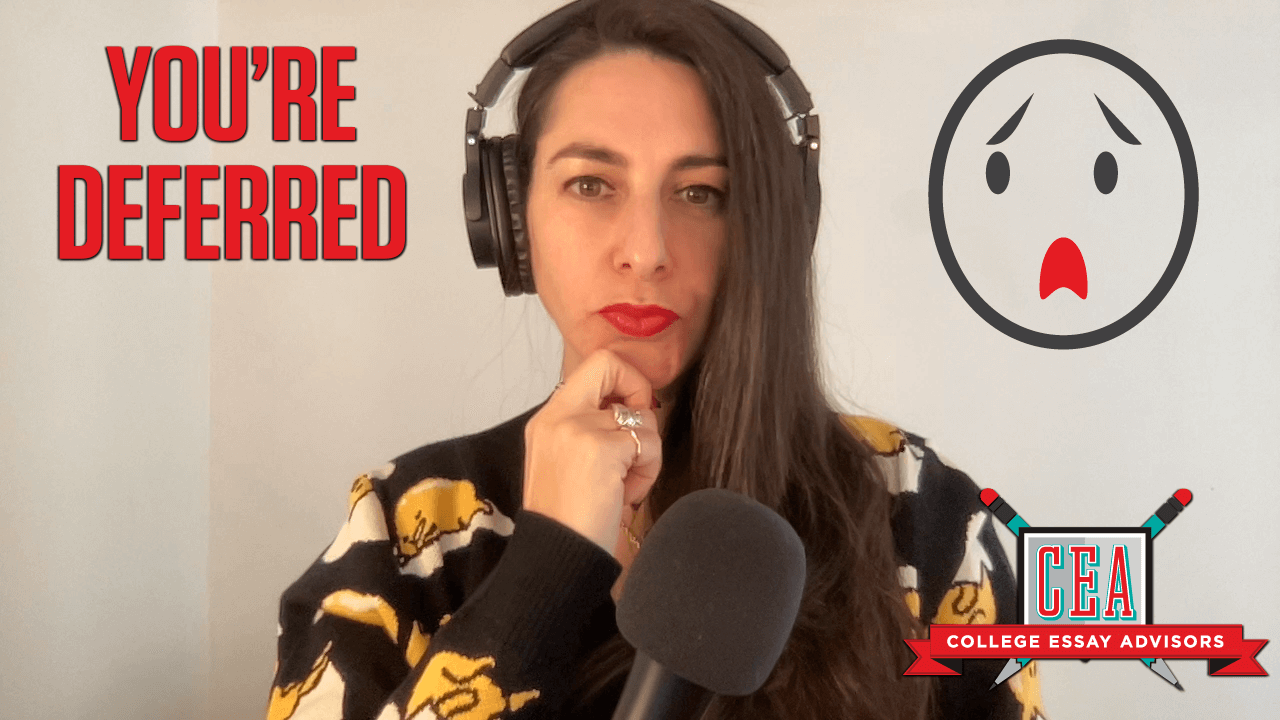
What To Do If You’ve Been Deferred By Your Dream School
CEA's Founder and Chief Advisor, Stacey Brook, is here to offer advice on how to stand out after being deferred to the Regular Decision applicant pool. First, check your dream school's website to find out if they accept Deferral Letters (also known as Letters of Continued Interest). If they do, it's time to get typing.
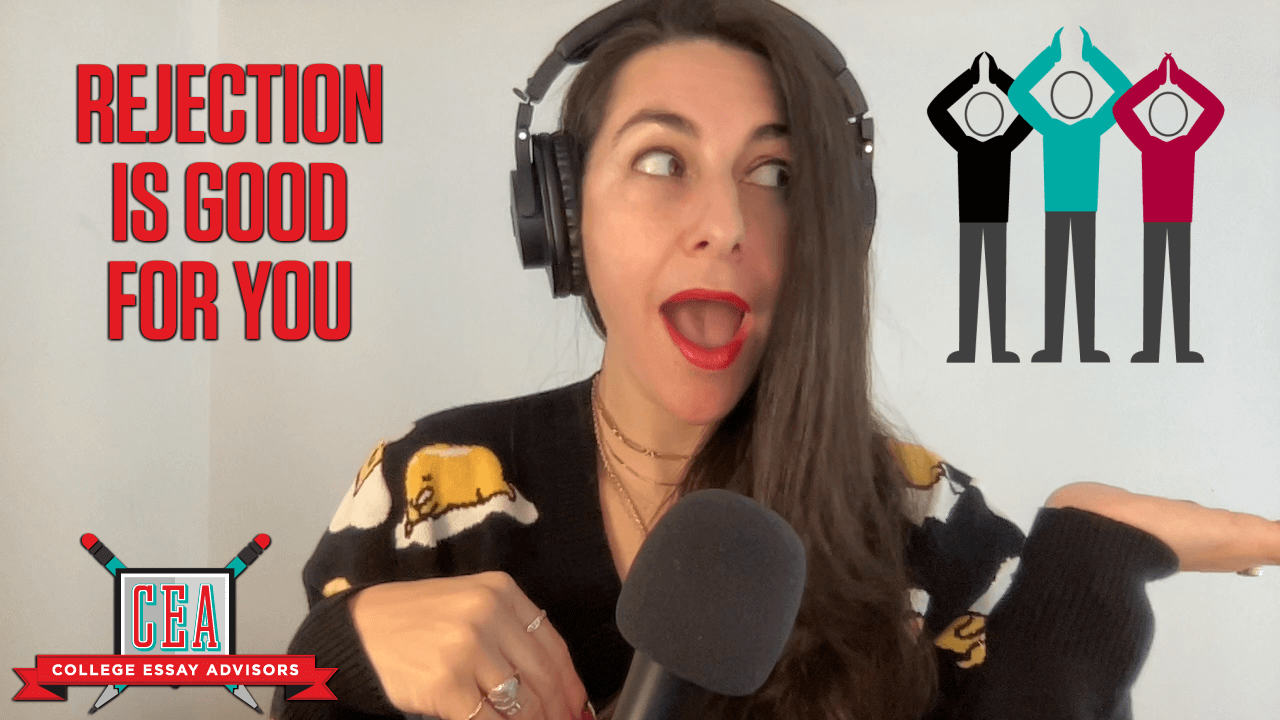
Why Rejection is Actually Good For You
CEA's Founder and Chief Advisor, Stacey Brook, knows that many applicants receive disappointing admissions news around this time of year. She also knows that hearing the word “no” can be the best thing that can happen to us at a young age, and it’s important to remember that multiple paths can bring you to your dream.
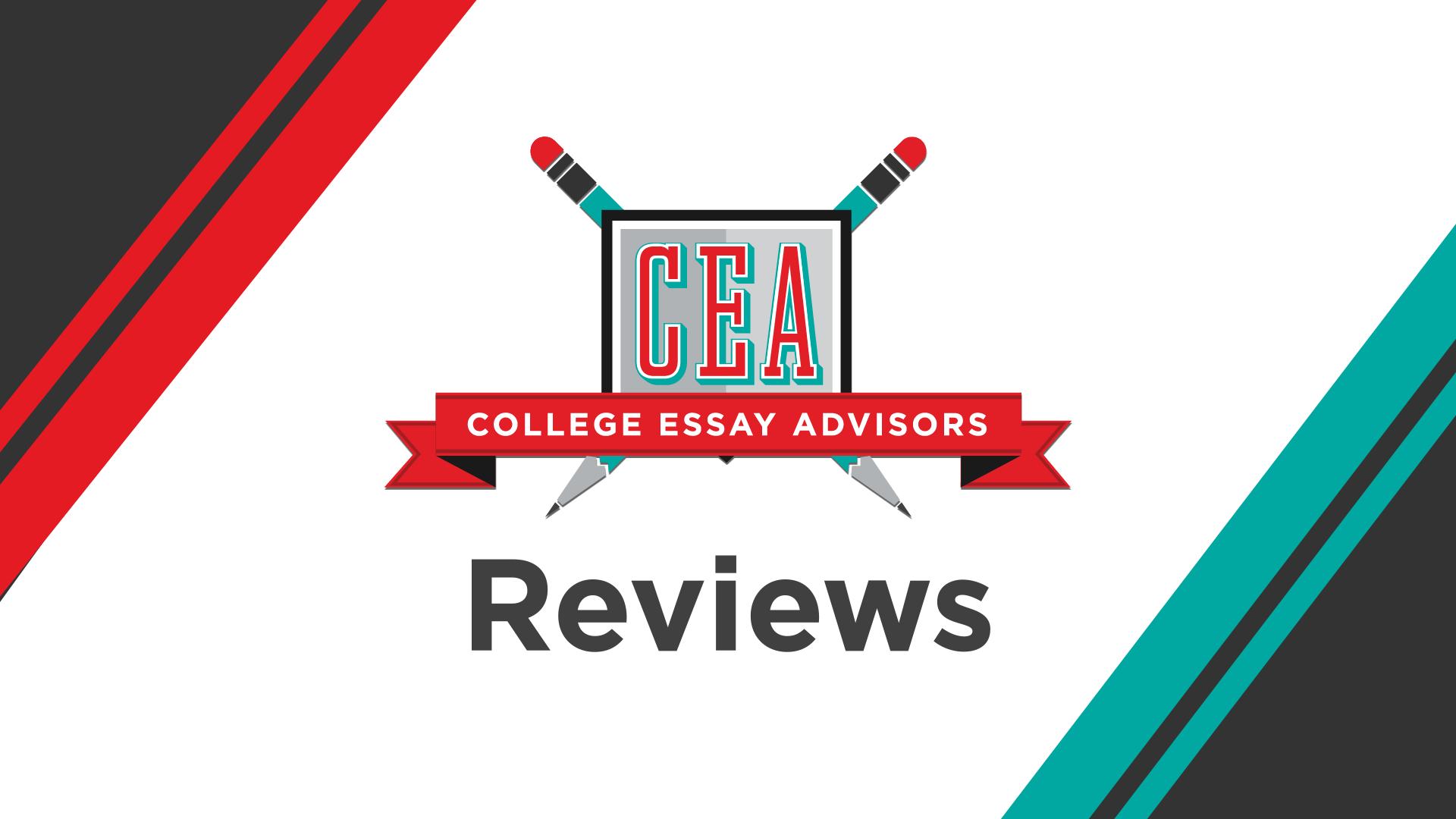
College Essay Advisors Reviews: What It’s Like to Work with Us
Read reviews from our past clients to learn what it's like to work with College Essay Advisors. Whether you're applying to college as a high school student, or applying to medical school as a recent grad, we can help.
Deferrals and Rejections

How to Write a Successful College Admissions Deferral Letter
The deferral letter is similar in purpose to the waitlist letter. The only difference is the position you’re in, how much time you have to work with, and what other options are on the table for you. CEA's Founder and Chief Advisor, Stacey Brook, is here to help you draft a distinct deferral letter for admissions.
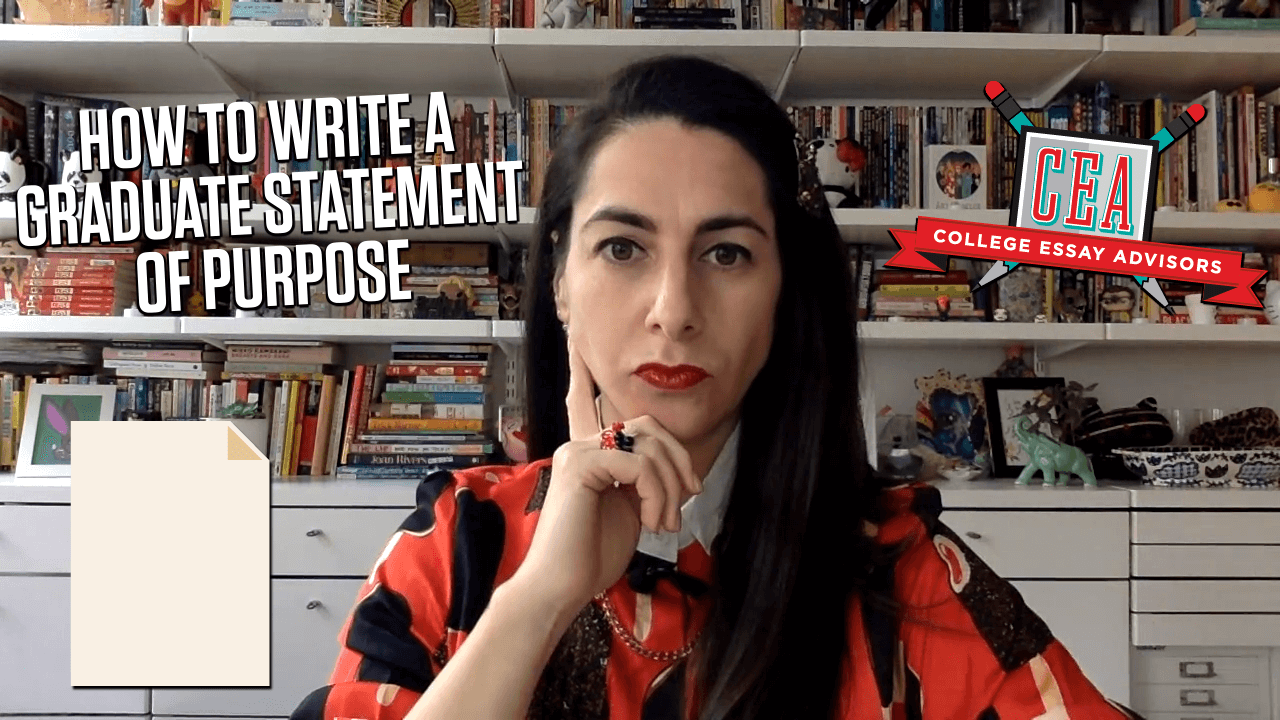
How to Write a Statement of Purpose for Grad School
When it comes to writing a successful statement of purpose for graduate school, telling a personal story about your goals and ambitions is key. In this video, CEA's Founder and Chief Advisor, Stacey Brook, answers frequently asked questions, provides viewers with brainstorming launch pads, and offers insight as to what grad school admissions officers are looking for.

Can A Great College Essay Get You Into College?
We've heard this question time and time again, "Can a great college essay get me into college?" There are many factors that go into an admission officer's decision to accept, defer, waitlist, or reject an applicant. CEA's Founder and Chief Advisor, Stacey Brook, is here to answer the question once and for all!

How to Create a Winning Activity Resume (for College Applications!)
Many schools will ask you for an “activity resume,” and the Coalition and Common Application have separate sections specifically for activities and extracurriculars, so it’s really easy to overthink this piece of the application. If you’ve never written a resume before, getting started can be incredibly daunting, but don't worry -- CEA is here to help!

Unpopular Opinion: What to do When You’re Waitlisted
In this video, CEA's Founder and Chief Advisor, Stacey Brook, offers her (unpopular) opinion as to what students should do when waitlisted at their top college or university.

How to Get Off the Waitlist (at your Dream School)!
Waiting is tough, and it can feel like forever when it comes to college admissions. If you were waitlisted, don't panic; you are not alone. The good news is that you can do something about it. CEA's Founder and Chief Advisor, Stacey Brook, is here to tell you everything you need to know about getting off the waitlist (and into the college of your dreams)!
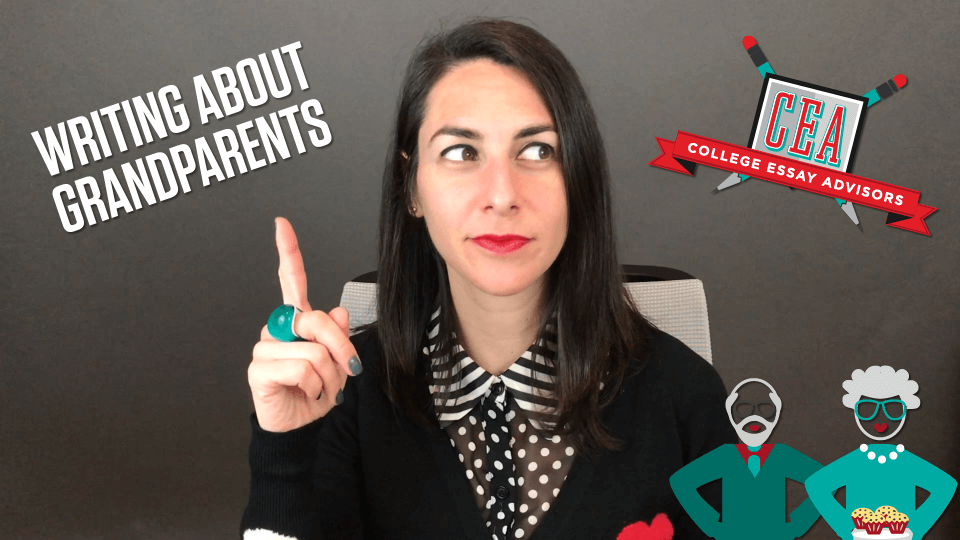
How to Write a Unique College Essay About a Grandparent
So you just can’t shake the voice in your head telling you to write your college admissions essay about your grandma. We get it, grandparents are awesome! They know so much about you! And you’ve gained so much wisdom from your relationship with them! Writing a great personal statement or supplemental essay about them, however, is tricky. Luckily for you, CEA's Founder and Chief Advisor, Stacey Brook, is here to help you make sure your essay stands out.
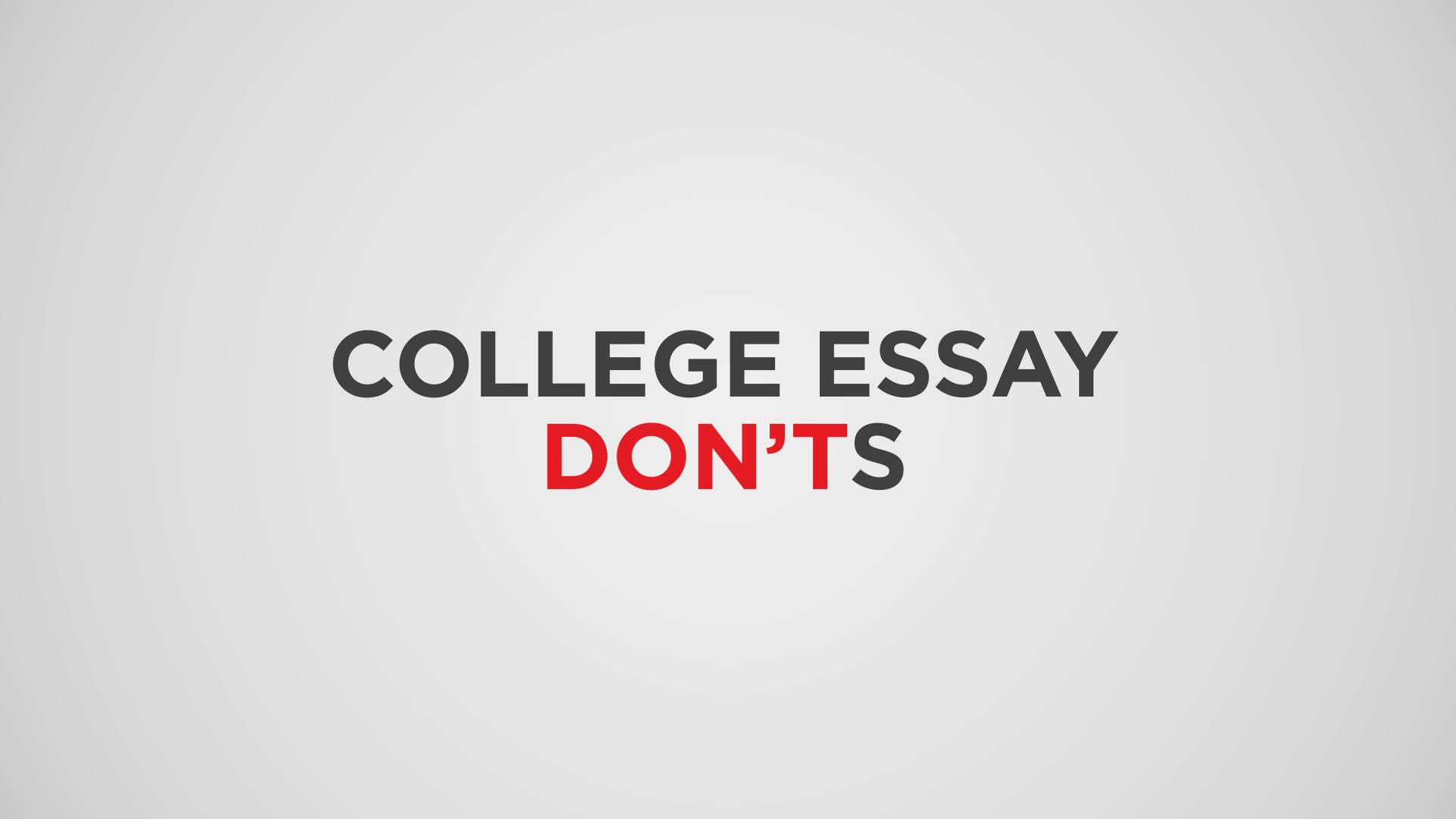
10 Things You Should NEVER Write in Your College Essay
In this video, we will walk you through the top 10 DON'Ts of the college admissions essay writing process, so you can submit your Common App personal statement and school-specific supplemental essays with the utmost confidence! This video will teach you: what not to write under any circumstance (or most circumstances), the mistakes applicants make without even realizing, and more!
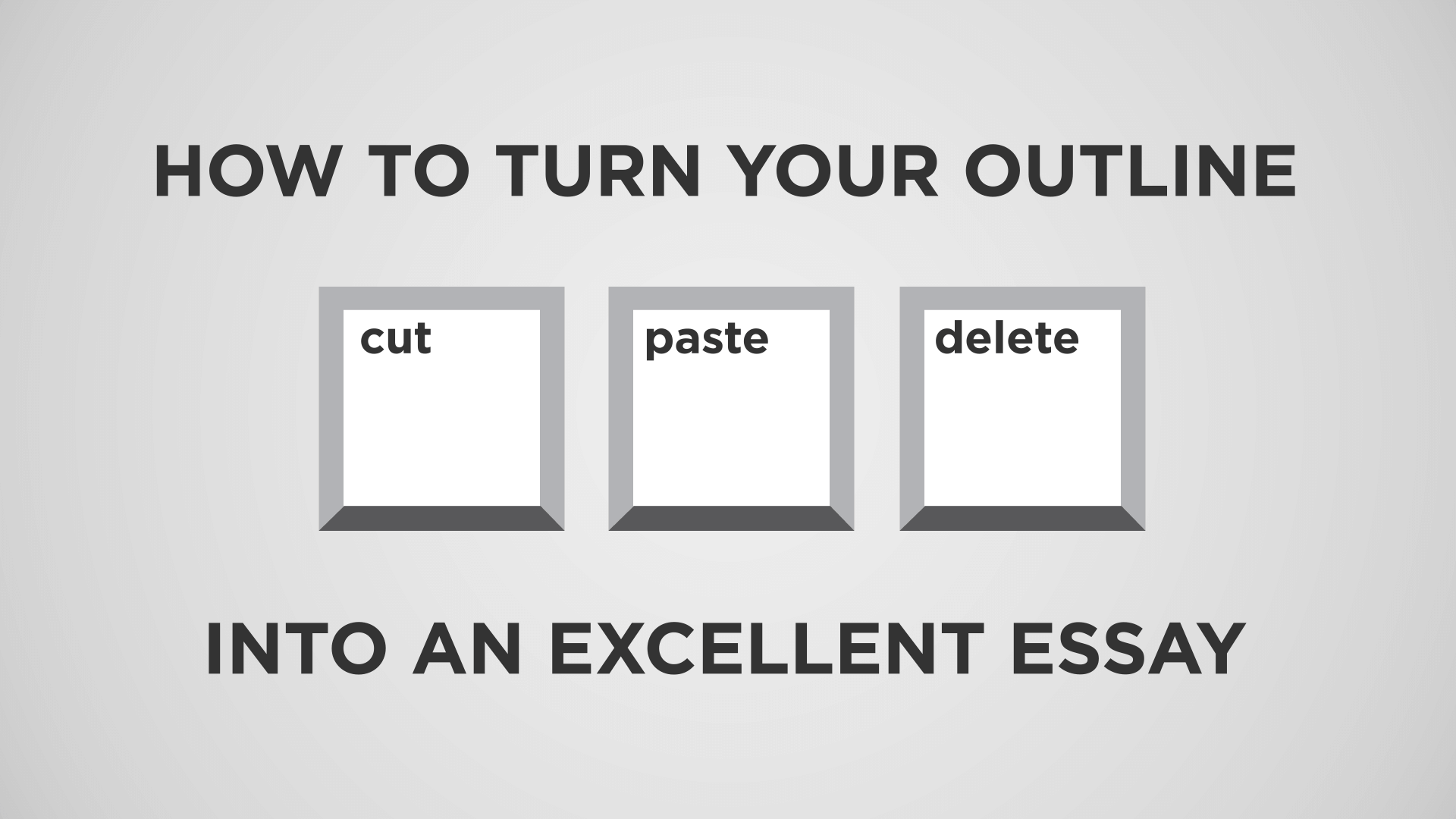
How to Turn your Outline into a Stellar Essay
Structuring a winning college admissions essay is hard. Should you start with the ending and then catch the reader up? Or throw them head first into the action and explain later? And where exactly should you put all of great sentences, you've come up with thus far? In this video, we'll teach you everything you need to know about turning your outline into a rough draft!
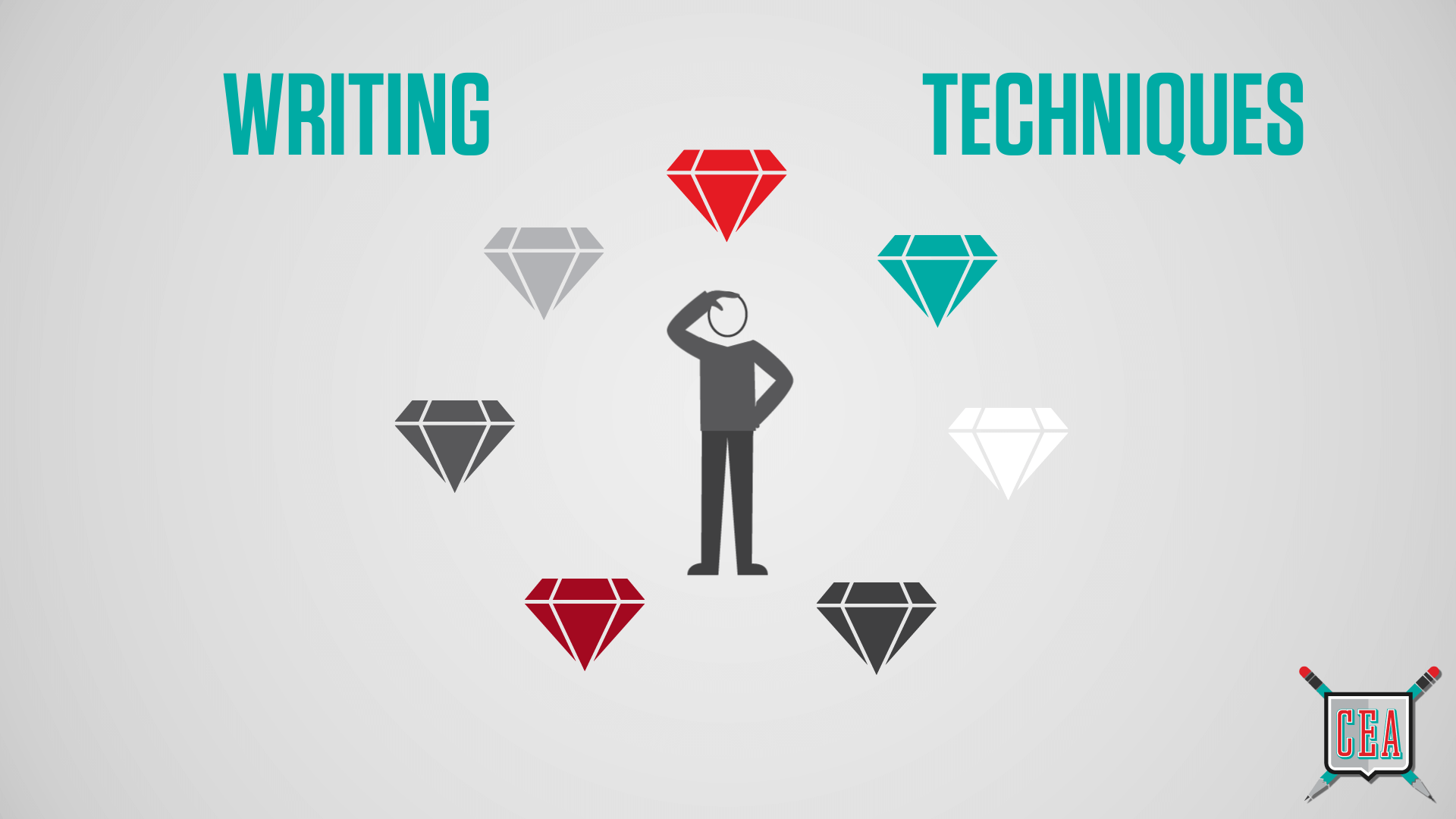
College Essay Writing Techniques: How to Write a Rough Draft
Not sure what to do with your brainstorming notes and freewriting? This video will show you how to focus on both breadth and depth while writing your Common App personal statement or school-specific supplemental essays. Build a strong foundation for your college essay by watching this tutorial!
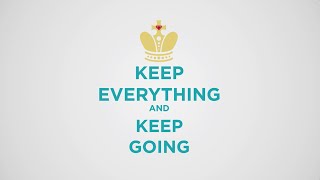
Freewriting, Topic Selection, and the First Draft
Freewriting is the key to an amazing college application essay - especially the first draft! Fill up you blank page (or text box) with these tips for getting started (and never stopping) on your way to personal statement success.
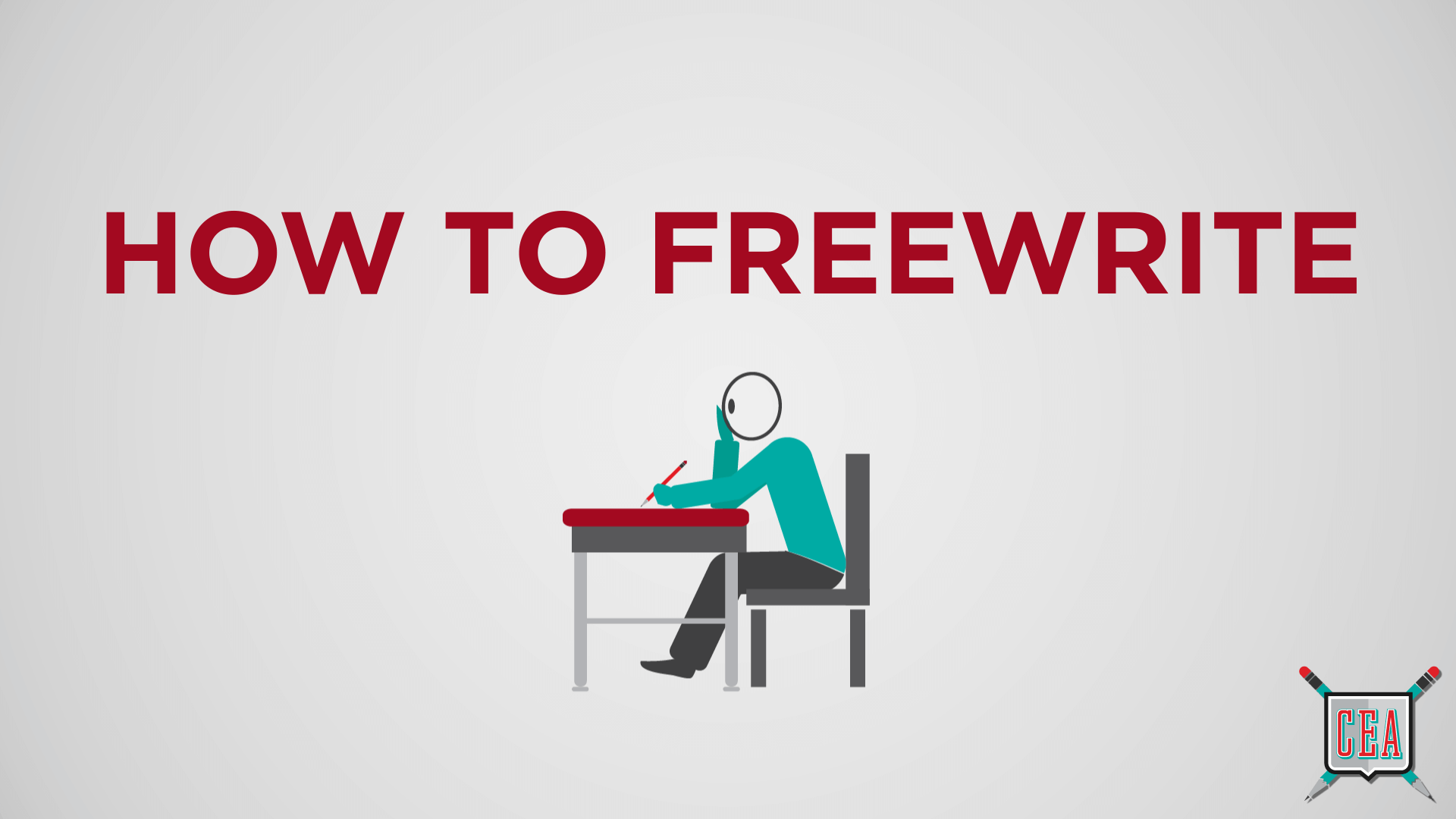
Freewriting 101: How to Freewrite for Your College Essay
Freewriting is, at its core, just as it sounds: the act of writing freely. It is the exercise of jotting down whatever comes to mind, without judgment or worrying about the final product. Because the college admissions essay holds so much weight, many students struggle with the 'no judgement' part. This video will show you how to put your inner critic aside and let the writing flow.
![how to write a college essay video How do You Know When You’ve Found THE Winning Topic? [TAKE THE TEST]](https://www.collegeessayadvisors.com/wp-content/uploads/2019/06/Youtube_Ch3Row11_Thumb.png)
How do You Know When You’ve Found THE Winning Topic? [TAKE THE TEST]
How do you know when you've found THE topic? You know, the topic that will rule all other topics. The one that will make admissions officers laugh or cry...or both? Does your topic have what it takes to make you stand out from a sea of similarly qualified applicants? This video is here to help you put your topic to the test.
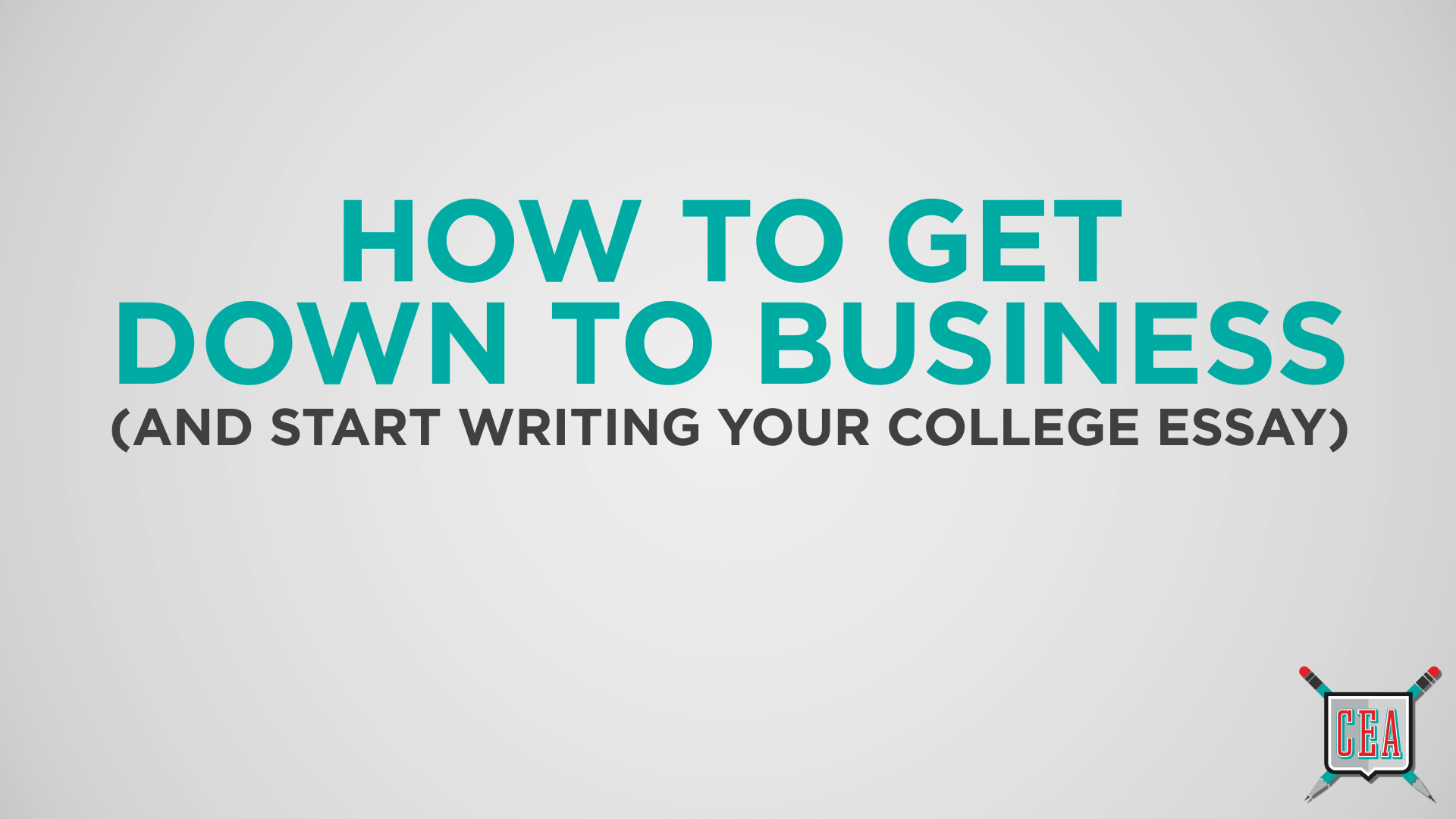
How to Begin the College Essay Writing Process
One of the hardest parts of writing the college application essay is getting started. Where is the best place to begin? What does admissions really want to hear from you? And how do you know if you’re moving in the right direction? We made this video full of helpful tips to help you break through your initial writing blocks and get you on the road to college essay success.
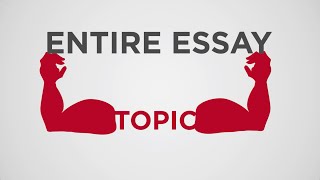
How To Outline Your Personal Statement
Extracting a killer college application essay from your notes, brainstorms, and freewrites may seem like a daunting task. You love your topic, but your ideas are scattered. That's why outlining is your friend.
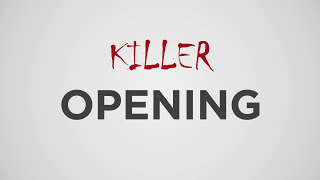
The Trick to Writing an Amazing Opening Line
The personal statement is a crucial part of your college application, but it won't help you if it bores admissions officers to tears! Learn the do's and don'ts of how to write a powerful opening line that pulls your reader in from the very first word.

How To Write a Memorable Closing Line
Your personal statement should tell a memorable story that admissions officers just can't shake. Your closing line is your final shot to make a lasting impression before your college fate is sealed! The experts at College Essay Advisors have lined up their most essential tips for writing a killer closing line.
Storytelling
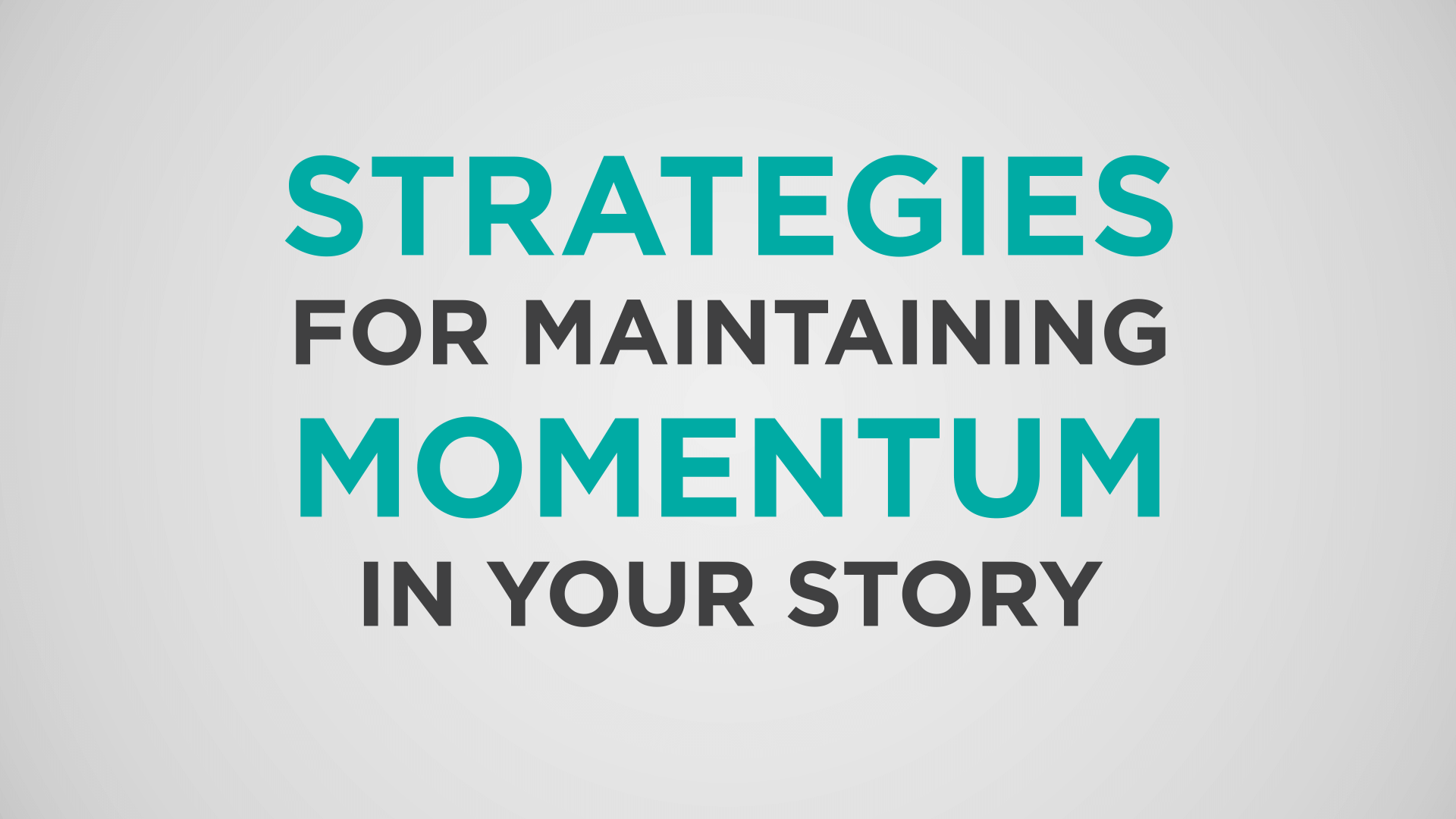
College Essay Tips: Strategies for Holding an Admissions Officer’s Attention
Most admissions essay are boring! What can you do to actively pull an admissions officer through your narrative with pointed interest? Are there strategies you can use to push a story forward with a sense of urgency? Of course there are! This video will show you a few of the most effective strategies to capture and keep your reader's attention.
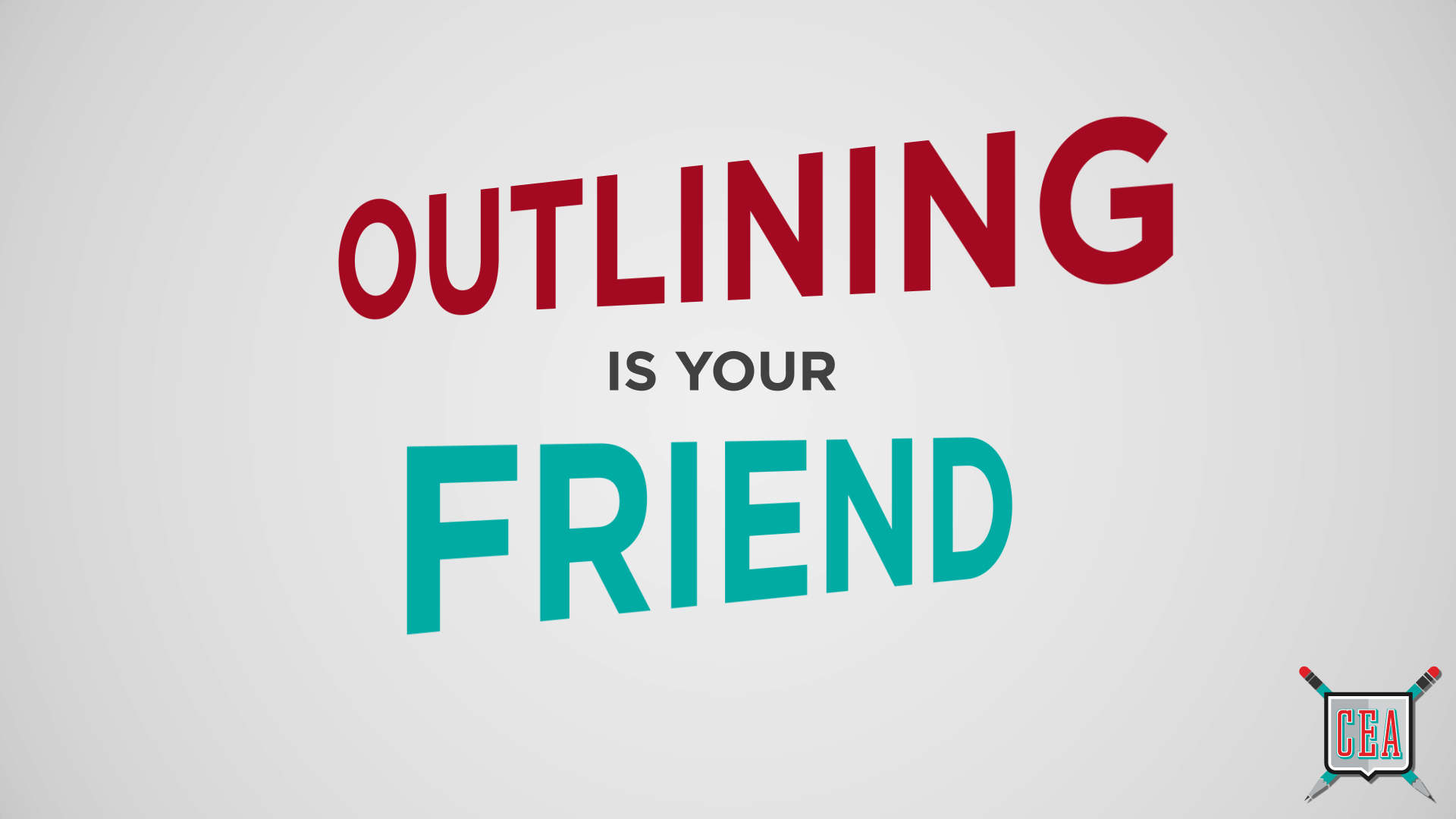
How to Make a College Essay Outline (Before Writing Your Draft)!
You have amazing ideas on the page, and now you want to mold these thoughts and concepts into the first semblance of a draft -- but how?! With an outline, of course! If you are equipped with a topic and some freewrites but still don't know how to structure your story, this video will teach you to organize your thoughts into a map that will guide you through the rest of your essay writing process.
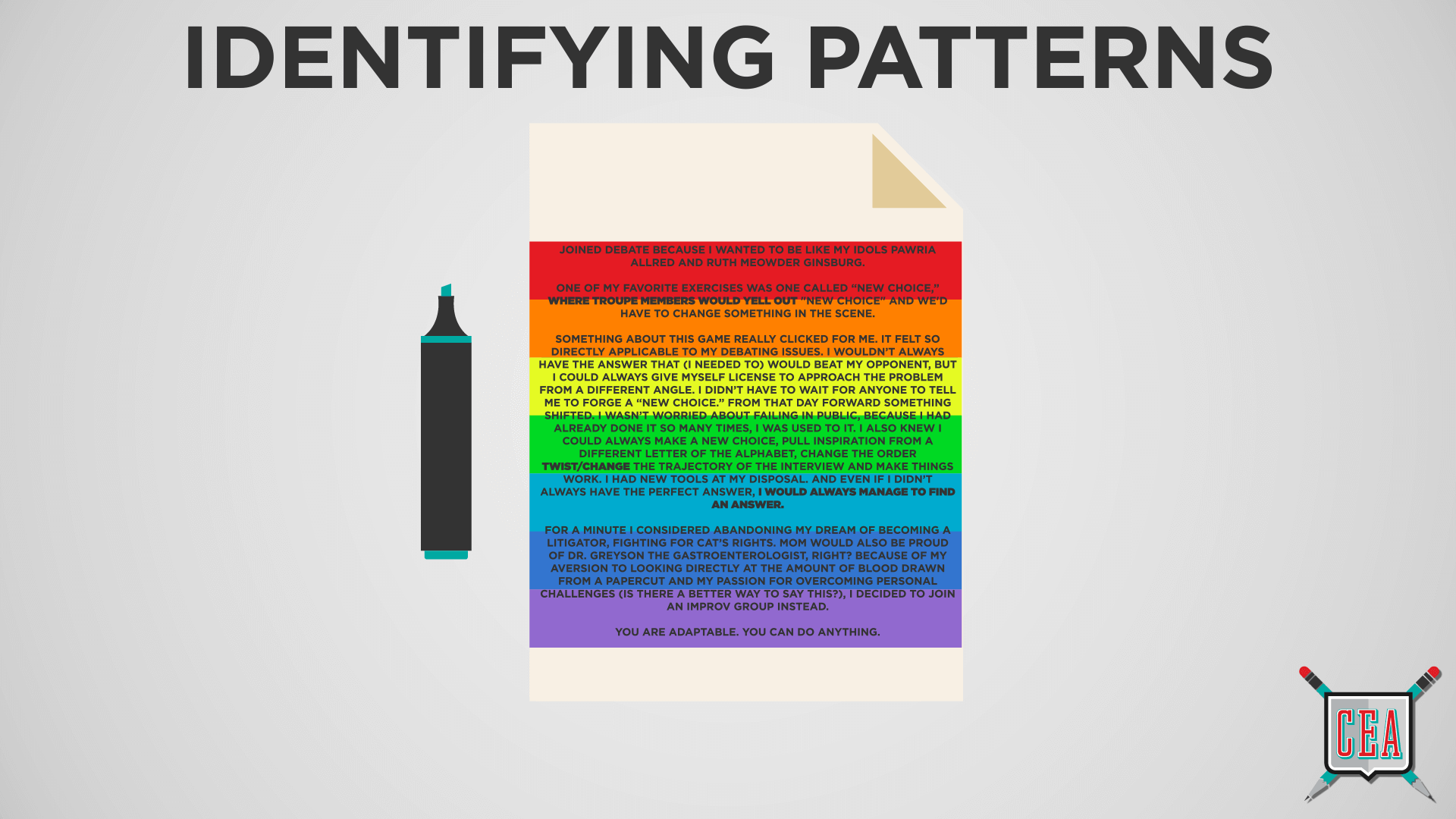
How to Find Golden Ideas in your College Essay Freewrites
In this video, CEA shows you how to find big patterns in your freewrites and brainstorming notes. Once you identify the prevailing themes and messages in your writing, it's much easier to decide which sentences, ideas, and metaphors will enhance your personal essay and which ones belong on the cutting room floor!
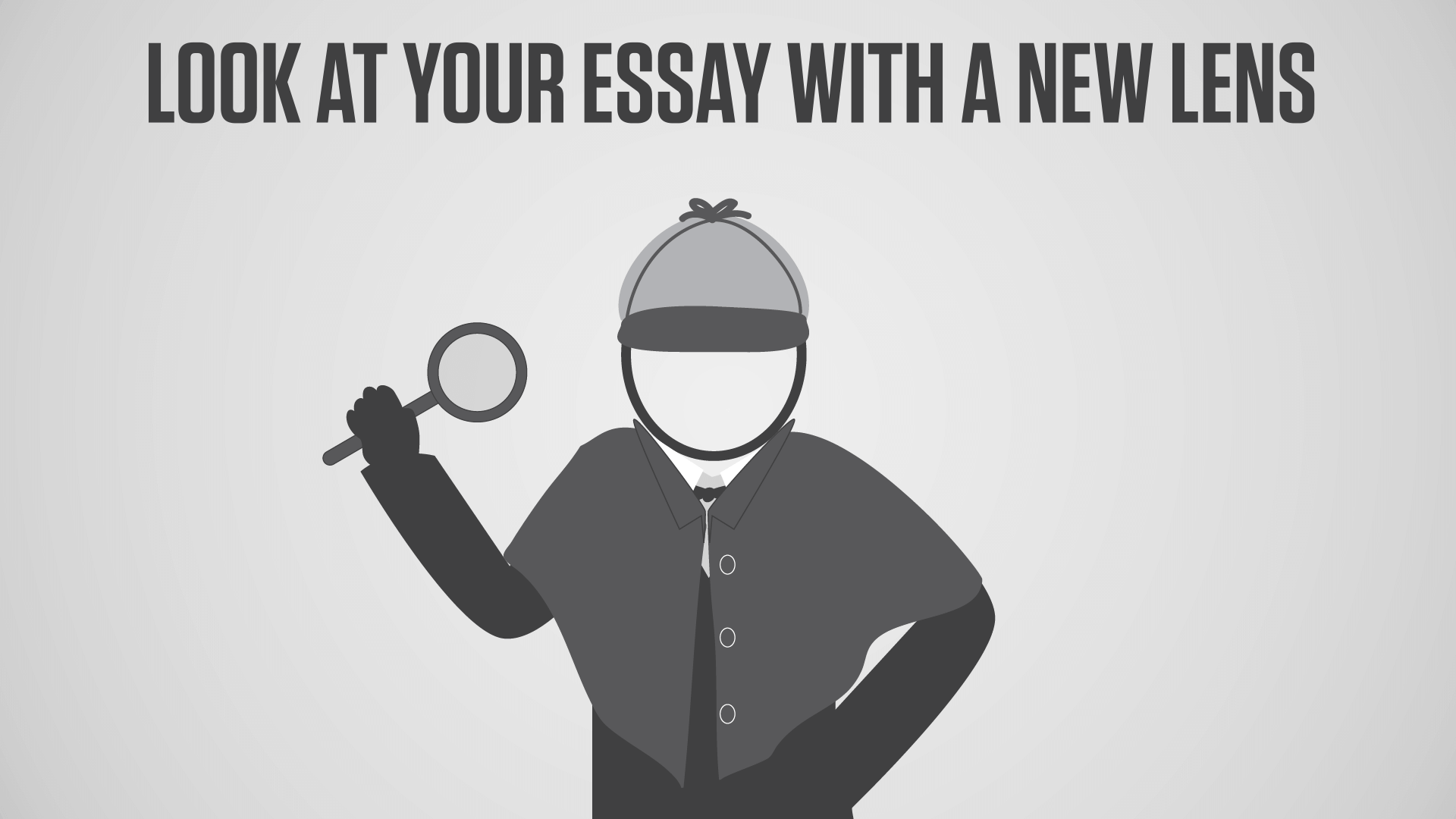
Final Tips for Improving Your College Essay Draft
This is the expert advice we give to our one-on-one advising clients on how they can find ways to reword and restructure their essays into polished, final drafts worthy of an admissions officer's careful read-through. Don't submit an essay that you haven't edited, revised, and polished!
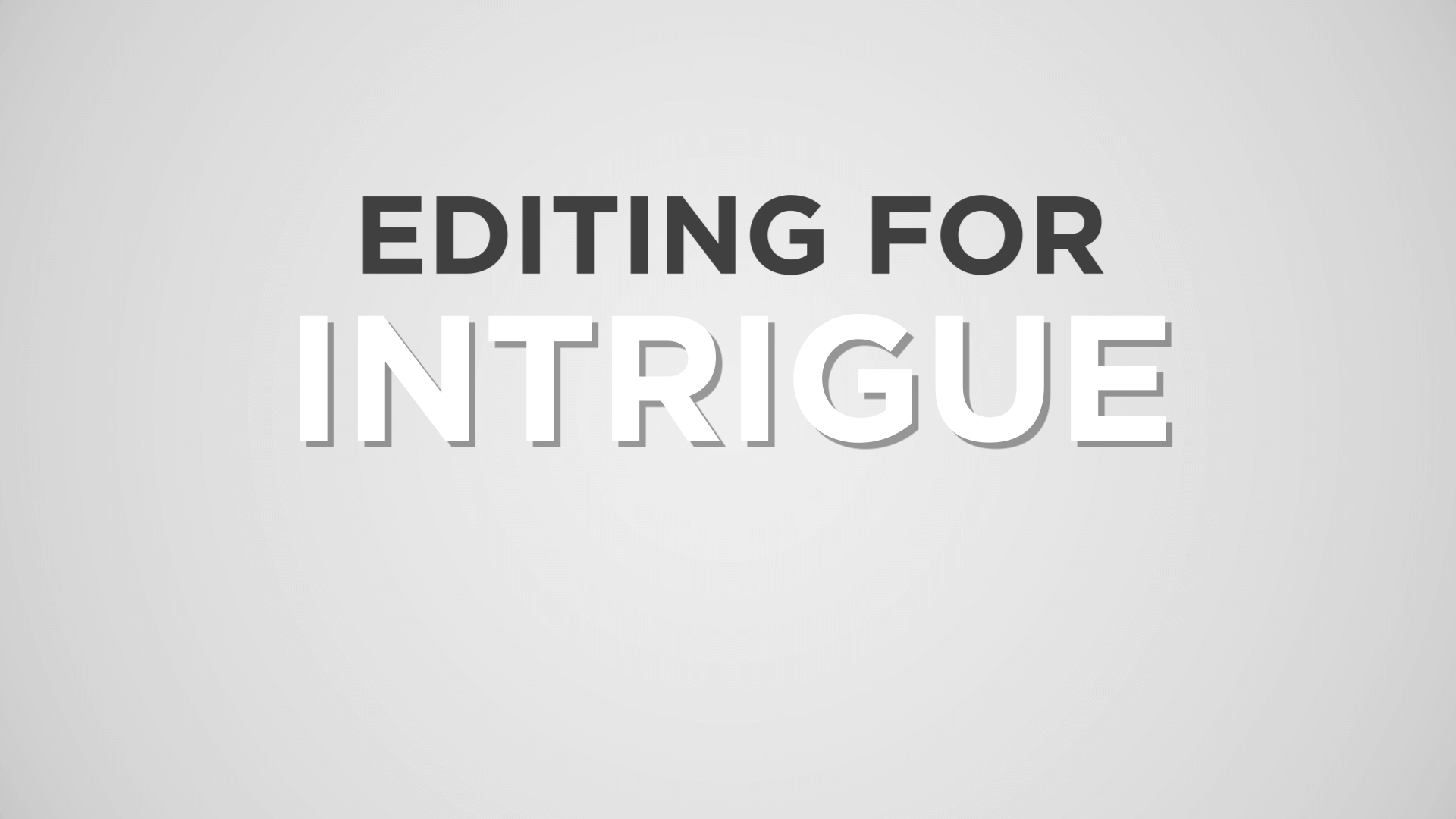
The Triple Edit: Editing Your College Essay for Intrigue
One of the most important steps in the admissions essay creation process is editing your essay for maximum impact. We’re going to show you how to refine the small details within that narrative in the form of a Triple Editing process. Step One: Editing for Intrigue. Let's begin!
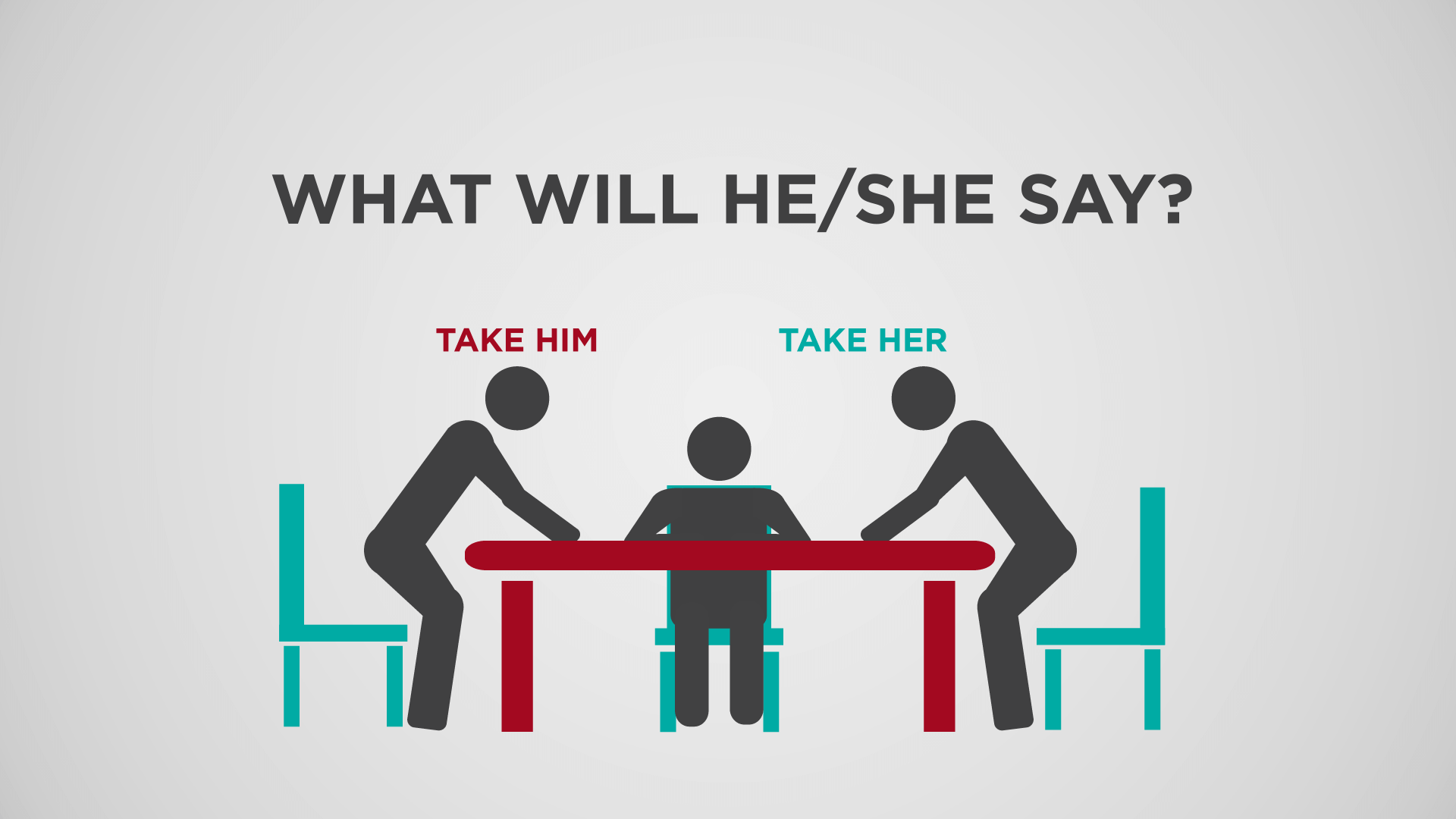
Questions to Ask Yourself After You Finish Your Common App Personal Statement
Does your essay check all the college admissions success boxes? Before you put down your pen (or relax your fingers), you are going to want to ask yourself a few questions. This video will walk you through each of these questions and help you find the answers: 1. Will this essay make admissions wish they could meet me in person? Does it inspire them to want to know more about me? 2. Is this essay actually about me? 3. Will anyone else be able to write this essay in the way I wrote it? Would it be crazy to think of someone else claiming my essay as his/her own? 4. What does this essay say about me? What is the ultimate message I am hoping to convey? 5. Do I feel good about this essay? Would I feel proud reading it aloud in front of an audience? Does it represent who I really am?
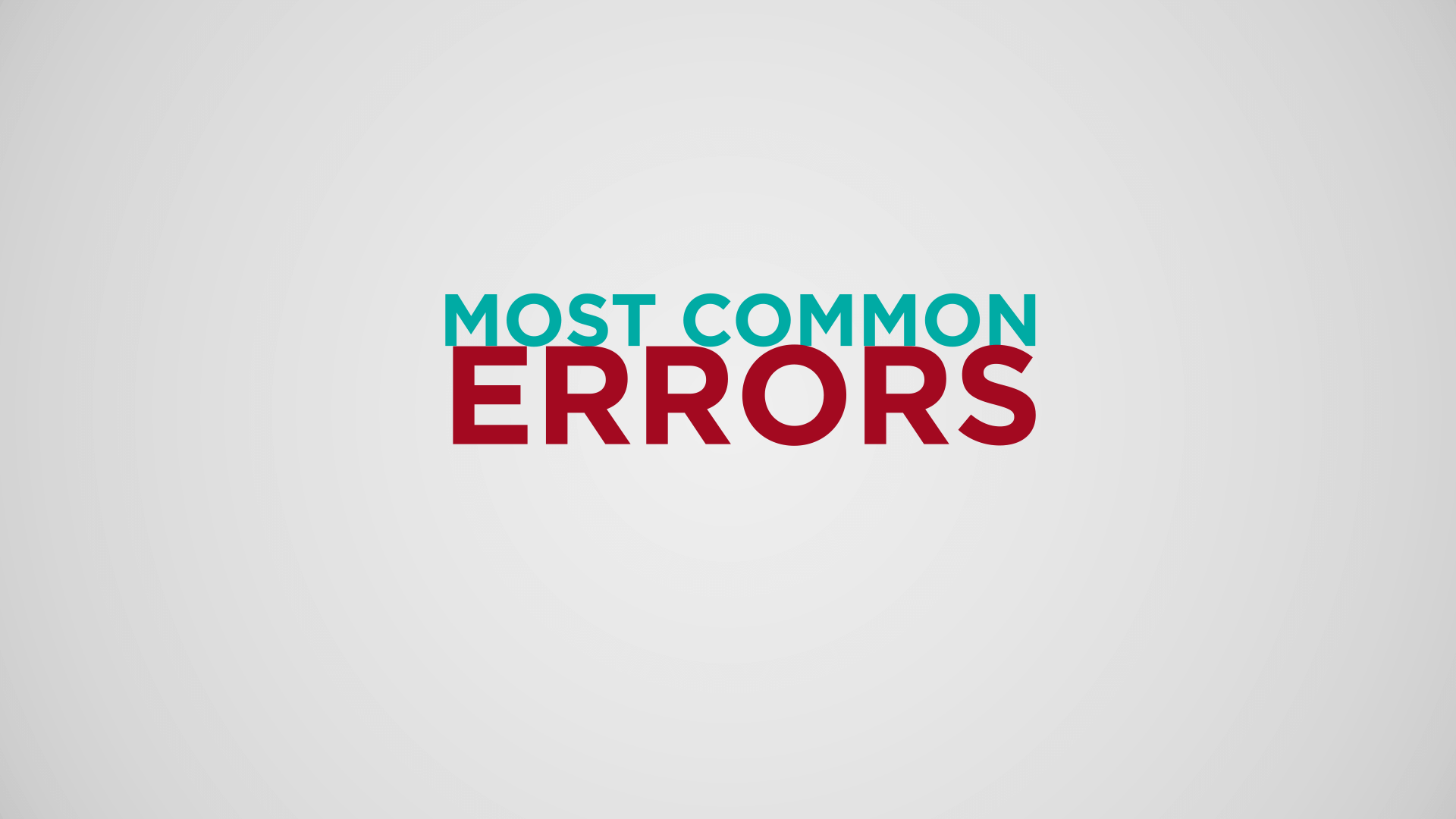
How to Review Your Draft to Find Errors | College Essay Quick Tips
What do you do when you have already brainstormed, selected a magic topic, written multiple drafts of your essay, and edited your masterpiece? You review your draft, of course! Over the years, CEA has mastered the art of the review and that's exactly what CEA's Founder and Chief Advisor, Stacey Brook, is going to teach you to do in this video from College Essay Advisors.
Dos and Don’ts
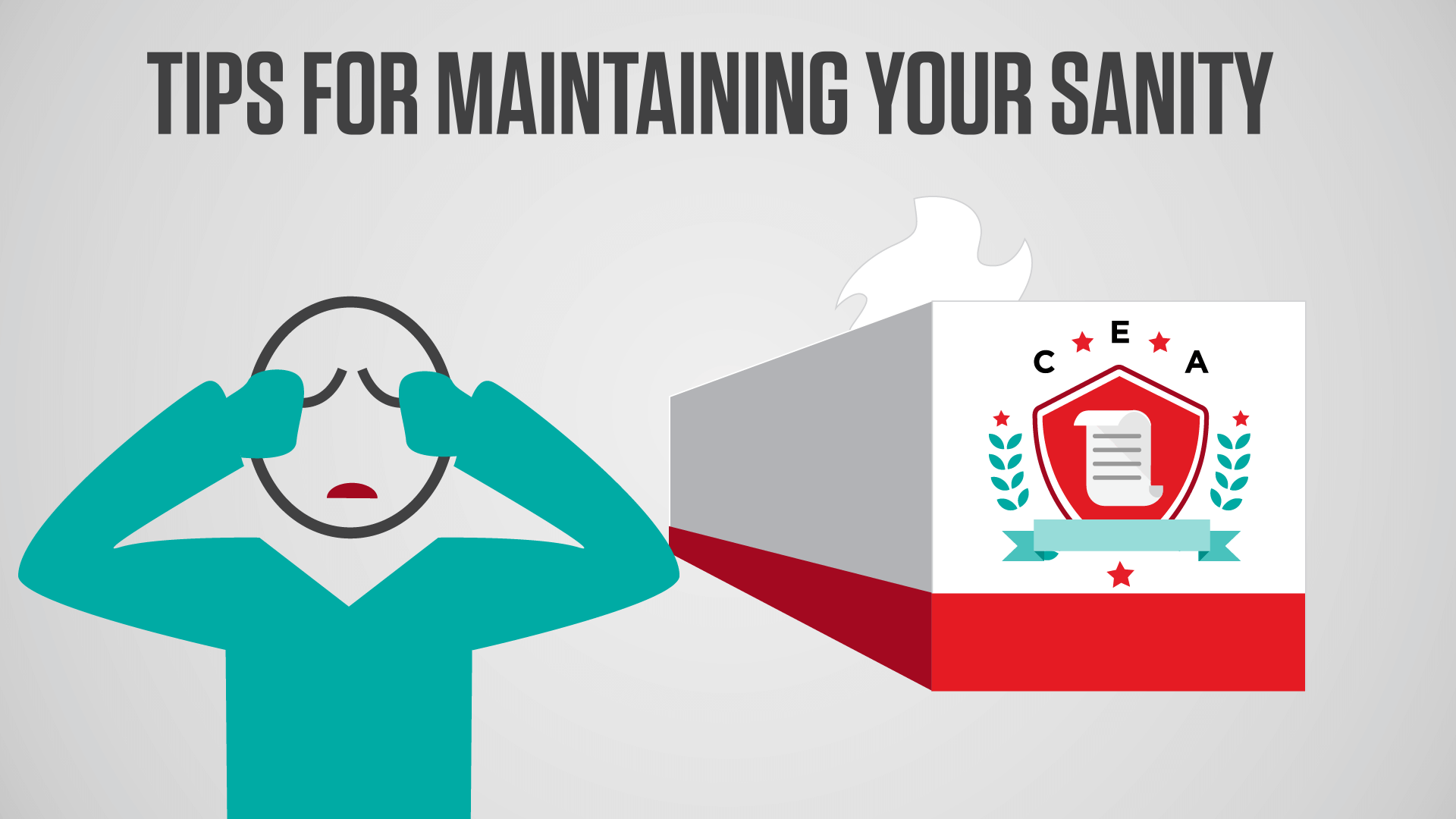
CEA’s Tips for Maintaining your Sanity and Combatting Stress During College Application Season
If you find yourself hyperventilating over your Common Application personal statement or simply want to recharge before diving into your fourth Why essay, give the exercises in this video a try. You might be pleasantly surprised at the power a posture, a few words, or some silence can have on your mentality.
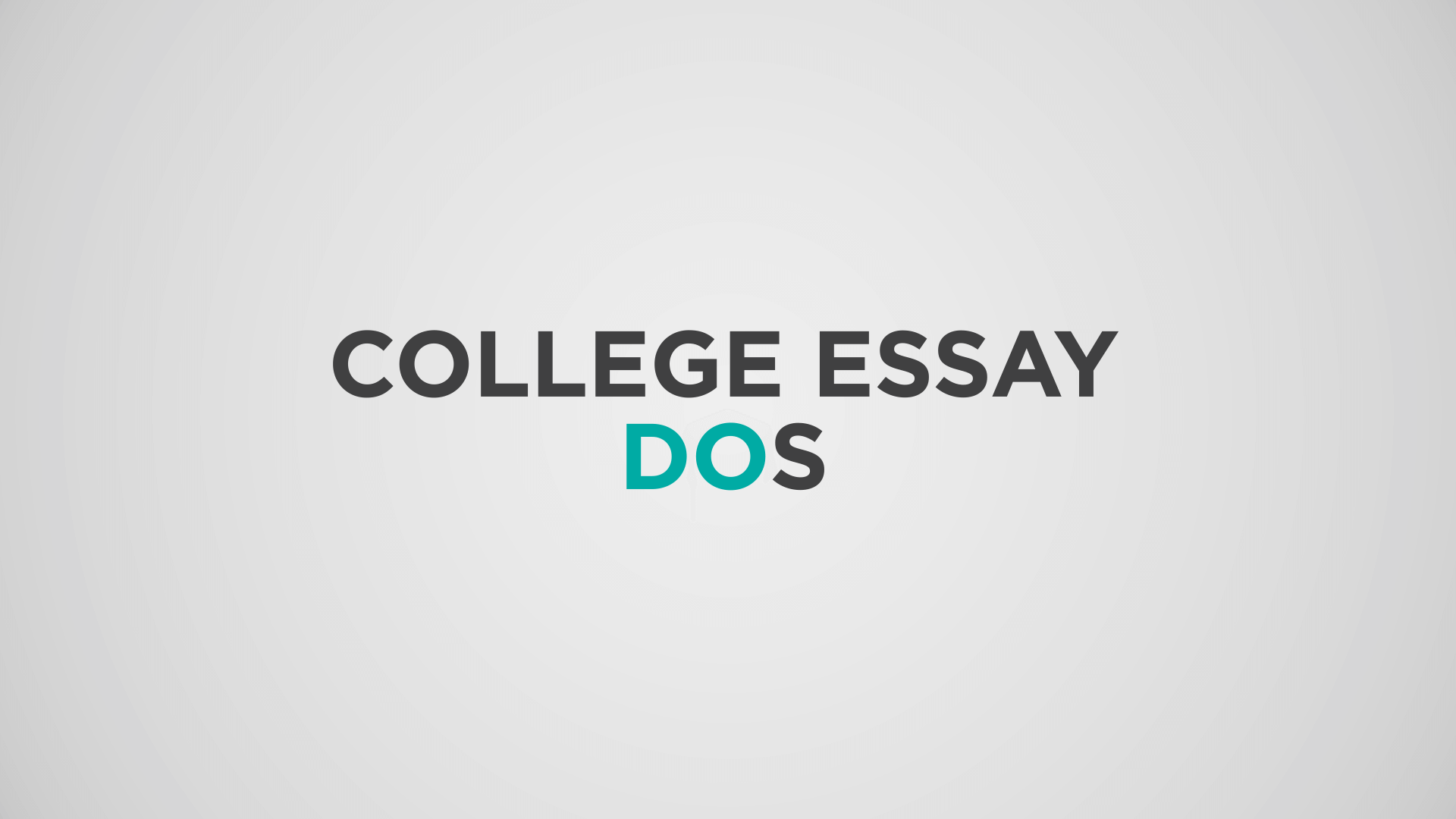
The 10 Things You Must Do to Write a College Essay Worthy of Admission
In this video, we will walk you through the top 10 DOs of the college admissions essay writing process, a series of tips that will help you write a personal statement that truly makes an impact on admissions officers and helps you gain acceptance to top schools across the country. Learn what you must include in your essay for it to have a powerful impact, surefire ways to get closer to college essay success, and so much more!
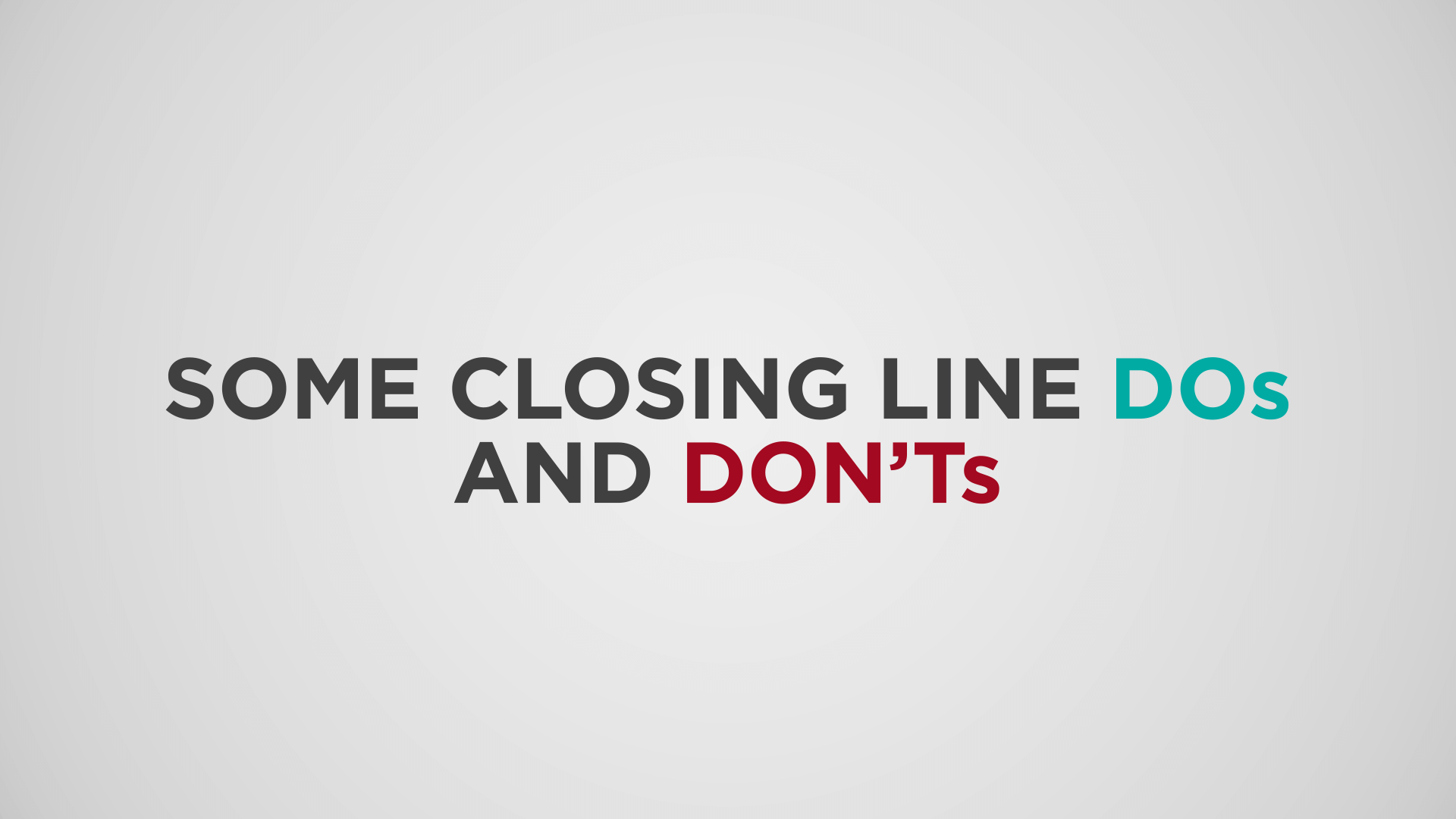
Top 10 College Essay Closing Line Dos and Don’ts
How do you leave an admissions officer with a lasting impression? What makes a college essay truly memorable? Our Top 10 Dos and Don'ts for College Essay Closing Lines will show you how to effectively wrap up your essay and leave admissions with a sense of who you are that they won't easily forget.
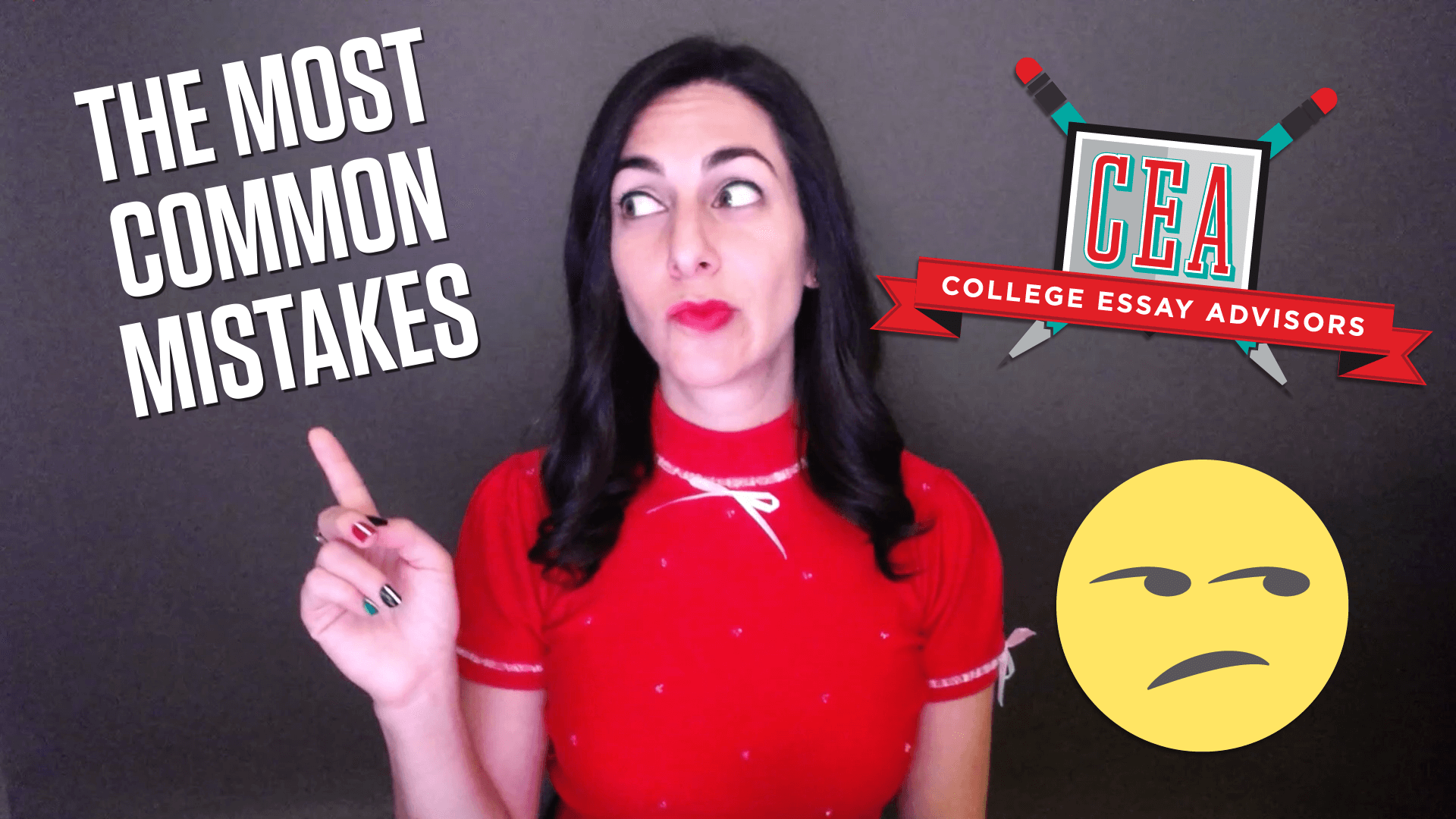
The Most Common Mistakes Students Make in Their College Essays
The admissions essay is a crucial part of your college application because it is the only chance you have to communicate with admissions officers in your own voice. You need to take advantage of every word at your disposal and send the message that you’re the kind of student that colleges should want on their campus. Over our thirteen years of coaching students through the college essay process, we have identified the most common mistakes students make when writing their college essay. Don’t do these things!
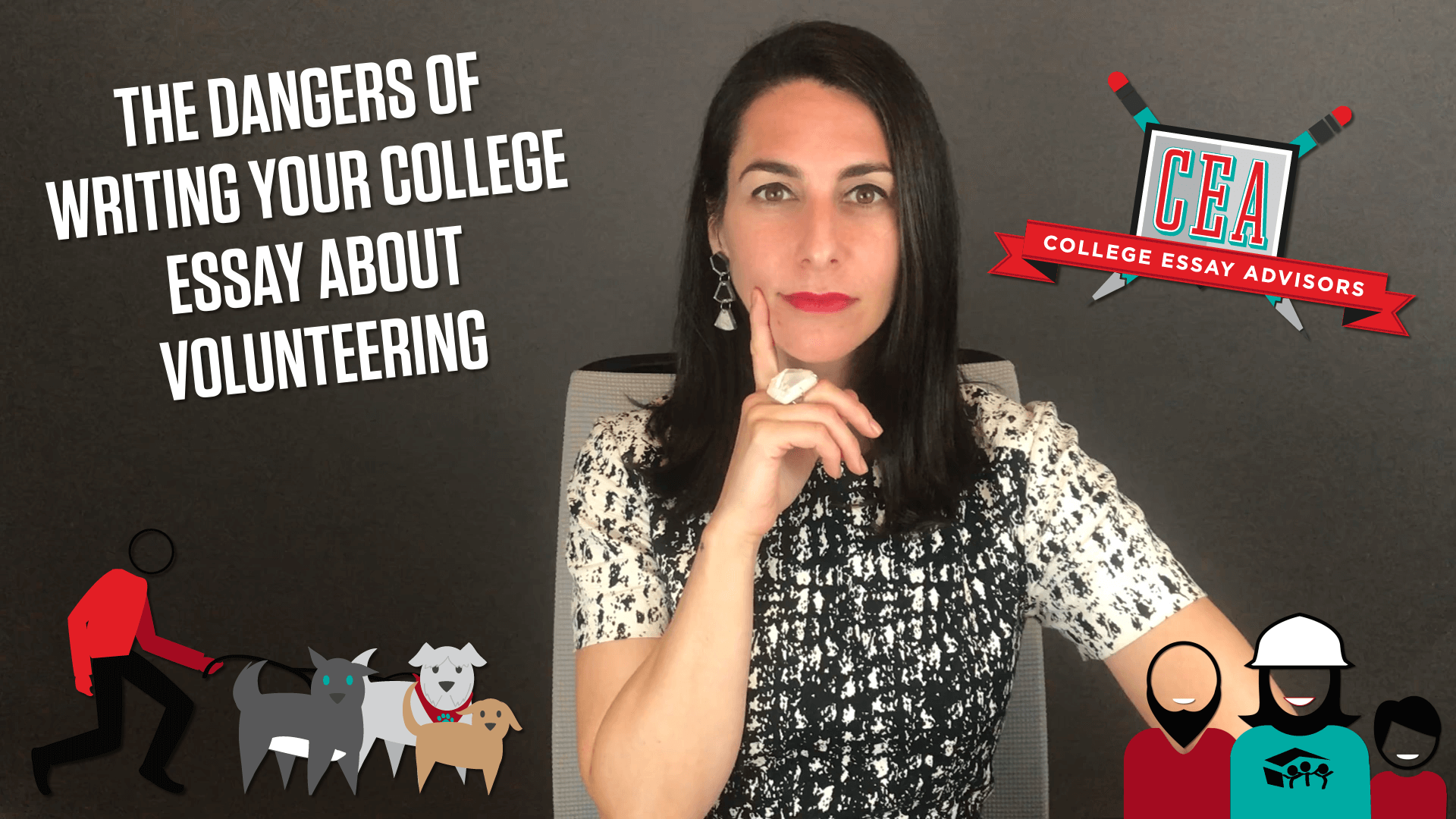
Can You Write About Volunteering in Your College Essay?
Can you write about volunteering in your college admissions essay? Well, you shouldn’t write about a community-service initiative just because you think it’s what admissions wants to hear. Some essays about volunteer efforts inevitably come off as inauthentic (because they often are).
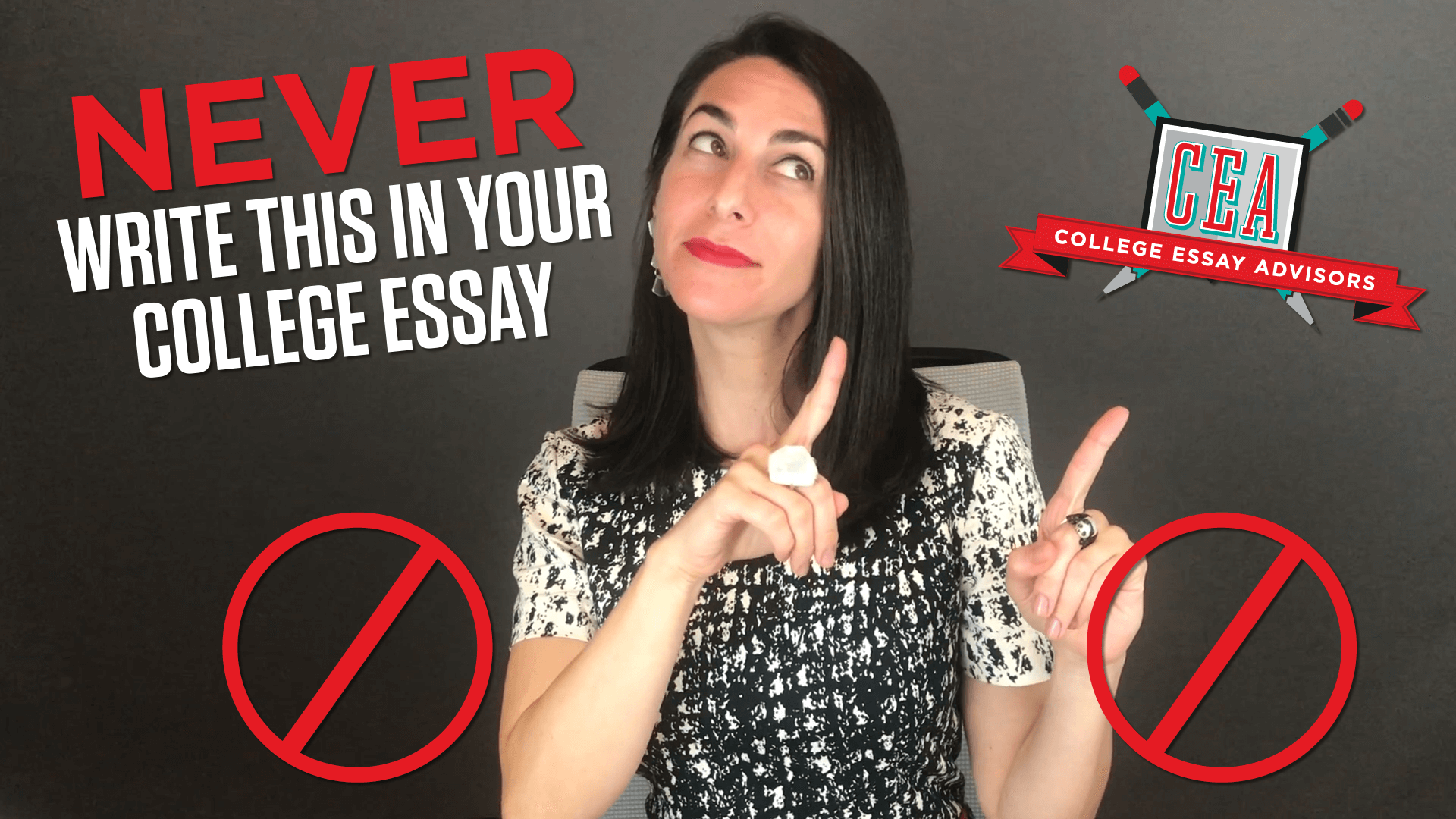
You Should Never Write This in Your College Essay
Here is a short and sweet tip from Team CEA: make sure you NEVER write this in your college essay. Keep watching to discover the ultimate college essay don't!
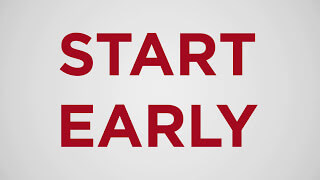
Most Common Essay Topic Mistakes
Before you decide on your final college application essay topic, check to make sure you haven't made any of these common mistakes.

How to Ask Your Parents for Help
As you zone in on the topic you want to write about in your college application essays, mine for the details that will bring your story to life. Approach this phase of writing the personal statement as an interview: what kinds of questions would other people ask? How would you answer them?
Coalition App Essay Prompts
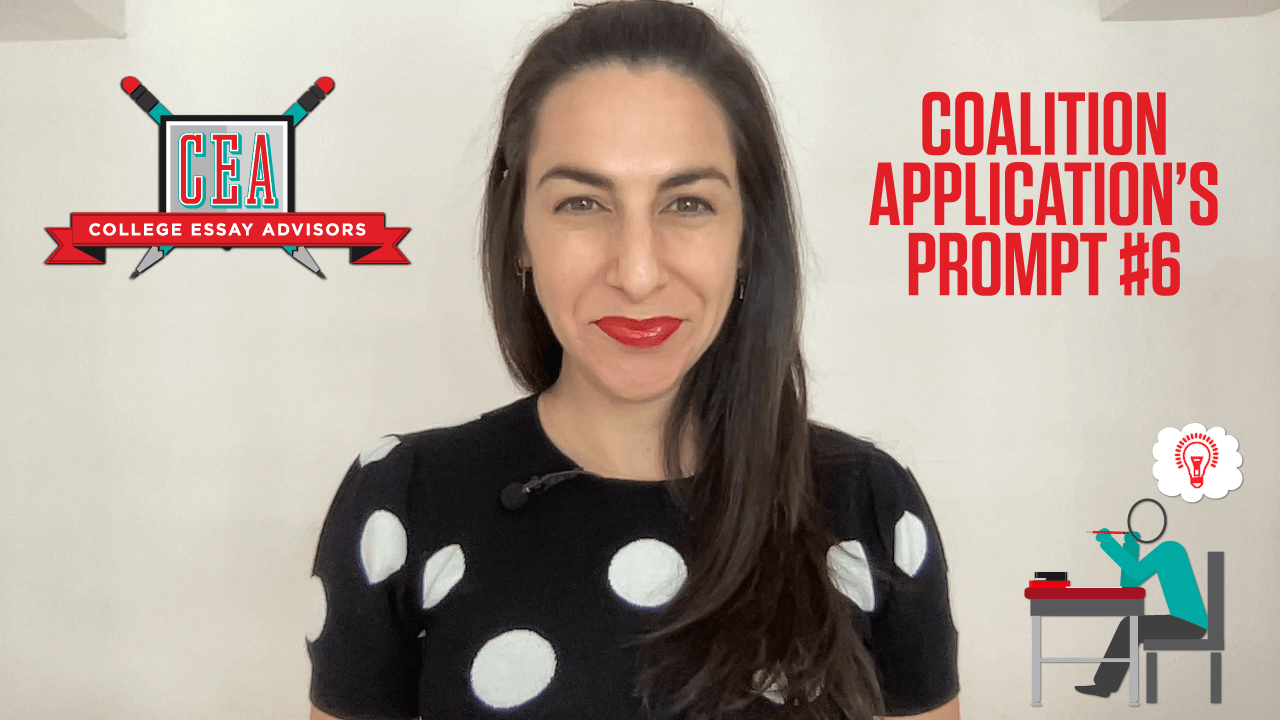
Coalition Application’s Essay Prompt #6: Topic of Your Choice (2022-23)
The 2022-23 Coalition Application essay prompts have been announced, which means you can start writing your personal statement right away! CEA Founder and Chief Advisor, Stacey Brook, is here to talk you through the Coalition App's sixth and final essay prompt.
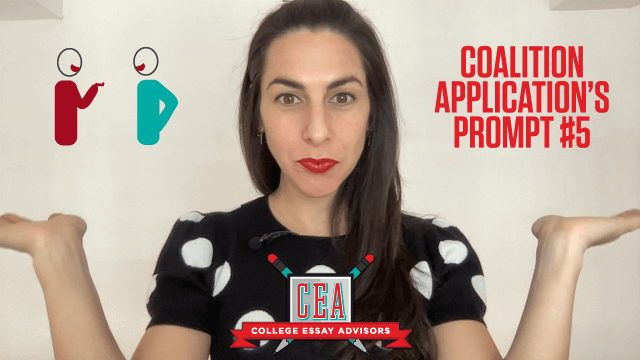
Coalition Application’s Essay Prompt #5: A Success or Obstacle (2022-23)
The 2022-23 Coalition Application essay prompts have been announced, which means you can start writing your personal statement right away! CEA Founder and Chief Advisor, Stacey Brook, is here to break the Coalition App's fifth prompt down, so you can approach the essay writing process with clarity and purpose.
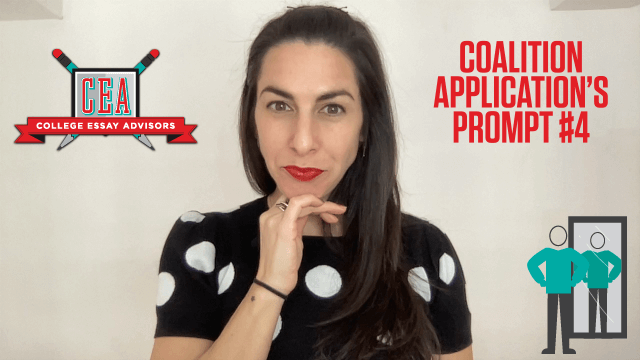
Coalition Application’s Essay Prompt #4: An Idea or Belief (2022-23)
The 2022-23 Coalition Application essay prompts have been announced, which means you can start writing your personal statement right away! CEA Founder and Chief Advisor, Stacey Brook, is here to help you think through the Coalition App's fourth prompt, so you can make sure your essay stands out.
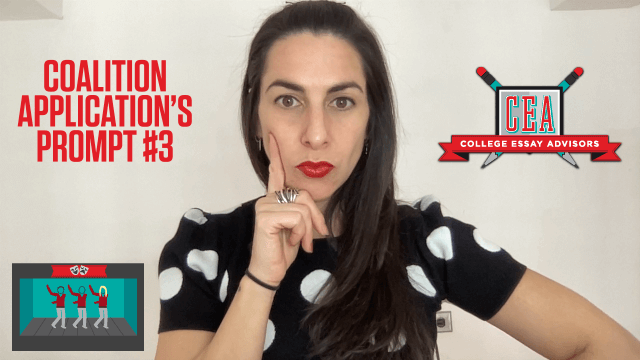
Coalition Application’s Essay Prompt #3: A Positive Impact (2022-23)
The 2022-23 Coalition Application essay prompts have been announced, which means you can start writing your personal statement right away! CEA Founder and Chief Advisor, Stacey Brook, is here to break down the Coalition App's third essay prompt, so you can write a response worthy of admission.
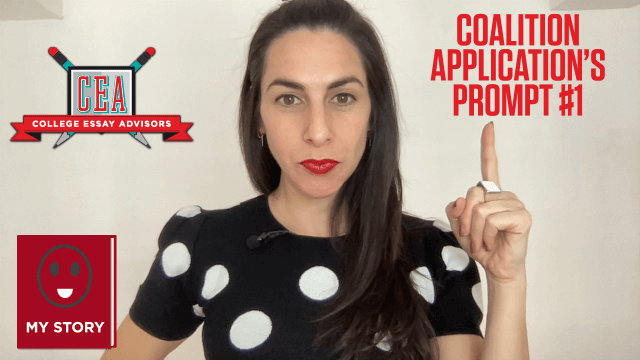
Coalition Application’s Essay Prompt #1: A Story From Your Life (2022-23)
The 2022-23 Coalition Application essay prompts have been announced, which means you can start writing your personal statement right away! CEA Founder and Chief Advisor, Stacey Brook, is here to explain what the Coalition App's first prompt is REALLY asking and offer some tips and tricks for penning your response.
- Our Approach & Team
- Undergraduate Testimonials
- Postgraduate Testimonials
- Where Our Students Get In
- CEA Gives Back
- Undergraduate Admissions
- Graduate Admissions
- Private School Admissions
- International Student Admissions
- Common App Essay Guide
- Supplemental Essay Guides
- Coalition App Guide
- The CEA Podcast
- Admissions Stats
- Notification Trackers
- Deadline Databases
- Academy and Worksheets
- Waitlist Guides
- Get Started

Choose Your Test
Sat / act prep online guides and tips, 177 college essay examples for 11 schools + expert analysis.
College Admissions , College Essays

The personal statement might just be the hardest part of your college application. Mostly this is because it has the least guidance and is the most open-ended. One way to understand what colleges are looking for when they ask you to write an essay is to check out the essays of students who already got in—college essays that actually worked. After all, they must be among the most successful of this weird literary genre.
In this article, I'll go through general guidelines for what makes great college essays great. I've also compiled an enormous list of 100+ actual sample college essays from 11 different schools. Finally, I'll break down two of these published college essay examples and explain why and how they work. With links to 177 full essays and essay excerpts , this article is a great resource for learning how to craft your own personal college admissions essay!
What Excellent College Essays Have in Common
Even though in many ways these sample college essays are very different from one other, they do share some traits you should try to emulate as you write your own essay.
Visible Signs of Planning
Building out from a narrow, concrete focus. You'll see a similar structure in many of the essays. The author starts with a very detailed story of an event or description of a person or place. After this sense-heavy imagery, the essay expands out to make a broader point about the author, and connects this very memorable experience to the author's present situation, state of mind, newfound understanding, or maturity level.
Knowing how to tell a story. Some of the experiences in these essays are one-of-a-kind. But most deal with the stuff of everyday life. What sets them apart is the way the author approaches the topic: analyzing it for drama and humor, for its moving qualities, for what it says about the author's world, and for how it connects to the author's emotional life.
Stellar Execution
A killer first sentence. You've heard it before, and you'll hear it again: you have to suck the reader in, and the best place to do that is the first sentence. Great first sentences are punchy. They are like cliffhangers, setting up an exciting scene or an unusual situation with an unclear conclusion, in order to make the reader want to know more. Don't take my word for it—check out these 22 first sentences from Stanford applicants and tell me you don't want to read the rest of those essays to find out what happens!
A lively, individual voice. Writing is for readers. In this case, your reader is an admissions officer who has read thousands of essays before yours and will read thousands after. Your goal? Don't bore your reader. Use interesting descriptions, stay away from clichés, include your own offbeat observations—anything that makes this essay sounds like you and not like anyone else.

Technical correctness. No spelling mistakes, no grammar weirdness, no syntax issues, no punctuation snafus—each of these sample college essays has been formatted and proofread perfectly. If this kind of exactness is not your strong suit, you're in luck! All colleges advise applicants to have their essays looked over several times by parents, teachers, mentors, and anyone else who can spot a comma splice. Your essay must be your own work, but there is absolutely nothing wrong with getting help polishing it.
And if you need more guidance, connect with PrepScholar's expert admissions consultants . These expert writers know exactly what college admissions committees look for in an admissions essay and chan help you craft an essay that boosts your chances of getting into your dream school.
Check out PrepScholar's Essay Editing and Coaching progra m for more details!

Want to write the perfect college application essay? Get professional help from PrepScholar.
Your dedicated PrepScholar Admissions counselor will craft your perfect college essay, from the ground up. We'll learn your background and interests, brainstorm essay topics, and walk you through the essay drafting process, step-by-step. At the end, you'll have a unique essay that you'll proudly submit to your top choice colleges.
Don't leave your college application to chance. Find out more about PrepScholar Admissions now :

Links to Full College Essay Examples
Some colleges publish a selection of their favorite accepted college essays that worked, and I've put together a selection of over 100 of these.
Common App Essay Samples
Please note that some of these college essay examples may be responding to prompts that are no longer in use. The current Common App prompts are as follows:
1. Some students have a background, identity, interest, or talent that is so meaningful they believe their application would be incomplete without it. If this sounds like you, then please share your story. 2. The lessons we take from obstacles we encounter can be fundamental to later success. Recount a time when you faced a challenge, setback, or failure. How did it affect you, and what did you learn from the experience? 3. Reflect on a time when you questioned or challenged a belief or idea. What prompted your thinking? What was the outcome? 4. Reflect on something that someone has done for you that has made you happy or thankful in a surprising way. How has this gratitude affected or motivated you? 5. Discuss an accomplishment, event, or realization that sparked a period of personal growth and a new understanding of yourself or others. 6. Describe a topic, idea, or concept you find so engaging that it makes you lose all track of time. Why does it captivate you? What or who do you turn to when you want to learn more?
7. Share an essay on any topic of your choice. It can be one you've already written, one that responds to a different prompt, or one of your own design.
Now, let's get to the good stuff: the list of 177 college essay examples responding to current and past Common App essay prompts.
Connecticut college.
- 12 Common Application essays from the classes of 2022-2025
Hamilton College
- 7 Common Application essays from the class of 2026
- 7 Common Application essays from the class of 2022
- 7 Common Application essays from the class of 2018
- 8 Common Application essays from the class of 2012
- 8 Common Application essays from the class of 2007
Johns Hopkins
These essays are answers to past prompts from either the Common Application or the Coalition Application (which Johns Hopkins used to accept).
- 1 Common Application or Coalition Application essay from the class of 2026
- 6 Common Application or Coalition Application essays from the class of 2025
- 6 Common Application or Universal Application essays from the class of 2024
- 6 Common Application or Universal Application essays from the class of 2023
- 7 Common Application of Universal Application essays from the class of 2022
- 5 Common Application or Universal Application essays from the class of 2021
- 7 Common Application or Universal Application essays from the class of 2020
Essay Examples Published by Other Websites
- 2 Common Application essays ( 1st essay , 2nd essay ) from applicants admitted to Columbia
Other Sample College Essays
Here is a collection of essays that are college-specific.
Babson College
- 4 essays (and 1 video response) on "Why Babson" from the class of 2020
Emory University
- 5 essay examples ( 1 , 2 , 3 , 4 , 5 ) from the class of 2020 along with analysis from Emory admissions staff on why the essays were exceptional
- 5 more recent essay examples ( 1 , 2 , 3 , 4 , 5 ) along with analysis from Emory admissions staff on what made these essays stand out
University of Georgia
- 1 “strong essay” sample from 2019
- 1 “strong essay” sample from 2018
- 10 Harvard essays from 2023
- 10 Harvard essays from 2022
- 10 Harvard essays from 2021
- 10 Harvard essays from 2020
- 10 Harvard essays from 2019
- 10 Harvard essays from 2018
- 6 essays from admitted MIT students
Smith College
- 6 "best gift" essays from the class of 2018

Books of College Essays
If you're looking for even more sample college essays, consider purchasing a college essay book. The best of these include dozens of essays that worked and feedback from real admissions officers.
College Essays That Made a Difference —This detailed guide from Princeton Review includes not only successful essays, but also interviews with admissions officers and full student profiles.
50 Successful Harvard Application Essays by the Staff of the Harvard Crimson—A must for anyone aspiring to Harvard .
50 Successful Ivy League Application Essays and 50 Successful Stanford Application Essays by Gen and Kelly Tanabe—For essays from other top schools, check out this venerated series, which is regularly updated with new essays.
Heavenly Essays by Janine W. Robinson—This collection from the popular blogger behind Essay Hell includes a wider range of schools, as well as helpful tips on honing your own essay.

Analyzing Great Common App Essays That Worked
I've picked two essays from the examples collected above to examine in more depth so that you can see exactly what makes a successful college essay work. Full credit for these essays goes to the original authors and the schools that published them.
Example 1: "Breaking Into Cars," by Stephen, Johns Hopkins Class of '19 (Common App Essay, 636 words long)
I had never broken into a car before.
We were in Laredo, having just finished our first day at a Habitat for Humanity work site. The Hotchkiss volunteers had already left, off to enjoy some Texas BBQ, leaving me behind with the college kids to clean up. Not until we were stranded did we realize we were locked out of the van.
Someone picked a coat hanger out of the dumpster, handed it to me, and took a few steps back.
"Can you do that thing with a coat hanger to unlock it?"
"Why me?" I thought.
More out of amusement than optimism, I gave it a try. I slid the hanger into the window's seal like I'd seen on crime shows, and spent a few minutes jiggling the apparatus around the inside of the frame. Suddenly, two things simultaneously clicked. One was the lock on the door. (I actually succeeded in springing it.) The other was the realization that I'd been in this type of situation before. In fact, I'd been born into this type of situation.
My upbringing has numbed me to unpredictability and chaos. With a family of seven, my home was loud, messy, and spottily supervised. My siblings arguing, the dog barking, the phone ringing—all meant my house was functioning normally. My Dad, a retired Navy pilot, was away half the time. When he was home, he had a parenting style something like a drill sergeant. At the age of nine, I learned how to clear burning oil from the surface of water. My Dad considered this a critical life skill—you know, in case my aircraft carrier should ever get torpedoed. "The water's on fire! Clear a hole!" he shouted, tossing me in the lake without warning. While I'm still unconvinced about that particular lesson's practicality, my Dad's overarching message is unequivocally true: much of life is unexpected, and you have to deal with the twists and turns.
Living in my family, days rarely unfolded as planned. A bit overlooked, a little pushed around, I learned to roll with reality, negotiate a quick deal, and give the improbable a try. I don't sweat the small stuff, and I definitely don't expect perfect fairness. So what if our dining room table only has six chairs for seven people? Someone learns the importance of punctuality every night.
But more than punctuality and a special affinity for musical chairs, my family life has taught me to thrive in situations over which I have no power. Growing up, I never controlled my older siblings, but I learned how to thwart their attempts to control me. I forged alliances, and realigned them as necessary. Sometimes, I was the poor, defenseless little brother; sometimes I was the omniscient elder. Different things to different people, as the situation demanded. I learned to adapt.
Back then, these techniques were merely reactions undertaken to ensure my survival. But one day this fall, Dr. Hicks, our Head of School, asked me a question that he hoped all seniors would reflect on throughout the year: "How can I participate in a thing I do not govern, in the company of people I did not choose?"
The question caught me off guard, much like the question posed to me in Laredo. Then, I realized I knew the answer. I knew why the coat hanger had been handed to me.
Growing up as the middle child in my family, I was a vital participant in a thing I did not govern, in the company of people I did not choose. It's family. It's society. And often, it's chaos. You participate by letting go of the small stuff, not expecting order and perfection, and facing the unexpected with confidence, optimism, and preparedness. My family experience taught me to face a serendipitous world with confidence.
What Makes This Essay Tick?
It's very helpful to take writing apart in order to see just how it accomplishes its objectives. Stephen's essay is very effective. Let's find out why!
An Opening Line That Draws You In
In just eight words, we get: scene-setting (he is standing next to a car about to break in), the idea of crossing a boundary (he is maybe about to do an illegal thing for the first time), and a cliffhanger (we are thinking: is he going to get caught? Is he headed for a life of crime? Is he about to be scared straight?).
Great, Detailed Opening Story
More out of amusement than optimism, I gave it a try. I slid the hanger into the window's seal like I'd seen on crime shows, and spent a few minutes jiggling the apparatus around the inside of the frame.
It's the details that really make this small experience come alive. Notice how whenever he can, Stephen uses a more specific, descriptive word in place of a more generic one. The volunteers aren't going to get food or dinner; they're going for "Texas BBQ." The coat hanger comes from "a dumpster." Stephen doesn't just move the coat hanger—he "jiggles" it.
Details also help us visualize the emotions of the people in the scene. The person who hands Stephen the coat hanger isn't just uncomfortable or nervous; he "takes a few steps back"—a description of movement that conveys feelings. Finally, the detail of actual speech makes the scene pop. Instead of writing that the other guy asked him to unlock the van, Stephen has the guy actually say his own words in a way that sounds like a teenager talking.

Turning a Specific Incident Into a Deeper Insight
Suddenly, two things simultaneously clicked. One was the lock on the door. (I actually succeeded in springing it.) The other was the realization that I'd been in this type of situation before. In fact, I'd been born into this type of situation.
Stephen makes the locked car experience a meaningful illustration of how he has learned to be resourceful and ready for anything, and he also makes this turn from the specific to the broad through an elegant play on the two meanings of the word "click."
Using Concrete Examples When Making Abstract Claims
My upbringing has numbed me to unpredictability and chaos. With a family of seven, my home was loud, messy, and spottily supervised. My siblings arguing, the dog barking, the phone ringing—all meant my house was functioning normally.
"Unpredictability and chaos" are very abstract, not easily visualized concepts. They could also mean any number of things—violence, abandonment, poverty, mental instability. By instantly following up with highly finite and unambiguous illustrations like "family of seven" and "siblings arguing, the dog barking, the phone ringing," Stephen grounds the abstraction in something that is easy to picture: a large, noisy family.
Using Small Bits of Humor and Casual Word Choice
My Dad, a retired Navy pilot, was away half the time. When he was home, he had a parenting style something like a drill sergeant. At the age of nine, I learned how to clear burning oil from the surface of water. My Dad considered this a critical life skill—you know, in case my aircraft carrier should ever get torpedoed.
Obviously, knowing how to clean burning oil is not high on the list of things every 9-year-old needs to know. To emphasize this, Stephen uses sarcasm by bringing up a situation that is clearly over-the-top: "in case my aircraft carrier should ever get torpedoed."
The humor also feels relaxed. Part of this is because he introduces it with the colloquial phrase "you know," so it sounds like he is talking to us in person. This approach also diffuses the potential discomfort of the reader with his father's strictness—since he is making jokes about it, clearly he is OK. Notice, though, that this doesn't occur very much in the essay. This helps keep the tone meaningful and serious rather than flippant.

An Ending That Stretches the Insight Into the Future
But one day this fall, Dr. Hicks, our Head of School, asked me a question that he hoped all seniors would reflect on throughout the year: "How can I participate in a thing I do not govern, in the company of people I did not choose?"
The ending of the essay reveals that Stephen's life has been one long preparation for the future. He has emerged from chaos and his dad's approach to parenting as a person who can thrive in a world that he can't control.
This connection of past experience to current maturity and self-knowledge is a key element in all successful personal essays. Colleges are very much looking for mature, self-aware applicants. These are the qualities of successful college students, who will be able to navigate the independence college classes require and the responsibility and quasi-adulthood of college life.
What Could This Essay Do Even Better?
Even the best essays aren't perfect, and even the world's greatest writers will tell you that writing is never "finished"—just "due." So what would we tweak in this essay if we could?
Replace some of the clichéd language. Stephen uses handy phrases like "twists and turns" and "don't sweat the small stuff" as a kind of shorthand for explaining his relationship to chaos and unpredictability. But using too many of these ready-made expressions runs the risk of clouding out your own voice and replacing it with something expected and boring.
Use another example from recent life. Stephen's first example (breaking into the van in Laredo) is a great illustration of being resourceful in an unexpected situation. But his essay also emphasizes that he "learned to adapt" by being "different things to different people." It would be great to see how this plays out outside his family, either in the situation in Laredo or another context.

Want to build the best possible college application?
We can help. PrepScholar Admissions is the world's best admissions consulting service. We combine world-class admissions counselors with our data-driven, proprietary admissions strategies . We've overseen thousands of students get into their top choice schools , from state colleges to the Ivy League.
We know what kinds of students colleges want to admit. We want to get you admitted to your dream schools .
Learn more about PrepScholar Admissions to maximize your chance of getting in.

Example 2: By Renner Kwittken, Tufts Class of '23 (Common App Essay, 645 words long)
My first dream job was to be a pickle truck driver. I saw it in my favorite book, Richard Scarry's "Cars and Trucks and Things That Go," and for some reason, I was absolutely obsessed with the idea of driving a giant pickle. Much to the discontent of my younger sister, I insisted that my parents read us that book as many nights as possible so we could find goldbug, a small little golden bug, on every page. I would imagine the wonderful life I would have: being a pig driving a giant pickle truck across the country, chasing and finding goldbug. I then moved on to wanting to be a Lego Master. Then an architect. Then a surgeon.
Then I discovered a real goldbug: gold nanoparticles that can reprogram macrophages to assist in killing tumors, produce clear images of them without sacrificing the subject, and heat them to obliteration.
Suddenly the destination of my pickle was clear.
I quickly became enveloped by the world of nanomedicine; I scoured articles about liposomes, polymeric micelles, dendrimers, targeting ligands, and self-assembling nanoparticles, all conquering cancer in some exotic way. Completely absorbed, I set out to find a mentor to dive even deeper into these topics. After several rejections, I was immensely grateful to receive an invitation to work alongside Dr. Sangeeta Ray at Johns Hopkins.
In the lab, Dr. Ray encouraged a great amount of autonomy to design and implement my own procedures. I chose to attack a problem that affects the entire field of nanomedicine: nanoparticles consistently fail to translate from animal studies into clinical trials. Jumping off recent literature, I set out to see if a pre-dose of a common chemotherapeutic could enhance nanoparticle delivery in aggressive prostate cancer, creating three novel constructs based on three different linear polymers, each using fluorescent dye (although no gold, sorry goldbug!). Though using radioactive isotopes like Gallium and Yttrium would have been incredible, as a 17-year-old, I unfortunately wasn't allowed in the same room as these radioactive materials (even though I took a Geiger counter to a pair of shoes and found them to be slightly dangerous).
I hadn't expected my hypothesis to work, as the research project would have ideally been led across two full years. Yet while there are still many optimizations and revisions to be done, I was thrilled to find -- with completely new nanoparticles that may one day mean future trials will use particles with the initials "RK-1" -- thatcyclophosphamide did indeed increase nanoparticle delivery to the tumor in a statistically significant way.
A secondary, unexpected research project was living alone in Baltimore, a new city to me, surrounded by people much older than I. Even with moving frequently between hotels, AirBnB's, and students' apartments, I strangely reveled in the freedom I had to enjoy my surroundings and form new friendships with graduate school students from the lab. We explored The Inner Harbor at night, attended a concert together one weekend, and even got to watch the Orioles lose (to nobody's surprise). Ironically, it's through these new friendships I discovered something unexpected: what I truly love is sharing research. Whether in a presentation or in a casual conversation, making others interested in science is perhaps more exciting to me than the research itself. This solidified a new pursuit to angle my love for writing towards illuminating science in ways people can understand, adding value to a society that can certainly benefit from more scientific literacy.
It seems fitting that my goals are still transforming: in Scarry's book, there is not just one goldbug, there is one on every page. With each new experience, I'm learning that it isn't the goldbug itself, but rather the act of searching for the goldbugs that will encourage, shape, and refine my ever-evolving passions. Regardless of the goldbug I seek -- I know my pickle truck has just begun its journey.
Renner takes a somewhat different approach than Stephen, but their essay is just as detailed and engaging. Let's go through some of the strengths of this essay.
One Clear Governing Metaphor
This essay is ultimately about two things: Renner’s dreams and future career goals, and Renner’s philosophy on goal-setting and achieving one’s dreams.
But instead of listing off all the amazing things they’ve done to pursue their dream of working in nanomedicine, Renner tells a powerful, unique story instead. To set up the narrative, Renner opens the essay by connecting their experiences with goal-setting and dream-chasing all the way back to a memorable childhood experience:
This lighthearted–but relevant!--story about the moment when Renner first developed a passion for a specific career (“finding the goldbug”) provides an anchor point for the rest of the essay. As Renner pivots to describing their current dreams and goals–working in nanomedicine–the metaphor of “finding the goldbug” is reflected in Renner’s experiments, rejections, and new discoveries.
Though Renner tells multiple stories about their quest to “find the goldbug,” or, in other words, pursue their passion, each story is connected by a unifying theme; namely, that as we search and grow over time, our goals will transform…and that’s okay! By the end of the essay, Renner uses the metaphor of “finding the goldbug” to reiterate the relevance of the opening story:
While the earlier parts of the essay convey Renner’s core message by showing, the final, concluding paragraph sums up Renner’s insights by telling. By briefly and clearly stating the relevance of the goldbug metaphor to their own philosophy on goals and dreams, Renner demonstrates their creativity, insight, and eagerness to grow and evolve as the journey continues into college.

An Engaging, Individual Voice
This essay uses many techniques that make Renner sound genuine and make the reader feel like we already know them.
Technique #1: humor. Notice Renner's gentle and relaxed humor that lightly mocks their younger self's grand ambitions (this is different from the more sarcastic kind of humor used by Stephen in the first essay—you could never mistake one writer for the other).
My first dream job was to be a pickle truck driver.
I would imagine the wonderful life I would have: being a pig driving a giant pickle truck across the country, chasing and finding goldbug. I then moved on to wanting to be a Lego Master. Then an architect. Then a surgeon.
Renner gives a great example of how to use humor to your advantage in college essays. You don’t want to come off as too self-deprecating or sarcastic, but telling a lightheartedly humorous story about your younger self that also showcases how you’ve grown and changed over time can set the right tone for your entire essay.
Technique #2: intentional, eye-catching structure. The second technique is the way Renner uses a unique structure to bolster the tone and themes of their essay . The structure of your essay can have a major impact on how your ideas come across…so it’s important to give it just as much thought as the content of your essay!
For instance, Renner does a great job of using one-line paragraphs to create dramatic emphasis and to make clear transitions from one phase of the story to the next:
Suddenly the destination of my pickle car was clear.
Not only does the one-liner above signal that Renner is moving into a new phase of the narrative (their nanoparticle research experiences), it also tells the reader that this is a big moment in Renner’s story. It’s clear that Renner made a major discovery that changed the course of their goal pursuit and dream-chasing. Through structure, Renner conveys excitement and entices the reader to keep pushing forward to the next part of the story.
Technique #3: playing with syntax. The third technique is to use sentences of varying length, syntax, and structure. Most of the essay's written in standard English and uses grammatically correct sentences. However, at key moments, Renner emphasizes that the reader needs to sit up and pay attention by switching to short, colloquial, differently punctuated, and sometimes fragmented sentences.
Even with moving frequently between hotels, AirBnB's, and students' apartments, I strangely reveled in the freedom I had to enjoy my surroundings and form new friendships with graduate school students from the lab. We explored The Inner Harbor at night, attended a concert together one weekend, and even got to watch the Orioles lose (to nobody's surprise). Ironically, it's through these new friendships I discovered something unexpected: what I truly love is sharing research.
In the examples above, Renner switches adeptly between long, flowing sentences and quippy, telegraphic ones. At the same time, Renner uses these different sentence lengths intentionally. As they describe their experiences in new places, they use longer sentences to immerse the reader in the sights, smells, and sounds of those experiences. And when it’s time to get a big, key idea across, Renner switches to a short, punchy sentence to stop the reader in their tracks.
The varying syntax and sentence lengths pull the reader into the narrative and set up crucial “aha” moments when it’s most important…which is a surefire way to make any college essay stand out.

Renner's essay is very strong, but there are still a few little things that could be improved.
Connecting the research experiences to the theme of “finding the goldbug.” The essay begins and ends with Renner’s connection to the idea of “finding the goldbug.” And while this metaphor is deftly tied into the essay’s intro and conclusion, it isn’t entirely clear what Renner’s big findings were during the research experiences that are described in the middle of the essay. It would be great to add a sentence or two stating what Renner’s big takeaways (or “goldbugs”) were from these experiences, which add more cohesion to the essay as a whole.
Give more details about discovering the world of nanomedicine. It makes sense that Renner wants to get into the details of their big research experiences as quickly as possible. After all, these are the details that show Renner’s dedication to nanomedicine! But a smoother transition from the opening pickle car/goldbug story to Renner’s “real goldbug” of nanoparticles would help the reader understand why nanoparticles became Renner’s goldbug. Finding out why Renner is so motivated to study nanomedicine–and perhaps what put them on to this field of study–would help readers fully understand why Renner chose this path in the first place.
4 Essential Tips for Writing Your Own Essay
How can you use this discussion to better your own college essay? Here are some suggestions for ways to use this resource effectively.
#1: Get Help From the Experts
Getting your college applications together takes a lot of work and can be pretty intimidatin g. Essays are even more important than ever now that admissions processes are changing and schools are going test-optional and removing diversity standards thanks to new Supreme Court rulings . If you want certified expert help that really makes a difference, get started with PrepScholar’s Essay Editing and Coaching program. Our program can help you put together an incredible essay from idea to completion so that your application stands out from the crowd. We've helped students get into the best colleges in the United States, including Harvard, Stanford, and Yale. If you're ready to take the next step and boost your odds of getting into your dream school, connect with our experts today .
#2: Read Other Essays to Get Ideas for Your Own
As you go through the essays we've compiled for you above, ask yourself the following questions:
- Can you explain to yourself (or someone else!) why the opening sentence works well?
- Look for the essay's detailed personal anecdote. What senses is the author describing? Can you easily picture the scene in your mind's eye?
- Find the place where this anecdote bridges into a larger insight about the author. How does the essay connect the two? How does the anecdote work as an example of the author's characteristic, trait, or skill?
- Check out the essay's tone. If it's funny, can you find the places where the humor comes from? If it's sad and moving, can you find the imagery and description of feelings that make you moved? If it's serious, can you see how word choice adds to this tone?
Make a note whenever you find an essay or part of an essay that you think was particularly well-written, and think about what you like about it . Is it funny? Does it help you really get to know the writer? Does it show what makes the writer unique? Once you have your list, keep it next to you while writing your essay to remind yourself to try and use those same techniques in your own essay.

#3: Find Your "A-Ha!" Moment
All of these essays rely on connecting with the reader through a heartfelt, highly descriptive scene from the author's life. It can either be very dramatic (did you survive a plane crash?) or it can be completely mundane (did you finally beat your dad at Scrabble?). Either way, it should be personal and revealing about you, your personality, and the way you are now that you are entering the adult world.
Check out essays by authors like John Jeremiah Sullivan , Leslie Jamison , Hanif Abdurraqib , and Esmé Weijun Wang to get more examples of how to craft a compelling personal narrative.
#4: Start Early, Revise Often
Let me level with you: the best writing isn't writing at all. It's rewriting. And in order to have time to rewrite, you have to start way before the application deadline. My advice is to write your first draft at least two months before your applications are due.
Let it sit for a few days untouched. Then come back to it with fresh eyes and think critically about what you've written. What's extra? What's missing? What is in the wrong place? What doesn't make sense? Don't be afraid to take it apart and rearrange sections. Do this several times over, and your essay will be much better for it!
For more editing tips, check out a style guide like Dreyer's English or Eats, Shoots & Leaves .

What's Next?
Still not sure which colleges you want to apply to? Our experts will show you how to make a college list that will help you choose a college that's right for you.
Interested in learning more about college essays? Check out our detailed breakdown of exactly how personal statements work in an application , some suggestions on what to avoid when writing your essay , and our guide to writing about your extracurricular activities .
Working on the rest of your application? Read what admissions officers wish applicants knew before applying .
Want to improve your SAT score by 160 points or your ACT score by 4 points? We've written a guide for each test about the top 5 strategies you must be using to have a shot at improving your score. Download it for free now:

The recommendations in this post are based solely on our knowledge and experience. If you purchase an item through one of our links PrepScholar may receive a commission.

Anna scored in the 99th percentile on her SATs in high school, and went on to major in English at Princeton and to get her doctorate in English Literature at Columbia. She is passionate about improving student access to higher education.
Student and Parent Forum
Our new student and parent forum, at ExpertHub.PrepScholar.com , allow you to interact with your peers and the PrepScholar staff. See how other students and parents are navigating high school, college, and the college admissions process. Ask questions; get answers.

Ask a Question Below
Have any questions about this article or other topics? Ask below and we'll reply!
Improve With Our Famous Guides
- For All Students
The 5 Strategies You Must Be Using to Improve 160+ SAT Points
How to Get a Perfect 1600, by a Perfect Scorer
Series: How to Get 800 on Each SAT Section:
Score 800 on SAT Math
Score 800 on SAT Reading
Score 800 on SAT Writing
Series: How to Get to 600 on Each SAT Section:
Score 600 on SAT Math
Score 600 on SAT Reading
Score 600 on SAT Writing
Free Complete Official SAT Practice Tests
What SAT Target Score Should You Be Aiming For?
15 Strategies to Improve Your SAT Essay
The 5 Strategies You Must Be Using to Improve 4+ ACT Points
How to Get a Perfect 36 ACT, by a Perfect Scorer
Series: How to Get 36 on Each ACT Section:
36 on ACT English
36 on ACT Math
36 on ACT Reading
36 on ACT Science
Series: How to Get to 24 on Each ACT Section:
24 on ACT English
24 on ACT Math
24 on ACT Reading
24 on ACT Science
What ACT target score should you be aiming for?
ACT Vocabulary You Must Know
ACT Writing: 15 Tips to Raise Your Essay Score
How to Get Into Harvard and the Ivy League
How to Get a Perfect 4.0 GPA
How to Write an Amazing College Essay
What Exactly Are Colleges Looking For?
Is the ACT easier than the SAT? A Comprehensive Guide
Should you retake your SAT or ACT?
When should you take the SAT or ACT?
Stay Informed
Get the latest articles and test prep tips!
Looking for Graduate School Test Prep?
Check out our top-rated graduate blogs here:
GRE Online Prep Blog
GMAT Online Prep Blog
TOEFL Online Prep Blog
Holly R. "I am absolutely overjoyed and cannot thank you enough for helping me!”
How to Write the AP Lit Prose Essay with Examples
March 30, 2024

AP Lit Prose Essay Examples – The College Board’s Advanced Placement Literature and Composition Course is one of the most enriching experiences that high school students can have. It exposes you to literature that most people don’t encounter until college , and it helps you develop analytical and critical thinking skills that will enhance the quality of your life, both inside and outside of school. The AP Lit Exam reflects the rigor of the course. The exam uses consistent question types, weighting, and scoring parameters each year . This means that, as you prepare for the exam, you can look at previous questions, responses, score criteria, and scorer commentary to help you practice until your essays are perfect.
What is the AP Lit Free Response testing?
In AP Literature, you read books, short stories, and poetry, and you learn how to commit the complex act of literary analysis . But what does that mean? Well, “to analyze” literally means breaking a larger idea into smaller and smaller pieces until the pieces are small enough that they can help us to understand the larger idea. When we’re performing literary analysis, we’re breaking down a piece of literature into smaller and smaller pieces until we can use those pieces to better understand the piece of literature itself.
So, for example, let’s say you’re presented with a passage from a short story to analyze. The AP Lit Exam will ask you to write an essay with an essay with a clear, defensible thesis statement that makes an argument about the story, based on some literary elements in the short story. After reading the passage, you might talk about how foreshadowing, allusion, and dialogue work together to demonstrate something essential in the text. Then, you’ll use examples of each of those three literary elements (that you pull directly from the passage) to build your argument. You’ll finish the essay with a conclusion that uses clear reasoning to tell your reader why your argument makes sense.
AP Lit Prose Essay Examples (Continued)
But what’s the point of all of this? Why do they ask you to write these essays?
Well, the essay is, once again, testing your ability to conduct literary analysis. However, the thing that you’re also doing behind that literary analysis is a complex process of both inductive and deductive reasoning. Inductive reasoning takes a series of points of evidence and draws a larger conclusion. Deductive reasoning departs from the point of a broader premise and draws a singular conclusion. In an analytical essay like this one, you’re using small pieces of evidence to draw a larger conclusion (your thesis statement) and then you’re taking your thesis statement as a larger premise from which you derive your ultimate conclusion.
So, the exam scorers are looking at your ability to craft a strong thesis statement (a singular sentence that makes an argument), use evidence and reasoning to support that argument, and then to write the essay well. This is something they call “sophistication,” but they’re looking for well-organized thoughts carried through clear, complete sentences.
This entire process is something you can and will use throughout your life. Law, engineering, medicine—whatever pursuit, you name it—utilizes these forms of reasoning to run experiments, build cases, and persuade audiences. The process of this kind of clear, analytical thinking can be honed, developed, and made easier through repetition.
Practice Makes Perfect
Because the AP Literature Exam maintains continuity across the years, you can pull old exam copies, read the passages, and write responses. A good AP Lit teacher is going to have you do this time and time again in class until you have the formula down. But, it’s also something you can do on your own, if you’re interested in further developing your skills.
AP Lit Prose Essay Examples
Let’s take a look at some examples of questions, answers and scorer responses that will help you to get a better idea of how to craft your own AP Literature exam essays.
In the exam in 2023, students were asked to read a poem by Alice Cary titled “Autumn,” which was published in 1874. In it, the speaker contemplates the start of autumn. Then, students are asked to craft a well-written essay which uses literary techniques to convey the speaker’s complex response to the changing seasons.
The following is an essay that received a perfect 6 on the exam. There are grammar and usage errors throughout the essay, which is important to note: even though the writer makes some mistakes, the structure and form of their argument was strong enough to merit a 6. This is what your scorers will be looking for when they read your essay.
Example Essay
Romantic and hyperbolic imagery is used to illustrate the speaker’s unenthusiastic opinion of the coming of autumn, which conveys Cary’s idea that change is difficult to accept but necessary for growth.
Romantic imagery is utilized to demonstrate the speaker’s warm regard for the season of summer and emphasize her regretfulness for autumn’s coming, conveying the uncomfortable change away from idyllic familiarity. Summer, is portrayed in the image of a woman who “from her golden collar slips/and strays through stubble fields/and moans aloud.” Associated with sensuality and wealth, the speaker implies the interconnection between a season and bounty, comfort, and pleasure. Yet, this romantic view is dismantled by autumn, causing Summer to “slip” and “stray through stubble fields.” Thus, the coming of real change dethrones a constructed, romantic personification of summer, conveying the speaker’s reluctance for her ideal season to be dethroned by something much less decorated and adored.
Summer, “she lies on pillows of the yellow leaves,/ And tries the old tunes for over an hour”, is contrasted with bright imagery of fallen leaves/ The juxtaposition between Summer’s character and the setting provides insight into the positivity of change—the yellow leaves—by its contrast with the failures of attempting to sustain old habits or practices, “old tunes”. “She lies on pillows” creates a sympathetic, passive image of summer in reaction to the coming of Autumn, contrasting her failures to sustain “old tunes.” According to this, it is understood that the speaker recognizes the foolishness of attempting to prevent what is to come, but her wishfulness to counter the natural progression of time.
Hyperbolic imagery displays the discrepancies between unrealistic, exaggerated perceptions of change and the reality of progress, continuing the perpetuation of Cary’s idea that change must be embraced rather than rejected. “Shorter and shorter now the twilight clips/The days, as though the sunset gates they crowd”, syntax and diction are used to literally separate different aspects of the progression of time. In an ironic parallel to the literal language, the action of twilight’s “clip” and the subject, “the days,” are cut off from each other into two different lines, emphasizing a sense of jarring and discomfort. Sunset, and Twilight are named, made into distinct entities from the day, dramatizing the shortening of night-time into fall. The dramatic, sudden implications for the change bring to mind the switch between summer and winter, rather than a transitional season like fall—emphasizing the Speaker’s perspective rather than a factual narration of the experience.
She says “the proud meadow-pink hangs down her head/Against the earth’s chilly bosom, witched with frost”. Implying pride and defeat, and the word “witched,” the speaker brings a sense of conflict, morality, and even good versus evil into the transition between seasons. Rather than a smooth, welcome change, the speaker is practically against the coming of fall. The hyperbole present in the poem serves to illustrate the Speaker’s perspective and ideas on the coming of fall, which are characterized by reluctance and hostility to change from comfort.
The topic of this poem, Fall–a season characterized by change and the deconstruction of the spring and summer landscape—is juxtaposed with the final line which evokes the season of Spring. From this, it is clear that the speaker appreciates beautiful and blossoming change. However, they resent that which destroys familiar paradigms and norms. Fall, seen as the death of summer, is characterized as a regression, though the turning of seasons is a product of the literal passage of time. Utilizing romantic imagery and hyperbole to shape the Speaker’s perspective, Cary emphasizes the need to embrace change though it is difficult, because growth is not possible without hardship or discomfort.
Scoring Criteria: Why did this essay do so well?
When it comes to scoring well, there are some rather formulaic things that the judges are searching for. You might think that it’s important to “stand out” or “be creative” in your writing. However, aside from concerns about “sophistication,” which essentially means you know how to organize thoughts into sentences and you can use language that isn’t entirely elementary, you should really focus on sticking to a form. This will show the scorers that you know how to follow that inductive/deductive reasoning process that we mentioned earlier, and it will help to present your ideas in the most clear, coherent way possible to someone who is reading and scoring hundreds of essays.
So, how did this essay succeed? And how can you do the same thing?
First: The Thesis
On the exam, you can either get one point or zero points for your thesis statement. The scorers said, “The essay responds to the prompt with a defensible thesis located in the introductory paragraph,” which you can read as the first sentence in the essay. This is important to note: you don’t need a flowery hook to seduce your reader; you can just start this brief essay with some strong, simple, declarative sentences—or go right into your thesis.
What makes a good thesis? A good thesis statement does the following things:
- Makes a claim that will be supported by evidence
- Is specific and precise in its use of language
- Argues for an original thought that goes beyond a simple restating of the facts
If you’re sitting here scratching your head wondering how you come up with a thesis statement off the top of your head, let me give you one piece of advice: don’t.
The AP Lit scoring criteria gives you only one point for the thesis for a reason: they’re just looking for the presence of a defensible claim that can be proven by evidence in the rest of the essay.
Second: Write your essay from the inside out
While the thesis is given one point, the form and content of the essay can receive anywhere from zero to four points. This is where you should place the bulk of your focus.
My best advice goes like this:
- Choose your evidence first
- Develop your commentary about the evidence
- Then draft your thesis statement based on the evidence that you find and the commentary you can create.
It will seem a little counterintuitive: like you’re writing your essay from the inside out. But this is a fundamental skill that will help you in college and beyond. Don’t come up with an argument out of thin air and then try to find evidence to support your claim. Look for the evidence that exists and then ask yourself what it all means. This will also keep you from feeling stuck or blocked at the beginning of the essay. If you prepare for the exam by reviewing the literary devices that you learned in the course and practice locating them in a text, you can quickly and efficiently read a literary passage and choose two or three literary devices that you can analyze.
Third: Use scratch paper to quickly outline your evidence and commentary
Once you’ve located two or three literary devices at work in the given passage, use scratch paper to draw up a quick outline. Give each literary device a major bullet point. Then, briefly point to the quotes/evidence you’ll use in the essay. Finally, start to think about what the literary device and evidence are doing together. Try to answer the question: what meaning does this bring to the passage?
A sample outline for one paragraph of the above essay might look like this:
Romantic imagery
Portrayal of summer
- Woman who “from her golden collar… moans aloud”
- Summer as bounty
Contrast with Autumn
- Autumn dismantles Summer
- “Stray through stubble fields”
- Autumn is change; it has the power to dethrone the romance of Summer/make summer a bit meaningless
Recognition of change in a positive light
- Summer “lies on pillows / yellow leaves / tries old tunes”
- Bright imagery/fallen leaves
- Attempt to maintain old practices fails: “old tunes”
- But! There is sympathy: “lies on pillows”
Speaker recognizes: she can’t prevent what is to come; wishes to embrace natural passage of time
By the time the writer gets to the end of the outline for their paragraph, they can easily start to draw conclusions about the paragraph based on the evidence they have pulled out. You can see how that thinking might develop over the course of the outline.
Then, the speaker would take the conclusions they’ve drawn and write a “mini claim” that will start each paragraph. The final bullet point of this outline isn’t the same as the mini claim that comes at the top of the second paragraph of the essay, however, it is the conclusion of the paragraph. You would do well to use the concluding thoughts from your outline as the mini claim to start your body paragraph. This will make your paragraphs clear, concise, and help you to construct a coherent argument.
Repeat this process for the other one or two literary devices that you’ve chosen to analyze, and then: take a step back.
Fourth: Draft your thesis
Once you quickly sketch out your outline, take a moment to “stand back” and see what you’ve drafted. You’ll be able to see that, among your two or three literary devices, you can draw some commonality. You might be able to say, as the writer did here, that romantic and hyperbolic imagery “illustrate the speaker’s unenthusiastic opinion of the coming of autumn,” ultimately illuminating the poet’s idea “that change is difficult to accept but necessary for growth.”
This is an original argument built on the evidence accumulated by the student. It directly answers the prompt by discussing literary techniques that “convey the speaker’s complex response to the changing seasons.” Remember to go back to the prompt and see what direction they want you to head with your thesis, and craft an argument that directly speaks to that prompt.
Then, move ahead to finish your body paragraphs and conclusion.
Fifth: Give each literary device its own body paragraph
In this essay, the writer examines the use of two literary devices that are supported by multiple pieces of evidence. The first is “romantic imagery” and the second is “hyperbolic imagery.” The writer dedicates one paragraph to each idea. You should do this, too.
This is why it’s important to choose just two or three literary devices. You really don’t have time to dig into more. Plus, more ideas will simply cloud the essay and confuse your reader.
Using your outline, start each body paragraph with a “mini claim” that makes an argument about what it is you’ll be saying in your paragraph. Lay out your pieces of evidence, then provide commentary for why your evidence proves your point about that literary device.
Move onto the next literary device, rinse, and repeat.
Sixth: Commentary and Conclusion
Finally, you’ll want to end this brief essay with a concluding paragraph that restates your thesis, briefly touches on your most important points from each body paragraph, and includes a development of the argument that you laid out in the essay.
In this particular example essay, the writer concludes by saying, “Utilizing romantic imagery and hyperbole to shape the Speaker’s perspective, Cary emphasizes the need to embrace change though it is difficult, because growth is not possible without hardship or discomfort.” This is a direct restatement of the thesis. At this point, you’ll have reached the end of your essay. Great work!
Seventh: Sophistication
A final note on scoring criteria: there is one point awarded to what the scoring criteria calls “sophistication.” This is evidenced by the sophistication of thought and providing a nuanced literary analysis, which we’ve already covered in the steps above.
There are some things to avoid, however:
- Sweeping generalizations, such as, “From the beginning of human history, people have always searched for love,” or “Everyone goes through periods of darkness in their lives, much like the writer of this poem.”
- Only hinting at possible interpretations instead of developing your argument
- Oversimplifying your interpretation
- Or, by contrast, using overly flowery or complex language that does not meet your level of preparation or the context of the essay.
Remember to develop your argument with nuance and complexity and to write in a style that is academic but appropriate for the task at hand.
If you want more practice or to check out other exams from the past, go to the College Board’s website .

Brittany Borghi
After earning a BA in Journalism and an MFA in Nonfiction Writing from the University of Iowa, Brittany spent five years as a full-time lecturer in the Rhetoric Department at the University of Iowa. Additionally, she’s held previous roles as a researcher, full-time daily journalist, and book editor. Brittany’s work has been featured in The Iowa Review, The Hopkins Review, and the Pittsburgh City Paper, among others, and she was also a 2021 Pushcart Prize nominee.
- 2-Year Colleges
- Application Strategies
- Big Picture
- Career & Personality Assessment
- College Essay
- College Search/Knowledge
- College Success
- Costs & Financial Aid
- Dental School Admissions
- Extracurricular Activities
- Graduate School Admissions
- High School Success
- High Schools
- Law School Admissions
- Medical School Admissions
- Navigating the Admissions Process
- Online Learning
- Private High School Spotlight
- Summer Program Spotlight
- Summer Programs
- Test Prep Provider Spotlight

“Innovative and invaluable…use this book as your college lifeline.”
— Lynn O'Shaughnessy
Nationally Recognized College Expert
College Planning in Your Inbox
Join our information-packed monthly newsletter.
Sign Up Now
- Share full article
Advertisement
Supported by
Student Opinion
310 Prompts for Argumentative Writing
Questions on everything from mental health and sports to video games and dating. Which ones inspire you to take a stand?

By Natalie Proulx
Does social media harm young people’s mental health? Do video games deserve the bad rap they often get? Should parents track their children? Who is the greatest athlete of all time?
Every school day, we publish new questions for students based on the news of the day, including prompts, like these, that inspire persuasive writing.
Below, we’ve rounded up over 300 of those argumentative prompts, organized by topic, all in one place. They cover everything from parenting and schools to music and social media. Each one, drawn from our Student Opinion column , links to a free New York Times article as well as additional subquestions that can help you think more deeply about it.
You can use these prompts however you like, whether to inspire an entry for our new Open Letter Contest , to hone your persuasive writing skills or simply to share your opinions on the issues of today. So scroll through the list below and see which ones inspire you to take a stand.
If you enjoy these questions, know that you can find all of our argumentative writing prompts, as they publish, here . Students 13 and up from anywhere in the world are invited to comment.
Argumentative Prompt Topics
Technology and social media, college, work and money, health and relationships, gender and race, arts and entertainment, parenting and childhood, government and politics, animals, science and time.
Social Media
1. Does Social Media Harm Young People’s Mental Health? 2. How Much Should Speech Be Moderated on Social Media? 3. Should the United States Ban TikTok? 4. How Young Is Too Young to Use Social Media? 5. Should Kids Be Social Media Influencers? 6. What Should Be Done to Protect Children Online? 7. Should There Be Separate Social Media Apps for Children? 8. Are You a Fan of ‘School Accounts’ on Social Media? 9. Will Social Media Help or Hurt Your College and Career Goals? 10. Is It Ever OK to Use Strangers as Content for Social Media?
Phones and Devices
11. Should More Teenagers Ditch Their Smartphones? 12. Should the Adults in Your Life Be Worried by How Much You Use Your Phone? 13. Should Phones Ever Be a Part of Family or Holiday Gatherings? 14. What Are Your Texting Dos and Don’ts? 15. Does Grammar Still Matter in the Age of Twitter? 16. Is Your Phone Love Hurting Your Relationships? 17. Should Texting While Driving Be Treated Like Drunken Driving? 18. How Young Is Too Young for an Apple Watch?
The Internet
19. Do Memes Make the Internet a Better Place? 20. How Excited Are You About the Metaverse? 21. Should Websites Force Users to Prove How Old They Are? 22. What Is the Best Way to Stop Abusive Language Online? 23. How Do You Feel About Cancel Culture? 24. Does Online Public Shaming Prevent Us From Being Able to Grow and Change? 25. Do You Think Online Conspiracy Theories Can Be Dangerous? 26. Does Technology Make Us More Alone?
School Discipline and Attendance
27. Should Schools Ban Cellphones? 28. How Should Schools Hold Students Accountable for Hurting Others? 29. What Are Your Thoughts on Uniforms and Strict Dress Codes? 30. Should Schools Test Their Students for Nicotine and Drug Use? 31. How Can Schools Engage Students Who Are at Risk of Dropping Out? 32. Should Students Be Allowed to Miss School for Mental Health Reasons? 33. Should Your School Day Start Later? 34. Should There Still Be Snow Days? 35. Do Kids Need Recess? 36. Should Students Be Punished for Not Having Lunch Money?
School Quality and Effectiveness
37. How Do You Think American Education Could Be Improved? 38. Do Schools Need to Do More to Hold Students Accountable? 39. Are Straight A’s Always a Good Thing? 40. Should Students Have the Same Teachers Year After Year? 41. Do Teachers Assign Too Much Homework? 42. Should We Get Rid of Homework? 43. Should We Eliminate Gifted and Talented Programs? 44. Is It Time to Get Rid of Timed Tests? 45. What Role Should Textbooks Play in Education? 46. How Should Senior Year in High School Be Spent? 47. Does Your School Need More Money? 48. Do School Employees Deserve More Respect — and Pay? 49. Should Public Preschool Be a Right for All Children?
Teaching and Learning
50. Do You Think We Need to Change the Way Math Is Taught? 51. Should Financial Literacy Be a Required Course in School? 52. Should Schools Teach Students Kitchen and Household Skills? 53. Do We Need Better Music Education? 54. What Are the Most Important Things Students Should Learn in School? 55. What Is the Purpose of Teaching U.S. History? 56. Do Schools Need to Do More to Support Visual Thinkers? 57. Is School a Place for Self-Expression? 58. Should Media Literacy Be a Required Course in School? 59. Can Empathy Be Taught? Should Schools Try to Help Us Feel One Another’s Pain? 60. Should Schools Teach You How to Be Happy? 61. Should All Schools Teach Cursive? 62. Should Kids Still Learn to Tell Time? 63. How Important Is Knowing a Foreign Language
Technology in School
64. How Should Schools Respond to ChatGPT? 65. Does Learning to Be a Good Writer Still Matter in the Age of A.I.? 66. Is Online Learning Effective? 67. Should Students Be Monitored When Taking Online Tests? 68. Should Schools Be Able to Discipline Students for What They Say on Social Media? 69. Can Social Media Be a Tool for Learning and Growth in Schools? 70. Should Facial Recognition Technology Be Used in Schools? 71. Is Live-Streaming Classrooms a Good Idea? 72. Should Teachers and Professors Ban Student Use of Laptops in Class? 73. Are the Web Filters at Your School Too Restrictive?
Education Politics
74. Do You Feel Your School and Teachers Welcome Both Conservative and Liberal Points of View? 75. Should Students Learn About Climate Change in School? 76. Should Teachers Provide Trigger Warnings for ‘Traumatic Content’? 77. Should Teachers Be Allowed to Wear Political Symbols? 78. What Do You Think About Efforts to Ban Books From School Libraries? 79. What Is Your Reaction to the Growing Fight Over What Young People Can Read? 80. What Do You Think About the Controversy Surrounding the New A.P. Course on African American Studies? 81. Should Schools or Employers Be Allowed to Tell People How They Should Wear Their Hair? 82. Does Prayer Have Any Place in Public Schools? 83. Should Schools Be Allowed to Censor Student Newspapers?
College Admissions
84. Should Colleges Consider Standardized Tests in Admissions? 85. Should Students Let ChatGPT Help Them Write Their College Essays? 86. What Is Your Reaction to the End of Race-Based Affirmative Action in College Admissions? 87. Are Early-Decision Programs Unfair? Should Colleges Do Away With Them? 88. Is the College Admissions Process Fair? 89. How Much Do You Think It Matters Where You Go to College? 90. Should Everyone Go to College? 91. Should College Be Free? 92. Is Student Debt Worth It? 93. Should High Schools Post Their Annual College Lists?
Campus Life
94. What Should Free Speech Look Like on Campus? 95. Should Greek Life on College Campuses Come to an End? 96. Should Universities Work to Curtail Student Drinking? 97. How Should the Problem of Sexual Assault on Campuses Be Addressed? 98. Are Lavish Amenities on College Campuses Useful or Frivolous? 99. Should ‘Despised Dissenters’ Be Allowed to Speak on College Campuses? 100. Should Emotional Support Animals Be Allowed on College Campuses?
Jobs and Careers
101. Is High School a Good Time to Train for a Career? 102. Is There Such a Thing as a ‘Useless’ College Major? 103. Should All High School Students Have Part-Time Jobs? 104. Should National Service Be Required for All Young Americans? 105. Is It OK to Use Family Connections to Get a Job?
Money and Business
106. Do You Think the American Dream Is Real? 107. Should All Young People Learn How to Invest in the Stock Market? 108. Should We All Go Cashless? 109. When Should You Tip? 110. Should We End the Practice of Tipping? 111. Are You a Crypto Optimist or Skeptic? 112. Do Celebrities and Influencers Make You Want to Buy What They’re Selling? 113. Is $1 Billion Too Much Money for Any One Person to Have? 114. Are C.E.O.s Paid Too Much? 115. Is It Immoral to Increase the Price of Goods During a Crisis? 116. What Should Stores Do With Unsold Goods? 117. Is There a ‘Right Way’ to Be a Tourist? 118. Who Should We Honor on Our Money?
Mental Health
119. Is Teen Mental Health in a State of Crisis? 120. ‘Love-Bombing.’ ‘Gaslighting.’ ‘Victim.’ Is ‘Trauma Talk’ Overused? 121. Does Achieving Success Always Include Being Happy? 122. Is Struggle Essential to Happiness? 123. Should Schools Teach Mindfulness? 124. How Can We Bring an End to the ‘Epidemic of Loneliness’? 125. Does Every Country Need a ‘Loneliness Minister’? 126. What Ideas Do You Have to Bring Your Community Closer Together? 127. Are Emotional-Support Animals a Scam? 128. Is It OK to Laugh During Dark Times?
Dating and Relationships
129. Who Should Pay for Dates? 130. Do Marriage Proposals Still Have a Place in Today’s Society? 131. Should Your Significant Other Be Your Best Friend? 132. How Do You Think Technology Affects Dating?
Physical Health
133. Should Governments Do More to Discourage People From Smoking and Vaping? 134. How Should Adults Talk to Kids About Drugs? 135. Can Laziness Be a Good Thing? 136. Should There Be Requirements for Teens Who Want to Ride E-Bikes? 137. What Advice Should Parents and Counselors Give Teenagers About Sexting? 138. Should All Children Be Vaccinated? 139. Do We Worry Too Much About Germs?
140. Is It Becoming More Acceptable for Men and Boys to Cry? 141. Is It Harder for Men and Boys to Make and Keep Friends? 142. Should Award Shows Eliminate Gendered Categories? 143. Should There Be More Gender Options on Identification Documents? 144. Justice Ginsburg Fought for Gender Equality. How Close Are We to Achieving That Goal? 145. What Should #MeToo Mean for Teenage Boys? 146. What Is Hard About Being a Boy? 147. Should There Be More Boy Dolls? 148. Is Single-Sex Education Still Useful? 149. Are Beauty Pageants Still Relevant? 150. Should Period Products Be Free? 151. What Are Your Thoughts on Last Names? 152. What Rules Should Apply to Transgender Athletes When They Compete? 153. What Is Your Reaction to the Recent Wave of Legislation That Seeks to Regulate the Lives of Transgender Youths? 154. What Do You Wish Lawmakers Knew About How Anti-L.G.B.T.Q. Legislation Affects Teenagers?
Identity, Race and Ethnicity
155. How Should Schools Respond to Racist Jokes? 156. How Should Parents Teach Their Children About Race and Racism? 157. What Is Your Reaction to Efforts to Limit Teaching on Race in Schools? 158. How Should Racial Slurs in Literature Be Handled in the Classroom? 159. Should Confederate Statues Be Removed or Remain in Place? 160. Should We Rename Schools Named for Historical Figures With Ties to Racism, Sexism or Slavery? 161. How Should We Remember the Problematic Actions of the Nation’s Founders? 162. Does the United States Owe Reparations to the Descendants of Enslaved People? 163. What Can History Teach Us About Resilience? 164. Should All Americans Receive Anti-Bias Education? 165. Is Fear of ‘The Other’ Poisoning Public Life? 166. What Stereotypical Characters Make You Cringe? 167. When Talking About Identity, How Much Do Words Matter? 168. How Useful Is It to Be Multilingual?
TV and Movies
169. Is True Crime As a Form of Entertainment Ethical? 170. Should Old TV Shows Be Brought Back? 171. Does Reality TV Deserve Its Bad Rap? 172. How Closely Should Actors’ Identities Reflect the Roles They Play? 173. In the Age of Digital Streaming, Are Movie Theaters Still Relevant? 174. Do We Need More Female Superheroes? 175. Is Hollywood Becoming More Diverse? 176. When Does Lying in Comedy Cross a Line? 177. How Do You Feel About ‘Nepotism Babies’?
Music and Video Games
178. Will A.I. Replace Pop Stars? 179. If Two Songs Sound Alike, Is It Stealing? 180. Should Musicians Be Allowed to Copy or Borrow From Other Artists? 181. How Do You Feel About Censored Music? 182. What Are the Greatest Songs of All Time? 183. Do Video Games Deserve the Bad Rap They Often Get? 184. Should There Be Limits on How Much Time Young People Spend Playing Video Games? 185. Should More Parents Play Video Games With Their Kids?
186. Are A.I.-Generated Pictures Art? 187. What Work of Art Should Your Friends Fall in Love With? 188. If Artwork Offends People, Should It Be Removed? 189. Should Museums Return Looted Artifacts to Their Countries of Origin? 190. Should Art Come With Trigger Warnings? 191. Is the Digital Era Improving or Ruining the Experience of Art? 192. Are Museums Still Important in the Digital Age? 193. Can You Separate Art From the Artist? 194. Are There Subjects That Should Be Off-Limits to Artists, or to Certain Artists in Particular? 195. Should Graffiti Be Protected?
Books and Literature
196. Is Listening to a Book Just as Good as Reading It? 197. Should Classic Children’s Books Be Updated for Today’s Young Readers? 198. Should White Writers Translate a Black Author’s Work? 199. Is There Any Benefit to Reading Books You Hate? 200. Should Libraries Get Rid of Late Fees?
201. What’s the Best — and Worst — Part of Being a Sports Fan? 202. Who Is the GOAT? 203. Do Women’s Sports Deserve More Attention? 204. What Should Be Done About the Gender Pay Gap in Sports? 205. Should Girls and Boys Sports Teams Compete in the Same League? 206. Should More Sports Be Coed? 207. College Athletes Can Now Be Paid. But Not All of Them Are Seeing Money. Is That Fair? 208. Should High School-Age Basketball Players Be Able to Get Paid? 209. Are Some Youth Sports Too Intense? 210. Are Youth Sports Too Competitive? 211. Is It Bad Sportsmanship to Run Up the Score in Youth Sports? 212. Is It Ethical to Be a Football Fan? 213. Does the N.F.L. Have a Race Problem? 214. What New Rules Would Improve Your Favorite Sport? 215. What Sports Deserve More Hype? 216. How Should We Punish Sports Cheaters? 217. Should Technology in Sports Be Limited? 218. Does Better Sports Equipment Unfairly Improve Athletic Ability? 219. Is It Offensive for Sports Teams and Their Fans to Use Native American Names, Imagery and Gestures? 220. Is It Selfish to Pursue Risky Sports Like Extreme Mountain Climbing? 221. Should Cheerleading Be an Olympic Sport?

Related Writing Prompt
222. Should Parents Ever Be Held Responsible for the Harmful Actions of Their Children? 223. Where Is the Line Between Helping a Child Become More Resilient and Pushing Them Too Hard? 224. Should Parents Give Children More Responsibility at Younger Ages? 225. Should Parents Tell Children the Truth About Santa? 226. Should Parents Weigh in on Their Kids’ Dating Lives? 227. Should Parents Track Their Children? 228. How Should Parents Support a Student Who Has Fallen Behind in School? 229. Do Parents Ever Cross a Line by Helping Too Much With Schoolwork? 230. What’s the Best Way to Discipline Children? 231. What Are Your Thoughts on ‘Snowplow Parents’? 232. Should Stay-at-Home Parents Be Paid? 233. Should Parents Bribe Their Children?
Childhood and Growing Up
234. Is It Harder to Grow Up in the 21st Century Than It Was in the Past? 235. Is Childhood Today Over-Supervised? 236. When Do You Become an Adult? 237. Who Should Decide Whether a Teenager Can Get a Tattoo or Piercing? 238. Do We Give Children Too Many Trophies? 239. What Can Older Generations Learn From Gen Z? 240. What Is the Worst Toy Ever?
Legislation and Policy
241. Should the Death Penalty Be Abolished? 242. Should Marijuana Be Legal? 243. Should the United States Decriminalize the Possession of Drugs? 244. What Is Your Reaction to the State of Abortion Rights? 245. Should the Government Cancel Student Debt? 246. Should Public Transit Be Free? 247. Should There Be More Public Restrooms? 248. Should the U.S. Be Doing More to Prevent Child Poverty? 249. Should the Government Provide a Guaranteed Income for Families With Children? 250. Should Law Enforcement Be Able to Use DNA Data From Genealogy Websites for Criminal Investigations?
Gun Violence
251. Are You Concerned About Violence in America? 252. How Should Americans Deal With the Problem of Gun Violence? 253. What Should Lawmakers Do About Guns and Gun Violence? 254. Should the U.S. Ban Military-Style Semiautomatic Weapons? 255. Should Teachers Be Armed With Guns?
Voting and Elections
256. How Much Faith Do You Have in the U.S. Political System? 257. Is the Electoral College a Problem? Does It Need to Be Fixed? 258. Does Everyone Have a Responsibility to Vote? 259. Should We All Be Able to Vote by Mail? 260. Should There Be a Minimum Voting Age? 261. Should the Voting Age Be Lowered to 16? 262. Should Ex-Felons Have the Right to Vote? 263. Are Presidential Debates Helpful to Voters? Or Should They Be Scrapped?
Freedoms and Rights
264. How Important Is Freedom of the Press? 265. Why Does the Right to Protest Matter? 266. Does the U.S. Constitution Need an Equal Rights Amendment? 267. Do You Care Who Sits on the Supreme Court? Should We Care? 268. Should You Have a Right to Be Rude? 269. Should Prisons Offer Incarcerated People Education Opportunities?
Civic Participation
270. Are You Optimistic About the State of the World? 271. If You Could Take On One Problem Facing Our World, What Would It Be? 272. If You Were Mayor, What Problems Facing Your Community Would You Tackle? 273. Do You Think Teenagers Can Make a Difference in the World? 274. Do You Think It Is Important for Teenagers to Participate in Political Activism? 275. Is Your Generation Doing Its Part to Strengthen Our Democracy? 276. How Is Your Generation Changing Politics? 277. Why Is It Important for People With Different Political Beliefs to Talk to Each Other? 278. Are We Being Bad Citizens If We Don’t Keep Up With the News? 279. Why Do Bystanders Sometimes Fail to Help When They See Someone in Danger? 280. When Is It OK to Be a Snitch? 281. Should Reporters Ever Help the People They Are Covering? 282. Should Celebrities Weigh In on Politics? 283. Should Athletes Speak Out On Social and Political Issues? 284. Should Corporations Take Political Stands? 285. What Do You Think the Role of the First Lady — or First Spouse — Should Be Today?
286. Is Animal Testing Ever Justified? 287. What Is Our Responsibility to Lab Animals? 288. What Are Your Thoughts About Hunting Animals? 289. Should We Be Concerned With Where We Get Our Pets? 290. What Do You Think of Pet Weddings? 291. Is It Wrong to Focus on Animal Welfare When Humans Are Suffering? 292. Should We Bring Back Animals From Extinction? 293. Are Zoos Immoral? 294. Do Bugs Deserve More Respect?
Environment and Science
295. What Role Should Young People Play in the Fight Against Climate Change? 296. Should We Be More Optimistic About Efforts to Combat Climate Change? 297. How Far Is Too Far in the Fight Against Climate Change? 298. Should Plastic Bags Be Banned Everywhere? 299. Is It Ethical to Create Genetically Edited Humans? 300. Should We Still Be Sending Astronauts to Space? 301. Do You Think Pluto Should Be a Planet? 302. Should We Treat Robots Like People?
Time and Seasons
303. What Is the Best Month of the Year? What Is the Worst? 304. Would Life Be Better Without Time Zones? 305. Do You Think It Is Time to Get Rid of Daylight Saving Time? 306. When Do Holiday Decorations Go From Festive to Excessive? 307. Should We Rethink Thanksgiving? 308. When Does a Halloween Costume Cross the Line? 309. Should School Be a Place to Celebrate Halloween? 310. Should the Week Be Four Days Instead of Five?
Students 13 and older in the United States and Britain, and 16 and older elsewhere, are invited to comment. All comments are moderated by the Learning Network staff, but please keep in mind that once your comment is accepted, it will be made public and may appear in print.
Find more Student Opinion questions here. Teachers, check out this guide to learn how you can incorporate these prompts into your classroom.
Natalie Proulx joined The Learning Network as a staff editor in 2017 after working as an English language arts teacher and curriculum writer. More about Natalie Proulx
- Commercial Insights
- Wealth Insights
- Online Banking Login
- Regions Total Wealth
- Investment Account Access
- Open an Account
- En Español

Regions Riding Forward® Scholarship Contest

Their Story. Your Voice.
Your voice is your own. But it's also been impacted by others. Who, we wonder, has inspired you? Let us know by entering the Regions Riding Forward Scholarship Contest.
You could win an $8,000 college scholarship
For the opportunity to win an $8,000 scholarship, submit a video or written essay about an individual you know personally (who lives in your community) who has inspired you and helped you build the confidence you need to achieve your goals.

The details
The 2024 Regions Riding Forward Scholarship Contest consists of four (4) separate Quarterly Contests - one for each calendar quarter of 2024. Regions is awarding four $8,000 scholarships through each Quarterly Contest.
Each Quarterly Contest has its own separate entry period, as provided in the chart below.
The entry deadline for each Quarterly Contest is 11:59:59 PM Central Time on the applicable Quarterly Contest period end date (set forth in the chart above).
No purchase or banking relationship required.
Regions believes in supporting the students whose passion and actions every day will continue to make stories worth sharing. That’s why we have awarded over $1 million in total scholarships to high school and college students.
How to enter, 1. complete an online quarterly contest application.
Enter the Regions Riding Forward Scholarship Contest by completing a Quarterly Contest application. The second Quarterly Contest runs from April 1, 2024 through June 30, 2024. Complete and save all requested information.
2. Prepare your Written Essay or Video Essay
For each Quarterly Contest, the topic of your Written Essay or Video Essay (your “Essay Topic”) must be an individual you know personally, who lives in your community. Your Written Essay or Video Essay must address how the individual you have selected as your Essay Topic has inspired you and helped you build the confidence you need to achieve your goals.
Written Essay and Video Essay submissions must meet all of the requirements described in the contest Official Rules. Your Written Essay or Video Essay must be (i) in English, (ii) your own original work, created solely by you (and without the use of any means of artificial intelligence (“AI”)), and (iii) the exclusive property of you alone.
Written Essays must be 500 words or less. You can write your Written Essay directly in the application, or you can copy and paste it into the appropriate area in the application form.
Video Essay submissions must be directly uploaded to the contest application site. Video Essays must be no more than 3 minutes in length and no larger than 1 GB. Only the following file formats are accepted: MP4, MPG, MOV, AVI, and WMV. Video Essays must not contain music of any kind nor display any illegal, explicit, or inappropriate material, and Video Essays must not be password protected or require a log-in/sign-in to view. You must upload your Video Essay to the application, and you may not submit your Video Essay in DVD or other physical form. (Video Essays submitted via mail will not be reviewed or returned.)
Tips to Record Quality Videos on a Smartphone:
- Don’t shoot vertical video. Computer monitors have landscape-oriented displays, so shoot your video horizontally.
- Use a tripod. Even small movements can make a big difference when editing.
- Don’t use zoom. If you need to get a close shot of the subject, move closer as zooming can cause pixilation.
- Use natural lighting. Smartphone lighting can wash out your video.
3. Review and submit your Quarterly Contest application
Review your information on your Quarterly Application (and check the spelling of a Written Essay) and submit your entry by 11:59:59 p.m. Central Time on the applicable Quarterly Contest period end date. The second Quarterly Contest period end date is June 30, 2024.
4. Await notification
Winning entries are selected by an independent panel of judges who are not affiliated with Regions. If your entry is selected as a Quarterly Contest winner, you will need to respond to ISTS with the required information.
Eligibility
For purposes of this contest:
- The “Eligible States” are defined as the following states: Alabama, Arkansas, Florida, Georgia, Iowa, Illinois, Indiana, Kentucky, Louisiana, Mississippi, Missouri, North Carolina, South Carolina, Tennessee and Texas.
- An “accredited college” is defined as a nonprofit, two- or four-year college or university located within one of the fifty (50) United States or the District of Columbia.
To be eligible to enter this contest and to win an award in a Quarterly Contest, at the time of entry, you must:
- Be a legal U.S. resident of one of the Eligible States.
- Be age 16 or older.
- Have at least one (1) year (or at least 18 semester hours) remaining before college graduation.
- If you are not yet in college, begin your freshman year of college no later than the start of the 2025 – 2026 college academic school year.
- As of your most recent school enrollment period, have a cumulative grade point average of at least 2.0 in school (and if no GPA is provided at school, be in “good standing” or the equivalent thereof in school).
View Official Rules
NO PURCHASE OR BANKING RELATIONSHIP REQUIRED. PURCHASE OR BANKING RELATIONSHIP WILL NOT INCREASE YOUR CHANCES OF WINNING. VOID WHERE PROHIBITED. The 2024 Regions Riding Forward Scholarship Contest (the “Contest”) consists of four (4) separate quarterly contests (each a “Quarterly Contest”): (1) the “Q-1 Contest;” (2) the “Q-2 Contest;” (3) the “Q-3 Contest;” and (4) the “Q-4 Contest.” The Q-1 Contest begins on 02/01/24 and ends on 03/31/24; the Q-2 Contest begins on 04/01/24 and ends on 06/30/24; the Q-3 Contest begins on 07/01/24 and ends on 09/30/24; and the Q-4 Contest begins on 10/01/24 and ends on 12/31/24. (For each Quarterly Contest, entries must be submitted and received by 11:59:59 PM CT on the applicable Quarterly Contest period end date.) To enter and participate in a particular Quarterly Contest, at the time of entry, you must: (a) be a legal U.S. resident of one of the Eligible States; (b) be 16 years of age or older; (c) have at least one (1) year (or at least 18 semester hours) remaining before college graduation; (d) (if you are not yet in college) begin your freshman year of college no later than the start of the 2025 – 2026 college academic school year; and (e) as of your most recent school enrollment period, have a cumulative grade point average of at least 2.0 in school (and if no grade point average is provided at school, be in “good standing” or the equivalent thereof in school). (For purposes of Contest, the “Eligible States” are defined as the states of AL, AR, FL, GA, IA, IL, IN, KY, LA, MS, MO, NC, SC, TN and TX.) Visit regions.com/ridingforward for complete Contest details, including eligibility and Written Essay and Video Essay requirements and Official Rules. (Limit one (1) entry per person, per Quarterly Contest.) For each Quarterly Contest, eligible entries will be grouped according to form of entry (Written Essay or Video Essay) and judged by a panel of independent, qualified judges. A total of four (4) Quarterly Contest Prizes will be awarded in each Quarterly Contest, consisting of two (2) Quarterly Contest Prizes for the Written Essay Entry Group and two (2) Quarterly Contest Prizes for the Video Essay Entry Group. Each Quarterly Contest Prize consists of a check in the amount of $8,000 made out to winner’s designated accredited college. (Limit one (1) Quarterly Contest Prize per person; a contestant is permitted to win only one (1) Quarterly Contest Prize through the Contest.) Sponsor: Regions Bank, 1900 Fifth Ave. N., Birmingham, AL 35203.
© 2024 Regions Bank. All rights reserved. Member FDIC. Equal Housing Lender. Regions and the Regions logo are registered trademarks of Regions Bank. The LifeGreen color is a trademark of Regions Bank.
2023 Winners
High school:.
- Amyrrean Acoff
- Leon Aldridge
- Kharis Andrews
- Colton Collier
- Indya Griffin
- Christopher Hak
- Aquil Hayes
- Jayden Haynes
- McKenna Jodoin
- Paris Kelly
- Liza Latimer
- Dylan Lodle
- Anna Mammarelli
- Karrington Manley
- Marcellus Odum
- Gautami Palthepu
- Melody Small
- Lauryn Tanner
- Joshua Wilson
- Mohamed Ali
- Kayla Bellamy
- Lauren Boxx
- Alexandria Brown
- Samuel Brown
- Thurston Brown
- Conner Daehler
- Tsehai de Souza
- Anjel Echols
- Samarion Flowers
- Trinity Griffin
- Kristina Hilton
- Ryan Jensen
- Miracle Jones
- Shaniece McGhee
- Chelby Melvin
- Lamiya Ousley
- Kiera Phillips
- Gabrielle Pippins
- Ethan Snead
- Sydney Springs
- Kirsten Tilford
- Tamira Weeks
- Justin Williams
2022 Winners
- Paul Aucremann
- William Booker
- Robyn Cunningham
- Kani'ya Davis
- Oluwatomi Dugbo
- Lillian Goins
- Parker Hall
- Collin Hatfield
- Gabrielle Izu
- Kylie Lauderdale
- Jacob Milan
- Jackson Mitchell
- Carmen Moore
- Madison Morgan
- Kaden Oquelí-White
- Kaylin Parks
- Brian Perryman
- De'Marco Riggins
- Brianna Roundtree
- Sydney Russell
- Carlie Spore
- Morgan Standifer
- Ionia Thomas
- Ramaya Thomas
- Jaylen Toran
- Amani Veals
- Taylor Williams
- Alana Wilson
- Taryn Wilson
- Aryaunna Armstrong
- Hannah Blackwell
- T'Aneka Bowers
- Naomi Bradley
- Arianna Cannon
- Taylor Cline
- Catherine Cummings
- Margaret Fitzgerald
- Chloe Franklin
- Camryn Gaines
- Thomas Greer
- Kayla Helleson
- Veronica Holmes
- Logan Kurtz
- Samuel Lambert
- Jaylon Muchison
- Teresa Odom
- Andrew Payne
- Carey Price
- Emily SantiAnna
- Curtis Smith
- Jered Smith
- Mariah Standifer
- Maura Taylor
- Anna Wilkes
WELCOME TO THE FAMILY! Please check your email for confirmation from us.
Sob stories? Trauma dumps? Black kids worry about writing college essays after affirmative action ban
When the Supreme Court ended affirmative action in higher education, it left the college essay as one of few places where race can play a role in admissions decisions.
- Share on Facebook
- Share on Twitter
- Share via Email
- Copy Link Link Copied
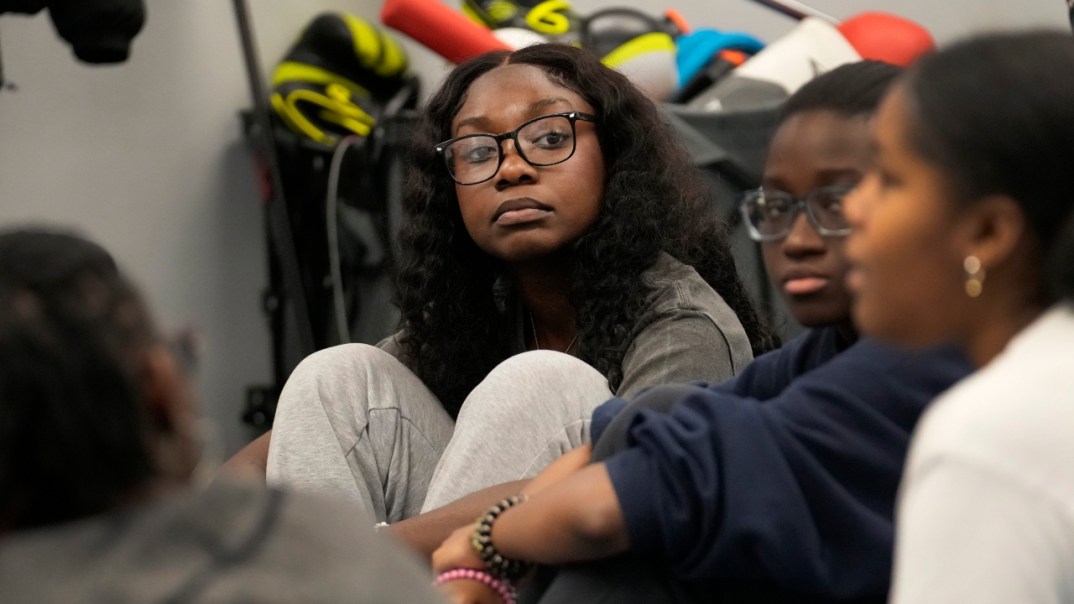
CHICAGO (AP) — When she started writing her college essay, Hillary Amofa told the story she thought admissions offices wanted to hear. About being the daughter of immigrants from Ghana and growing up in a small apartment in Chicago. About hardship and struggle.
Then she deleted it all.
“I would just find myself kind of trauma-dumping,” said the 18-year-old senior at Lincoln Park High School in Chicago. “And I’m just like, this doesn’t really say anything about me as a person.”
When the Supreme Court ended affirmative action in higher education , it left the college essay as one of few places where race can play a role in admissions decisions. For many students of color, instantly more was riding on the already high-stakes writing assignment. Some say they felt pressure to exploit their hardships as they competed for a spot on campus.
Amofa was just starting to think about her essay when the court issued its decision, and it left her with a wave of questions. Could she still write about her race? Could she be penalized for it? She wanted to tell colleges about her heritage but she didn’t want to be defined by it.
In English class, Amofa and her classmates read sample essays that all seemed to focus on some trauma or hardship. It left her with the impression she had to write about her life’s hardest moments to show how far she’d come. But she and some of her classmates wondered if their lives had been hard enough to catch the attention of admissions offices.
“For a lot of students, there’s a feeling of, like, having to go through something so horrible to feel worthy of going to school, which is kind of sad,” said Amofa, the daughter of a hospital technician and an Uber driver.
This year’s senior class is the first in decades to navigate college admissions without affirmative action. The Supreme Court upheld the practice in decisions going back to the 1970s, but this court’s conservative supermajority found it is unconstitutional for colleges to give students extra weight because of their race alone.
Still, the decision left room for race to play an indirect role: Chief Justice John Roberts wrote universities can still consider how an applicant’s life was shaped by their race, “so long as that discussion is concretely tied to a quality of character or unique ability.”
“A benefit to a student who overcame racial discrimination, for example, must be tied to that student’s courage and determination,” he wrote.
Scores of colleges responded with new essay prompts asking about students’ backgrounds. Brown University asked applicants how “an aspect of your growing up has inspired or challenged you.” Rice University asked students how their perspectives were shaped by their “background, experiences, upbringing, and/or racial identity.”
Wondering if schools ‘expect a sob story’
When Darrian Merritt started writing his essay, he knew the stakes were higher than ever because of the court’s decision. His first instinct was to write about events that led to him going to live with his grandmother as a child.
Those were painful memories, but he thought they might play well at schools like Yale, Stanford and Vanderbilt.
“I feel like the admissions committee might expect a sob story or a tragic story,” said Merritt, a senior in Cleveland. “And if you don’t provide that, then maybe they’re not going to feel like you went through enough to deserve having a spot at the university. I wrestled with that a lot.”
He wrote drafts focusing on his childhood, but it never amounted to more than a collection of memories. Eventually he abandoned the idea and aimed for an essay that would stand out for its positivity.
Merritt wrote about a summer camp where he started to feel more comfortable in his own skin. He described embracing his personality and defying his tendency to please others. The essay had humor — it centered on a water gun fight where he had victory in sight but, in a comedic twist, slipped and fell. But the essay also reflects on his feelings of not being “Black enough” and getting made fun of for listening to “white people music.”
“I was like, ‘OK, I’m going to write this for me, and we’re just going to see how it goes,’” he said. “It just felt real, and it felt like an honest story.”
The essay describes a breakthrough as he learned “to take ownership of myself and my future by sharing my true personality with the people I encounter. … I realized that the first chapter of my own story had just been written.”
A ruling prompts pivots on essay topics
Like many students, Max Decker of Portland, Oregon, had drafted a college essay on one topic, only to change direction after the Supreme Court ruling in June.
Decker initially wrote about his love for video games. In a childhood surrounded by constant change, navigating his parents’ divorce, the games he took from place to place on his Nintendo DS were a source of comfort.
But the essay he submitted to colleges focused on the community he found through Word is Bond, a leadership group for young Black men in Portland.
As the only biracial, Jewish kid with divorced parents in a predominantly white, Christian community, Decker wrote he constantly felt like the odd one out. On a trip with Word is Bond to Capitol Hill, he and friends who looked just like him shook hands with lawmakers. The experience, he wrote, changed how he saw himself.
Recommended Stories

Ahmaud Arbery’s killers seeking to overturn their hate crime convictions
Associated Press

High school teacher and students sue over Arkansas’ ban on critical race theory

House Republicans aim to strip funding from medical schools over diversity programs
Ashlee Banks

DEI programs and concepts that could make someone feel guilty about their race banned in Alabama

America’s youngest teacher is a 16-year-old MBA student
TheGrio Lifestyle

MF Doom and Madlib’s ‘Madvillainy’ — now 20 years old — is the timeless classic album we all thought it would be in 2004
Panama Jackson

Before heading ‘outside,’ spring-clean your finances in 4 steps
Jennifer Streaks
“It’s because I’m different that I provide something precious to the world, not the other way around,” he wrote.
As a first-generation college student, Decker thought about the subtle ways his peers seemed to know more about navigating the admissions process. They made sure to get into advanced classes at the start of high school, and they knew how to secure glowing letters of recommendation.
If writing about race would give him a slight edge and show admissions officers a fuller picture of his achievements, he wanted to take that small advantage.
His first memory about race, Decker said, was when he went to get a haircut in elementary school and the barber made rude comments about his curly hair. Until recently, the insecurity that moment created led him to keep his hair buzzed short.
Through Word is Bond, Decker said he found a space to explore his identity as a Black man. It was one of the first times he was surrounded by Black peers and saw Black role models. It filled him with a sense of pride in his identity. No more buzzcut.
The pressure to write about race involved a tradeoff with other important things in his life, Decker said. That included his passion for journalism, like the piece he wrote on efforts to revive a once-thriving Black neighborhood in Portland. In the end, he squeezed in 100 characters about his journalism under the application’s activities section.
“My final essay, it felt true to myself. But the difference between that and my other essay was the fact that it wasn’t the truth that I necessarily wanted to share,” said Decker, whose top college choice is Tulane, in New Orleans, because of the region’s diversity. “It felt like I just had to limit the truth I was sharing to what I feel like the world is expecting of me.”
Spelling out the impact of race
Before the Supreme Court ruling, it seemed a given to Imani Laird that colleges would consider the ways that race had touched her life. But now, she felt like she had to spell it out.
As she started her essay, she reflected on how she had faced bias or felt overlooked as a Black student in predominantly white spaces.
There was the year in math class when the teacher kept calling her by the name of another Black student. There were the comments that she’d have an easier time getting into college because she was Black.
“I didn’t have it easier because of my race,” said Laird, a senior at Newton South High School in the Boston suburbs who was accepted at Wellesley and Howard University , and is waiting to hear from several Ivy League colleges. “I had stuff I had to overcome.”
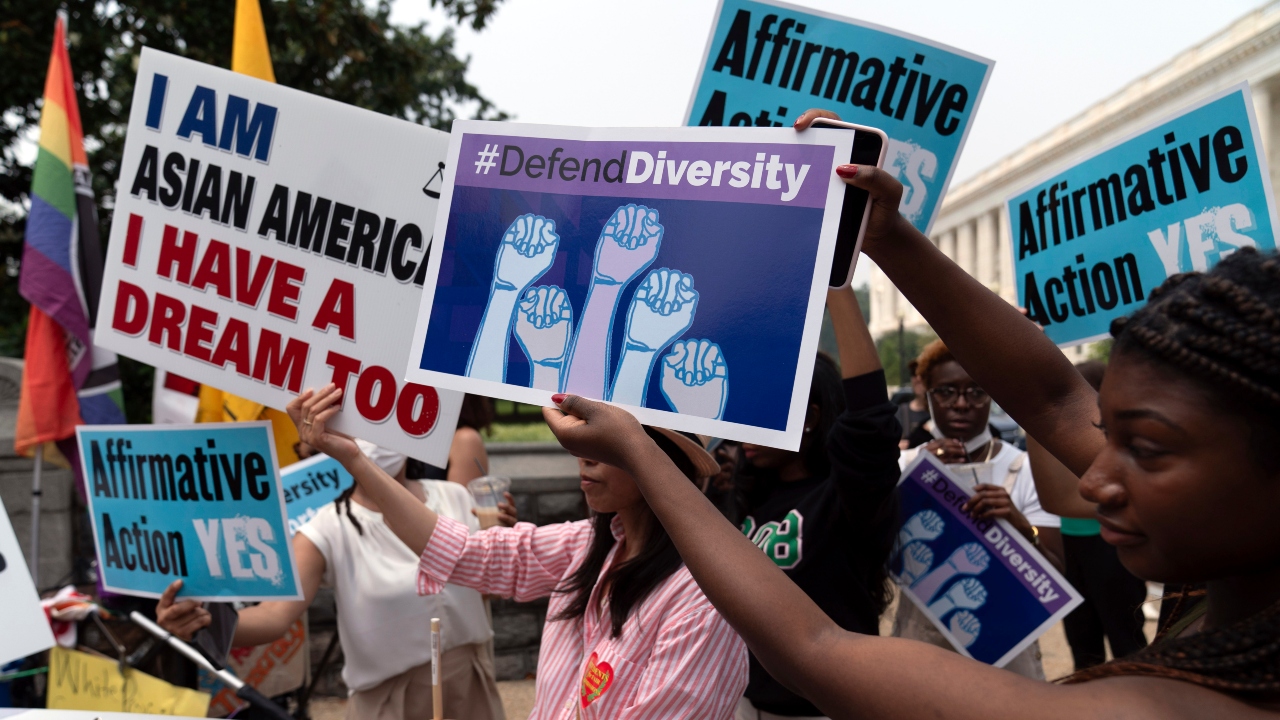
In her final essays, she wrote about her grandfather, who served in the military but was denied access to GI Bill benefits because of his race.
She described how discrimination fueled her ambition to excel and pursue a career in public policy.
“So, I never settled for mediocrity,” she wrote. “Regardless of the subject, my goal in class was not just to participate but to excel. Beyond academics, I wanted to excel while remembering what started this motivation in the first place.”
Will schools lose racial diversity?
Amofa used to think affirmative action was only a factor at schools like Harvard and Yale. After the court’s ruling, she was surprised to find that race was taken into account even at some public universities she was applying to.
Now, without affirmative action, she wondered if mostly white schools will become even whiter.
It’s been on her mind as she chooses between Indiana University and the University of Dayton, both of which have relatively few Black students. When she was one of the only Black students in her grade school, she could fall back on her family and Ghanaian friends at church. At college, she worries about loneliness.
“That’s what I’m nervous about,” she said. “Going and just feeling so isolated, even though I’m constantly around people.”
The first drafts of her essay focused on growing up in a low-income family, sharing a bedroom with her brother and grandmother. But it didn’t tell colleges about who she is now, she said.
Her final essay tells how she came to embrace her natural hair. She wrote about going to a mostly white grade school where classmates made jokes about her afro. When her grandmother sent her back with braids or cornrows, they made fun of those too.
Over time, she ignored their insults and found beauty in the styles worn by women in her life. She now runs a business doing braids and other hairstyles in her neighborhood.
“I stopped seeing myself through the lens of the European traditional beauty standards and started seeing myself through the lens that I created,” Amofa wrote.
“Criticism will persist, but it loses its power when you know there’s a crown on your head!”
Never miss a beat: Get our daily stories straight to your inbox with theGrio’s newsletter.
- Share on Facebook Facebook
- Share on Twitter Twitter
- Share via Email Email
- Copy Link Copy Link Link Copied

STREAM FREE MOVIES, LIFESTYLE AND NEWS CONTENT ON OUR NEW APP
How To Write A Research Paper
Find Sources For A Research Paper

How to Find Sources For a Research Paper | A Guide
10 min read
Published on: Mar 26, 2024
Last updated on: Mar 25, 2024

People also read
How to Write a Research Paper Step by Step
How to Write a Proposal For a Research Paper in 10 Steps
A Comprehensive Guide to Creating a Research Paper Outline
Types of Research - Methodologies and Characteristics
300+ Engaging Research Paper Topics to Get You Started
Interesting Psychology Research Topics & Ideas
Qualitative Research - Types, Methods & Examples
Understanding Quantitative Research - Definition, Types, Examples, And More
Research Paper Example - Examples for Different Formats
How To Start A Research Paper - Steps With Examples
How to Write an Abstract That Captivates Your Readers
How To Write a Literature Review for a Research Paper | Steps & Examples
Types of Qualitative Research Methods - An Overview
Understanding Qualitative vs. Quantitative Research - A Complete Guide
How to Cite a Research Paper in Different Citation Styles
Easy Sociology Research Topics for Your Next Project
200+ Outstanding History Research Paper Topics With Expert Tips
How To Write a Hypothesis in a Research Paper | Steps & Examples
How to Write an Introduction for a Research Paper - A Step-by-Step Guide
How to Write a Good Research Paper Title
How to Write a Conclusion for a Research Paper in 3 Simple Steps
How to Write an Abstract For a Research Paper with Examples
How To Write a Thesis For a Research Paper Step by Step
How to Write a Discussion For a Research Paper | Objectives, Steps & Examples
How to Write the Results Section of a Research Paper - Structure and Tips
How to Write a Problem Statement for a Research Paper in 6 Steps
How To Write The Methods Section of a Research Paper Step-by-Step
Share this article
Research papers are an essential part of academic life, but one of the most challenging aspects can be finding credible sources to support your arguments.
With the vast amount of information available online, it's easy to feel overwhelmed. However, by following some simple steps, you can streamline the process of finding reliable sources for your research paper .
In this guide, we'll break down the process into easy-to-follow steps to help you find the best sources for your paper.
On This Page On This Page -->
Step 1: Define Your Topic and Research Questions
Before you venture into your quest for sources, it's essential to have a clear understanding of your research topic and the specific questions you aim to address. Define the scope of your paper and identify keywords and key concepts that will guide your search for relevant sources.
Step 2: Utilize Academic Databases
Academic databases are treasure troves of scholarly articles, research papers, and academic journals covering a wide range of subjects. Institutions often provide access to these databases through their libraries. Some popular academic databases include:
- IEEE Xplore
- Google Scholar
These databases allow you to search for peer-reviewed articles and academic papers related to your topic.
Use advanced search features to narrow down your results based on publication date, author, and keywords .
Academic Resources Classified by Discipline
Here's a breakdown of prominent databases categorized by academic discipline:
Step 3: Explore Library Catalogs
Your university or local library's catalog is another valuable resource for finding sources. Library catalogs contain books, periodicals, and other materials that may not be available online.
Use the catalog's search function to locate relevant books, journals, and other materials that can contribute to your research.
Step 4: Consult Bibliographies and References
When you find a relevant source, take note of its bibliography or make a list of sources for the research paper. These lists often contain citations to other works that may be useful for your research.
By exploring the references cited in a particular source, you can uncover additional resources and expand your understanding of the topic.
Step 5: Boolean Operators for Effective Searches
Boolean operators are words or symbols used to refine search queries by defining the relationships between search terms. The three primary operators include "AND," which narrows searches by requiring all terms to be present; "OR," which broadens searches by including either term or both; and "NOT," which excludes specific terms to refine results further.
Most databases provide advanced search features for seamless application of Boolean logic.
Step 6: Consider Primary Sources
Depending on your research topic, primary sources such as interviews, surveys, archival documents, and original data sets can provide valuable insights and support for your arguments.
Primary sources offer firsthand accounts and original perspectives on historical events, social phenomena, and scientific discoveries.
Step 7: Evaluate the Credibility of Sources
Not all sources are created equal, and it's crucial to evaluate the credibility and reliability of the information you encounter.
Consider the author's credentials, the publication venue, and whether the source is peer-reviewed. Look for evidence of bias or conflicts of interest that may undermine the source's credibility.
Step 8: Keep Track of Your Sources
As you gather sources for your research paper, maintain a systematic record of the materials you consult. Keep track of bibliographic information, including author names, publication dates, titles, and page numbers . This information will be invaluable when citing your sources and creating a bibliography or works cited page.
Other Online Sources
In addition to academic databases and library catalogs, exploring popular online sources can provide valuable insights and perspectives on your research topic. Here are some types of online sources you can consider:
Websites hosted by reputable organizations, institutions, and experts (such as the New York Times) can offer valuable information and analysis on a wide range of topics. Look for websites belonging to universities, research institutions, government agencies, and established non-profit organizations.
Crowdsourced Encyclopedias like Wikipedia
While Wikipedia can provide a broad overview of a topic and lead you to other sources, it's essential to verify the information found there with more authoritative sources.
Use Wikipedia as a starting point for your research, but rely on peer-reviewed journal articles and academic sources for in-depth analysis and evidence.
Tips for Assessing the Credibility of Online Sources
When using online sources, it's important to exercise caution and critically evaluate the credibility and reliability of the information you find. Here are some tips for assessing the credibility of online sources:
- Check the Domain Extension: Look for websites with domain extensions that indicate credibility. URLs ending in .edu are educational resources, while URLs ending in .gov are government-related resources. These sites often provide reliable and authoritative information.
- Look for DOIs (Digital Object Identifiers): DOIs are unique alphanumeric strings assigned to scholarly articles and indicate that the article has been published in a peer-reviewed, scientific journal. Finding a DOI can help you assess the scholarly rigor of the source.
- Evaluate the Authorship and Credentials: Consider the qualifications and expertise of the author or organization behind the website or blog. Look for information about the author's credentials, affiliations, and expertise in the subject matter.
- Consider the Currency and Relevance: Assess how up-to-date the information is and whether it aligns with the scope and focus of your research. Look for recent publications and timely analyses that reflect current trends and developments in the field.
Wrapping it up!
Finding sources for your research paper may seem like a challenge, but by following these steps, you can locate credible sources to support your arguments and enhance the quality of your paper.
By approaching the research process systematically and critically evaluating the information you encounter, you can produce a well-researched and compelling research paper.
If you are struggling with finding credible sources or have time constraints, do not hesitate to seek writing help for your research papers . CollegeEssay.org has professional writers ready to assist you.
Connect with our essay writing service now and receive expert guidance and support to elevate your research paper to the next level.
Cathy A. (Law)
For more than five years now, Cathy has been one of our most hardworking authors on the platform. With a Masters degree in mass communication, she knows the ins and outs of professional writing. Clients often leave her glowing reviews for being an amazing writer who takes her work very seriously.
Paper Due? Why Suffer? That’s our Job!

Keep reading

- Privacy Policy
- Cookies Policy
- Terms of Use
- Refunds & Cancellations
- Our Writers
- Success Stories
- Our Guarantees
- Affiliate Program
- Referral Program
- AI Essay Writer
Disclaimer: All client orders are completed by our team of highly qualified human writers. The essays and papers provided by us are not to be used for submission but rather as learning models only.
Should college essays touch on race? Some feel the affirmative action ruling leaves them no choice
When the supreme court ended affirmative action, it left the college essay as one of few places where race can play a role in admissions decisions.

Max Decker, a senior at Lincoln High School, sits for a portrait in the school library where he often worked on writing his college essays, in Portland, Ore., Wednesday, March 20, 2024.
Amanda Loman / AP
Like many students, Max Decker of Portland, Oregon, had drafted a college essay on one topic, only to change direction after the Supreme Court ruling in June.
Decker initially wrote about his love for video games. In a childhood surrounded by constant change, navigating his parents’ divorce, the games he took from place to place on his Nintendo DS were a source of comfort.
But the essay he submitted to colleges focused on the community he found through Word is Bond, a leadership group for young Black men in Portland.
As the only biracial, Jewish kid with divorced parents in a predominantly white, Christian community, Decker wrote he felt like the odd one out. On a trip with Word is Bond to Capitol Hill, he and friends who looked just like him shook hands with lawmakers. The experience, he wrote, changed how he saw himself.
“It’s because I’m different that I provide something precious to the world, not the other way around,” wrote Decker, whose top college choice is Tulane, in New Orleans, because of the region’s diversity.
This year’s senior class is the first in decades to navigate college admissions without affirmative action . The Supreme Court upheld the practice in decisions going back to the 1970s, but this court’s conservative supermajority found it is unconstitutional for colleges to give students extra weight because of their race alone.
Still, the decision left room for race to play an indirect role: Chief Justice John Roberts wrote universities can still consider how an applicant’s life was shaped by their race, “so long as that discussion is concretely tied to a quality of character or unique ability.”
Scores of colleges responded with new essay prompts asking about students’ backgrounds.

FILE - Demonstrators protest outside of the Supreme Court in Washington, in this June 29, 2023 file photo, after the Supreme Court struck down affirmative action in college admissions, saying race cannot be a factor.
Jose Luis Magana / AP
Writing about feeling more comfortable with being Black
When Darrian Merritt started writing his essay, his first instinct was to write about events that led to him going to live with his grandmother as a child. Those were painful memories, but he thought they might play well at schools like Yale, Stanford and Vanderbilt.
“I feel like the admissions committee might expect a sob story or a tragic story,” said Merritt, a senior in Cleveland. “I wrestled with that a lot.”
Eventually he abandoned the idea and aimed for an essay that would stand out for its positivity.
Merritt wrote about a summer camp where he started to feel more comfortable in his own skin. He described embracing his personality and defying his tendency to please others. But the essay also reflects on his feelings of not being “Black enough” and getting made fun of for listening to “white people music.”
Related: Oregon colleges, universities weigh potential outcomes of US Supreme Court decision on affirmative action
Essay about how to embrace natural hair
When Hillary Amofa started writing her college essay, she told the story she thought admissions offices wanted to hear. About being the daughter of immigrants from Ghana and growing up in a small apartment in Chicago. About hardship and struggle.
Then she deleted it all.
“I would just find myself kind of trauma-dumping,” said the 18-year-old senior at Lincoln Park High School in Chicago. “And I’m just like, this doesn’t really say anything about me as a person.”
Amofa was just starting to think about her essay when the court issued its decision, and it left her with a wave of questions. Could she still write about her race? Could she be penalized for it? She wanted to tell colleges about her heritage but she didn’t want to be defined by it.
In English class, Amofa and her classmates read sample essays that all seemed to focus on some trauma or hardship. It left her with the impression she had to write about her life’s hardest moments to show how far she’d come. But she and some classmates wondered if their lives had been hard enough to catch the attention of admissions offices.

Hillary Amofa, laughs as she participates in a team building game with members of the Lincoln Park High School step team after school Friday, March 8, 2024, in Chicago. When she started writing her college essay, Amofa told the story she thought admissions offices wanted to hear. She wrote about being the daughter of immigrants from Ghana, about growing up in a small apartment in Chicago. She described hardship and struggle. Then she deleted it all. "I would just find myself kind of trauma-dumping," said the 18 year-old senior, "And I'm just like, this doesn't really say anything about me as a person."
Charles Rex Arbogast / AP
Amofa used to think affirmative action was only a factor at schools like Harvard and Yale. After the court’s ruling, she was surprised to find that race was taken into account even at public universities she was applying to.
Now, without affirmative action, she wondered if mostly white schools will become even whiter.
It’s been on her mind as she chooses between Indiana University and the University of Dayton, both of which have relatively few Black students. When she was one of the only Black students in her grade school, she could fall back on her family and Ghanaian friends at church. At college, she worries about loneliness.
“That’s what I’m nervous about,” she said. “Going and just feeling so isolated, even though I’m constantly around people.”
Related: Some Oregon universities, politicians disappointed in Supreme Court decision on affirmative action
The first drafts of her essay didn’t tell colleges about who she is now, she said.
Her final essay describes how she came to embrace her natural hair. She wrote about going to a mostly white grade school where classmates made jokes about her afro.
Over time, she ignored their insults and found beauty in the styles worn by women in her life. She now runs a business doing braids and other hairstyles in her neighborhood.
“Criticism will persist,” she wrote “but it loses its power when you know there’s a crown on your head!”
Ma reported from Portland, Oregon.
The Associated Press’ education coverage receives financial support from multiple private foundations. AP is solely responsible for all content. Find AP’s standards for working with philanthropies, a list of supporters and funded coverage areas at AP.org .
OPB’s First Look newsletter
Streaming Now
Here and Now

IMAGES
VIDEO
COMMENTS
The challenge is to focus on your presentation and choose your words wisely. 1. Choose a topic. Next, decide on the topic of the video. Some schools may invite you to discuss a particular topic, and others will want the video essay to serve as a personal introduction in place of an interview. If the video serves as an interview, include the ...
Step #1 - Select a suitable topic. Once you've understood the instructions, choose a specific topic you'll be addressing in the video. Though some colleges will give you a topic to talk about, most of them will give you the freedom to select your essay topic of interest. Think about what will best represent who you are as an individual and ...
There are three main stages to writing an essay: preparation, writing and revision. In just 4 minutes, this video will walk you through each stage of an acad...
Next, let's make sure you understand the different types of college essays. You'll most likely be writing a Common App or Coalition App essay, and you can also be asked to write supplemental essays for each school. Each essay has a prompt asking a specific question. Each of these prompts falls into one of a few different types.
Every video analysis essay should have a central idea, or thesis, that ties the film together. 2. Write a Summary. Starting with a brief allows you and your team to document the answers to the most pressing project concerns. It ensures that everyone participating in the video production is on the same page.
Transcript. College admissions essays should showcase a student's unique voice, intellectual curiosity, and resilience. Simple, everyday topics can make powerful essays. It's important to have someone read the essay and share their impressions, ensuring it reflects the student's personality and experiences. Questions.
The Video Essay Process. This section will give an introductory overview of the stages required to create a video essay. Video essayers advice is to start simple and work through each stage of the video production process. Visit the Resources page of this guide for more.
Video transcript. - [Interviewer] Hey guys, we're here with Maura Allen, author of Write Now: Essential Tips for Standout College Essays, and she's gonna talk to us all about how to take our essays to the next level and make sure that we're providing enough depth and substance to our essays. - [Maura] So the admissions officer needs to see or ...
It helps students identify their strengths and unique stories. Here are three possible brainstorming techniques: using an online personality trait tool, asking others for three adjectives that describe the student, and free writing in a journal. These methods help students find their strengths and craft compelling essays.
Making an all-state team → outstanding achievement. Making an all-state team → counting the cost of saying "no" to other interests. Making a friend out of an enemy → finding common ground, forgiveness. Making a friend out of an enemy → confront toxic thinking and behavior in yourself.
Use positive terms like "curiosity" and "service" in your script. 4. Share your true motivation: Some people might define advertising as a form of lying. Certain advertisements certainly fit this ...
Sample College Essay 2 with Feedback. This content is licensed by Khan Academy and is available for free at www.khanacademy.org. College essays are an important part of your college application and give you the chance to show colleges and universities your personality. This guide will give you tips on how to write an effective college essay.
A college video response should not be looked upon as a way out of writing a college application essay. In fact, a video response still requires you to do largely the same thing: put your best self forward. For some students, creating a video response has definite advantages. So, let's explore how you can ace those college video responses!
Good example. I wiped the sweat from my head and tried to catch my breath. I was nearly there—just one more back tuck and a strong dismount and I'd have nailed a perfect routine. Some students choose to write more broadly about themselves and use some sort of object or metaphor as the focus.
In this video, you'll learn how to write a strong essay conclusion paragraph that ties together the essay's main points, shows why your argument matters, and...
A video essay is a video that analyzes a specific topic, theme, person or thesis. Because video essays are a rather new form, they can be difficult to define, but recognizable nonetheless. To put it simply, they are essays in video form that aim to persuade, educate, or critique. These essays have become increasingly popular within the era of ...
In this video, we will walk you through the top 10 DOs of the college admissions essay writing process, a series of tips that will help you write a personal statement that truly makes an impact on admissions officers and helps you gain acceptance to top schools across the country.
Self-help books. If you can only think of 3 or 4, that's okay. Step 2: Pick one of the things you wrote down, flip your paper over, and write it at the top of your paper, like this: This is your thread, or a potential thread. Step 3: Underneath what you wrote down, name 5-6 values you could connect to this.
Don't send in a piece of art instead of an essay, or make a video, or write a poem instead of an essay, unless those things are explicitly allowed. ... Editing is one of the most important parts of writing the best college essay possible, and here are two essential college essay tips for editing. Tip #10: Ask for Help.
A couple things I try to remember so far: Sound quality matters. Make it as good as possible. A brief intro, give the audience an OUTLINE, and THEN launch into your essay. (personally) I need to talk slower and work on my speech pacing. Have movement, don't let the visuals stagnate and bore the viewer, however;
Technique #1: humor. Notice Renner's gentle and relaxed humor that lightly mocks their younger self's grand ambitions (this is different from the more sarcastic kind of humor used by Stephen in the first essay—you could never mistake one writer for the other). My first dream job was to be a pickle truck driver.
Harvard College Writing Center 2 Tips for Reading an Assignment Prompt When you receive a paper assignment, your first step should be to read the assignment prompt carefully to make sure you understand what you are being asked to do. Sometimes your assignment will be open-ended ("write a paper about anything in the course that interests you").
Again, we'd recommend sticking with standard fonts and sizes—Times New Roman, 12-point is a standard workhorse. You can probably go with 1.5 or double spacing. Standard margins. Basically, show them you're ready to write in college by using the formatting you'll normally use in college.
The AP Lit Exam will ask you to write an essay with an essay with a clear, defensible thesis statement that makes an argument about the story, based on some literary elements in the short story. After reading the passage, you might talk about how foreshadowing, allusion, and dialogue work together to demonstrate something essential in the text.
If you enjoy these questions, know that you can find all of our argumentative writing prompts, as they publish, here.Students 13 and up from anywhere in the world are invited to comment.
Learn how you can win a college scholarship by sharing a video or essay about an individual you know personally who has inspired you to achieve your goals. ... You can write your Written Essay directly in the application, or you can copy and paste it into the appropriate area in the application form. ... An "accredited college" is defined ...
When the Supreme Court ended affirmative action in higher education, it left the college essay as one of few places where race can play a role in admissions decisions.For many students of color ...
Step 1: Define Your Topic and Research Questions. Before you venture into your quest for sources, it's essential to have a clear understanding of your research topic and the specific questions you aim to address.
Hillary Amofa, left, practices with members of the Lincoln Park High School step team after school Friday, March 8, 2024, in Chicago. When she started writing her college essay, Amofa told the ...
Max Decker, a senior at Lincoln High School, sits for a portrait in the school library where he often worked on writing his college essays, in Portland, Ore., Wednesday, March 20, 2024.